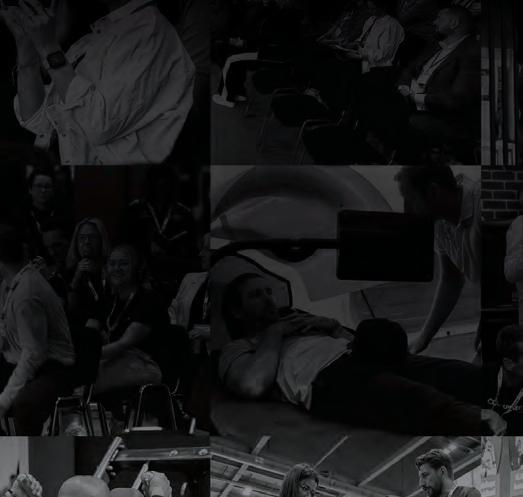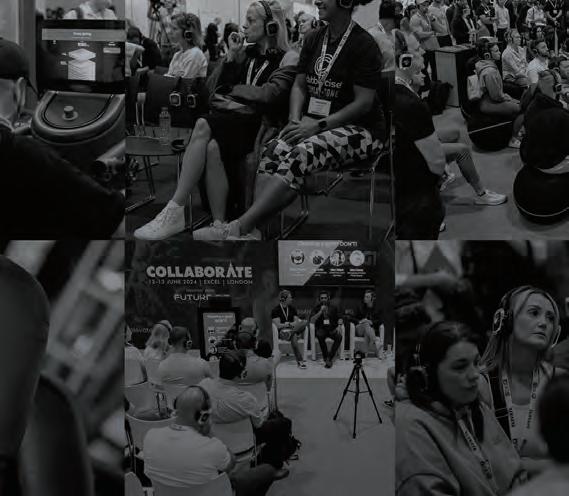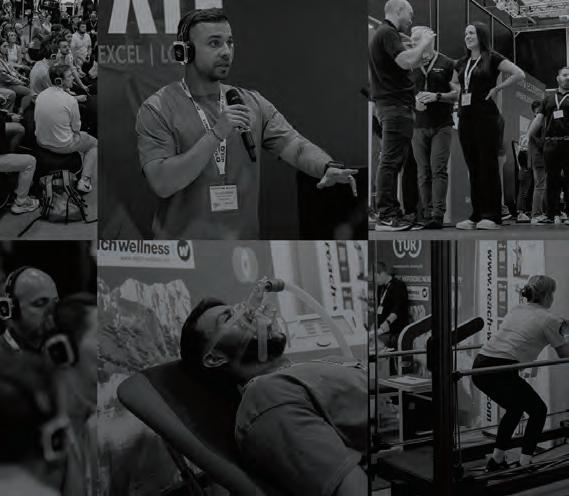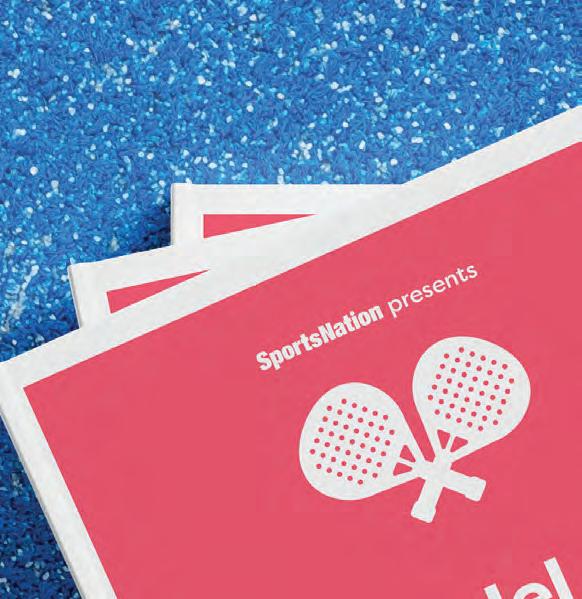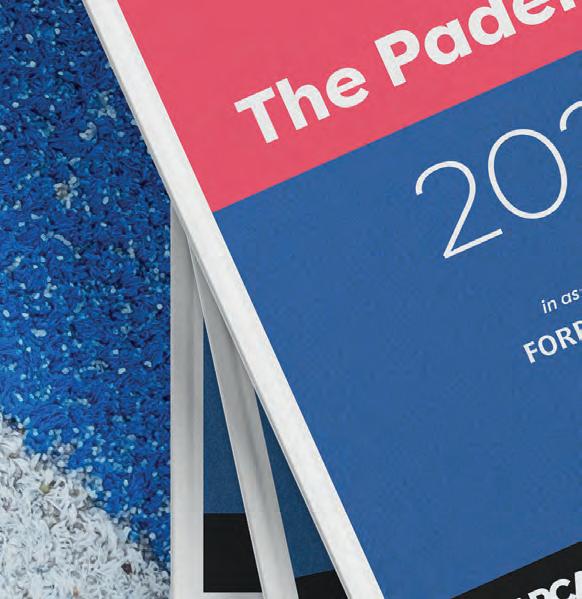


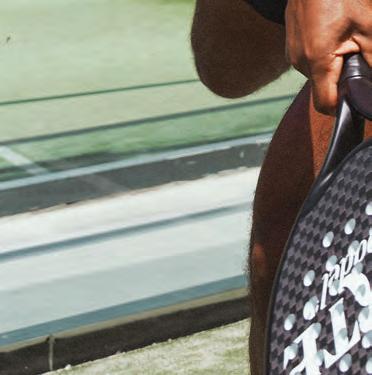


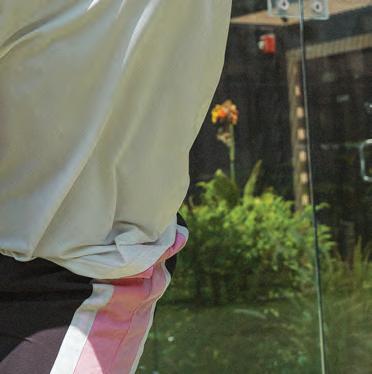













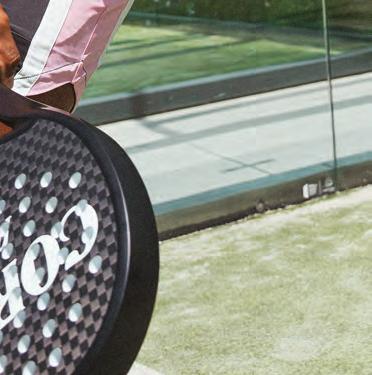
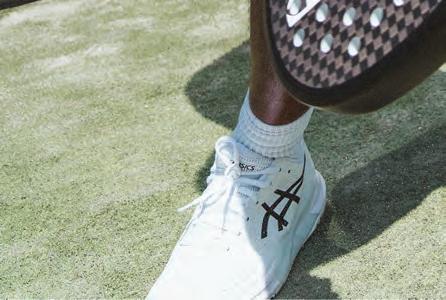

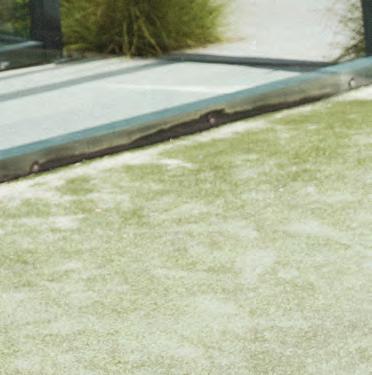









A passion for creating the ultimate quality turf for a wide range of sports applications
Backed

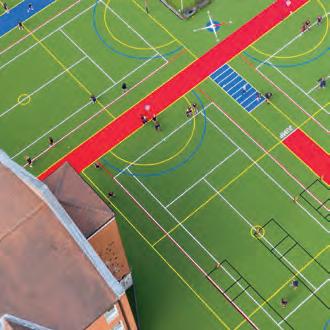
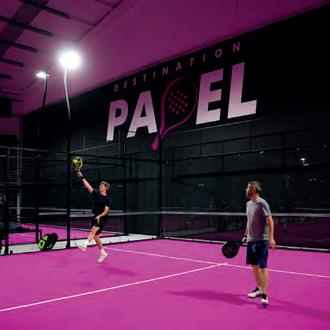



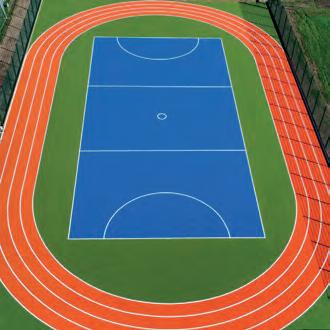



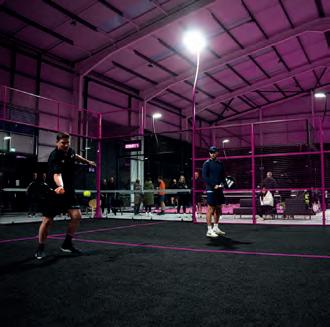

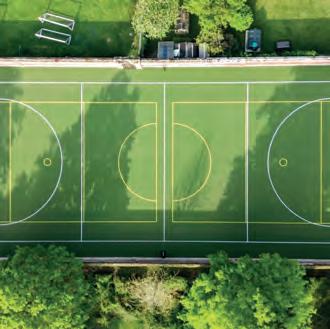



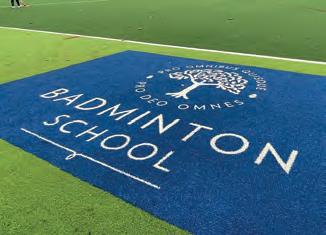







































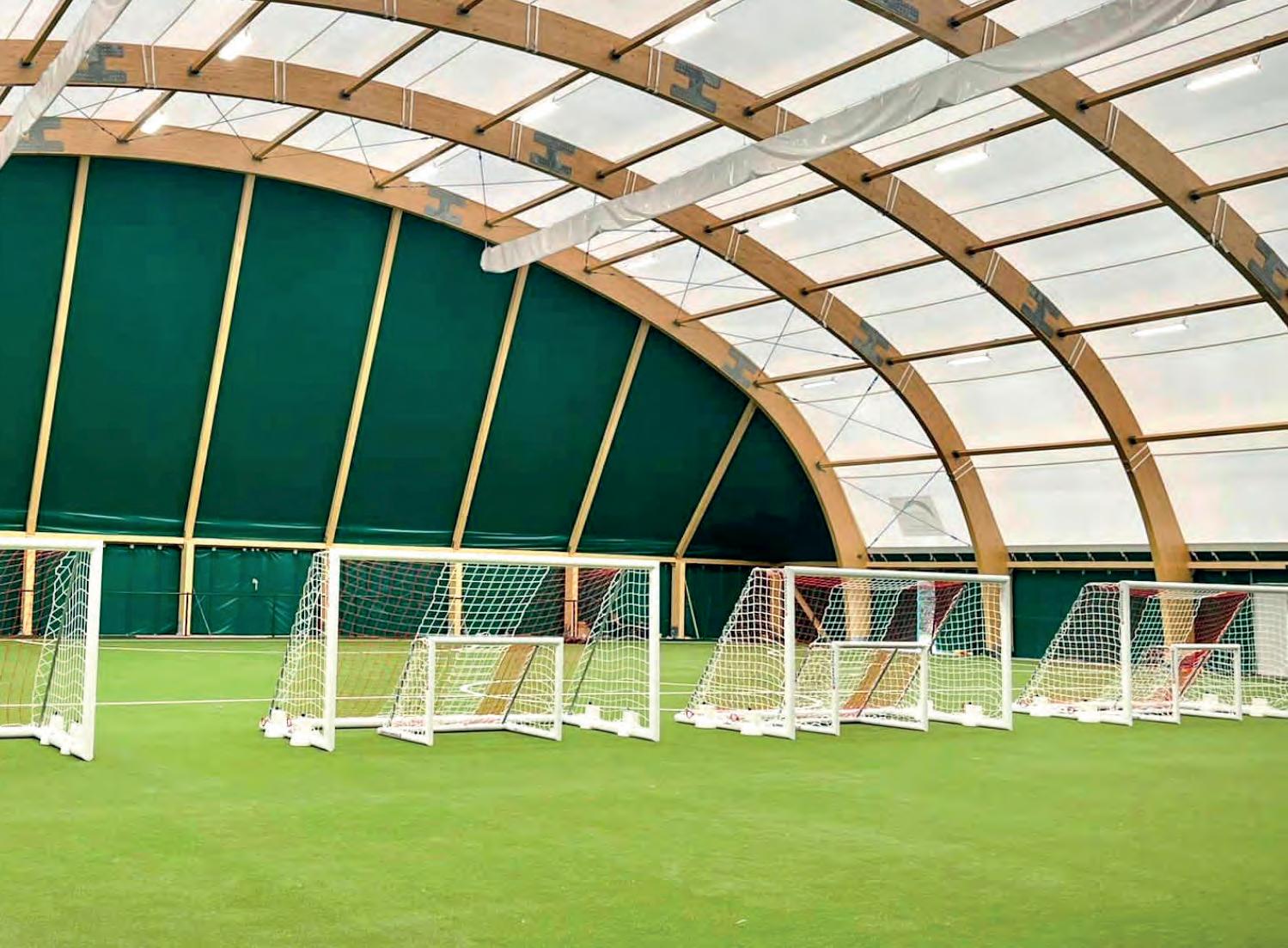


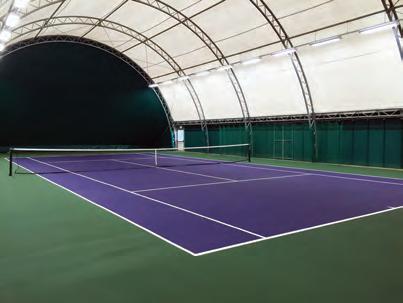
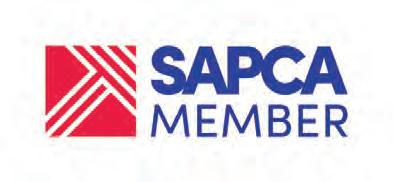
Looking at the most recently published data, it is probably fair to describe our sector as a “mixed bag”.
According to Sport England’s latest Active Lives study, the number of people playing sport has never been higher, with nearly two thirds (63.7%) of adults meeting the CMO’s guidelines of 150 minutes of activity a week.

pressures, ageing facilities and rising operational costs has led to the National Sector Partners Group writing to PM Keir Starmer, urging his government to back the sector in the Spending Review through a “sustained plan for investment”.
Meanwhile, LTA data shows that the number of people who played padel at least once during a year more than tripled in 2024 (up to 400,000 from 129,000 in 2023). More impressive still, is the growth over the past five years: in 2019 just 15,000 people played padel at least once during the year.
Yet, Active Lives also tells us that long-standing inequalities remain – and in some cases have increased. While activity levels among the most affluent have increased by 1.6% since 2016, they have fallen by 2.5% among the least affluent.
At the same time, a Swim England/ukactive report shows that more than 500 swimming pools have been forced to close permanently since 2010. One of the reasons is clear - running a sports facility has never been more expensive. As a result, the concerns over increasing financial
It is sometimes hard to decide which of the two aspects to focus on, in order to best promote investment and interest in our sector – whether to celebrate the thriving parts and opportunities in our sector, or to highlight the challenges within it. The thing is, they are often intimately interconnected.
The success of padel shows that there is definitely a demand for sport. Padel is seen as fun, social, inclusive and takes place in clean, welcoming spaces. You can learn more about the reasons behind padel’s success in the first issue of PadelNation, published as part of this magazine (see pages 46-81).
Could the way padel is thriving – and attracting new players of all ages and backgrounds – teach other sports anything? Answers on a postcard, please (but email will do too: tom@nationmedia.uk).
Tom Walker, Editor
Tom Walker Editor
T: +44 (0)7796 512769
E: tom@nationmedia.uk
The o cial magazine of
John Challinor Publisher
T: +44 (0)7971 043396
E: john@nationmedia.uk
Register for your free subscription at www.sportsnation.uk
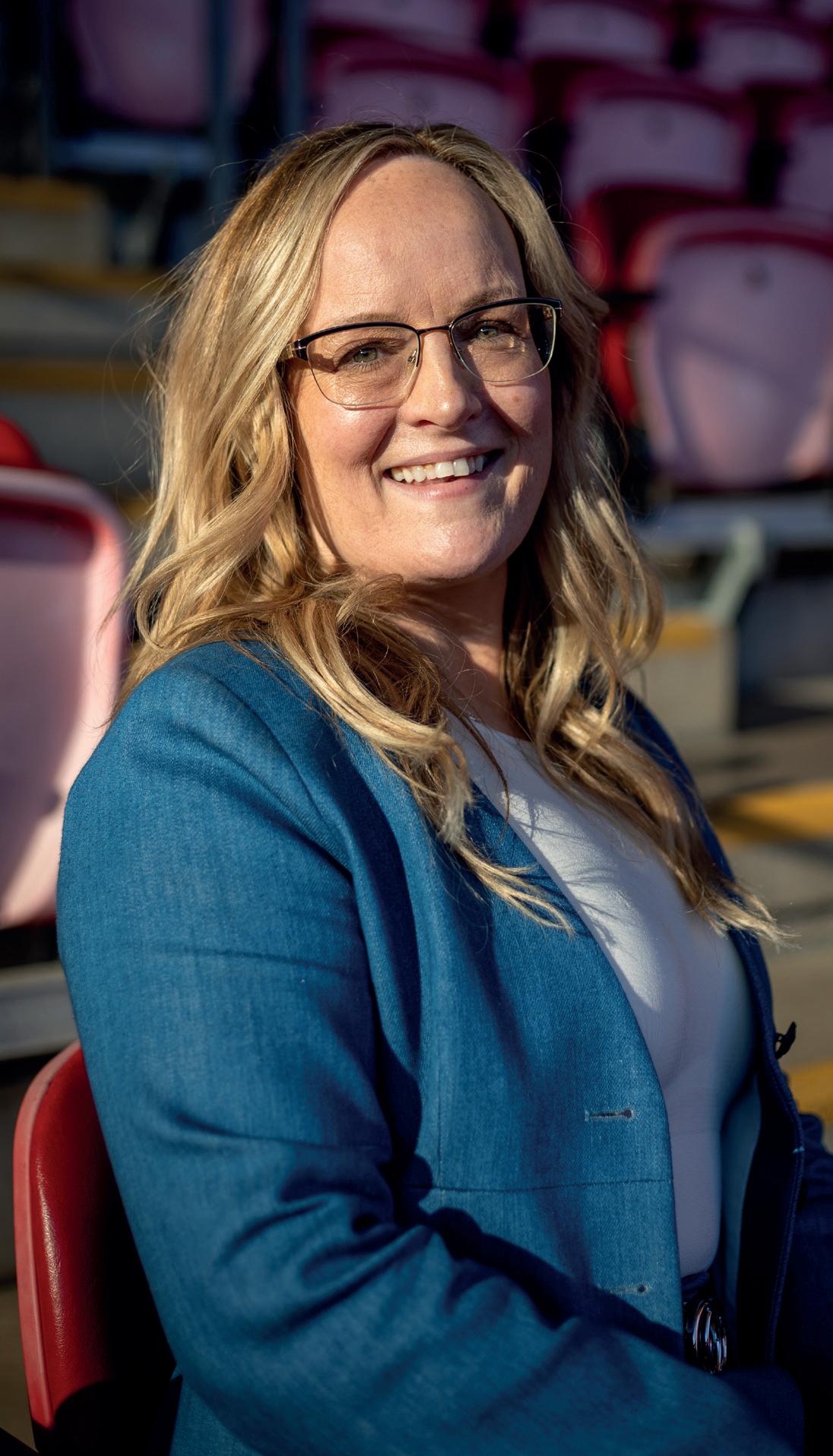




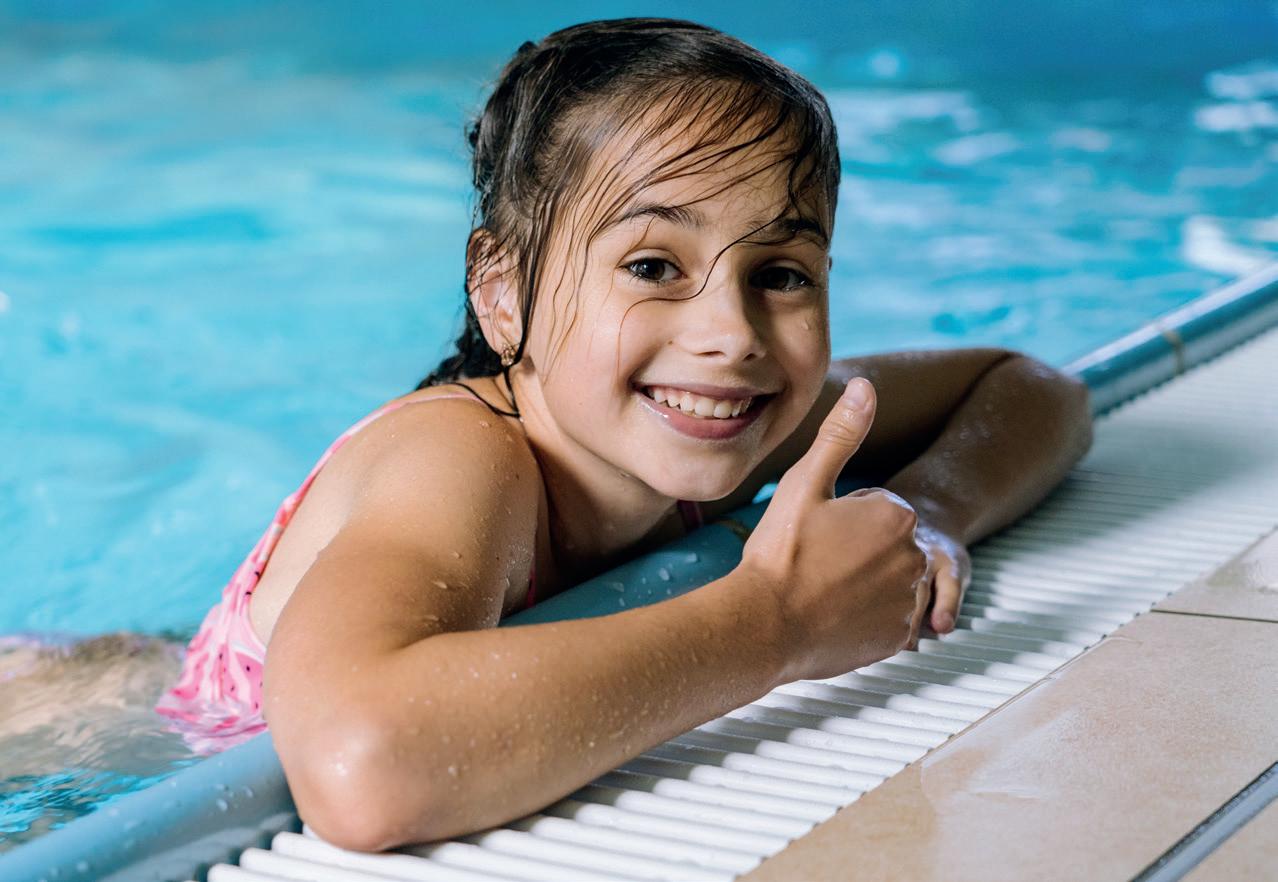


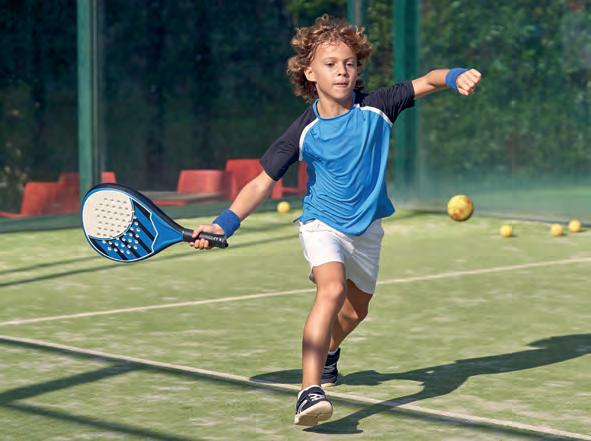


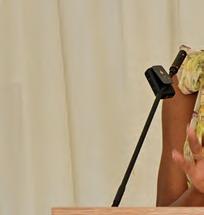




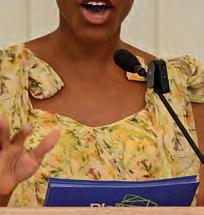

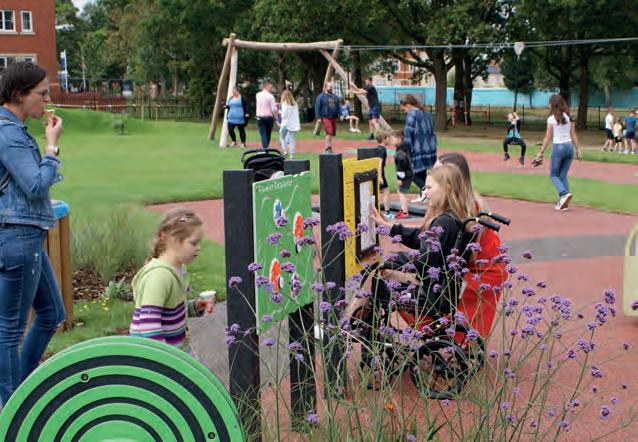


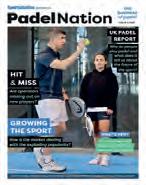


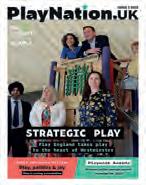










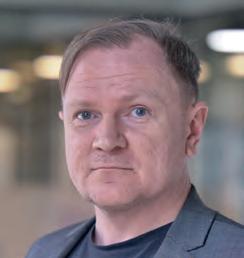

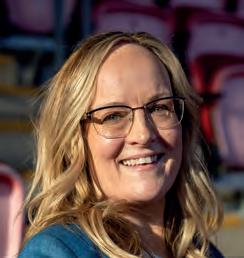
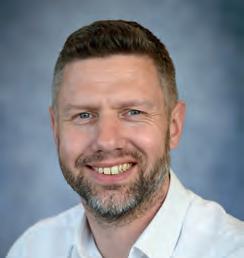
SportsNation is the single, authoritative voice for the provision, delivery, maintenance and management of sports and physical activity facilities. Published bi-monthly, the magazine focuses on the people, places, policies and products that help to build active communities throughout the UK. Subscribe now and we will email you a complimentary copy of the magazine every two months. As the official magazine of SAPCA (the Sports and Play Construction Association), every issue of the magazine will also include information about technical guidance, funding, standards and product innovations.
The number of people playing sport and taking part in physical activity in England is at the “highest level on record”, according to Sport England.
The latest Active Lives Adult Survey Report – published by Sport England – shows that nearly two thirds (63.7%) of the adult population now meet the Chief Medical Officers’ guidelines of doing 150 minutes, or more, of moderate intensity physical activity a week.
The report covers the 12-month period between November 2023 and November 2024. Encouragingly, the number of inactive adults –deemed as those doing less than 30 minutes of activity a week – decreased by 121,000 during the year from 2023 to 2024.
However, the data also underlines that many long-standing inequalities remain. Women from lower socioeconomic groups, however, along with Black and Asian people, are

Irish sports minister, Charlie McConalogue (middle), attended the launch of the report
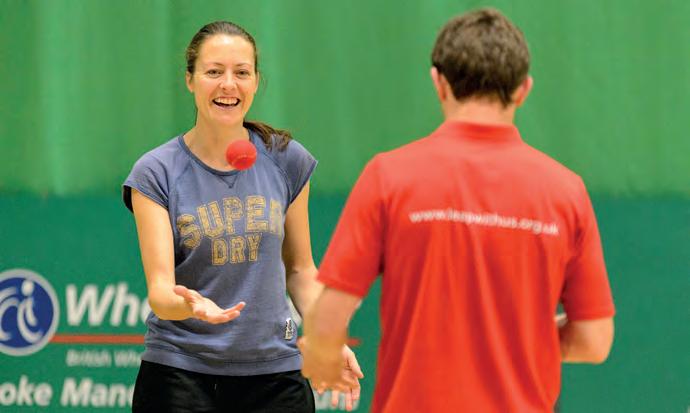
still less likely to be active than others. When a person has two or more of these characteristics –such as a black disabled person, or an Asian man from a lower socio-economic group – the results are compounded.
In some cases, the inequalities have increased. This is certainly
the case when it comes to activity levels between affluence groups.
Among the most affluent, activity levels increased by 1.6% when compared to eight years ago (November 2016). In contrast, among the least affluent, the proportion active has fallen by 2.5% over the same period.
Active sports participation in Ireland has reached its highest-ever level, with 49% of the population taking part in sport on a weekly basis in 2024, up from 47% in 2023. The figure comes from Sport Ireland’s latest Irish Sports Monitor 2024, which shows the increase in participation has been driven by the number of
teenagers and young adults playing sport, who have the highest sports participation rates of all age groups.
The report also found that the growth in participation is equal among men and women, which means that the 3% gap between male and female sports participation rates remains unchanged.
























In an industry where cost is often the focus, Active IQ stands apart by delivering more - more quality, more support, more value.
We know that price matters, but when it comes to qualifications, reliability, and long-term success, quality is non-negotiable. That’s why we offer:
Industry-leading qualifications – Designed with employers to meet workforce demands
Comprehensive support – A dedicated team invested in your success
Added value – Free CPD, FitPro membership with eLearning purchases, and extra resources at no cost
A trusted partner – Transparent pricing, no hidden fees, and a gold-standard reputation. Why settle for less? Begin with better. Choose Active IQ.
WHERE YOU GET MORE.... MORE QUALITY, MORE SUPPORT, MORE VALUE.

The National Sector Partners Group (NSPG) has written to Prime Minister, Keir Starmer, ahead of next week’s Spending Review to urge the government to back the sector through a “sustained plan for investment”.
The letter states that a failure to prioritise the sector next week would see “more facilities and clubs close or decline, a reduction in physical activity levels, greater health inequalities and lower productivity”.
The UK’s physical activity levels rank a lowly 11th in Europe among comparable nations and the most recent participation data from Sport England shows significant inequalities remain across different demographic groups and communities.
Despite this, research suggests that the sector generates social and economic value worth more than £107bn annually, through
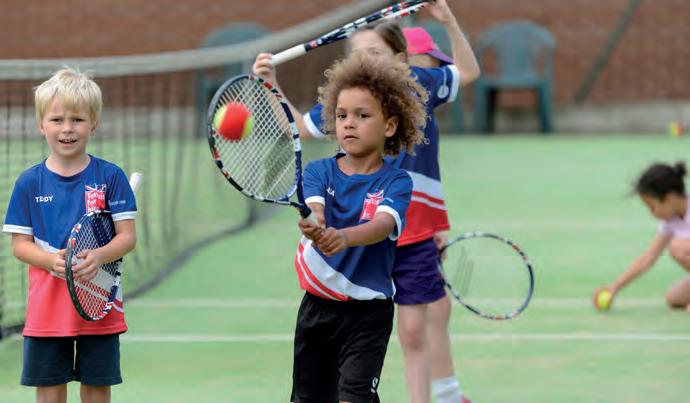
Sport generates social and economic value worth more than £107bn annually
improvements to wellbeing and direct health and social care savings. It also contributes almost £100bn annually in direct economic output – equivalent to 2.5% of total output.
In the letter, the NSPG urges the PM to “Enhance the nation’s sport, recreation and physical
activity infrastructure through sustained investment in high quality, sustainable and affordable community facilities and in our precious green and blue spaces.”
It also calls for a new national strategy which would “join up spending across Government”.
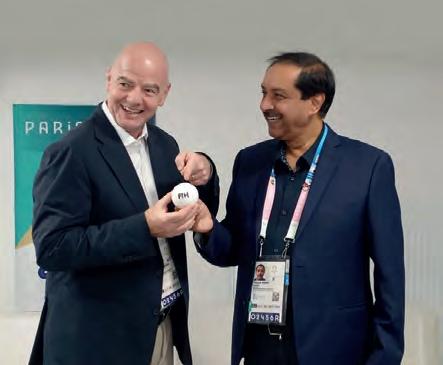
The International Hockey Federation (FIH) and football’s world governing body, FIFA, have published a guide for the design and construction of synthetic turf pitches that are suitable for both sports.
The Dualsport Pitches for Football and Hockey –Performance and Construction Guidelines describes the performance, durability and construction requirements for dual use hockey and football pitches. It provides performance and quality criteria details for these new types of surface, along with guidance on the levels of hockey and football that it is envisioned will be played on the pitches.
Aimed at those designing dual-sport pitches – the guide also provides information on pitch dimensions and layouts, the appropriate construction standards, and field certification.


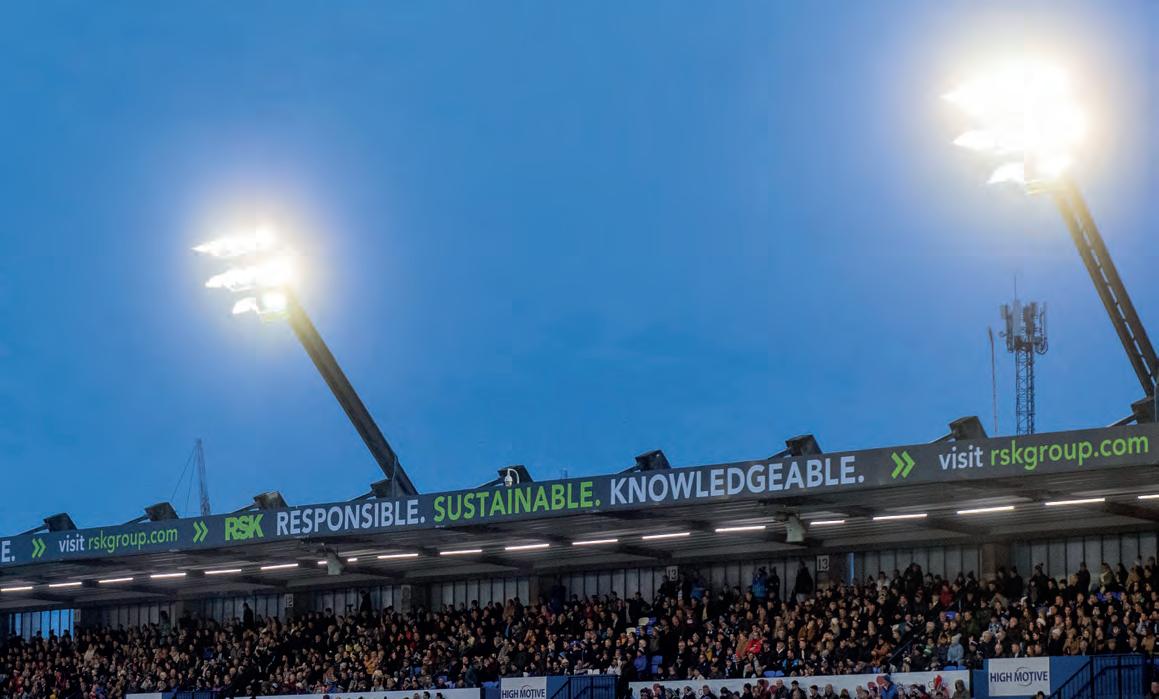
Light up every game with high performance LED floodlights!
From football and rugby to tennis, cricket, and MUGAs, great sport needs great lighting... and that’s where we come in.
Our LED floodlights stay bright, clear, and energy-e cient, so matches can go ahead whatever the season.
Proud to be partnered with:
•New Installations: Providing industryleading columns and floodlights.
•LED Upgrades: Energy-e cient solutions for lower costs and better performance.
•Floodlight Design & Planning: Achieve project goals and secure approvals.
•Repairs & Maintenance: Get your metal halide floodlights back in action.
•Condition Reports & EICRs: Ensure your infrastructure is up to standard.
•Certification & Testing
Our services include: Get in Touch:
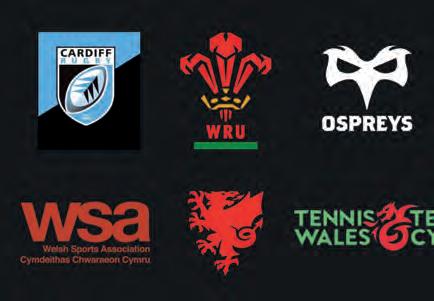

Proud member of:

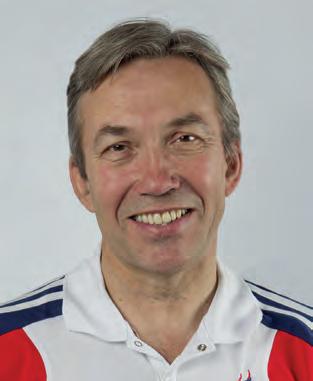
Professor Nick Webborn CBE has been appointed the new Chair of UK Sport, replacing the outgoing Dame Katherine Grainger.
Webborn has a lifetime of experience in high performance sport as an athlete, medical director, clinician, researcher and most recently as Chair of the British Paralympic Association. He has worked on 13 Paralympic Games and has decades of experience in providing performance support to British athletes.
Rugby broadcaster Jill Douglas, HR Sports Academy founder Mickela Hall–Ramsay and Jeffrey Eneberi, General Counsel at Red Gate Software, have joined the board of Sported. Douglas, a familiar face on sports coverage on both ITV and BBC, was a founding trustee of the My Name’5 Doddie Foundation – set up in honour of her close friend, the former Scotland rugby international Doddie Weir – and ran the charity for six years, helping to establish it as one of the leading MND research charities by raising more than £20 million.
“I’ve been fortunate to see both how grassroots sport can provide a pathway to the very top but also, as importantly, how it can make such a difference in shaping lives and serving as the heart of communities,” she said.
Hall–Ramsay founded HR Sports Academy in 2010, a London-based community interest company
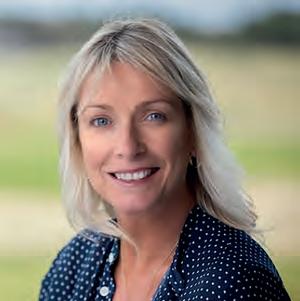
dedicated to empowering children through sport and brings extensive experience of the communities and member groups that Sported supports.
Eneberi is currently General Counsel, Company Secretary and Head of ESG at Red Gate Software Ltd. and has compliance and governance experience at board level. He has a background in data, tech and entrepreneurial projects.
Furthermore, as Chair of the British Paralympic Association, Webborn played a critical role in leading the organisation through a period of change as they delivered a new 10-year strategy which sustained ParalympicsGB’s position near the top of successive Paralympic medal tables while embedding social impact as a cornerstone of their work.
Webborn said: “I look forward to working with the incredibly talented people we have across the UK sporting system.”
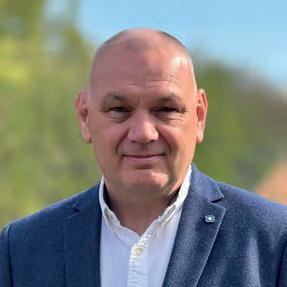
Swim England has named Simon Davies as its Director of Safe Aquatics and Welfare. Davies joins the national governing body from The Scout Association, where he has served as UK Head of Safeguarding since 2022. Earlier in his career, he spent seven years as the Assistant Director for Child Protection at His Majesty’s Inspectorate of Constabulary.


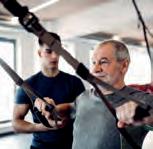





A programme working in deprived communities in Bradford to get children aged five to 14 and their families physically active has secured additional £4m worth of Sport England funding, after it delivered “world-leading results”.
Research into children’s activity levels in Bradford found that the JU:MP programme, operated by Active Bradford, has had a bigger positive effect than any other longterm, population-level physical activity intervention for children so far. Over the last five years, the programme has reached more than 30,000 children and their families to give them more opportunities to be more active through positive movement experiences.
According to a study conducted jointly by the University of Bradford and by Born in Bradford (part of the Bradford Institute for Health Research), JU:MP has improved
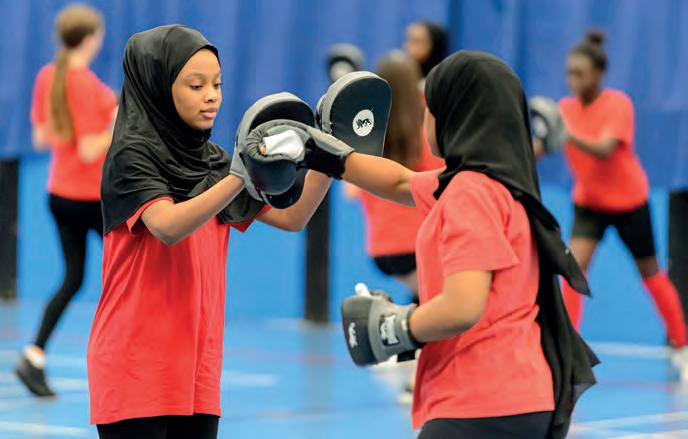
The programme has reached more than 30,000 children over the past five years
children’s total physical activity by 8.3 minutes a day and over 70 minutes a week – equating to 3,640 extra minutes per child a year (or two and a half days).
It also found that JU:MP improved moderate-to-vigorous physical activity by nearly 6
minutes on weekdays, while reducing inactivity by more than 21 minutes a day on weekends.
As a result, Sport England has allocated £4 million worth of investment and agreed to a new three-year partnership with Active Bradford to continue the programme.
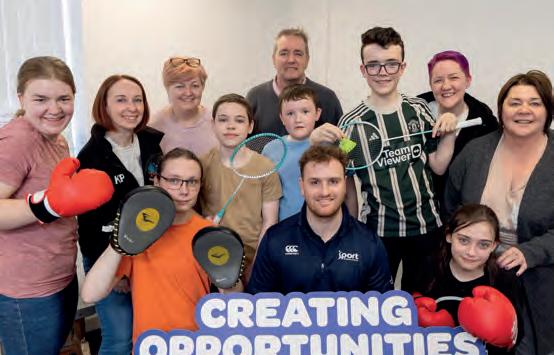
The
Sport NI’s Creating Opportunities crowdfunding programme has reopened for applications. Sports clubs, charities, voluntary organisations and PTAs can receive up to £5,000 match-funding from Sport NI by setting up their own crowdfunding campaigns to run new programmes to encourage more people to participate in sport and physical activity.
Accessibility and inclusion are at the heart of Creating Opportunities and all programmes must focus on removing the barriers preventing people from participating in sport and playing an active role in their club.
The match-funding can be used to invest in new equipment essential for project delivery, coaching costs, venue hire, coach education or facility upgrades to increase levels of participation.
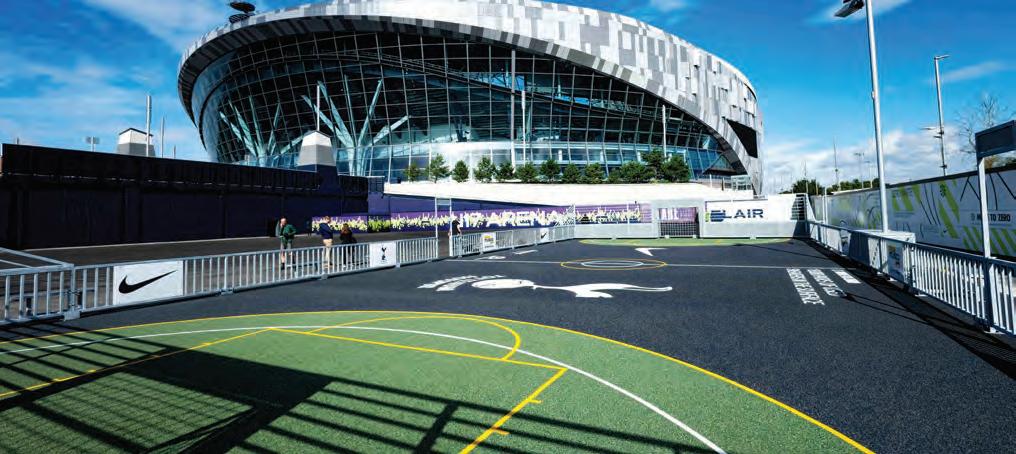

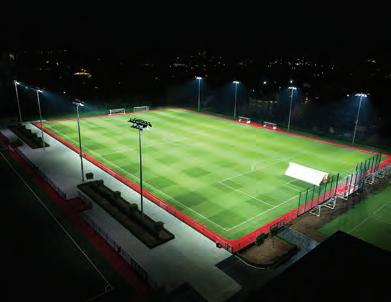
Whether it’s a professional venue like Tottenham Hotspur Stadium, a training pitch like Arsenal FC Training Academy, or the Mini-Pitch System at N17 Arena, Musco’s solutions, expertise, and service create unforgettable experiences for players and fans alike.





Based on the average-sized football pitch, Eco-Fix eliminates a minimum of 5 million microplastic particles from inevitably polluting ecosystems.
This groundbreaking innovation redefines environmental sustainability for sports surfaces, with a unique blended formulation designed to be an essential industry resource.








Musco Lighting designed the lighting system at the athletic facility, with a focus on limiting sky glow and light trespass

A small university in Nova Scotia, Canada, is setting an example for how facility managers can light their sports fields for safer play while protecting neighbours and the night sky
Université Sainte-Anne in Nova Scotia recently made history by opening Canada’s first DarkSky-certified outdoor athletic facility. The football field and running track completed a two-phase certification process from DarkSky International, a global non-profit organisation, to ensure the facility meets strict DarkSky Approved Outdoor Sports Lighting Program standards for minimizing glare, light trespass, and light pollution.
Nestled between St. Mary’s Bay and an Acadian scenic roadway, the university is a model for sustainable practices. Its athletic facility was originally built without lights, but a busy schedule of pickup games, high school sports and other activities kept the field in use for long hours. Given its location within the Acadian Skies and Mi’kmaw Lands Starlight Reserve – with important habitat for migratory birds along the Atlantic Flyway – the university committed to using lighting technology that minimizes environmental impact while providing safer play at night.
Sainte-Anne worked with its consultants to include DarkSky Approved Outdoor Sports Lighting Program certification criteria in its bid (tender) documents. The successful bidder chose to partner with SAPCA member Musco Lighting, a company that has specialised in light control for nearly 50 years and has helped many customers achieve DarkSky certification.
Musco’s Total Light Control – TLC for LED technology provides high-quality, uniform illumination while virtually eliminating glare and preventing light from spilling beyond the edges of the property. The DarkSky team reviewed and approved the lighting design for Phase 1 certification, then later conducted an expert on-site evaluation for Phase 2.
“Our intention is for the campus to be a bit of a showcase for responsible lighting,” said Julien Comeau, Director of Facility Management at Université Sainte-Anne. “We’re one of the biggest employers in our community and we like to set an example for what can be achieved.”
www.musco.com
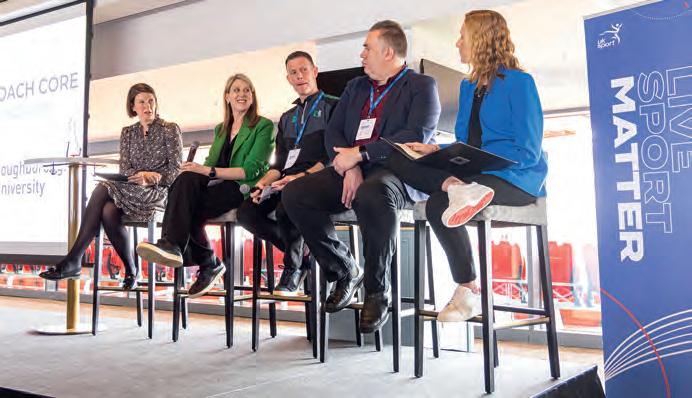
Loughborough University, Access Sport, Coach Core Foundation and StreetGames have been named as UK Sport’s first-ever Event Social Impact Partners, with the aim of using major events to drive positive change.
The initiative will see the partners work with UK Sport on social impact measures at a strategic level. The organisations will collaborate to develop a centralised social impact strategy and structure for the sector, driven by scalable solutions, evidence-based methodologies, and best practice examples.
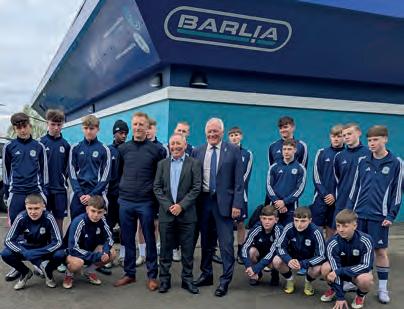
The project ties in with UK Sport’s recently launched Making Live Sport Matter initiative, a new strategic framework for major events, that is committed to continuing to embed social impact into events as a priority. Every event that UK Sport invests National Lottery funding into must have social impact at its heart and deliver positive, lasting change across areas including health and wellbeing, employment skills and EDI, alongside embedding environmental sustainability into event operations.
A new £1.8m full-size 3G, floodlit sports pitch and pavilion has opened at Banbridge High School, Northern Ireland.
The project was funded through £1.6m investment from Armagh City, Banbridge and Craigavon Borough Council (ABC Council) and Department for Communities through the Your School Your Club initiative, with funding of £225,000 distributed through Sport Northern Ireland (Sport NI).
The 3G pitch and pavilion was designed by AECOM and the work was successfully completed by Haffey Sports Grounds.
The sports pitch will be operated on a dual-use basis; Banbridge High School using the pitch during the day and ABC council managing the facility for community use in the evenings and weekends.
Richard Archibald, Interim CEO, Sport NI said: “The facility has been supported through our Your School Your Club programme which will benefit both the school and the wider community.”
Barlia Sports Complex in Castlemilk, Glasgow, Scotland has reopened following a £1.2m redevelopment project. The ageing centre was forced to close – alongside all other sports facilities – during the COVID-19 lockdowns. Following a decision not to re-open the facility after the pandemic, Castlemilk Community
Football Trust (CCFT) started the Save Our Pitch campaign and with the backing of the community, took control of the facility through Glasgow City Council’s People Make Glasgow Communities programme. The total investment in the facility since then has been £1.2million with the pitches and floodlights.
A project to build a new leisure centre for Halifax town centre has taken a major step forward, as Calderdale Council has appointed a contractor to focus on the final designs, costings and programme ahead of construction.
According to the council, the project has been refined to ensure it will be financially sustainable and delivers facilities which are accessible, support health and wellbeing, boost the local economy and contribute to Calderdale’s Climate Action Plan.
Following a tender process, Tilbury Douglas Construction has been appointed as a contractor to deliver the detailed designs for the project.
The new centre will include a six-lane, main swimming pool with spectator seating, a learner pool, a refurbished eight-court sports hall, a 120-station fitness suite, three multi-functional studios, a
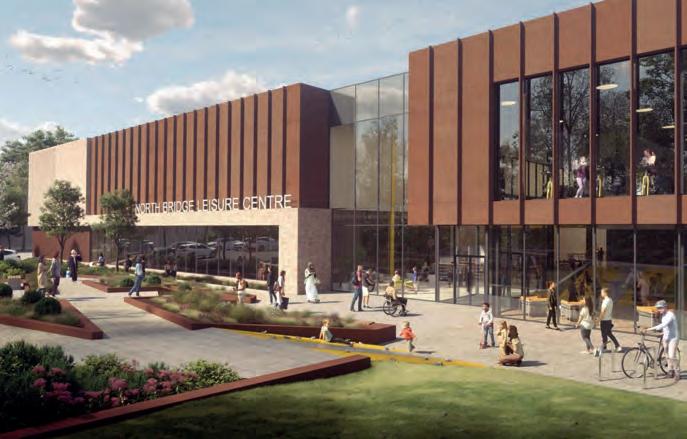
dedicated cycling studio, a children’s soft play and adventure area and a café and community area.
There will also be wellbeing spaces, where health and community partners can locate their services creating closer integration between health, leisure and active wellbeing.
The facility will feature a wide range of energy-efficient, sustainable features, contributing to Calderdale’s Climate Action Plan and the borough’s target for net-zero carbon emissions by 2038. These include air source heat pumps to provide energy-efficient, low-carbon heat.

Construction work has begun on a new £38m sport and wellbeing hub in Caerphilly, Wales.
The two-storey, timber clad building will house a six-lane swimming pool and wet play area and large changing zone, as well as a health club with a large gym floor, two flexible studio spaces, a group indoor cycling studio, two squash courts and a power-assisted wellness suite.
“The facility will be owned by Caerphilly County Borough Council (CCBC), which has appointed Alliance Leisure to deliver the project, working alongside Morgan Sindall (Contractor) and architects Watson Batty, with Hadron Consulting overseeing project management.
The project is being funded through £20m worth of funds from the government’s Levelling Up Fund.











































































































































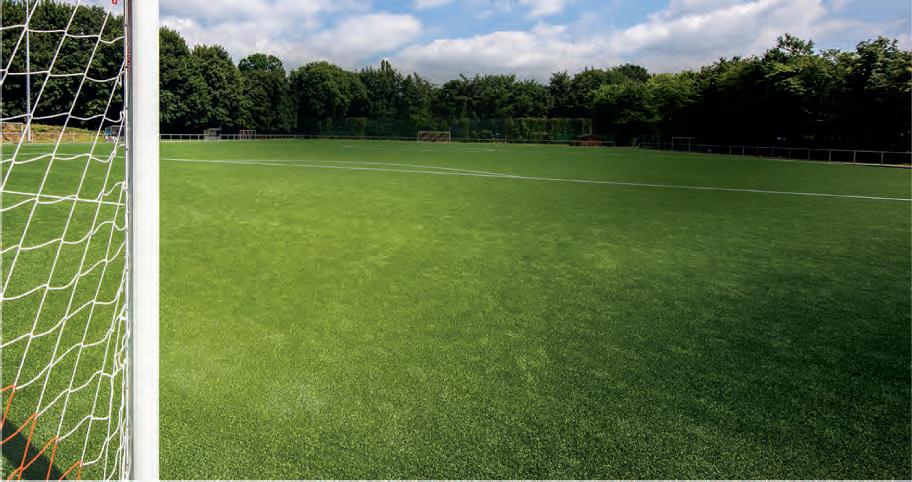
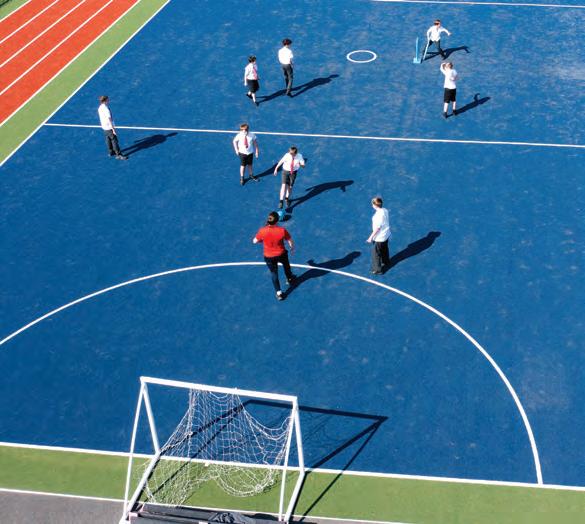
While last year’s Paralympic Games inspired 80% of disabled girls to do more sport, only 36% of them dream of reaching the top in sport –compared to 61% of disabled boys.
The figures, which suggest that disabled girls are not getting the support they need to be physically active and play sport, come from a report published by Women in Sport this week.
Called A game of inequality: The reality of sporting dreams for young disabled people, the report shows that the 2024 Paralympic Games had a hugely positive impact, with 67% of those surveyed saying the Games “made them want to be more active and play more sport”.
But while the visibility of disability sport is improving, the report outlines how real-world access, inclusion and support still lag behind the ideals promoted by the Paralympic Games.
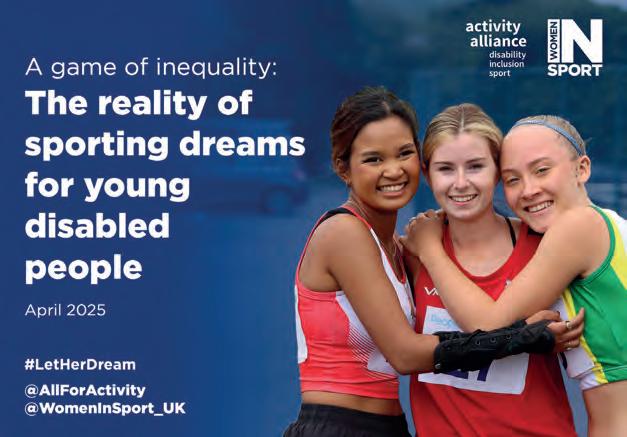
According to the report, disabled girls are more likely to say they don’t know where to find opportunities in their local area and that they worry about getting there and back.
Barriers and challenges facing disabled girls wanting to play sport include fewer local opportunities
Disabled girls often don’t know where to find opportunities to play sport
(44%), negative attitudes about disabilities preventing success (42%) and a feeling that disabled people aren’t encouraged to excel in sport (35%).
“Inequality in sport is compounded for disabled women and girls,” the report reads.
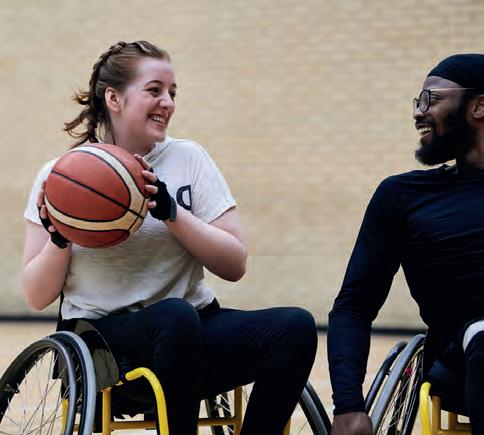
Moving Communities will help understand trends in physical activity levels
Sport England has renewed the Moving Communities contract for another four years. Led by 4GLOBAL, in collaboration with Sheffield Hallam University, Right Directions, and Active Insight, Moving Communities will continue to provide critical data and insights to shape the future of sport and physical activity across the UK.
The new contract forms part of Sport England’s £250 million investment into local places, aligning with the organisation’s Place Partnerships, prioritising communities that experience the greatest levels of inequality. Through collaboration with local leaders, policy-makers, and organisations, Moving Communities will play a pivotal role in breaking down barriers and creating sustainable, long-term solutions for increasing participation in physical activity.





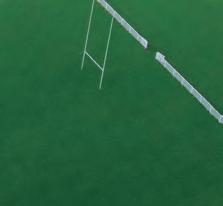








info@obriencontractors.co.uk www.obriencontractors.co.uk/sport


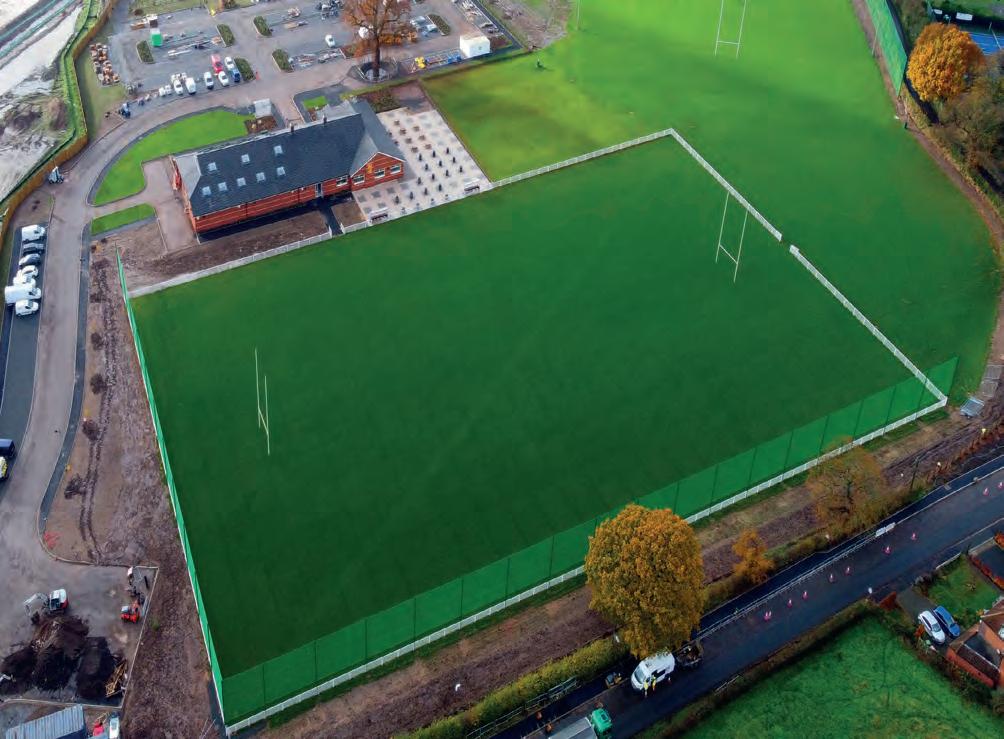










Our Shock Pads are the perfect choice for rugby systems with both classic and organic infill –all across the UK. Due to their composition, they offer excellent drainage, dimensionally stable and consistent performance in all weather conditions.
Let’s find out together how to take your rugby pitch to the next level.





I’d be happy to advise you! Martin
International Sales Manager ProGame















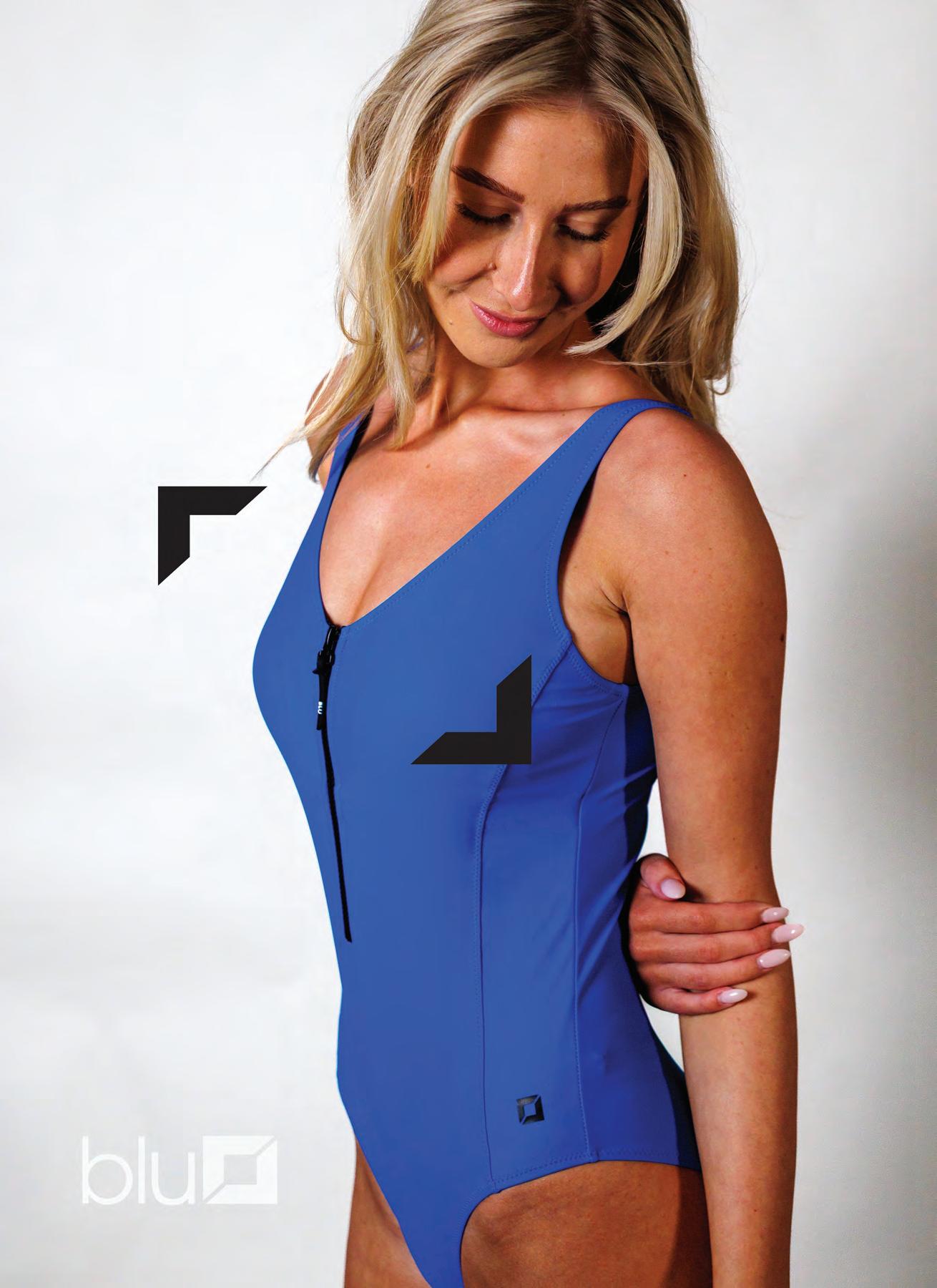


your gym, spa or pool routine
In the pursuit of comfort, wellness and efficiency, every detail counts – even the towel you choose for your facility customers and members. The BLU Leisure Turkish Shower Towel stands out as an essential accessory for anyone visiting the gym, spa, or swimming pool.
1. Premium Cotton: Crafted from 100% Turkish cotton, this towel offers exceptional softness and durability. Turkish cotton is renowned for its long fibres, which provide a smoother and more absorbent fabric. This ensures a gentle touch on the skin and efficient moisture absorption, enhancing your post-workout or relaxation experience.
2. Size Matters: Measuring 70 x 140 cm, the towel provides ample coverage while remaining lightweight and easy to fold. Its compact nature makes it a convenient companion to your gym bag or travel luggage, ensuring you have a reliable towel wherever you go.

3. Glow. Dry. Go.: The towel’s design allows for rapid drying, reducing the risk of those undried towel ‘pongs’. This quick-dry feature not only maintains hygiene but also means the towel is ready for use again quickly....... ideal for multiple sessions in a day.
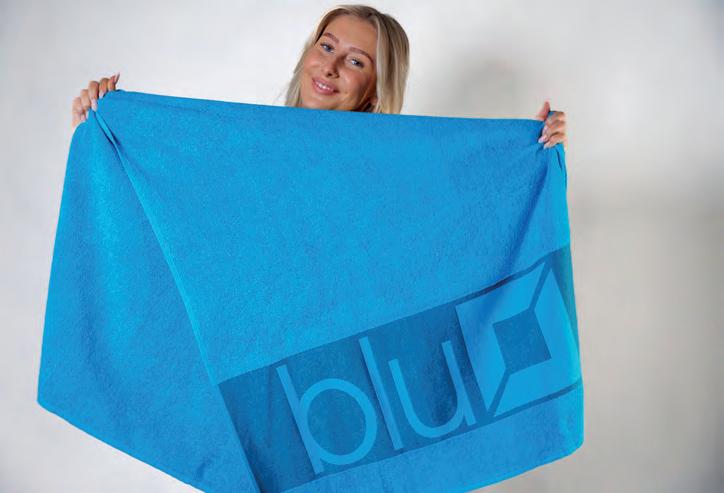
4. Vibrant Colours: Available in elegant Grey and Aqua hues, the BLU Leisure Turkish Shower Towel adds a touch of style to your routine. These versatile colours suit various personal preferences and settings, from gyms to tranquil spas.
Incorporating the BLU Leisure Turkish Shower Towel into your routine represents comfort, efficiency, and style. Whether you’re drying off after a swim, wrapping up post-sauna, or lying it down during a yoga session, this towel meets most needs with elegance.
● www.bluleisure.co.uk
Alliance Leisure has started work on the £14 million redevelopment of the iconic leisure complex, Doncaster Dome, for Doncaster Culture and Leisure Trust.
The leisure development specialist is leading the extensive refurbishment and upgrade of the Dome’s popular Lagoons area. The project aims to modernise the pool complex, while preserving the character of the Grade II listed building, which opened in 1989 and was listed in 2023 becoming one of the youngest listed buildings in the country.
The Dome’s Lagoons area closed in November 2024. Completed in two phases, the initial phase of the refurbishment will focus primarily on essential maintenance works and upgrades to enhance the overall functionality and efficiency of the centre. This includes removing and replacing
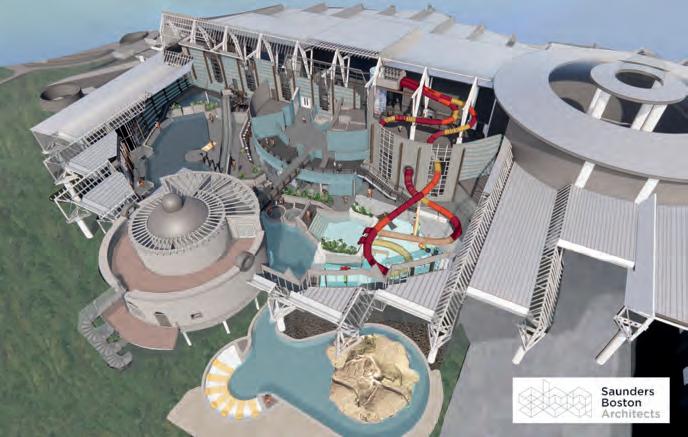
ageing M&E systems, including pool filtration and ventilation, stripping out the existing flumes, water play equipment and changing area, and refitting the plant room. Renovation of the pool hall roof, glazing and flume tower will also be undertaken. Several new features
The Grade II-listed complex first opened in 1989
will be introduced to enhance the visitor experience. These include two new racer slides and a new indoor splash play area for families with a variety of interactive water features, designed by Myrtha Pools.
The changing village and toilets will also be refitted
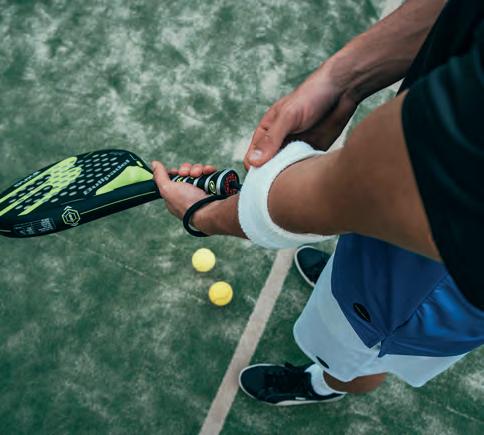
The number of people who played padel at least once more than trebled in 2024, according to figures from the LTA, the sport’s national governing body.
More than 400,000 adults and juniors took to the court at least once during last year, up from 129,000 in 2023. The figure has grown exponentially – in 2019 just 15,000 people played at least once, but by 2021 the number had grown to 89,000.
Meanwhile, latest data from Sport England’s Active Lives survey – which tracks the number of adults who play twice monthly – shows that the number of regular players has doubled in a year, from 23,000 in 2022-23 to 51,000 in 2023-24.
The growth in demand is mirrored by a rapidly expanding infrastructure, with 893 padel courts now available across 300 venues across Britain.
Leisure DB’s Monthly Market Tracker lets you quickly identify and respond to new opportunities in the market and on your doorstep.
Each month, we round up key developments in the UK gym market: openings and closures, planning updates, proposed expansions, rebrands, management changes and more. Keep your finger on the pulse and your business one step ahead.
Find out more and download a free sample report: leisuredb.com/market-tracker
Richard Shaw CEO SAPCA
Most football fans, including me, have a high threshold of nostalgia. It’s part of a fan’s DNA and what keeps us so tribalistic and loyal to our team. We aren’t keen on change and while we understand players and managers move, the structure of the club –badges, colours and grounds – remain constant.
The mockery of the new is inbuilt and love of the established comes as standard. Established, however, doesn’t always mean old. Recent examples include Minnesota United mocking the newbies of Inter Miami – despite themselves only being founded in 2015 – and Newcastle United fans being against changing their current badge, despite it only being in use since 1988.
I’ve been to Goodison Park quite a few times to watch both my teams Aston Villa and Tamworth (and yes, I know it’s frowned upon to have two teams but, in case you hadn’t guessed, the whole of the article is about challenging conventions, so at least I’m consistent). If I were an Evertonian, I would absolutely love the place. It’s everything I like in a stadium – next to terraced houses, fans are close to the pitch and it’s bursting with history. In reality, what I like is the idea of Goodison, not the actual experience it offers. There are pillars that obstruct the view of the pitch, concourses that are too small to stand in and the place suffers from huge transport difficulties. I love Goodison – apart from the days that I need to visit the place.
Next season, the men’s team will move to their new 52,000-capacity, modern stadium, bringing more seats and a better experience


A love of the old doesn’t mean a clash with the new, just that we can embrace both
for fans. There is a tendency for all operators to be blinded by nostalgia and the love of the existing – but sport’s lifeblood is attracting new people and to be nostalgic about their things. A love of the old doesn’t mean a clash with the new, just that we can embrace both. It might be time to take off the rose-tinted glasses (or rather, the royal blue ones) and welcome change.












schmitzfoam.com/pro

















The Royal Life Saving Society UK (RLSS UK) is urging swimming pools and leisure centres across the UK and Ireland to get involved with Drowning Prevention Week (DPW) 2025, its flagship annual campaign to promote water safety and reduce accidental drownings. The campaign, which runs from 14 - 21 June 2025, is both a public health initiative and an opportunity for pool operators to improve their visibility in the community, attract new users, drive footfall to their centres and keep their community safe.
Drowning Prevention Week is strategically timed to take place before the school summer holidays – RLSS UK statistics show that 47% of child drownings in the UK occur between May and August, while 84% of UK child drownings take place in inland waters such as rivers, lakes and canals.
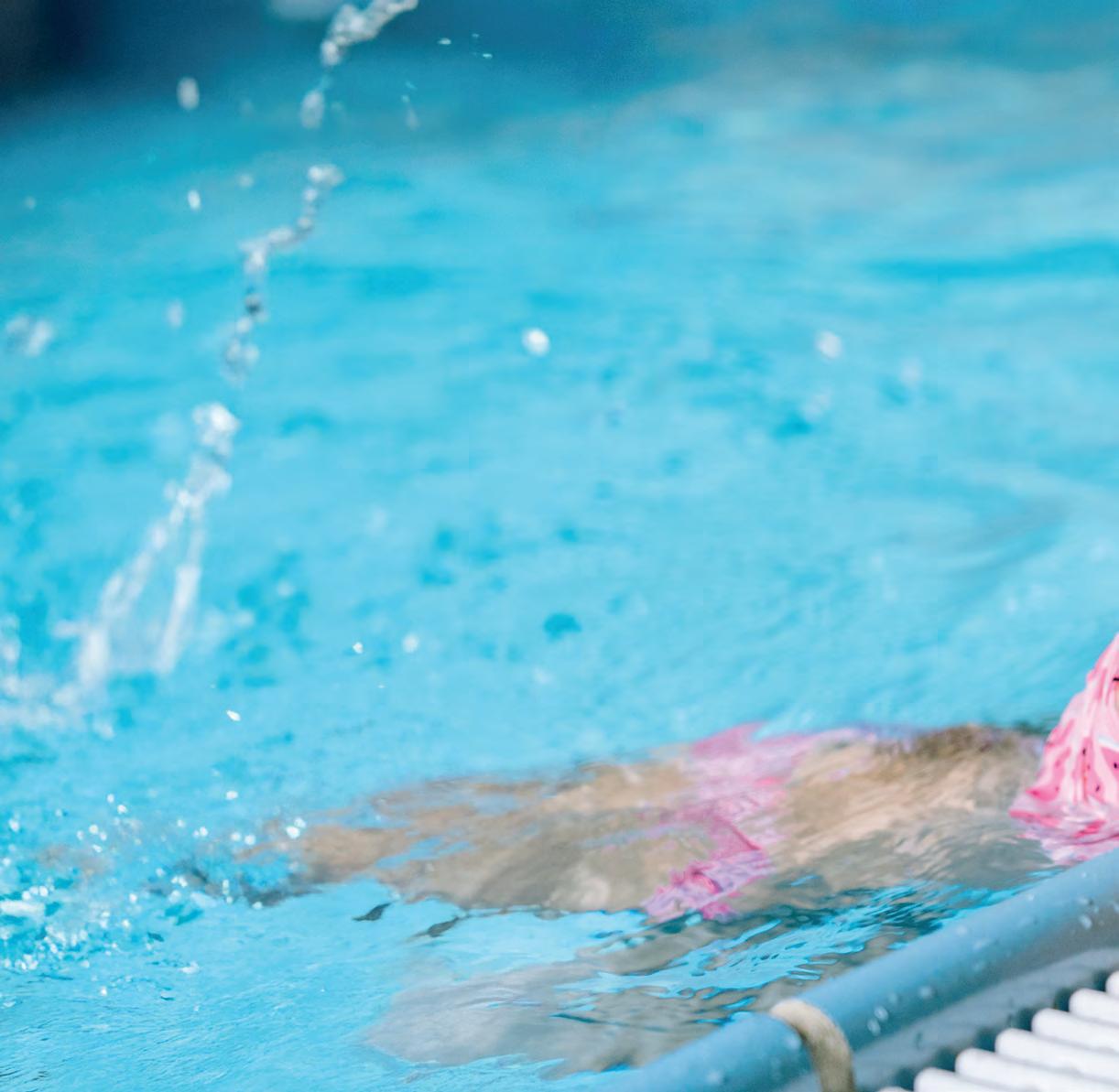
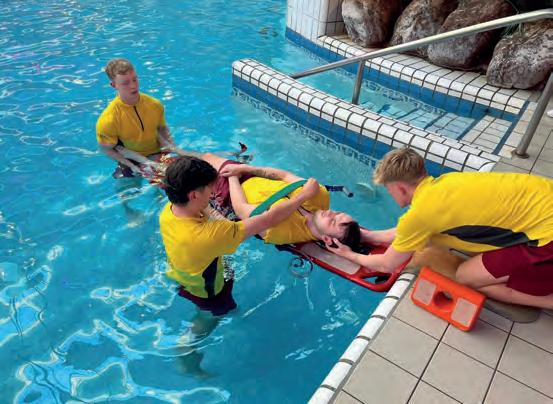
RLSS UK’s flagship campaign is back, aiming to help swimming pool operators promote water safety and connect with their communities
“Drowning Prevention Week allows leisure and pool operators to do more than teach swimming; it’s about saving lives. Every year, we are inspired by the creativity of operators as they engage with communities to educate children and families about water safety,” says Matt Croxall, Interim Charity Director at RLSS UK.
The campaign sees operators engage with local schools, youth groups and community organisations to host competitions and events, run talks and workshops, offer free taster sessions, host water safety demonstrations with the emergency services and much more.
“By participating in Drowning Prevention Week, operators can promote their facilities and programmes while meeting their Corporate Social Responsibility objectives and demonstrating their commitment to water safety in their community,” says Croxall.

Week allows leisure and pool operators to do more than teach swimming; it’s about saving lives
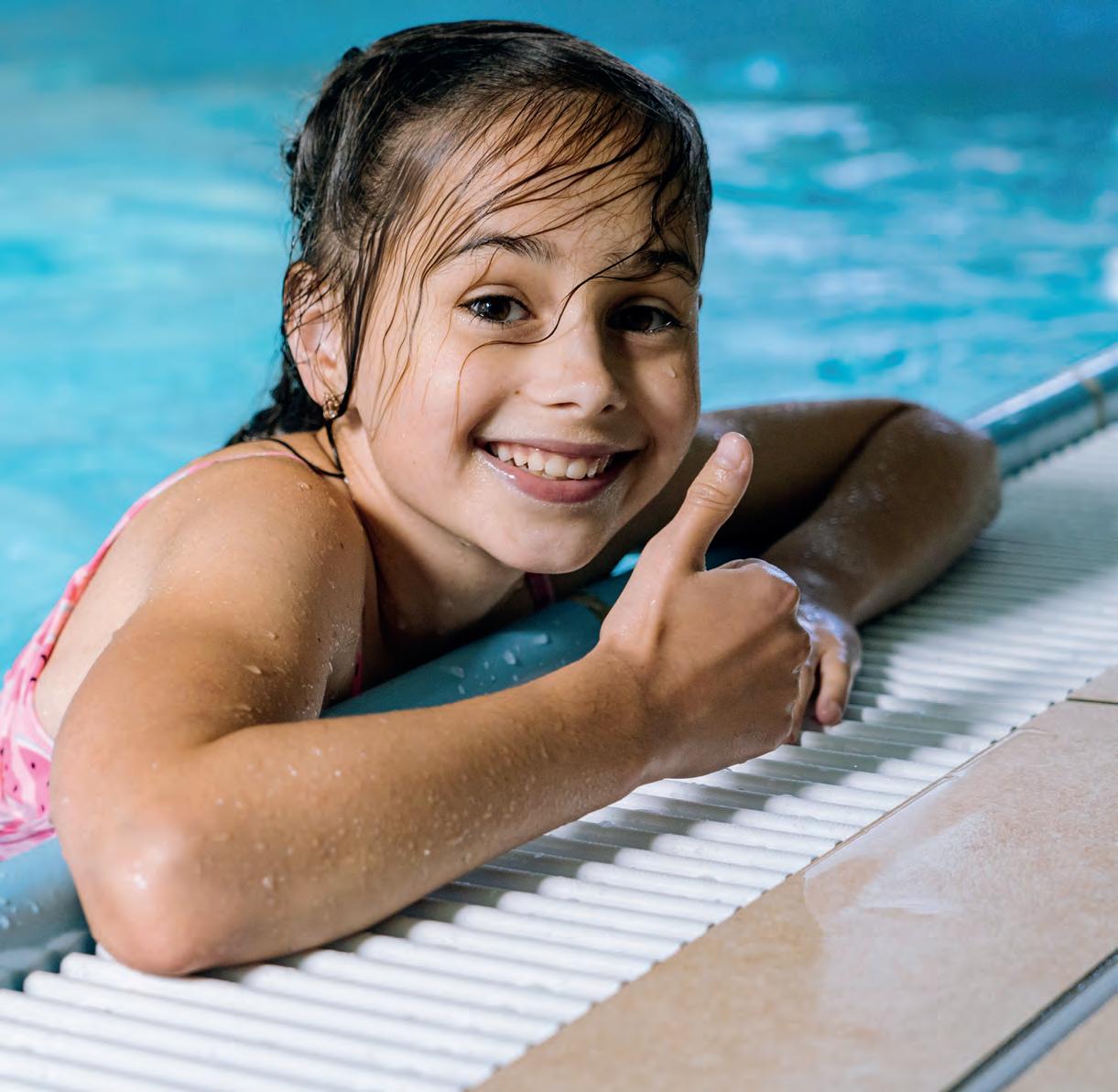
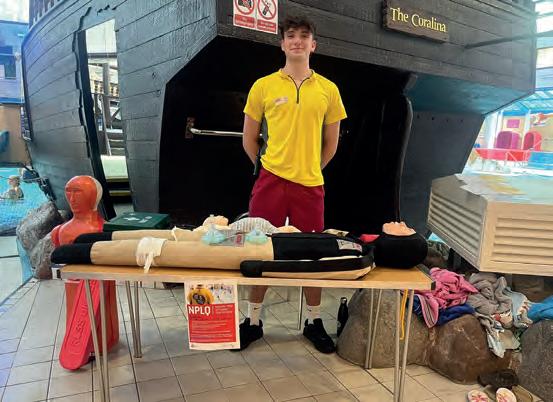
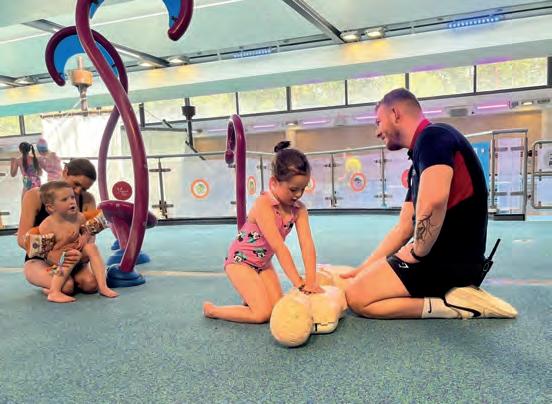
On average, 346 people accidentally lose their lives to drowning each year in the UK and Ireland, and the RLSS UK aims to prevent drowning through high-quality water safety education. RLSS UK is the leading provider of lifesaving and lifeguarding training and water safety education in the UK and Ireland. On average, RLSS UK lifeguards prevent one likely-inwater accident every six minutes.
More than 1.25 million children received water safety education using the free, downloadable educational resources during Drowning Prevention Week 2024. RLSS UK’s Drowning Prevention Week is the national water safety awareness campaign to reduce the number of accidental drownings that occur each year and support families affected by drowning. The next campaign will run from 14-21 June 2025.
On the frontline
Coral Reef Waterworld, a popular waterpark in Bracknell, Berkshire, took part in the campaign for the first time in 2024, with positive results.
Managed by Everyone Active in partnership with Bracknell Forest Council, Coral Reef was part of a nationwide initiative that saw 140 Everyone Activemanaged leisure centres with pools engage in the annual water safety campaign. During the week, Everyone Active provided crucial water safety information to more than 200,000 children, with Coral Reef playing a pivotal role in the campaign.
To maximise community engagement and impact, the centre combined in-school workshops with a hands-on evening event, both offered for free. This was the first time Coral Reef staff had delivered educational content directly to local primary schools.
Targeting Year 5 and 6 students from two local schools, RLSS UK instructors used RLSS
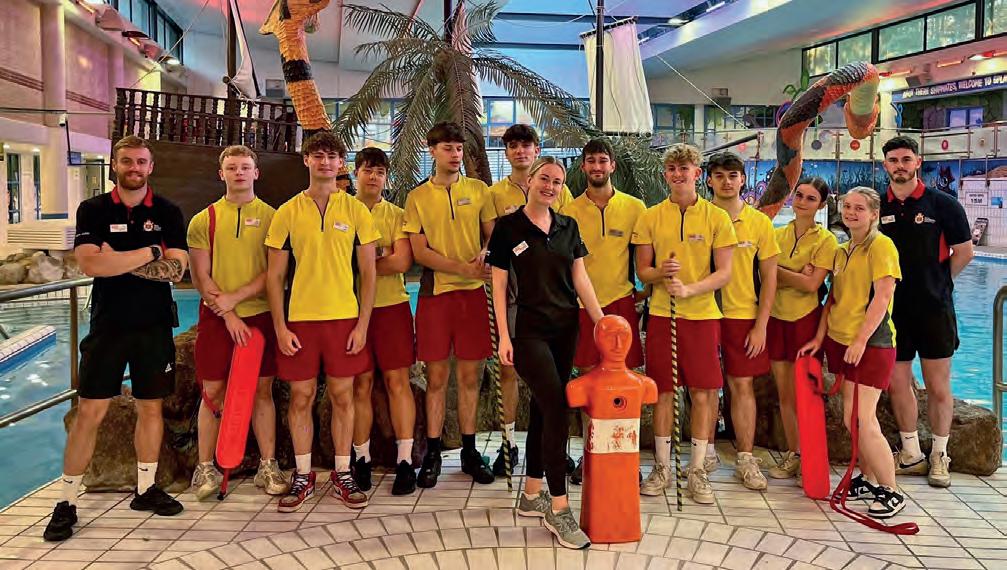

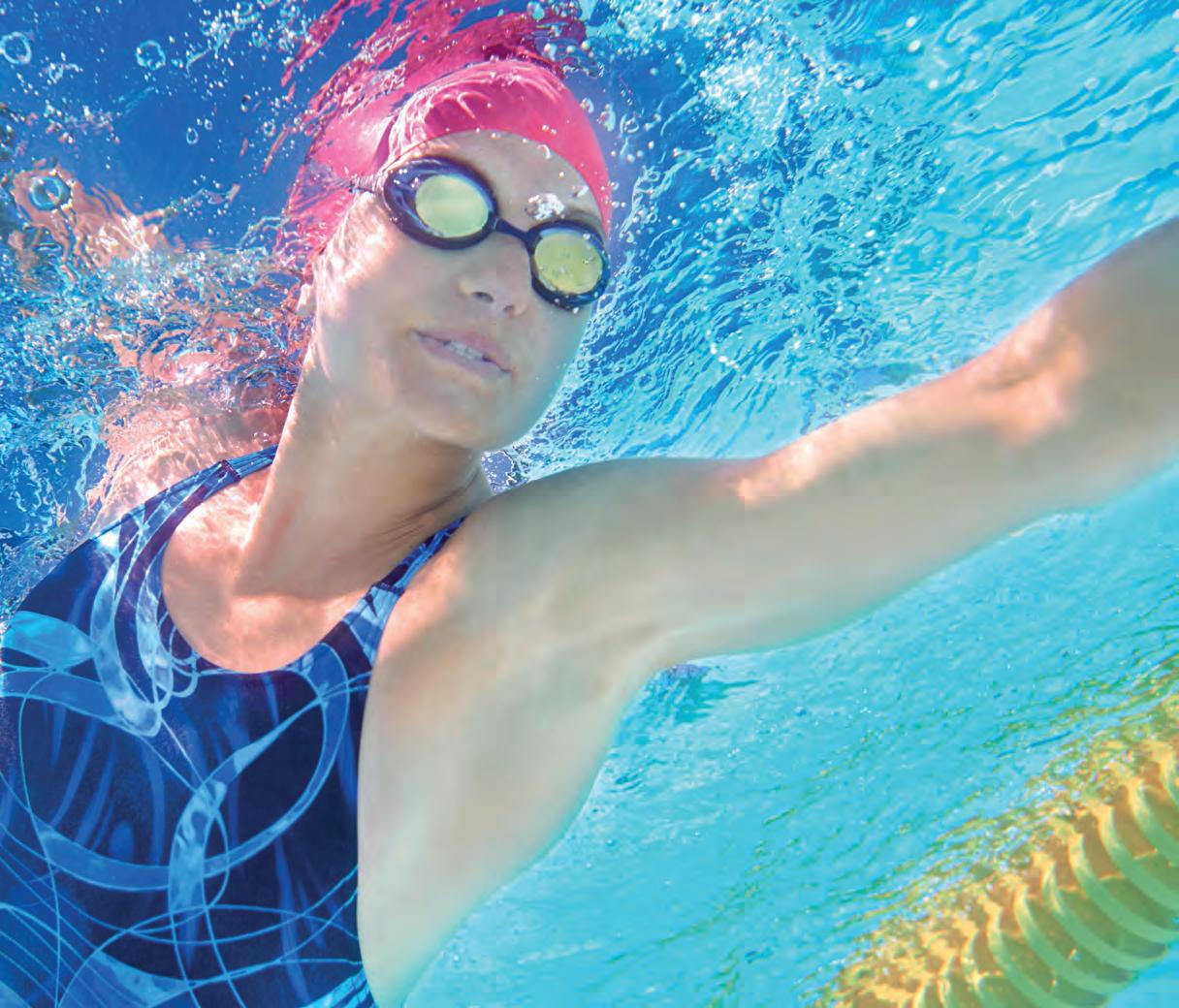
UK’s Water Smart and Save a Child’s Life materials to deliver comprehensive water safety education. The interactive sessions included water safety awareness, hazard recognition and emergency response techniques.
Coral Reef’s DPW activities culminated with an evening event at the centre, hosting more than 700 students and their families and offering a blend of fun and practical water safety education. Attendees participated in various activities, including retrieving a sinkable mannequin, CPR and first aid practice, and throw rope and reach pole exercises.
Lifeguards demonstrated rescue board rescues and explained the various rescue tools they use. The children and their families also enjoyed free access to the waterpark’s pools and slides for an enjoyable and educational experience.
Craig Flippance, General Manager at Coral Reef Waterworld, said: “The family night was absolutely incredible. With more than 700 attendees, it was the perfect way to reinforce the lessons from the previous week. We aimed to make learning about water hazards and lifesaving skills as engaging and hands-on as possible.
“Having good water safety awareness from a young age is absolutely essential. The more interactive and memorable we can make that education, the better prepared these children will




Access Drowning Prevention Week 2025 resources bit.ly/dpw-campaign




Ideas of how to get involved with Drowning Prevention Week bit.ly/dpw-ideas
be to stay safe around any body of water for life.”
Coral Reef’s DPW activities helped to develop stronger ties with the local community and fostered a sense of accomplishment and teamwork among staff members. Many team members reported deep satisfaction from engaging directly with the children and their families. The various activities kept the work dynamic and engaging, and the team appreciated the positive feedback from the school pupils, their teachers, and their parents, feeling that their efforts were truly valued.
Following the success of its DPW debut, Coral Reef Waterworld plans to expand its water safety outreach in the coming years, engaging with more local schools and increasing the number of workshops offered.
“We recognise the critical importance of water safety education and are proud to support RLSS UK’s campaign to introduce water safety into national curriculums,” Flippance added.
“Through Drowning Prevention Week, we aim to encourage children of all ages to engage with water safety, know what dangers to look out for, how to prepare to stay safe, and how to react should they or others get into trouble in or around water. This initiative helps us engage with new audiences and serves our communities in a meaningful and potentially life saving way.”

The latest Active Lives Adult Survey shows a continued and steady increase in physical activity levels across the country and is a further reminder of the essential role the sport, recreation and physical activity sector plays in supporting the nation’s physical activity levels. For the second year running, fitness activities continue to drive activity levels and when combined with swimming figures, mean that gyms, pools and leisure centres provide the biggest source of activity other than walking.
Combined with our recent market report, which showed a record number of gym members in the UK, these figures provide irrefutable evidence of the essential role our sector is playing in driving physical activity levels, and demonstrates the growing demand from consumers to improve their physical, mental and social wellbeing through exercise in these spaces.
However, despite the headline numbers, much more needs to be done to ensure more people can reap the benefits of engaging in physical activity and ensuring our sector can play its fullest role in driving this uptake. The UK is currently 11th out of 15 comparable European nations for activity levels, and small increases such as the one shown in the Active Lives survey are not enough to make the UK the most active nation in Europe, with all the associated health and economic benefits that this would bring.
Our sector is responsible for generating £107.2bn in social value in England each year, including £10.5bn in secondary value by reducing
We
cases of disease and relieving the huge pressure on health and social care every year. Studies show that physical activity helps to prevent 20 chronic conditions, including type 2 diabetes, obesity, heart disease, many types of cancer, MSK conditions, depression and anxiety, and dementia. But significant inequalities remain in physical activity levels across demographics, and an alarming decrease among younger people aged 16 to 34. It is clear the current policy approach is failing to deliver meaningful increases in physical activity. As a nation we must demand more to ensure people from lower socio-economic and ethnic minority groups are supported to be active. The outcome of the Government’s upcoming Spending Review is pivotal to ensure the sport, recreation and physical activity sector can drive up these levels and provides the Government with an opportunity to demonstrate the value it places on the nation’s health and wellbeing and reducing the pressure on the NHS. The Spending Review represents a clear opportunity for the Government to recognise our sector’s potential and put in place the measures to capitalise on consumer demand, reduce our barriers to growth and turbocharge physical activity levels. Doing so would ensure the physical activity sector is a solution to help transform our nation’s health and economic growth.


Cut your energy costs by up to 75% with Earlsmann’s highefficiency LED lighting solutions. Our experienced design team ensures every installation meets sports and environmental standards without compromising on performance.
Speak to our expert team today and discover the best solution for your project.
01884 259917
www.earlsmann.co.uk sales@earlsmann.co.uk
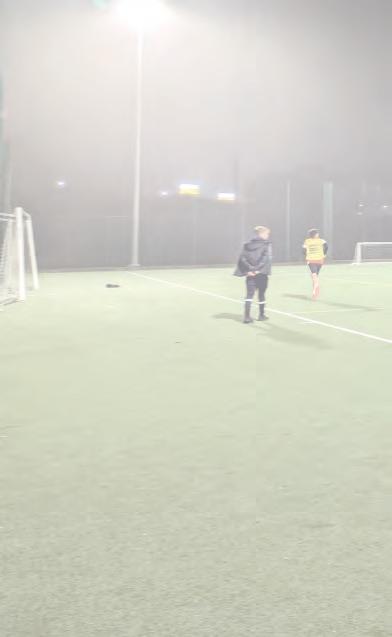







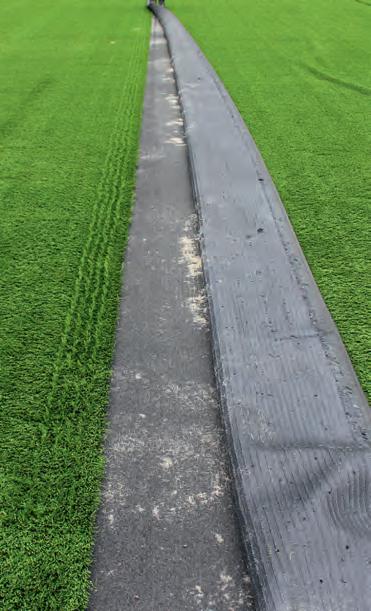
sports.regupol.com
FEEL THE DIFFERENCE: REGUPOL TURFPAD SP - CERTIFIED QUALITY ACCORDING TO EN 15330-4
Use the full potential of your sports facility with REGUPOL turfpad SP!

Our prefabricated elastic layer, certified according to the European standard EN 15330-4, combines outstanding quality with maximum resilience - for perfect playing fields that inspire. • Durability • Optimum shock absorption • Consistent physical properties
• Quick and easy installation
• Excellent water permeability
Rely on certified quality and create a playing experience that sets standards.
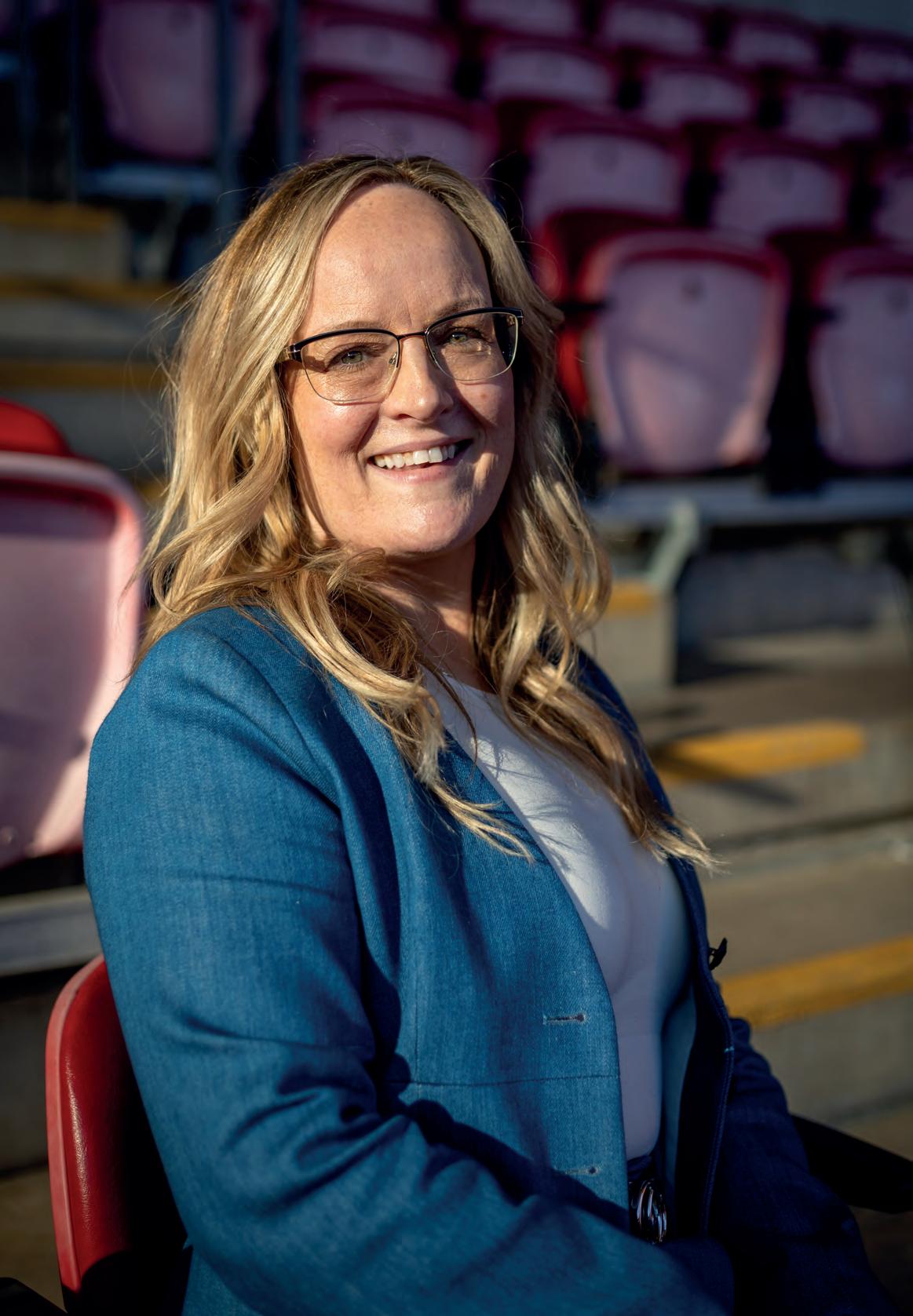
I had the right attitude, the right culture and a willingness to learn
Yvonne Harrison was appointed CEO of Women in Football in 2022. She tells Tom Walker how her 20-year career in sport led her to her ‘dream role
Yvonne Harrison has always been passionate about sport. Her drive to work in the sports sector led her to first study for a leisure management degree at Salford University and then volunteer for GreaterSport – a Manchester-based charity dedicated to promoting physical activity and sport to improve lives. What started as a six-week work experience stint at GreaterSport turned into a job at the organisation, as Harrison accepted a parttime role as an assistant club and volunteer development officer after her graduation.
Just four years later, she was applying for her first senior management role, Head of Sport, at GreaterSport and secured the role after going up against people who had, in her own words, “a lot more experience”.
“I had the right attitude, the right culture and a willingness to learn,” Harrison says. She got the role as Head of Sport in 2005 and hasn’t looked back since. In 2012 she was named deputy CEO of the charity and two years later was appointed as CEO. In total, she spent 14 years at GreaterSport, which has since become GM Moving and is hailed as a pioneering example of how physical activity and sport can help change lives for the better on a major scale.
“I’m really proud of the impact we had,” Harrison says. “We created the first MOU between Sport England and a city region. We were also one of the first places with a devolved health authority. It was groundbreaking work which had a huge impact and galvanised the whole of Greater Manchester in the movement we now know as GM Moving.”
Headhunted by a legend
Harrison’s work at GreaterSport hadn’t gone unnoticed. In 2018 following a spell working with former Manchester United and England footballer Gary Neville and Salford City Football Club to establish their community impact approach, she left GreaterSport to work directly for him. Neville – who has become a serial entrepreneur following his football career – wanted Harrison to lead the Project 92 portfolio of projects, which spans a number of businesses set up by the “Class of 92” (a group of former Manchester United stars) across sport and education.
Working closely with Neville as Managing Director of Project 92, Harrison was instrumental in the successful launch of University Academy 92 (UA92), a higher education institution based in Manchester. The ethos of UA92 is to offer broader courses than traditional degrees – designed to enhance life skills as well as employability. At UA92, Harrison was tasked with establishing a unique partnership framework and developing a partner pipeline to support both commercial revenue and student experience.
As a
fan,
Neville wasn’t exactly what I had in mind
“As a lifelong Liverpool fan, working with Gary Neville wasn’t exactly what I had in mind,” Harrison says with a smile. “In fact, the Class of 92 lads pretty much ruined my childhood.
“But he’s an incredible person and we remain friends to this day. I’m not surprised in the slightest that he is so successful. The concept of UA92 is insanely brilliant. I’ve completed one undergraduate and two master’s degrees, and I can safely say that had UA92 existed when I was younger, I would’ve been in there like a shot.” Yvonne is currently Chair of Trustees for Foundation 92, the Class of 92’s charity and official charity of Salford City FC.
After leaving Project 92, Harrison set up as a consultant and worked with a wide range of clients, from sports-focused private equity firms to the English Premier League. Then, in 2022 what she describes as her dream job came up when a recruiter contacted her to discuss the role of Chief Executive of Women in Football (WIF).
The day Jane Purdon (the previous Women in Football CEO) announced she was leaving, my phone blew up. So many people got in touch to say that if there ever was ever a job for me, it’d be this. At the time I was working for myself and I wasn’t looking for a job, but from the moment the role came up I was very interested. I put my hat in the ring and, after a pretty robust process, I was offered the role. I then had a decision to make, because I had my own business and the plan hadn’t been to get a job!
It was actually a big decision for me, but I came to the conclusion that it was just too good to turn down. This job has everything. It has both national and international perspectives but above all – it’s football. I love all sports, but I particularly love football. I love being in and around the game.
It’s a cliché but no two days are the same. There’s a media facing role and a commercial role, for example, because we’re not a charity. We’re not funded by anyone, so we have to generate all of our own revenue.
I hadn’t actually quite realised how intense the role would be. That was a big wake up call when I first started. But what helps with that is that there’s this great, big purpose to WIF which is easy to get behind. And, as you advance in your career and find yourself in senior roles, purpose becomes even more important.
Purpose really matters to me. I believe I can get anyone on the bus, so to say. If I care about the cause I can convince people that it is important and bring them on the journey with me. In this role that is important.

It’s also great having a team around me again, after spending some time in the consultancy space. It’s a slightly different dynamic, because the team is remote – and I’ve not really worked with a remote team before – so that’s been quite interesting and a challenge adjusting initially.
It’s certainly a role which gives me the opportunity to test myself in different ways to those before!
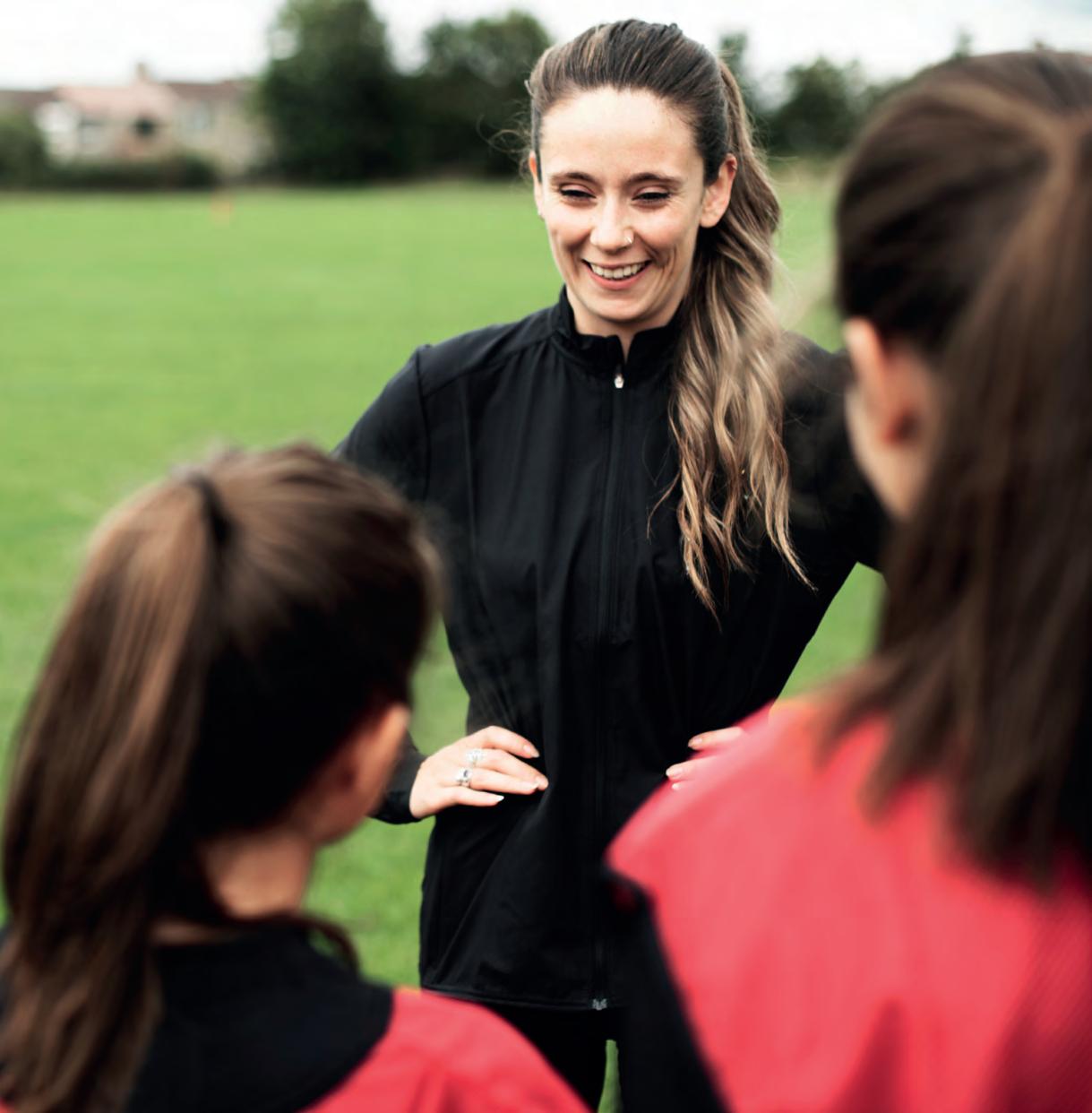
For those unfamiliar with WIF, what is it and what does it do?
In short, we’re a membership organisation – a network of professionals working in and around the football industry who support and champion their peers. We’re here to drive gender equality across the football workforce – from boot rooms to boardrooms – across both the men’s and women’s games. I think that’s really important to mention and to recognise, because there’s sometimes a perception we’re just about women’s football – and we’re not.
We have more than 11,500 members now and a big part of our work is to support all of those individuals. That support ranges from professional development, celebrating their success and organising events to, unfortunately, in some cases, referring them for free legal advice.
We offer leadership courses and have a whole range of different products and programmes that people can engage with and we try to do the majority of what we offer for free. Our
Women’s football is thriving at all levels, helping to raise women’s profiles within the sport in general
professional development is slightly different and there are costs attached to some of that, but that’s where our commercial partners come in, which is a really important part of our work.
In addition to supporting our membership, we also try to drive change within the industry. We work with clubs, organisations and brands that are in and around the football industry and increase awareness of women in the sector. We want to help them create great places for women to work and ensure women can thrive in footballing environments that make them want to stay.
We know that 89% of women that responded to our workforce survey last year said that they’ve experienced gender-based discrimination in their jobs and roles. We know that of those women who experienced and reported it, 60% said nothing happened. Another 16% said nobody even wanted to listen to them. So we know that some of the environments within football are not conducive to women thriving.
in which women are empowered to be successful and thrive, they will be able to support others
What we want the football industry to recognise is that when you create an environment in which women are empowered to thrive, they will be able to support others. The whole workforce benefits from that. Helping to drive the industry towards that change is a big part of our work.
As well as working with leagues, clubs and federations we work with the government. An example of that is the way we’ve lobbied for the forthcoming football’s governance code to include equity, quality, diversity and inclusion. We are an organisation for anyone who works in football. More than 50% of our members are under the age of 35 and 82% of our members are women. That means that we have male and non-binary members as allies as well. That’s so important too – that men know that they are welcome to be part of the drive to change football.
As part of its mission to support those working in the sport, Women in Football organises courses designed to provide women with the tools and confidence to become leaders. The training takes place over four days in two-day blocks. What makes the WIF leadership courses different is that they are delivered by women who have lived experience of working in the football industry. The courses are hugely popular, with more than 650 people already having gone through the programme (the courses also have a 100% Net Promoter Score).
You are currently working on a new strategy?
Yes, our current strategy comes to an end this year (2025). We’re deep in new strategy development right now, and we had a session with the board on the 12th of May. The plan is for the new strategy to be more of an evolution than a revolution of the current one.
We’re now strong conveners when it comes to gender equality and inclusion in football and we plan to lean even more into that space, in terms of bringing together partners and creating better environments for women – whether it’s watching the game, playing the game, or working in it.
Our “niche” is the football workforce. It is an exciting time for WIF – and also for me personally, as this will be the first time that I will be involved in creating the strategy, working with the board and our team.
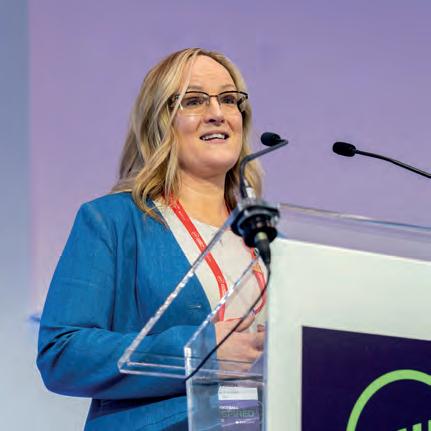

Describing the programme, Harrison said: “We have incredible stories of women who either came into the industry by accident or weren’t “football people”. After going through the programme, they have been able to climb the ladder and take on new, more senior roles. In some cases, it’s about upskilling and giving them the confidence to ask for a promotion; in others their employers have actually designed an entirely new job for them. That’s something we’re really proud of.” For more information on the courses, visit: https://www.womeninfootball. co.uk/career-development/leadership-courses/ To become a Women in Football member, visit: https://www.womeninfootball.co.uk/join-us/
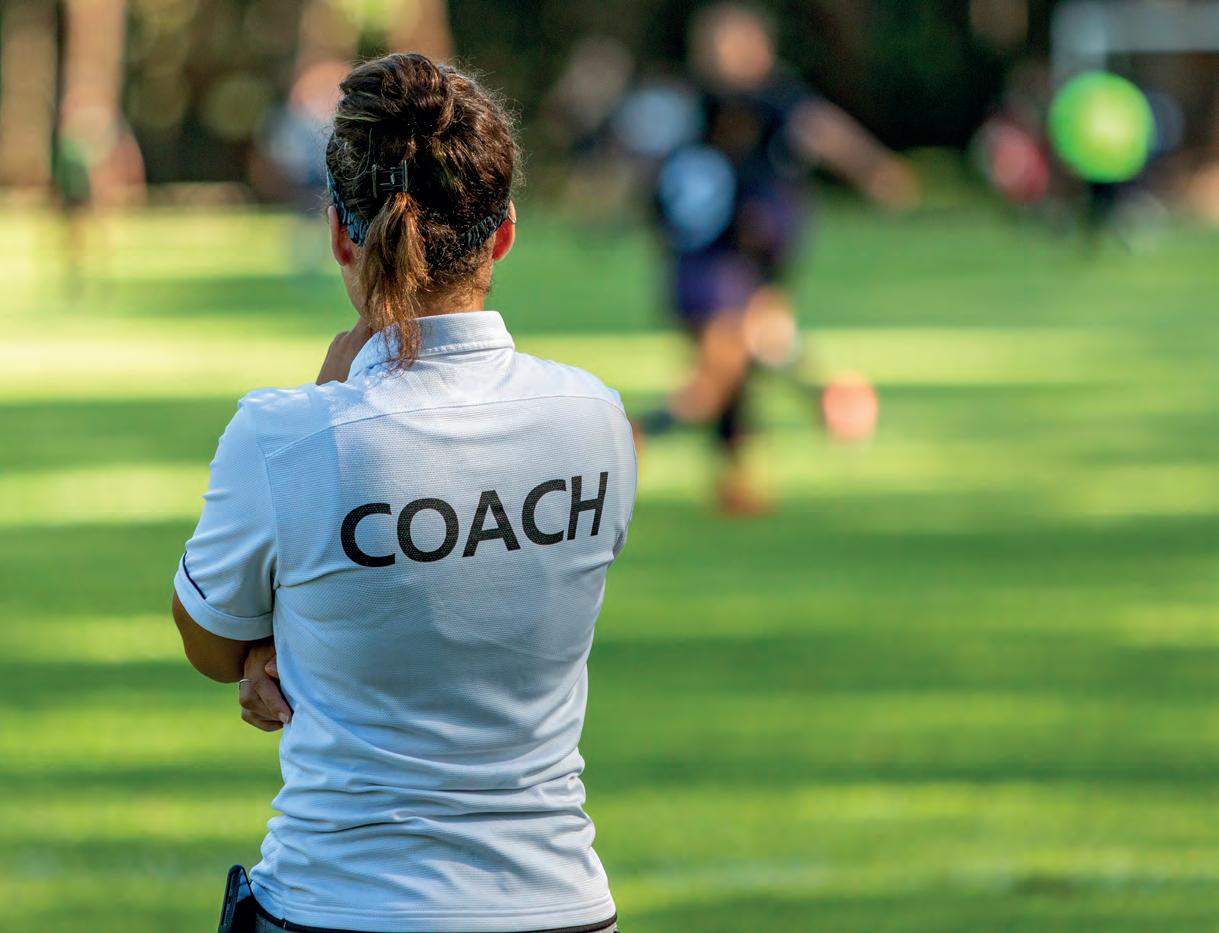
How do you measure the success of what WIF does? Do you have certain targets, for example? We do have targets, some of which were set in the current strategy – and some of those we’ve exceeded already. For example, we are now well over 11,000 members, which has exceeded our target.
In terms of goals and measuring success, what I’m focused on is improving the quality of the understanding we have of our members. For example, we didn’t have a CRM system three years ago. We have one now.
We already know a lot about our membership – who they are and what they do. But what I want us to be able to do is go deeper than that. To split our membership not only by their specific roles, but, for example, in terms of their stage of career.
That’s something I want us to consider in the next iteration of our strategy. The ability to be able to talk to our members about topics in a way that is going to be really relevant to them. That will be challenging but an important progression of our work.
The thing with targets is that they need to mean something – and be achievable. I’d love to
be able to say that we want the percentage of women that experience gender discrimination to go down, as an example, from 89% to 70%. But I’m not in control of that. So it’s about recognising what we can control and what we can influence.
When WIF was first developed and launched, back in 2007, it was more of an activist organisation. It was probably more about shouting to correct organisations, as that’s what was needed at the time. Because it was terrible back in the day, the way many women were treated in football.
Today, that’s not who we are. And to be honest, I couldn’t have led an organisation that was like that, because that’s not who I am. I’m very collaborative, but it’s an important part of our history and shaped where we are today
We’re in a good place at the moment, there is great momentum behind us and we are seeing change happening. It is now our job to keep strengthening our partnerships, adding new ones and working with everyone in the industry to accelerate the pace of change.
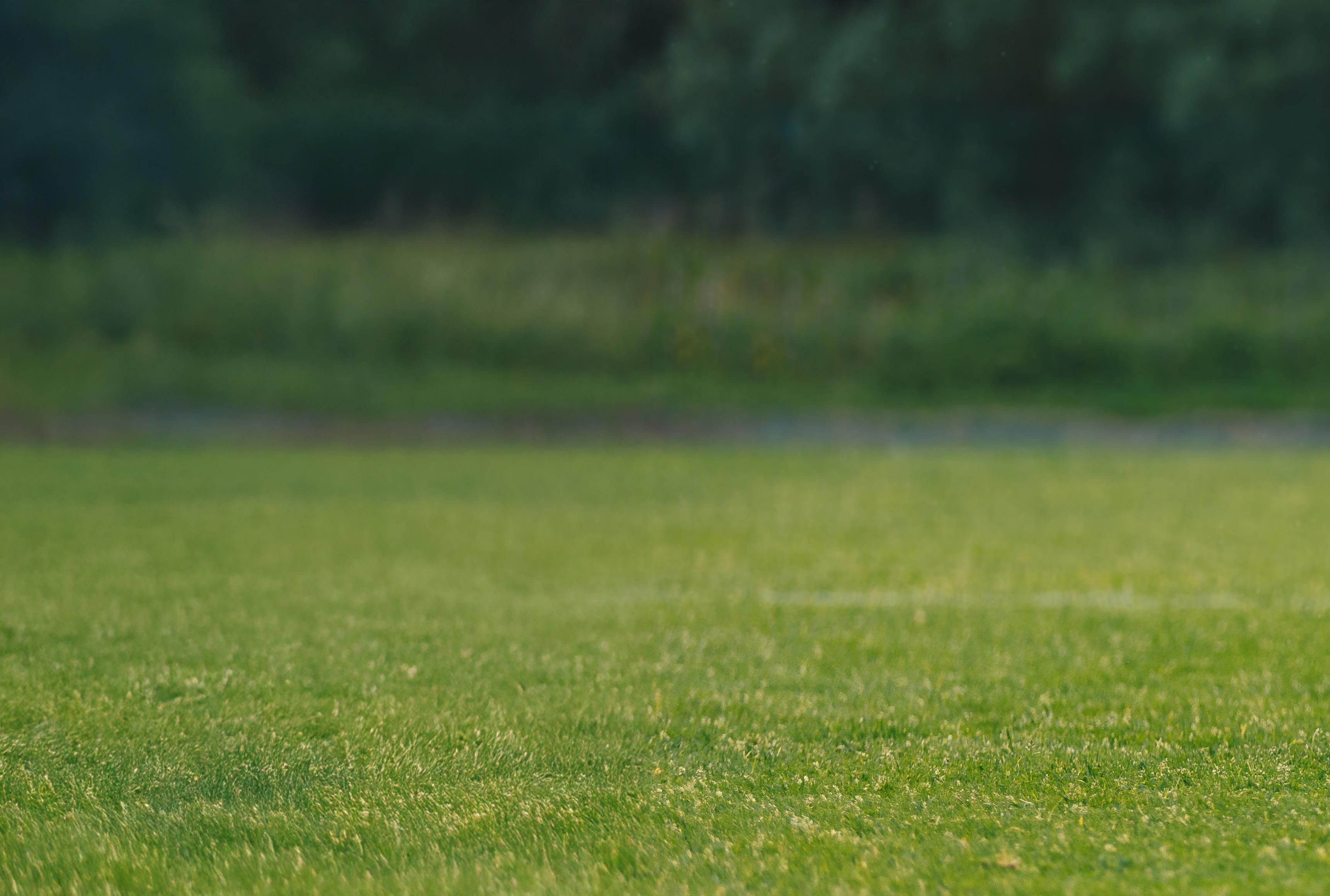
Schmitz Foam has further expanded its product portfolio with the innovative new ProField roll foam shock pads
SAPCA member, Schmitz Foam, has expanded its product range with the introduction of ProField, a new line of roll foam shock pads designed to meet the growing demand in the artificial turf market. The addition of ProField provides artificial turf manufacturers and contractors with an innovative solution alongside the existing ProPlay range. ProField offers a high-quality choice for sports fields that must meet the highest standards.
“With ProField added to our portfolio, we now offer roll foam shock pads, giving our customers a broader selection. This enables us to cooperate with project stakeholders and recommend the most suitable shock pad for their specific needs,” said Marc Ganzeboom, Sales Manager Sports & Play at Schmitz Foam. “We expect ProField to become a valued option for turf manufacturers and contractors who focus on quality and efficiency.”
“The artificial turf industry knows us for ProPlay, made from 100% recycled polyethylene foam. ProField, however, is ideal for applications where quick and efficient installation is critical,” explains Ganzeboom. “With ProField, we significantly reduce installation time, offering an advantage for turf producers and contractors.”

analysis of existing shock pads in the market. “By configuring our own roll foam with a double-sided laminated fleece, we were able to create a product that not only meets the strictest tests for shock absorption and dynamic fatigue but also performs on vertical drainage capacity,” explains Marcel Spaan, Application Engineer at Schmitz Foam.
ProField is not only technically advanced but also sustainable. Up to 30% of the material is recycled, and at the end of its lifespan, the product can be upcycled at Schmitz Foam, positioning the company uniquely in the market. Ganzeboom emphasises: “We can recycle both ProPlay and ProField at Schmitz Foam, allowing us to manage the entire product lifecycle and contribute to a circular economy.”
ProField will be available to artificial turf manufacturers starting this spring. With this new product line, Schmitz Foam underscores its commitment to providing flexible and sustainable solutions for the artificial turf market.







Schmitz Foam Products, a family-owned business founded in 1935, has been a pioneer in the artificial turf industry for decades, specializing in high-quality shock pads that provide safety, performance, and durability for athletes and children worldwide. Since the 1990s, we have set groundbreaking standards for shock pad technology, with a focus on comfort, safety, and environmental responsibility.
Schmitz Foam Products offers a comprehensive range of shock pads, including:
ProPlay: Made from high-quality recycled foam, it provides exceptional shock absorption, safety, and a long lifespan for artificial turf fields.
ProField: A roll foam shock pad consisting of up to 30% recycled material, offering superior durability and shock absorption, while being cost-effective for contemporary synthetic turf sports systems.




What truly sets Schmitz Foam apart is our commitment to a circular economy. We recycle foam residues into highquality new foam products, creating sustainable and safe sports and play environments in over 80 countries. Our products are manufactured in Roermond (NL) and Coldwater (USA), come with a 25-year warranty, and comply with strict international standards, including EN 15330-4.














































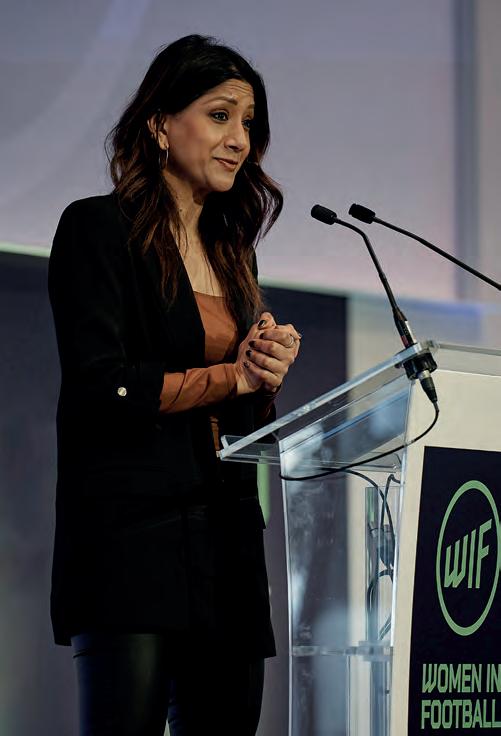
event
More than 500 delegates packed into Wembley Stadium for the fourth annual Be Inspired Conference, organised by Women in Football. Tom Walker reports from the event, where one of the themes was “shaping the future”

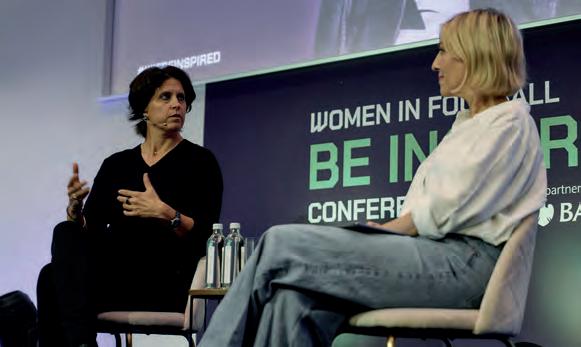
The day brought together more than 500 delegates from across football
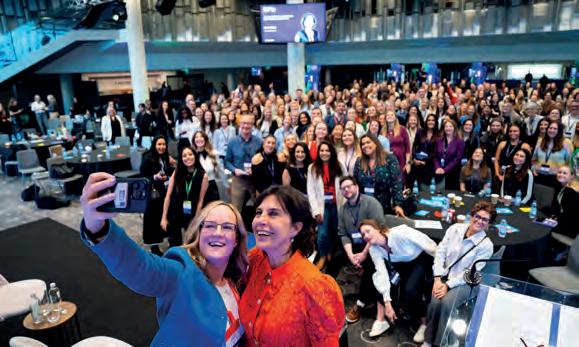
The fourth Women in Football Be Inspired Conference saw more than 500 delegates attend a combination of keynote speeches and break out sessions at Wembley Stadium on 26 March.
Sports broadcaster and the host for the day, Reshmin Chowdhury, opened the morning session by stating that the event – and Women in Football (WIF) as an organisation – wasn’t “just a sisterhood”, but a “support network, where everyone is there to give and to support”.
The first session of the day also included a landmark moment for WIF, as it became a signatory to the Brighton Plus Helsinki Declaration on Women and Sport.
Developed and established by the International Working Group (IWG) on Women and Sport, the international treaty has become a road map to support the ongoing development of a more fair and equitable system of sport and physical activity, fully inclusive of women and girls.
Lisa O’Keefe, Secretary General of IWG Women & Sport, took to the stage and asked the crowd for a favour: “We need your knowledge,” she said. “Where you’re making change, we want to hear it.
In total, the day included nearly 20 different sessions, with topics covering everything from commercial opportunities in the professional women’s game to the social impact of grassroots female football. At times, up to flour parallel sessions were running at a time,
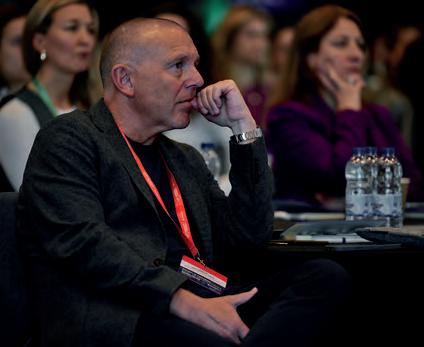
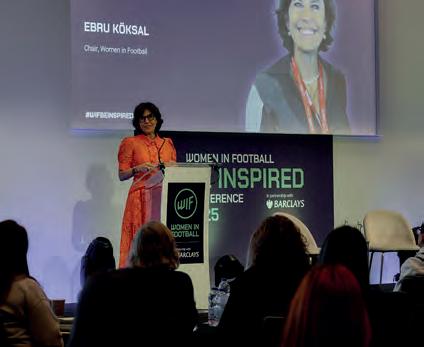











which meant that delegates were spoilt for choice when it came to picking inspiring talks and topics.
The first plenary session of the day was hosted by Sky Sports News anchor presenter Hayley McQueen and featured Maggie Murphy (sports business and strategy consultant), Matthew Ryder KC (Premier League independent non-executive director) and Kelly Simmons OBE (sports consultant). The panel discussed a number of topics, from driving systemic change in the football industry to the potential impact of quotas and legislation to influence wider representation at every level of governance. On that, Ryder talked about the importance of setting targets to increase representation behind the scenes, especially so with his work in the Premier League.
“You have to strike a balance between telling people what to do and setting/emphasising targets for clubs,” he said.
“I believe that when you set targets to reach standards, you don’t lower the standards. It forces you to look harder for the talent that is out there.”
He also shared that the Premier League has set a target of employing 50% women by 2031, emphasising the need for setting these high standards.
When talking about driving change, Simmons – a former Director of Women’s Professional Game with the FA – said: “We want to help women to get into these 150-year-old football structures. We want to create an environment that women can thrive and excel in.”
“The rapid growth of the women’s game across the world hasn’t been matched by big change when it comes
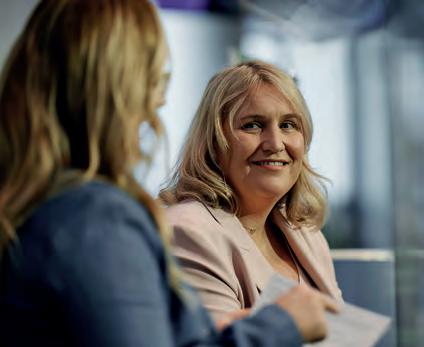















to women working in senior and executive roles. It has been slow and is holding back the women’s game.”
Delegates then heard from Emma Hayes OBE, the Head Coach of the US Women’s National Team – arguably one of the most high profile women in the world of football today.
Among the highlights in the afternoon was a breakout session which discussed the need for positive change among oganisations. The strong line up of panellists included Justine Roberts CBE, founder and CEO, Mumsnet; Yasir Mirza, the FA’s Director of EDI; Martina Pavlová, Women’s Vice-Chair at ECA and Neil Saunders, Director of Football at The Premier League. Titled “The Business of Change”, the session’s discussion focused on how football can better reach out to support communities and the wider world – especially when it comes to creating spaces and opportunities for women and girls.
Neil Saunders stated that football needs to ensure that it “represents those who aren’t represented” and involves all parts of society. “Change doesn’t happen overnight – but we’re starting to see it,” he said. “We need to celebrate our successes and small wins and the investment that’s been made.”
Justine Roberts then concluded the session with a message that reflected many of the discussions during the day. “Football is on a journey”, Roberts said. “But football is not representative enough at the top. We’ve got a way to go.”
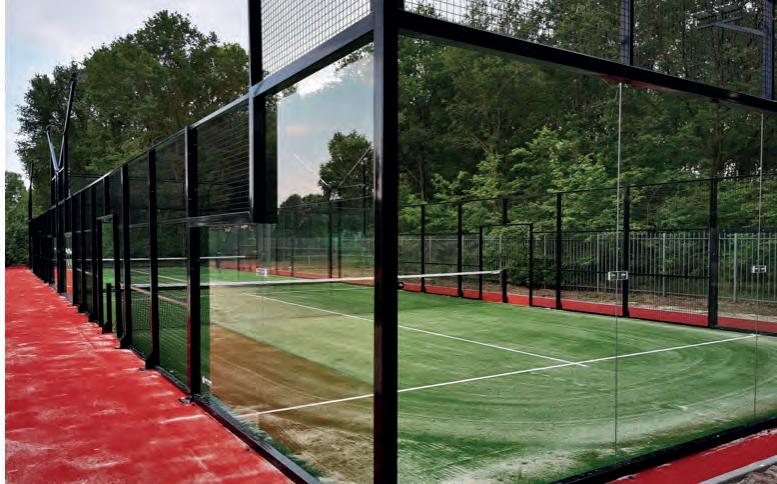
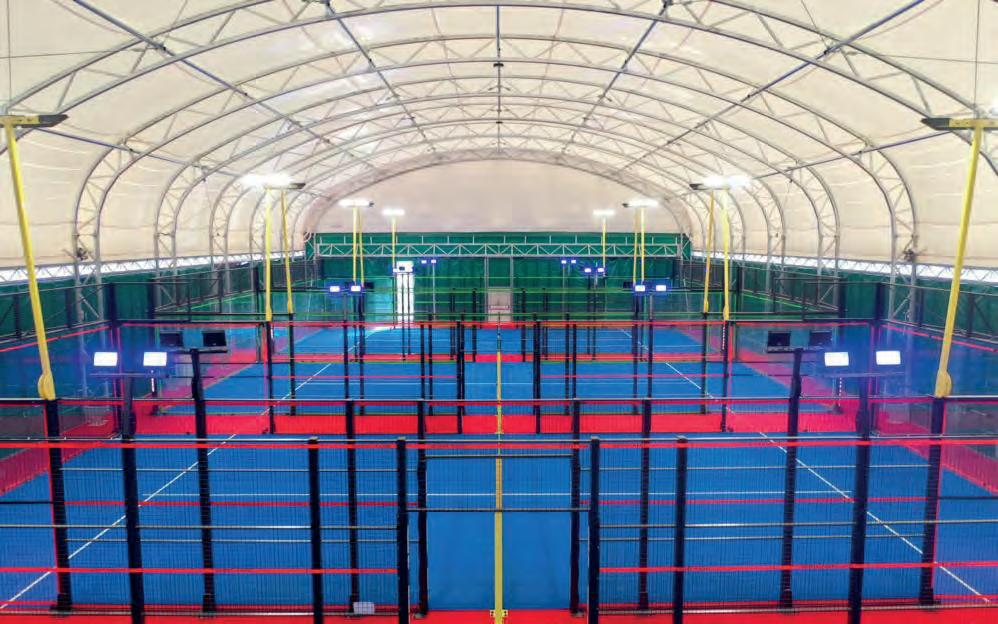
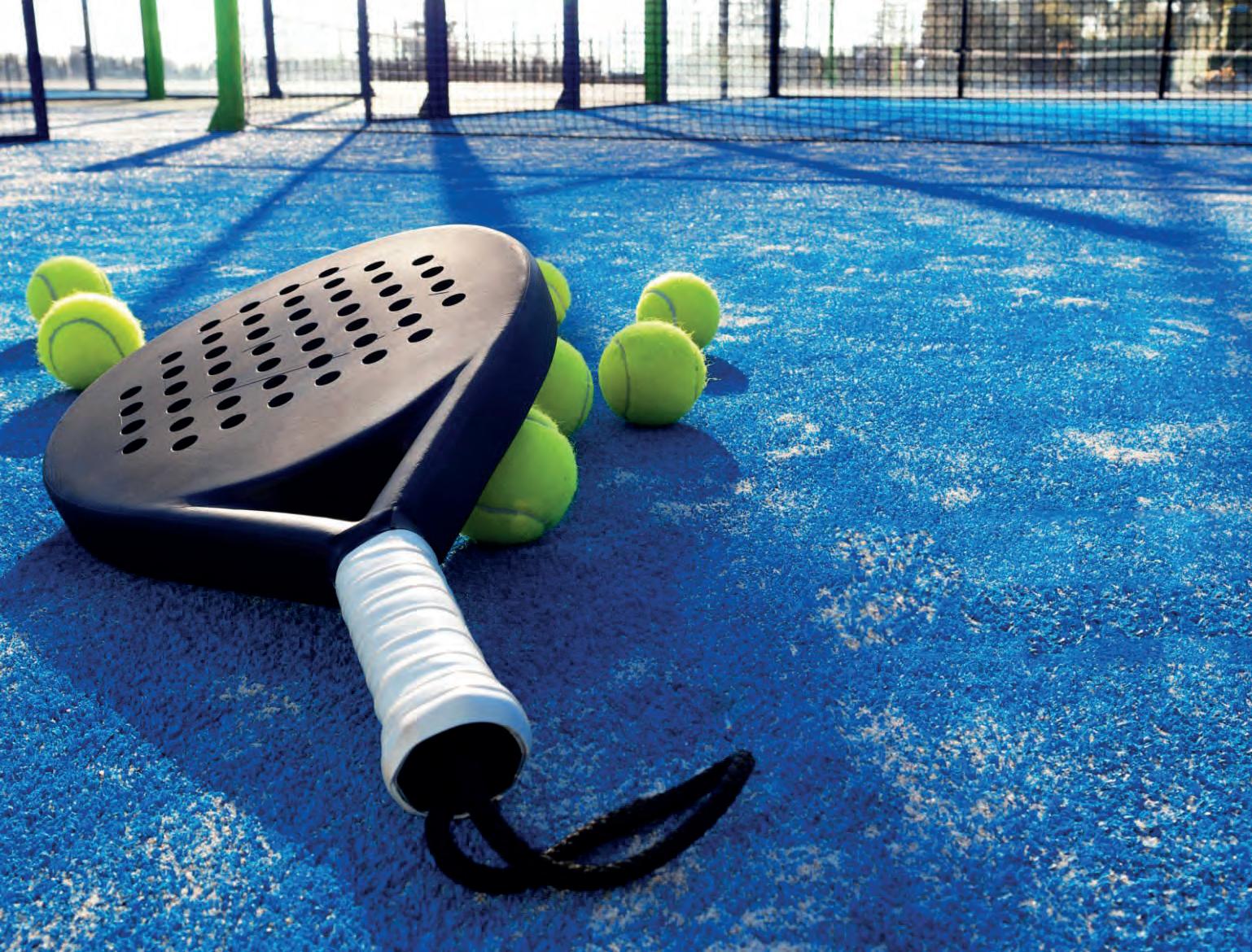


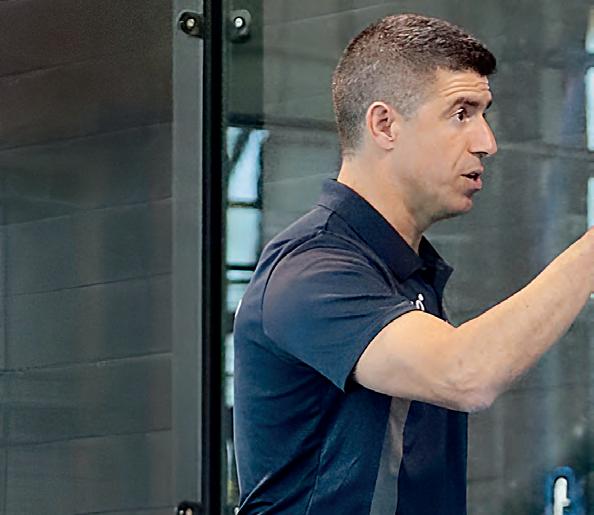
new players? Are operators missing out on

is the
with the exploding popularity?

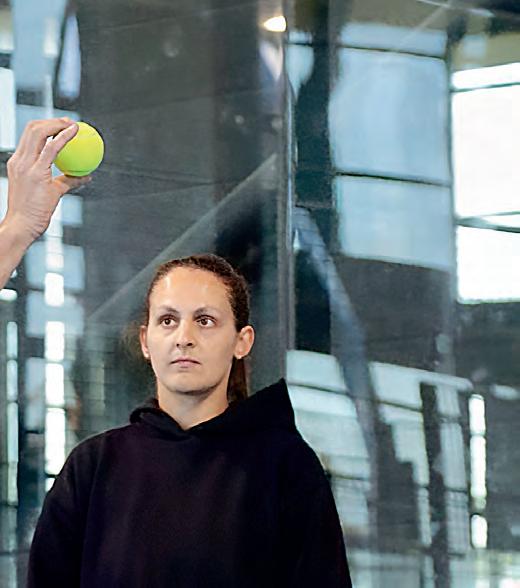

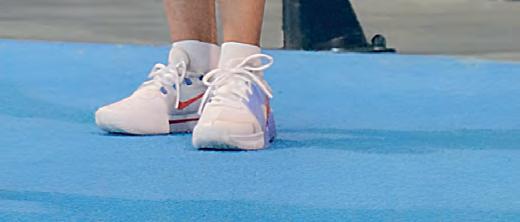
Ready to smash your goals with a team that’s at the top of their game?
Working with Fordingbridge was a breath of fresh air! One of the most professional, respectful and diligent contractors we’ve ever worked with. Would highly recommend and certainly use them again.
Steve Mills, General Manager, Nottingham Tennis Centre
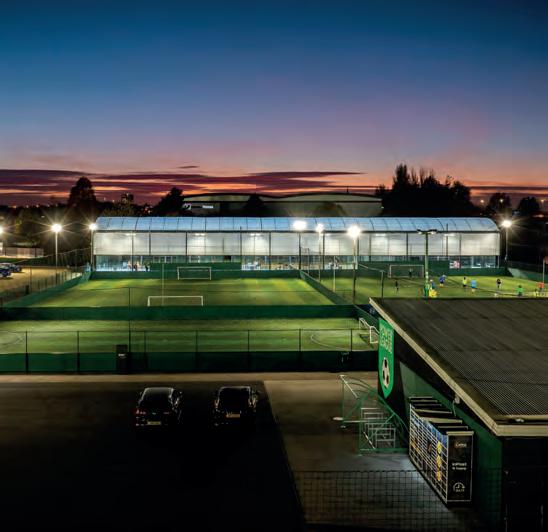
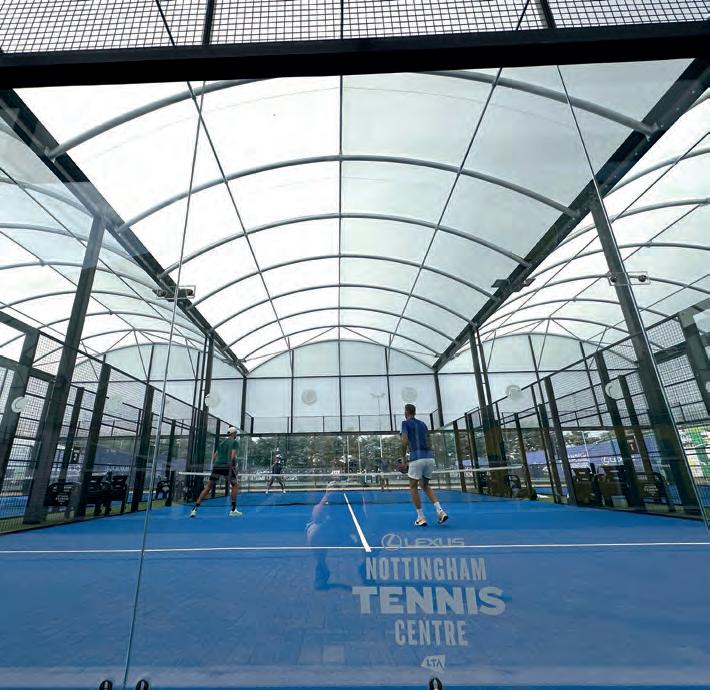
5 benefits of working with the UK’s leading padel court canopy provider:
✔ Bespoke solutions to meet your exact needs
✔ Expert teams looking after your build from design to installation
✔ All canopies fully compliant with SAPCA’s code of practice
✔ All projects meet the highest sustainability standards
✔ Industry leading 25-year guarantees on every structure
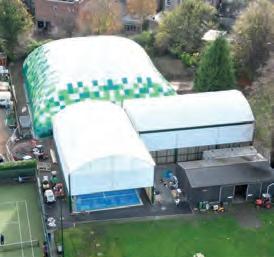
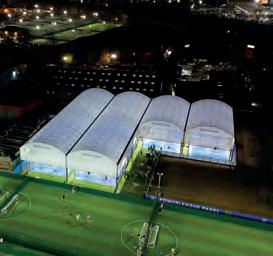
The number of people who played padel at least once more than trebled in 2024, according to figures from the LTA, the sport’s national governing body. More than 400,000 adults and juniors took the court at least once during last year, up from 129,000 in 2023. The figure has grown exponentially – in 2019 just 15,000 people played at least once, but by 2021 the number had grown to 89,000.
Meanwhile, latest data from Sport England’ Active Lives survey – which tracks the number of adults who play twice monthly – shows that the number of regular players has doubled in a year, from 23,000 in 2022-23 to 51,000 in 2023-24. The growth in demand is mirrored by a rapidly expanding infrastructure, with 893 padel courts now available across 300 venues across Britain.
According to the LTA, it has invested more than £6 million
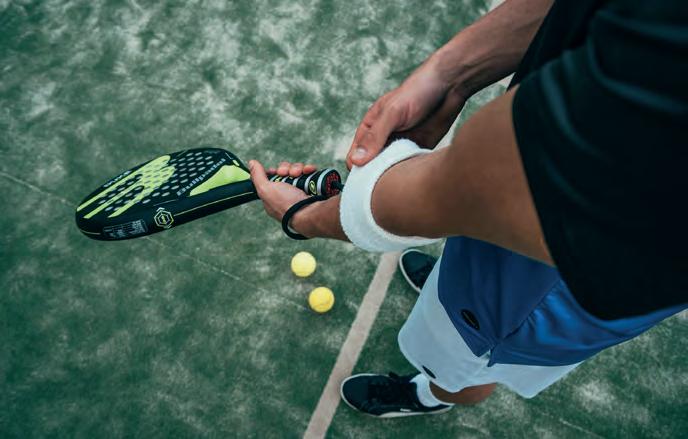
More than 400,000 adults and juniors took the court in 2024
in the growth of padel across Britain, including £4.5 million towards the development of 80 courts at 42 venues – which it says represents approximately 10% of all padel courts nationwide.
The LTA says that, according to its data, awareness of padel among
adults reached 43% of the population (approximately 23 million individuals) in the first quarter of 2025, representing a significant increase from 23% (12 million) during the same period in the previous year. The LTA has also launched a dedicated padel website (ltapadel.org.uk).
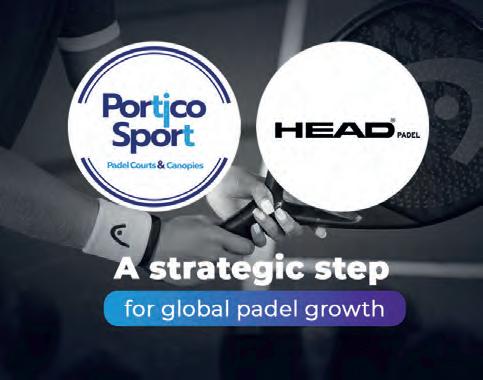
Equipment brand Head Padel and Portico Sport – a padel court manufacturer – have agreed a strategic partnership aimed at supporting the global growth of padel. As part of this partnership, Portico Sport will market exclusive padel courts with Head’s branding.
The two partners will also support court growth on a global scale while offering countries a range of padel equipment.
Guillermo Maldonado, Director at Portico Sport, said: “By combining our expertise in padel court construction with HEAD’s leadership in padel equipment, we are offering a truly comprehensive solution for clubs and players worldwide. This collaboration strengthens our international presence and also plays a pivotal role in shaping the future of padel as a global sport.”
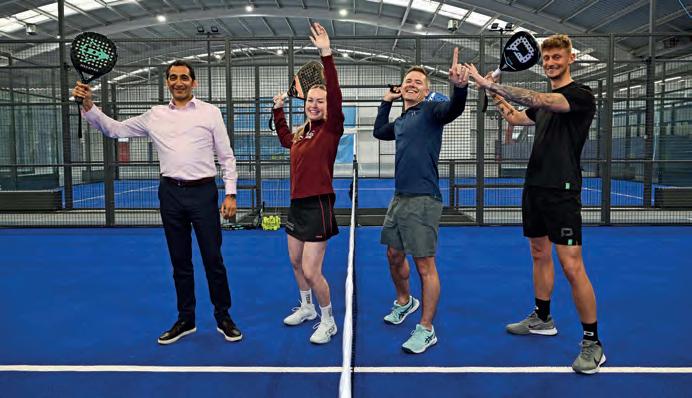
Padel has arrived in Sandwell, with three new ‘Padel’ courts now open at Tipton Sports Academy (TSA) in the Black Country.
The launch of the three new indoor courts follows a £155,000 investment.
TSA is one of eight centres maintained and run by Sandwell Leisure Trust (SLT) on behalf of Sandwell Council.
Mark Braithwaite, Chief Executive at Sandwell Leisure Trust, is already an avid padel player.
“I‘m delighted to be bringing these fantastic indoor padel courts
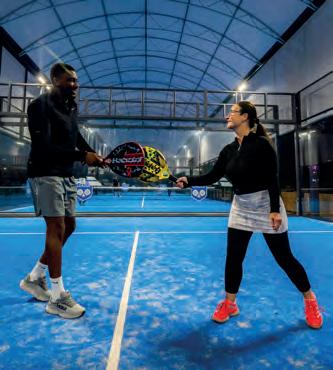
to Tipton Sports Academy as we continue to look for new ways to engage more people in physical activity and enjoy healthy lives.
“Playing padel is an ideal way to socialise with family, friends or other enthusiasts for a fun game, because it’s so easy to play and pick up for all ages, abilities and fitness levels.”
Shokat Lal, CEO of Sandwell Council, added: “This is another first for the borough and I am thrilled we are bringing padel, the fastest growing participation sport in the world, right here to Tipton with these new courts.”
University of Surrey (UoS) has announced plans to build new padel facilities at its sports campus in Guildford. The proposals for Surrey Sports Park consist of 10 covered padel courts, including a show court for elite tournaments. It will also contain a large clubhouse, a cafe, a bar, an extensive social area, and a retail offering.
UoS says it will be the biggest padel facility in Surrey and in the higher education sector, subject to planning permission.
The university is partnering with PadelStars to develop the new facility, which is planned to open in 2026.
Andy Knee, PadelStars CEO, said: “Surrey Sports Park (SSP) is a great partner for us: with a very large number of students on-site, many thousands of members, a broad multi-sport offer and a really progressive team of people driving SSP forward, we know that together we will create an incredibly vibrant home for padel in Guildford and beyond.”
Small-sided football operater, Powerleague, is making its biggest-ever move into padel, announcing a £2.2 million investment to bring 11 new courts to Scotland by the end of 2025.
As part of a wider £14 million UK expansion, this Scottish rollout will see padel courts open at three
major Powerleague clubs: Paisley (4 courts), Portobello (3), and Sighthill (4). The first site, Paisley, opens this July. All three sites will also feature newly refurbished bars and clubhouses—ideal for players to socialise before and after matches. It is considered the largest padel infrastructure investment in Scotland.


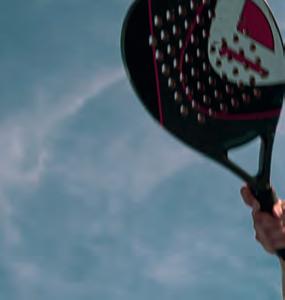

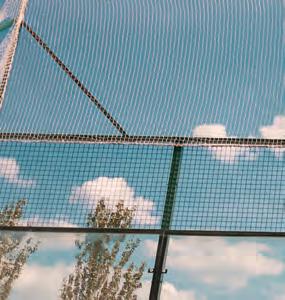




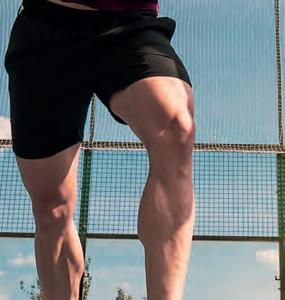
















Launching at Active Net Padel on 3 June 2025 Radisson Blu Hotel, Stansted CM24 1PP


Ray Algar – a leading physical activity and fitness strategist and researcher – has published a comprehensive UK Padel Report. In it, he says that discovering the motivations behind so many people falling in love with padel can tell us a lot about the future of padel
As a lifelong racket sports player, I find it fascinating to explore the rise of padel in the UK, not just by playing the game but also by researching its growth and community.
When I set out to develop the UK Padel Report, one question stood out: What is it about padel that makes people want to come back? It is essential to understand motivation – why people play and what keeps them engaged. In an abundant and diverse exercise landscape, padel appears to be doing something different.

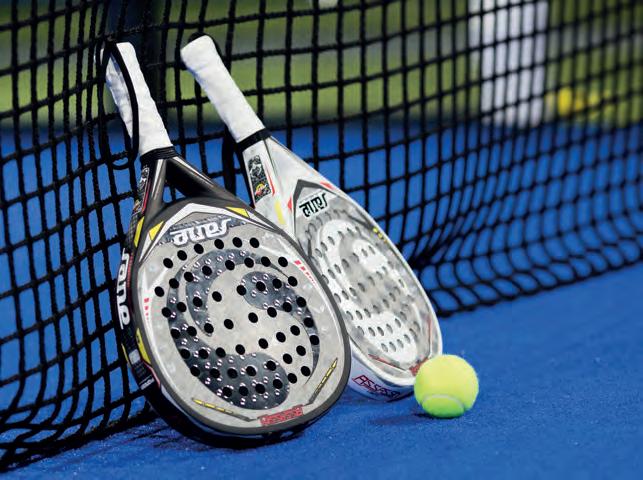









Understanding why people play
To explore what motivates people to play padel, we invited players aged 16 and over from across the UK to complete a detailed survey. In total, 302 players participated, a robust and meaningful sample given the relative size of the UK padel-playing community. While national opinion polls often use samples of 1,000 or more, those populations are in the tens of millions.
The study used the Motives for Physical Activity Measure, a validated 30-statement psychological instrument widely used in sport and exercise science. It assesses motivation across five domains:
1 Interest/enjoyment
2 Competence
3 Fitness
4 Social connection
5 Physical appearance
The findings provide important insights into the psychological drivers behind participation and what they might mean for long-term engagement in padel.
Intrinsic motivation: the core driver of retention
The data tells a consistent story: padel players are motivated by the experience. Enjoyment and skill development emerge as the strongest drivers, with fitness also playing a supporting role. These are all intrinsic motivations, which means people participate because the activity is inherently satisfying, not due to any external reward.

Social connection contributes yet remains secondary to enjoyment and competence. Appearance is a common motivator in gym settings, but ranks lowest in padel. This underscores that players are not showing up to look better, but to feel better through play, progress, and belonging. Our gender analysis shows that women place slightly more value on fitness and competence and score marginally higher on social motivation. This suggests that padel’s blend of health, learning, and community is particularly resonant with female players. The real opportunity now is to move beyond generic, one-size-fits-all programming. By understanding the different motivational profiles across age, gender, and experience levels, clubs and coaches can better tailor their environments, from how sessions are structured to the tone of their communications. Motivation is not fixed, and the more closely padel aligns with what matters to each player, the more likely they are to stay.

Padel players show up not to look better, but to feel better through play, progress, and belonging
In the gym sector, member retention remains a persistent challenge. Some studies show that 12-month member retention is around 52% (Dr Paul Bedford). This is often linked to extrinsic motivations, such as exercising for appearance goals or guilt, which tend to fade. In contrast, padel offers experiential loyalty: people play because they enjoy it, feel progress, and want to return. That difference makes padel a more durable and self-sustaining form of physical activity, which is a compelling public health story.









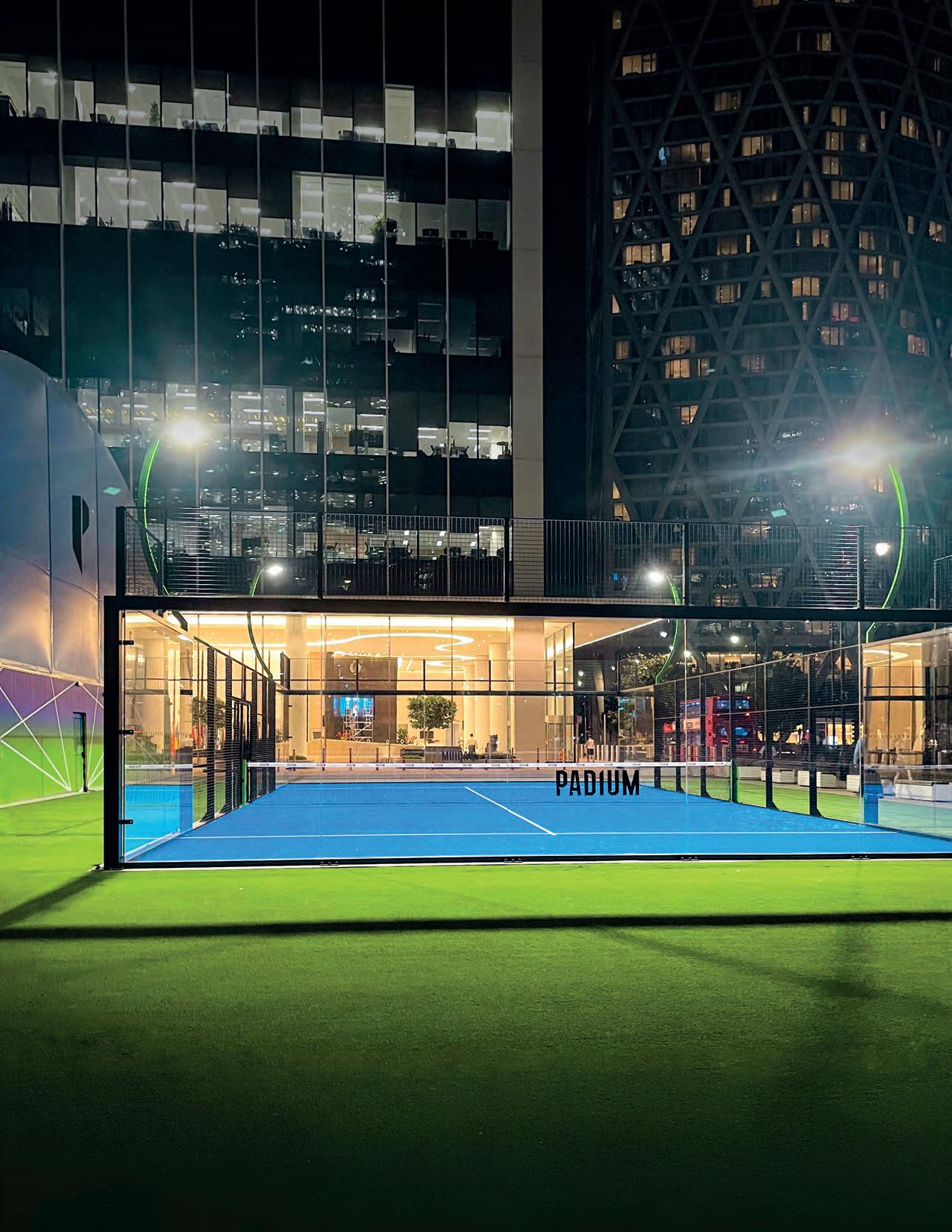





Padel is not simply something players are adding to their schedules—for many, it is replacing other activities. We found that 29% had reduced their time at the gym or in fitness classes, while 22% had cut back on tennis. Even leisure habits like watching TV (20%) and socialising (10%) were substituted for padel. This substitution behaviour highlights padel’s increasing significance in people’s lives. It is not just about fitting it in; it is being prioritised.

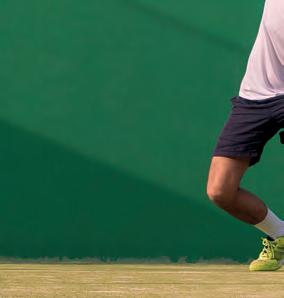


Padel is still growing rapidly in the UK and is not as mature as other European markets


Source: Substitution behaviour, UK Padel Report, Oxygen Consulting

As padel continues to grow, clubs and coaches must not just attract players but also keep them engaged. Our research reinforces a clear message: players stay when the experience is fun, purposeful, and intrinsically rewarding. That means designing sessions, pricing models, and environments that reflect what really matters to different players, whether it is joy, learning, social connection, or a sense of progress. Motivation is not one-size-fits-all. The full UK Padel Report explores these themes in greater depth.

This article draws on research published in the UK Padel Report, authored by Ray Algar of Oxygen Consulting.
Algar is the founder of Oxygen Consulting, which provides strategic insight, research, and advisory services to the global health, fitness and wellbeing industry. He is collaborating with Espalier Ventures to develop a network of community padel centres under the Ikigai Padel brand, focused on delivering social value through inclusivity, physical activity and public health.

Published in May 2025, the UK Padel Report offers the most comprehensive national analysis of player motivation, participation trends and infrastructure development. It also examines court pricing models and includes an in-depth review of the UK’s leading padel operators. The 94-page report is available for immediate download for £250 plus VAT, accessible via the following link: https://oxygen-consulting.co.uk/knowledge-store


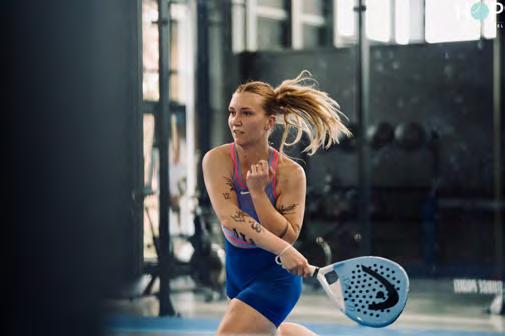
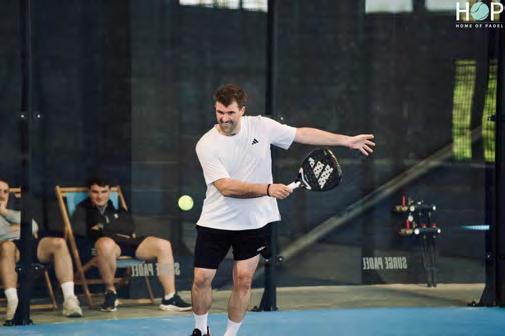

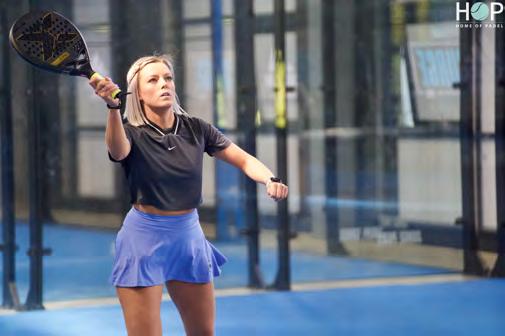


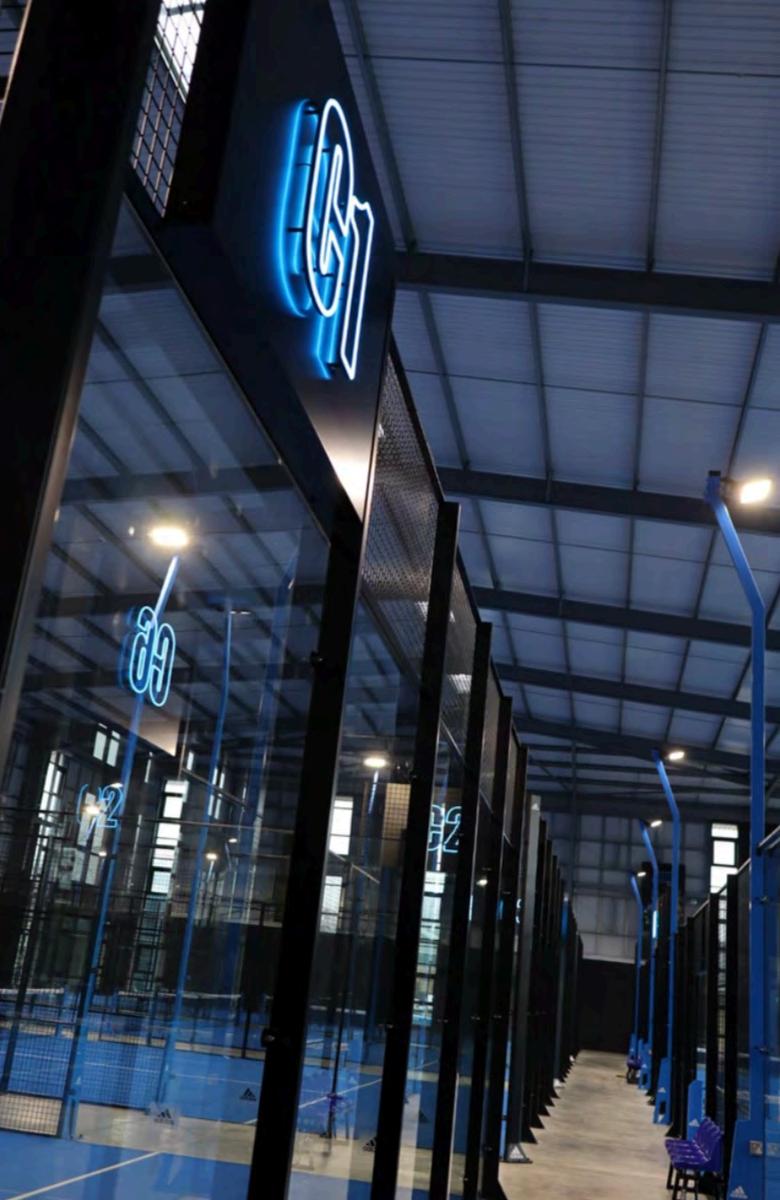
Adam Collier, Head of Sales & Padel at padel canopy and structures specialist, Fordingbridge, o ers his insights on the top trends shaping padel facilities in 2025
Padel facilities recognised as a ‘must have’
Until recently padel was predominantly played at racquet clubs, but now we’re seeing all kinds of sites waking up to padel’s unique draw. We’re currently working with existing fitness operators, rugby clubs, boat clubs, boutique hotels and education facilities to install allweather padel facilities that are becoming vital for attracting new members, guests and students.
With players increasingly demanding year-round access to padel play, canopies are becoming essential given the UK’s unpredictable weather. We recently covered one padel court at Manchester Padel Club and within months were back to cover a second due to high demand for the covered court had been so high. Expect to see stylish canopy installations become the norm, not the exception.
Padel after dark is becoming increasingly popular. As a result, expect to see more facilities investing in integrated LED lighting solutions paired with canopy structures. Also look for solutions like our unique Opal 60 canopy fabric that allows 60% light penetration to save on daylight lighting costs.

As padel demand continues to soar, appbased booking systems and real-time court availability tracking is becoming essential for managing peak demand efficiently.
In the early days of padel, clubs tended to be located on spacious sites, but as demand takes off, we’re seeing imaginative use of sites where space is at a premium. On these sites, design is key. Our high barrel-vaulted canopy at The Pollen Club in the middle of Manchester’s buzzy Deansgate creates a light-filled playing experience despite being surrounded by high-rise buildings.

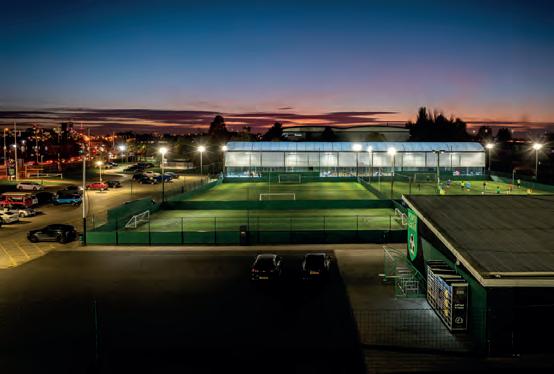
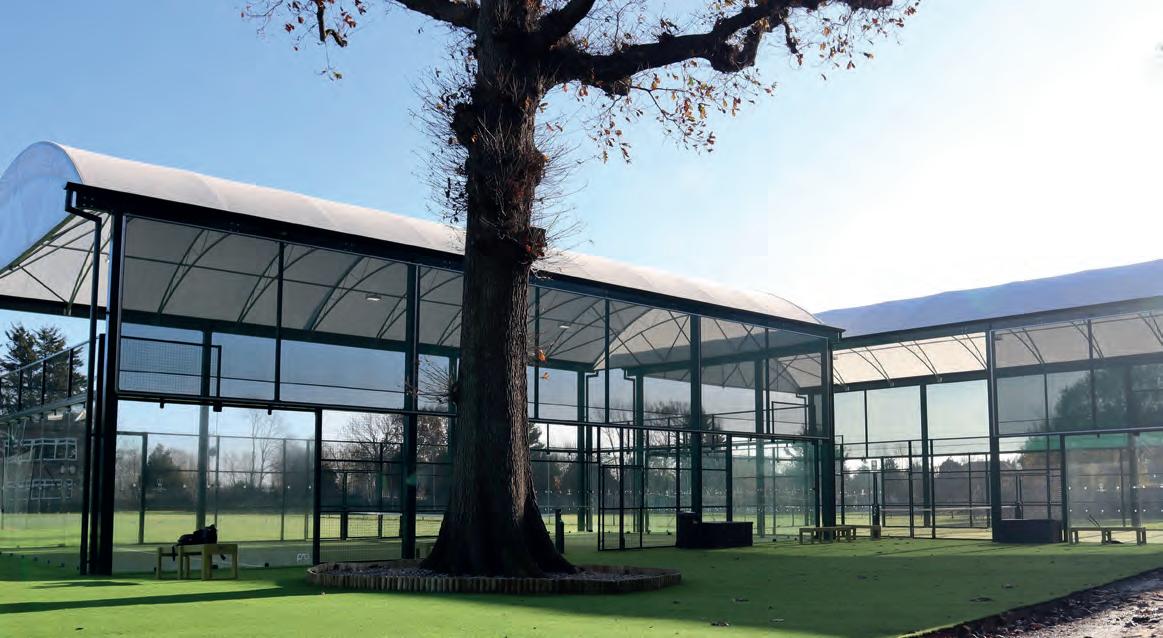
Adaptability is the name of the game. Clubs are turning to modular court systems and flexible canopy solutions that allow for quick expansion, easy maintenance, conversion, or even popup venues for events or tournaments. At Fordingbridge, all of our canopies are futureproofed to become enclosed or insulated at any time throughout the 25 year warranty period, making them a great asset as operators evolve.
Padel is one of the most social sports out there and that is central to its appeal. Expect clubs to expand amenities like covered viewing lounges and cafés to encourage spectators and social engagement.
With padel facilities now being built in all kinds of environments, we’re seeing an increasing awareness of aesthetics. We are adapting many of our canopy solutions using different materials such as timber and powder coated finishing, to aide successful planning submissions in greenbelt locations and locations designated as Areas of Outstanding Natural Beauty (AONB).
Taking weather protection up a notch, some high-end facilities are investing in climatecontrolled court covers with integrated heating solutions or mesh inserts to allow for temperature regulation and ventilation - offering a premium playing experience regardless of external conditions.


From solar panels on canopy roofs to living walls covered in plants or recycled canopy structure materials, eco-conscious design is gaining momentum, with facilities increasingly prioritising building practices that reduce their carbon footprint without compromising performance or aesthetics.
The first ever active-net Padel event will take place on 3 June, bringing together the leaders of the rapidly growing sector
The Radisson Blu Hotel at Stansted will host the inaugural active-net Padel event on 3 June. The one-day networking and education experience is designed to support the growth of the sector, bringing insight and opportunity to existing and new to market operators.
Designed to connect leisure operators, universities, private fitness providers and padel court operators with industry-leading suppliers, the event promises meaningful dialogue, expert insight and real opportunities for growth. Suppliers on the day will range from court manufacturers and franchise providers to marketing experts, health and safety specialists and service engineers, all offering a full spectrum of support for anyone considering an investment in padel.

Attendees can expect a packed schedule including educational seminars, twelve 1-to-1 meetings with relevant companies that they select, and dedicated networking slots. With 30 confirmed padel operators in attendance, this is a unique opportunity to connect with key decision-makers from across the leisure and fitness landscape.
The day will open with a Welcome Panel chaired by Mike Hill, Director of Active Insight, joined by Fabian David (Britain Padel Tour), Patrick Burge (Major Padel Club), and Gareth Evans (Padel Ventures).
Delegates can then choose between two expertled panels. The first is titled “The Data Behind the Opportunity”, chaired by Julie Allen (Active Insight), with Ray Algar (Oxygen Consulting) and Jake Bennett (Padel Ventures). The second, “Making the Most of the Investment”, will be chaired by Mike Hill, with insights from Gareth Evans, Andy Baker (SwimSpa) and Miguel Dominguez (Major Padel Club).
David Monkhouse, Director of active-net, commented: “We’re delighted to see the high level of response and enthusiasm for our first active-net Padel event. Now with seven events in total across the active-net series, our mission has remained the same, connecting people through insight and creating memorable experiences is at the core of what we do, so bringing that same structure with a padel focus is very exciting.
“We are looking forward to bringing better connections across the sector and empowering operators to take their businesses to the next level.”
If you are interested in understanding more about the active-net series, please visit www.active-net.org

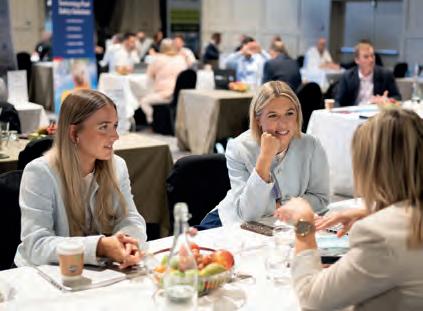

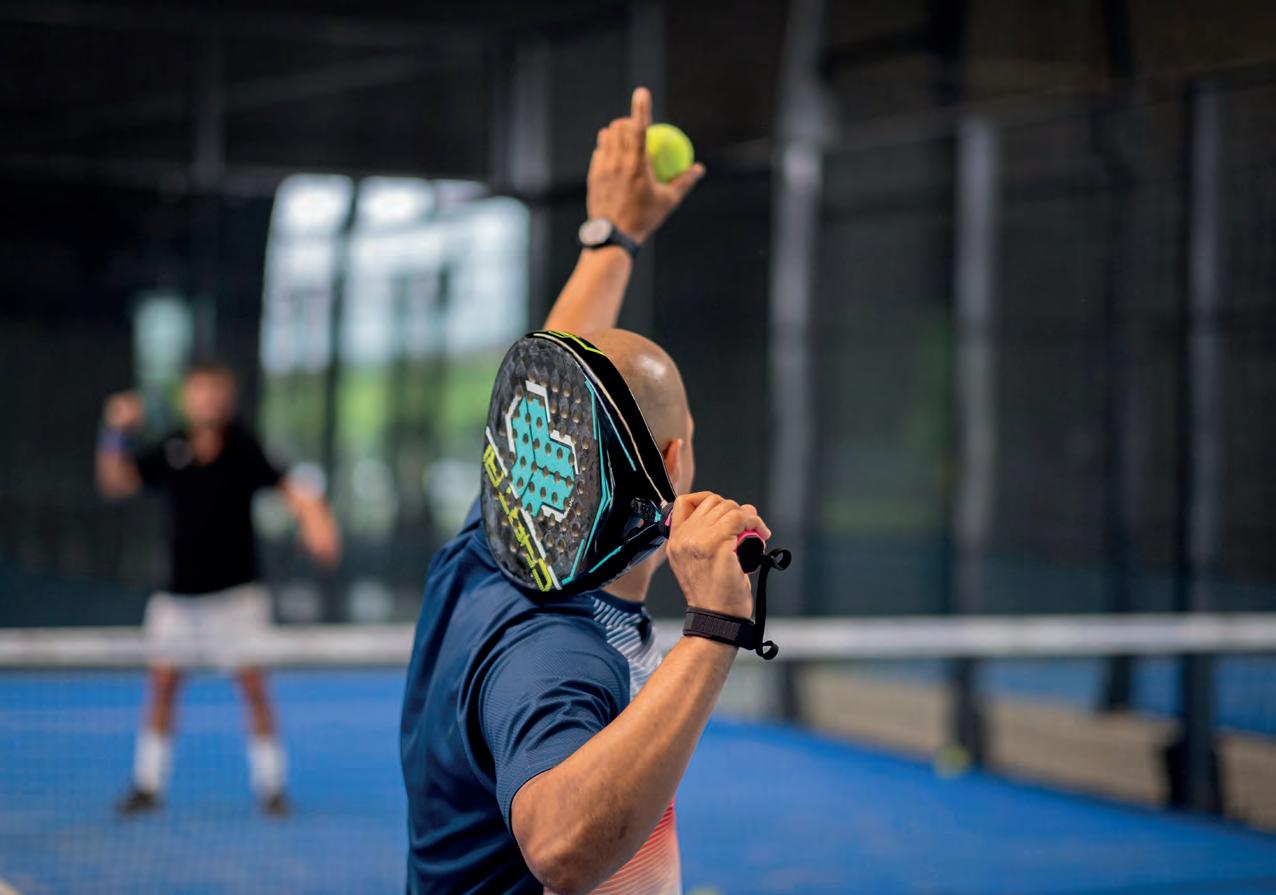

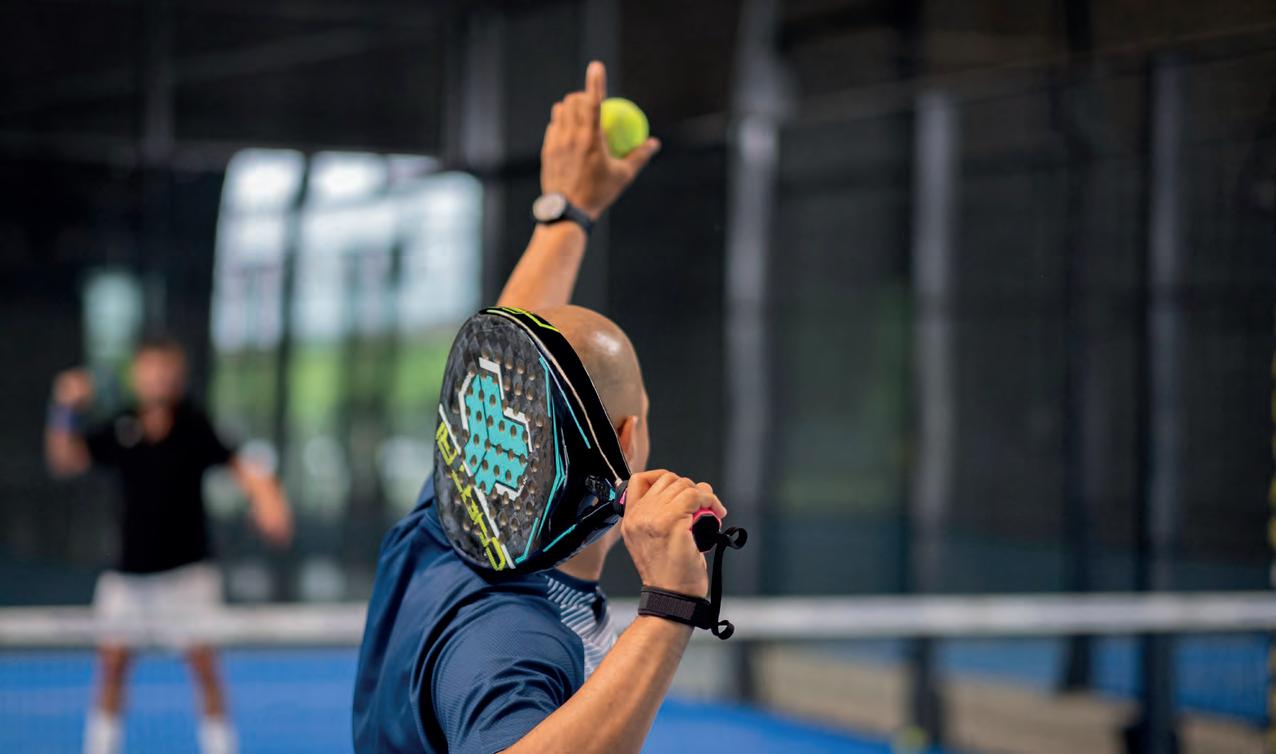






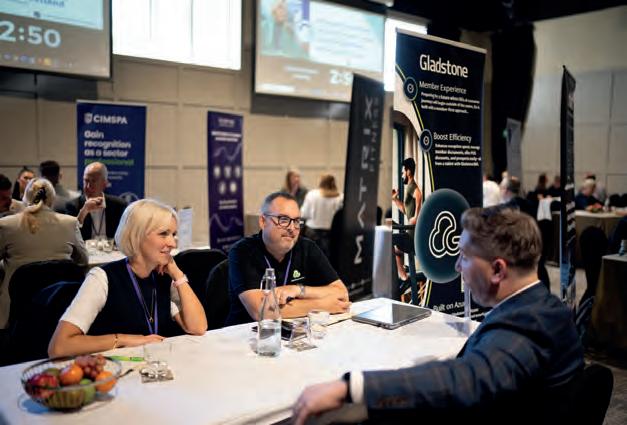










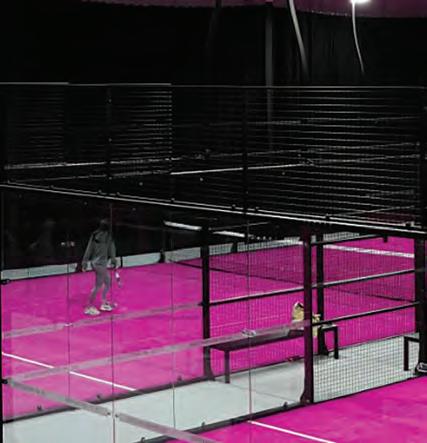







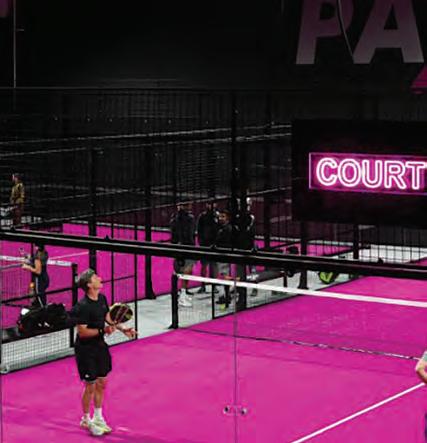




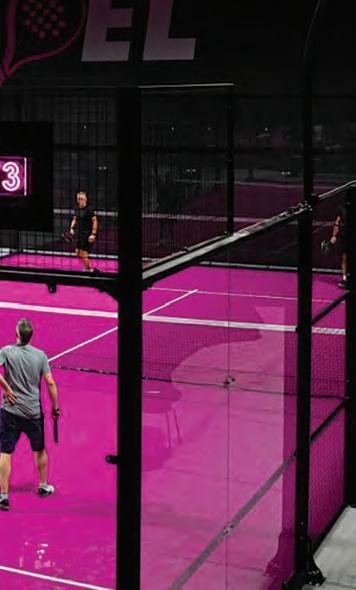




About this research:
This research was conducted by Active Insight’s Consumer Insight Panel exploring interest in playing padel. The initial findings were presented at active-net Private, where the theme covered secondary spend opportunities. Given the rise in popularity of Padel within the UK, a panel of 283 were asked if there were interested in plating padel. The respondents were then given a number of options to choose from - ranging from ‘Yes, but I don’t know how’ to ‘I’m not interested’.
Through Active Insight’s Consumer Insight Panel we are able to segment the data via a number of demographics including social medial platforms that the participants to this survey use, regions, gender, age, exercise frequency… even where they drink their coffee!
For a further breakdown of data, please reach out to Julie Allen julieallen@active-insight.org
The top drivers to playing Padel in the UK



37%





49% 39%

Of people who exercise a few times a week would play but don’t know how











Of 18-24 year olds would play Padel but don’t know how


Of people said YES when asked if they would be interested in playing Padel

Higher % of females are interested in Padel







Of people who exercise daily would like to play Padel, but don’t know how



Of people who exercise once a week would pay extra for Padel

50% 29% 11%


TikTok | LinkedIn | Snapchat
Of people interested in Padel drink in Starbucks 41% 47% 41% 80%







Of 25-34 year olds are interested in Padel (50% would pay extra, 50% would play if (included in membership)




















Most popular social media channels for those interesed in padel but don’t know how to play.




A mystery shopper report, compiled for SportsNation by Proinsight, has shown that padel court operators could be missing out on new customers due to tardy or non-existent replies to enquiries
As interest in padel surges, so too does the importance of creating a smooth and supportive experience for those taking their first steps into the sport.
To explore how well padel court operators are responding to firsttime enquiries and turning them into business, SportsNation commissioned Proinsight to conduct a mystery shopper-style assessment of 20 padel centres across the country
The aim of the mystery shopper research was to evaluate how effectively operators support firsttime customers via websites, online/email enquiries, and telephone calls. The mystery shoppers were tasked with three specific actions for each location: browse the website, submit a web/email enquiry and make a telephone call, all from the perspective of someone completely new to padel. The questions were simple: Was it easy to find the information needed? Did staff respond promptly and helpfully? And, perhaps most importantly, did the interaction inspire confidence to take the next step?
The results, compiled in the Padel First Timer Enquiry Insights – May 2025 report, paint a mixed picture. While there are encouraging signs, the findings also highlight several missed opportunities – and a clear need for greater consistency.
Overall scores highlighted scope for improvement across all areas, but particularly for the online enquiry and telephone call experience.
Base: Padel Enquiry Assessments May-25 (20). Note: sections marked with an * were only scored where a response was received – Online Enquiry (11) and Telephone (15)
l Assessment scores highlighted scope for improvement across all channels, but especially for the online enquiry and telephone call experience.
l Websites were generally easy to navigate and included most (but not always all) of the information a first timer would need to start. Email responses and telephone interactions were friendly, professional and personalised.
l Non-response was an issue for both online enquiries and telephone calls.
l 9 out of 20 didn’t receive a response to their online enquiry and 5 out of 20 weren’t able to get through after three separate call attempts.
l Typically, the measures performing less well were around access to information needed for someone new to padel, such as number of people needed to play, pricing info, equipment hire etc.
l Most felt at least somewhat confident to get started based on their experience, but across each channel there were some who did not feel confident. Email responses to an online enquiry were least likely to inspire confidence in first timers.
l There was inconsistency in experience, with some users citing a good experience while others struggled to make contact and get the information they needed.
Across the 20 assessments, areas that performed better centred on ease of website navigation and friendly, personalised responses and interactions.
Website navigation
Email response was personalised
Call answered in a welcoming and friendly manner, and closed with a thank you
Asked about padel experience
Lower scoring areas were access to information needed for someone new to padel. Across all channels, the level of information available was inconsistent.
Website: not clear how many people needed to play
Website: not able to find out all information needed
Email response didn’t explain all necessary information (pricing, number of people etc.)
Telephone call didn’t explain all necessary information (pricing, number of people etc.)
Non-response was an issue for both online enquiries and telephone. Consider the impact of not being able to make contact for first time users looking to find out more, and how this could be a barrier to getting started.
11 out of 20 received a response within 24 hours
9 out of 20 received no response
Encouragingly, of those that did receive a response, most received a reply in less than 2 business hours (7 out of 11 assessments)
Padel Enquiry Assessments May-25 – Online Enquiry (11), Telephone (15)
15 out of 20 were able to get through
5 out of 20 could not get through
Of the 15 successful calls, 12 were able to get through on their first attempt
Feedback on the websites was varied. Some websites included plenty of information. However, most websites failed to include all the information that might be useful to a first timer or someone new to padel. User suggestions for improvement could be broadly categorised into two areas: content and accessibility.
SUGGESTED IMPROVEMENTS:
I wasn’t able to find any information about the game itself, the number of people involved or the equipment I would need to get started.
It was annoying that I could not see the prices.
The only thing I couldn’t find without clicking on the book now was the number of people required to play. From the booking, it looks like it’s doubles only, but it wasn’t fully clear.
The website needed the court times and prices.
The website is in development, but information was still available via the FAQ link; although it would have been helpful if this could have been made more prominent.
It was difficult to find a telephone number, bar the urgent call line
The page is quite ‘wordy’, and the key information is contained either within large chunks of text or at the bottom of the page. It could be highlighted in bold perhaps to make the key details stand out.
Although based on a small number of assessments, across each channel there were at least some users who didn’t feel confident to get started based on their experience. Email responses to an online enquiry were least likely to inspire confidence in first timers.
Based on your experience only, as a first time player, did you feel confident to get started?
The distribution of likelihood to recommend scores reflects the range of experiences users had when visiting the website, making an online enquiry and telephone call.
On a scale of 0-10 (0 being unlikely, 10 being likely) how likely are you to recommend this centre to a friend or colleague?
Base: Padel Enquiry Assessments May-25 (20). Note: online and telephone were only scored where a response/reply was received. Chart shows number of users selecting each response.
Overall, it was a good experience contacting this centre. I found their response times were quick, and I was able to get the information I needed. After the interactions, I felt I had a good understanding of the game and would be confident to give it a go.
The email reply was very prompt, but quite basic with the information provided. I would have also liked to have some opening hour information, equipment hire, and it to be personalised by name. Also, the process to contact via telephone was very confusing.
Base: Padel Enquiry Assessments May-25 (20)
For all channels, some users had a great experience while others struggled, highlighting a real inconsistency in experience across different locations.
This is a great website with lots of information on the sport itself, what you need to play and how to play. I loved the information on the construction of the courts, which really helped to pique my interest.
I received a very quick response to this enquiry, and I liked the level of detail provided… I liked that I was offered the chance to ask any additional questions.
I had a fantastic call with this team member where I was able to get a lot of information on the sport itself and what’s involved.
Base: Padel Enquiry Assessments May-25 (20)
The site is woefully lacking and doesn’t tell me anything as a first timer what to expect, how many play, what it costs and when the courts are open.
It would have been useful to include here some basic “need to know” information, such as costs for court hire/coaching (if available), what equipment you needed etc.
I was disappointed that I didn’t manage to talk directly to anyone [after three separate attempts]… I am not sure that I would have continued to investigate the possibility of joining the club.
Nearly half of operators failed to respond to online enquiries, and one in four couldn’t be reached by phone – highlighting critical gaps in first-timer support
Overall, most were able to easily navigate the website and find most of the information needed as someone new to padel.
Higher scoring measures
17 of 20 assessments said it was ‘very easy’ to navigate the website
Most were able to find information about equipment hire, court opening times and the cost of a padel session
Lower scoring measures
Only half (10 of 20) said it was clear how many people you need to play
The website was well laid out; it was easy to read, with large font sizes, graphics, comprehensive information and conveyed friendliness. I felt it had all the information I needed to feel confident starting.
Base: Padel Enquiry Assessments May-25 (20)
Online enquiry experience was the poorest performing. Non-response was the main issue, with almost half not receiving a response within 24 hours
Higher scoring measures
Personalised response and closing
Lower scoring measures
Response times (non-response)
Invitation made to visit the centre
Explaining/including relevant information
5 of 11 were told about equipment needed, 4 of 11 had pricing information, 1 of 11 included court opening hours, 1 of 11 stated how many people were needed to play
I sent an email, but I didn’t receive a response within 24 hours, which was disappointing.
I received a quick response to this email enquiry today, however, there wasn't a lot of information about the game itself and what was needed to play.
Base: Padel Enquiry Assessments May-25 – Online Enquiry (11)
Five out of 20 weren’t able to get through on the phone. For those that did, the call was generally friendly and welcoming and some effort was made to discuss payment options, coaching and visiting the centre. However, often opportunities were missed to capture contact details and to share information that might put a new player at ease.
Higher scoring measures
Call greeting
Asked about padel experience
Thanked for the call
Mid-scoring measures
Staff member discussed option of pay and play padel courts/bookings
Staff member discussed a padel coaching/programme
Invited to visit the centre
Base: Padel Enquiry Assessments May-25 – Telephone (15)
Lower scoring measures
Ability to get through
Capture of contact details
Explaining all necessary information
8 of 15 were told about equipment needed, 7 of 15 mentioned court opening hours, 6 of 15 were told about membership options

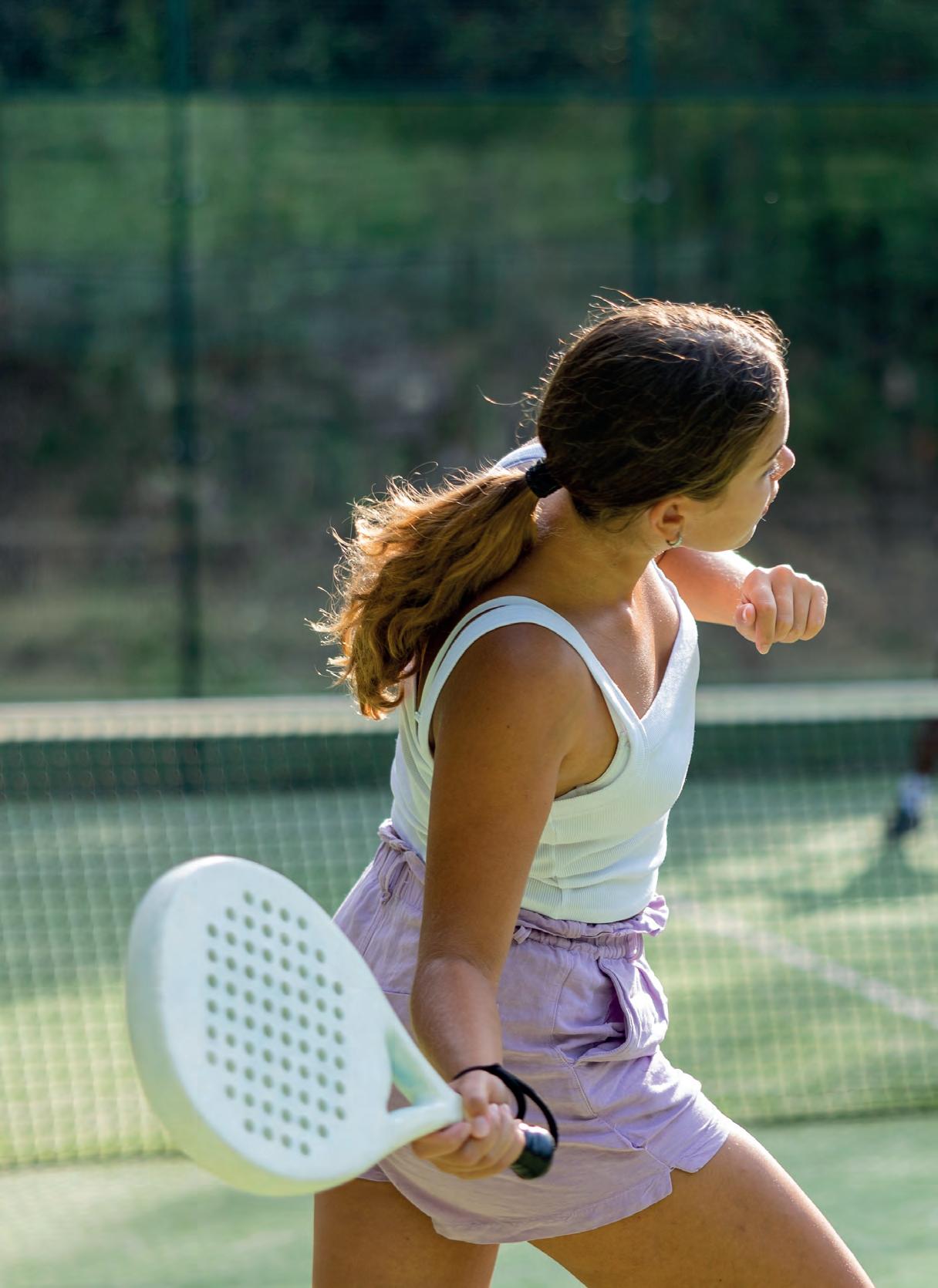
Padel’s momentum is undeniable –more than 400,000 people played in 2024 and 8 million want to try it
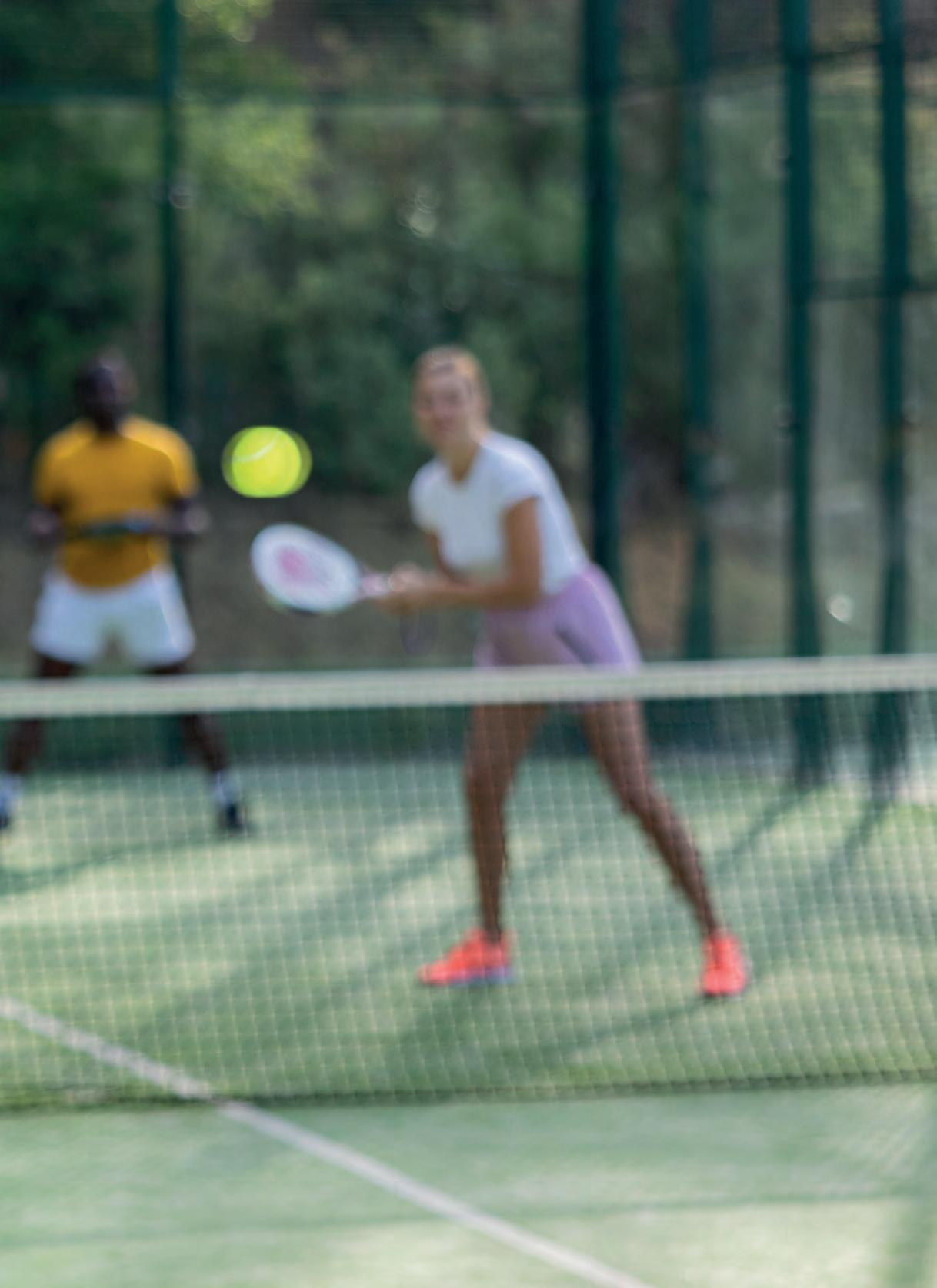
Padel is growing at an incredible speed. How is the market dealing with the exploding number of new players and the constant stream of new facilities being built – and are we only at the beginning of the boom?
Padel’s popularity has sky-rocketed across the UK over the past few years. The explosive growth, with new clubs and courts opening almost weekly, is driven by the sport’s inclusive and social nature, appealing to a broad demographic. Padel’s accessibility – welcoming players of all ages and skill levels – has been a key factor in its success. There’s also significant buzz surrounding potential Olympic inclusion, which would undoubtedly accelerate its mainstream adoption. While the sport is thriving, it is easy to forget that the padel market remains in its early stages, when compared to more mature padel nations such as Spain. This provides immense opportunity for growth and innovation in the UK.
Figures collected and analysed by the LTA – padel’s national governing body – reveal that participation more than trebled last year, alongside a major spike in public awareness and interest. Published in May 2025, the latest data shows that, at the end of 2024, just over 400,000 adults and juniors in Great Britain had played padel at least once in the preceding 12 months – up from 129,000 at the end of 2023. The figures shows just how quickly the sport has grown. In 2019, just 15,000 people had tried padel. By 2021, the number had increased to 89,000. Meanwhile, according to Sport England’s Active Lives study, the number of adults who play at least twice monthly has doubled from 23,000 in 2022-23 to 51,000 in 2023-24.
This growth is supported by a rapidly expanding infrastructure, with 893 padel courts now available across 300 venues across Britain. As of February 2025, the LTA has invested more than £6 million in the growth of padel across Britain, including £4.5 million towards the development of 80 courts at 42 venues. The LTA says that this represents approximately 10% of all padel courts nationwide.
“Padel is playing an increasingly active role within our communities,” says Tom Murray, the LTA’s Head of Padel. “The LTA is passionate about opening up padel to a more diverse audience, including those from underserved communities across the country, so everyone can enjoy the physical and mental benefits of staying active.”
The LTA says that more than three-quarters
form of community outreach, from local school
The LTA says that more than three-quarters of all padel venues are now involved in some form of community outreach, from local school partnerships to free sessions and coaching for underserved groups. It also cites research which



shows that an average off-peak court booking now costs £7 per person per hour (based upon doubles.)




Awareness of padel among adults reached 43% of the population (approximately 23 million individuals) in the first quarter of 2025, representing a significant increase from 23% (12 million) during the same period in the previous year. Interest in playing padel across Britain continues to increase, with over eight million Britons expressing a desire to try padel, which is up by 60% over the past 12 months. This, the LTA says, reflects the sport’s “accessibility, social nature and appeal to all age groups”.
To help continue to drive the visibility
To help continue to drive the visibility and growth of the sport, the LTA recently expanded its digital presence with the launch of dedicated LTA Padel social media




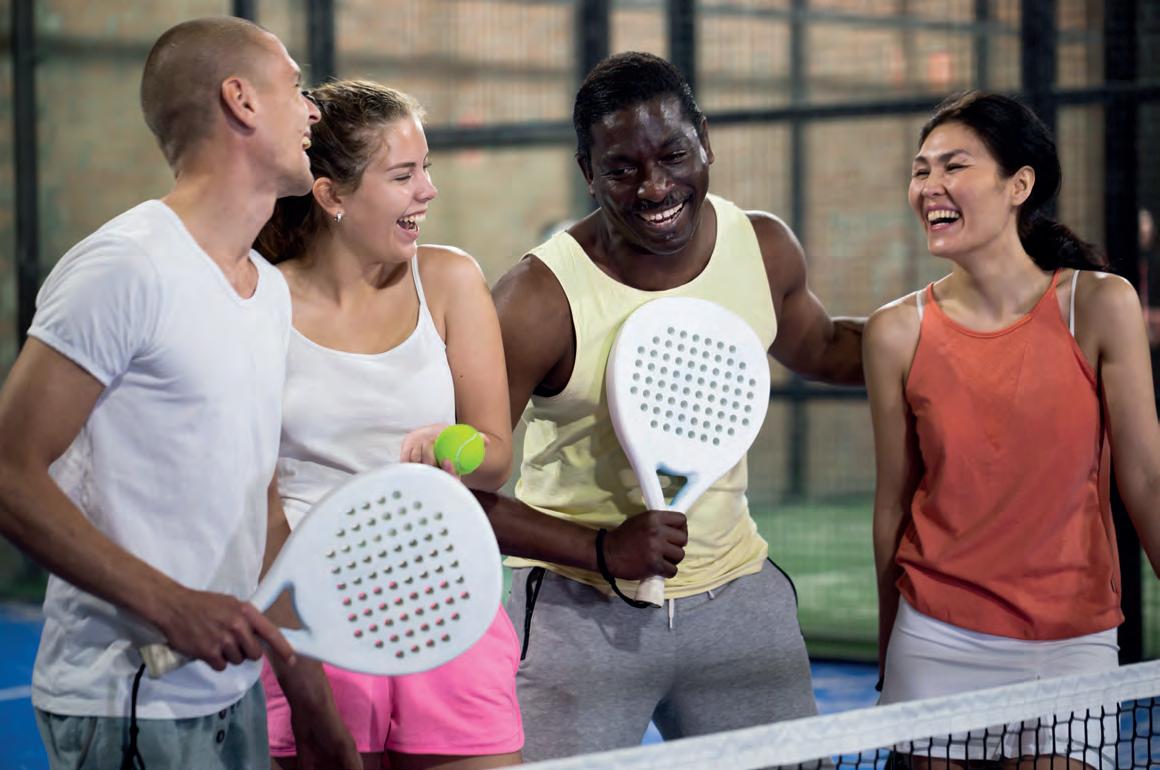

channels. Fans and players can now follow “@ltapadel” on TikTok and “@LTA_Padel” on Instagram for content, including expert player tips, how-to guides, and the latest updates on Britain’s padel players. In May, the LTA also launched a dedicated padel website (www.ltapadel.org.uk) to support the growth of players, fans, competitors and venues. As interest in the sport continues to rise, the new site provides a variety of information for anyone looking to get involved – from beginners picking up a racket for the first time, to experienced players looking to compete. There is a range of accessible resources, including ‘how to get started’ guides, equipment advice and tips on entering competitions.
The platform also offers support for venues, including practical information on how to integrate padel into existing facilities and capitalise on the sport’s growing popularity. Furthermore, fans of the sport can enjoy a dedicated Fanzone, spotlighting the achievements of Britain’s elite padel players, celebrating milestones from across the padel community and providing player profiles.
According to Murray, the launch of the LTA Padel website marks an “exciting step” in the LTA’s commitment to growing padel at all levels.
“With more than 400,000 people taking to
the courts in 2024 and 8 million expressing interest in trying the sport, padel’s momentum is undeniable,” Murray said. “Increasing visibility and accessibility is a key pillar of our padel strategy, and through these new platforms and our partnerships across the sector, the LTA are able to share more content, reach new audiences, and help even more people discover where and how they can get involved in the sport.”
The boom in interest has resulted in a number of privately-owned operators setting up businesses. A lot of the growth is driven by these commercial operators, which are establishing multi-court venues across the UK.
One of the leading operators is Padium, which is currently expanding its number of sites. The company’s Operations Manager, Max Lutostanski, says that the company is looking to offer a “worldclass experience” before, during and after games.
“The UK padel market is currently experiencing rapid growth, with demand much higher compared to the number of courts across the country,” Lutostanski says. Over the next two
Padel’s appeal lies in its accessibility, social nature, and ability to engage all age groups
years, we aim to expand our presence across major UK cities. This will include opening new clubs in strategic locations, particularly in areas where the sport is gaining traction.
“We will also focus on community engagement and junior programmes to introduce more people to the sport, working with schools, universities and local businesses. Additionally, plans to host or sponsor tournaments and events are being discussed to increase brand visibility and establish Padium as a leader in the UK’s padel scene.”
According to Mark Hewlett, CEO and Founder of Soul Padel, another leading operator, the sport will only grow. “Several sports clubs, leisure centres and gyms are integrating padel into their offerings, and the market is now reaching a point where both participation and infrastructure are expanding quickly,” he says, adding that there are, however, notable regional differences in the UK’s padel landscape.
“London and the Southeast are leading the way with the highest concentration of padel courts and clubs,” Hewlett says. “The demand in these areas is driven by affluent communities, a strong network of sporting clubs and proximity to international padel trends.
“The Midlands and Northern regions, particularly cities like Manchester and Birmingham, are also showing strong interest, but infrastructure is still catching up to meet the demand. Conversely, parts of the UK, such as rural areas and regions like Scotland and Wales, have seen less exposure to the sport.”
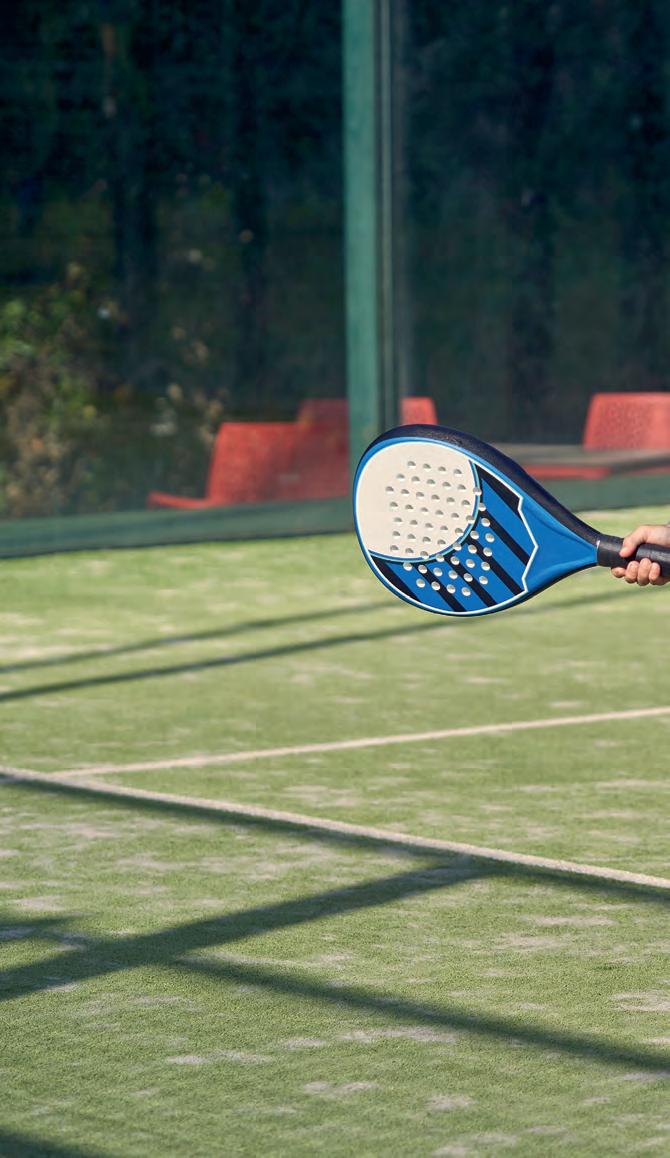
To ensure that padel’s growth is sustainable, it is important to provide new entrants to the sport enjoyable – and safe – playing experiences. As operators look to meet the increasing demand by building more courts, a number of construction companies have popped up, claiming to be experts in court design and construction. Others, while making no claims of expertise, are prepared to “have a go” at building a court despite no prior experience of working in padel.
Sadly, this has meant that in some cases the rush to meet demand – often at the lowest possible cost – has resulted in examples in which courts have not been built to high enough standards. In the worst cases, courts have been erected in ways entirely incompatible to UK weather conditions and other requirements. There have already been cases in which urgent remedial works are required to bring courts up to scratch. In others, the use of wrong and substandard materials have meant newly-built courts have been forced to close for good, soon after their grand opening.
“A growing, exciting sport like padel deserves high-quality, durable courts,” says Richard Shaw, CEO of the Sports and Play Construction Association (SAPCA), whose membership consist of the leading specialists in padel court design, construction and maintenance.
The increased number of facilities means that padel is increasingly played by young people and children
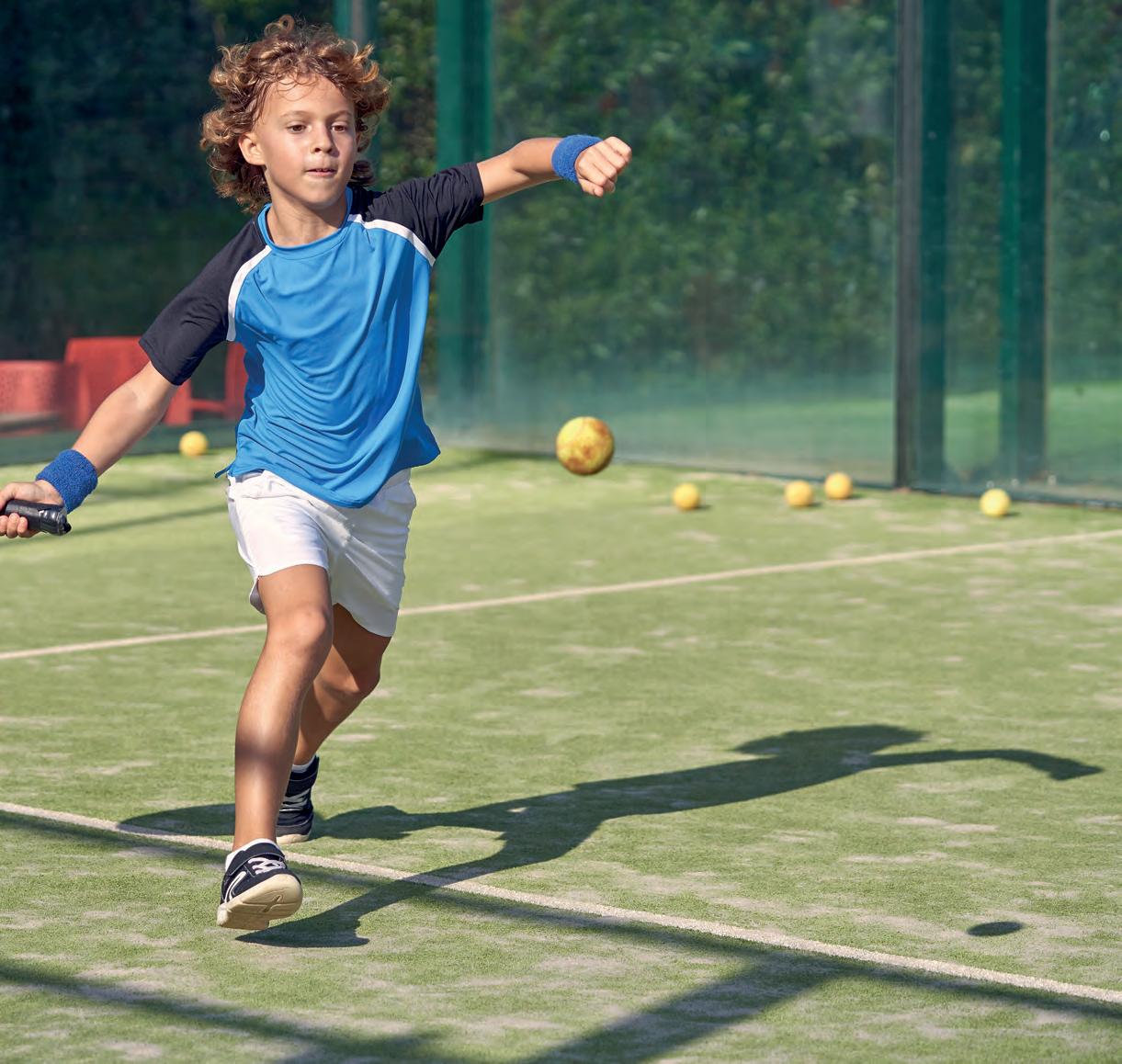
“The easiest way to ensure a successful padel court construction project is to adhere to The SAPCA Code of Practice for the Construction of Padel Courts. It provides a minimum standard of specification and proficiency, which will ensure a court will both offer a quality experience for players and stand the test of time.
“In turn, the easiest way to ensure that a project is completed according to the Code of Practice is to only work with SAPCA member companies –who are all committed to meeting the standards.”
The SAPCA Code of Practice for the Construction of Padel Courts has been developed in collaboration with the LTA, ensuring that the guidelines reflect both international best practices and the specific requirements of the UK market. By following the standards, courts are guaranteed to meet the performance, safety and longevity expectations of players, clubs and venues.
“Non-compliance with these established standards can lead to sub-par courts that fail to meet the demands of competitive or recreational play,” Shaw adds. “Crucially, while numerous companies in the UK offer design and build services for padel courts, only SAPCA member companies are guaranteed to follow the SAPCA Code of Practice. SAPCA members are rigorously vetted to ensure they have the technical expertise and commitment to adhere to the standards.”
The LTA launched its new strategy for padel in Britain in September 2024. In it, the NGB outlines a vision to “open padel up” to even more people across the country and to keep growing the sport by making it more accessible, welcoming, enjoyable and inspiring.

but infrastructure is still catching up to
The
increased awareness of padel means that people of all ages and backgrounds are finding the sport
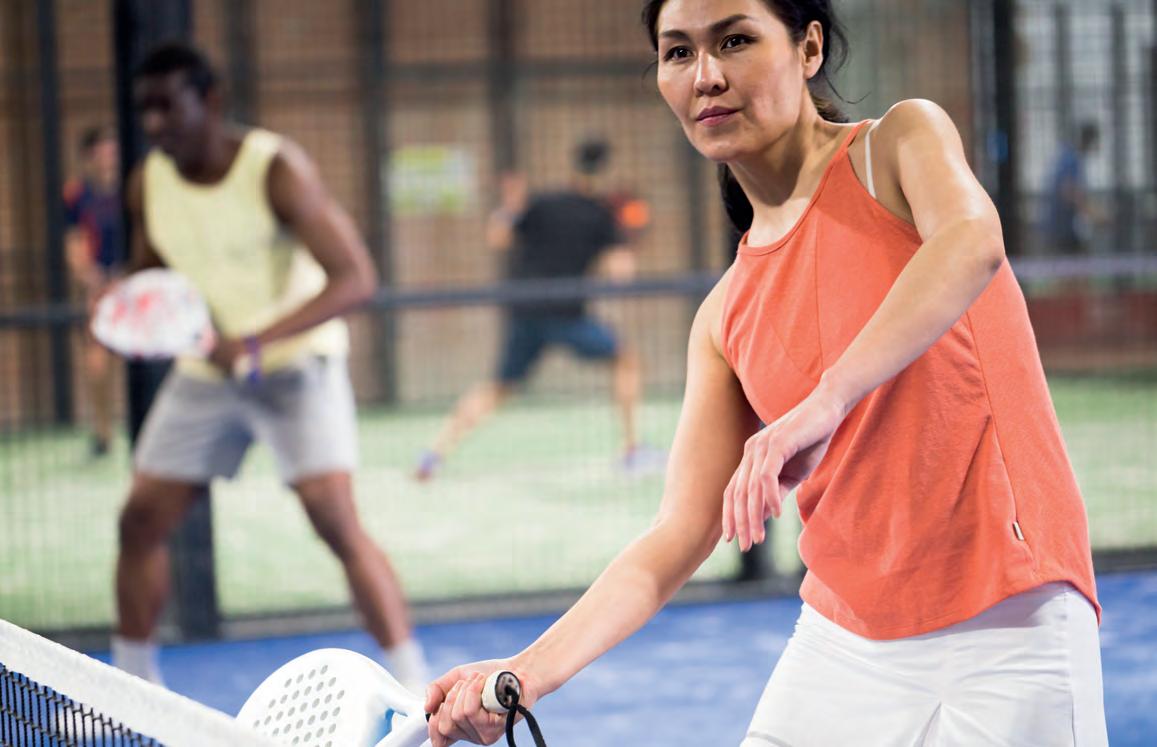
The new strategy, which covers the period from 2024 to 2029, maintains the LTA’s focus on growing the infrastructure of padel, increasing and diversifying the coaching workforce and building on the performance pathway as well as increasing visibility and driving participation.
The new strategy aims to help deliver the next stage of the sports development with a series of actions that focus on investing in the visibility of padel and its infrastructure, growing the fan and player base, growing and engaging the padel workforce, developing opportunities to widen the appeal of padel and creating a pathway and support for adult and junior performance players.
The commitments for the first phase of the strategy, through to the end of 2026, include growing the interest in playing from 7.5% to 15%. It also includes a target to increase the number of players who play at least once a year from 129,000 to 400,000 and the number of monthly players from 65,000 to 200,000. As the figures released in May 2025 show, the former target has already been hit.
From a facility point of view, the strategy identifies a goal of increasing the number of padel courts from 350 to 1,000, while also growing the padel coach and activator workforce from 40 to 700. From 2025 onwards, the LTA
will also establish a new Padel Advisory Group (PAG) to help guide the development of the sport across Britain. The group will be open to those from across the industry who want to work collaboratively and share ideas to grow the sport.
The LTA’s Tom Murray says: “The strategy will help take padel in Britain to the next level. The strategy and tactics that we’ve put in place will truly help to open padel up to many more people across the country, with more funding, facilities and coaches ensuring that the sport is accessible, welcoming, enjoyable and inspiring.
“Having successfully completed the tasks we identified in our 2020–23 Padel Development Plan, we now want to evolve our approach in order to grow padel by making it accessible, welcoming, enjoyable, and inspiring and maximise the sport’s impact to achieve sustainable growth for the future.
“Over the coming years we will maintain our focus on padel infrastructure, growing and diversifying the padel coaching workforce, and implementing a performance pathway that supports current players whilst also paving the way for the next generation. Alongside this we will invest in driving greater visibility for the sport, including exploring opportunities for professional padel events in Great Britain. It’s an exciting time for the sport.”

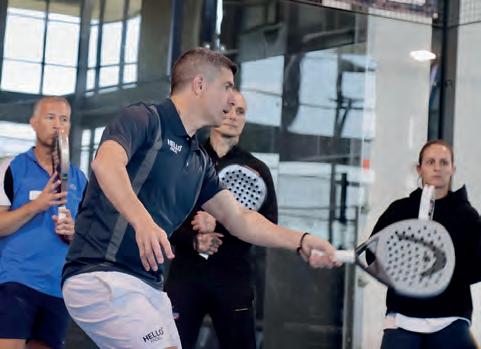
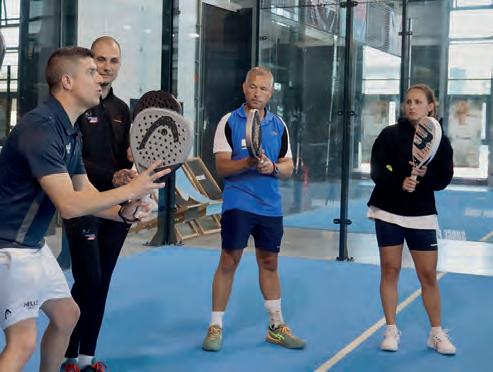
Padel facility operator, Surge Padel, aims to establish its Harrogate site as a centre of excellence for the sport. As part of the plans, Surge invited renowned coach Mauri Andrini to host a three-day elite coaching course at the site
In May, Surge Padel hosted internationallyrenowned coach Mauri Andrini, founder of Hello Padel Academy, at its Surge Padel Harrogate site. Andrini delivered the Hello Padel Bronze Coaching Certificate during a three-day course that brought together aspiring and experienced coaches from across the UK and marked a major milestone in the ongoing development of padel in Britain.
“The event placed Surge Harrogate firmly at the heart of British padel’s coaching evolution,” Said Rich Wingfield, CEO of Surge Padel. “It underscored the importance of investing in coach education as a foundation for long-term, sustainable growth.”
respected educators – was a strategic move to help shape the next generation of British coaches.
The Bronze Course delivered by Andrini offered an intensive yet accessible entry point into structured coach development. Participants gained early access to the Hello Padel platform four weeks before the course began and will retain that access for a full year afterward, supporting continuous learning.








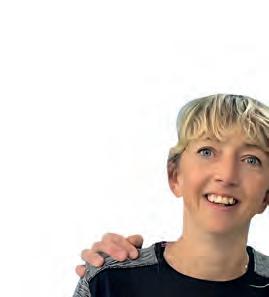
As padel continues its explosive rise in popularity across the UK, the need for skilled and qualified coaches has never been greater. According to Surge, welcoming Mauri Andrini – one of the sport’s most







Throughout the weekend, coaches were guided through technical fundamentals, tactical principles, and best-practice coaching methodologies – delivered in Mauri’s trademark high-energy, engaging style.



For some, it marked the start of their formal coaching journey. For others, it was a chance to refine their craft and deepen their impact on court.





“Importantly, the Bronze certification process doesn’t end with the course itself,” Wingfield says. “All attendees must now complete a rigorous practical assessment, judged by the Hello Padel tutor in



team based in Barcelona. Feedback and the opportunity to retake the exam are provided, with the Silver Certification available as the next step for those looking to expand their tactical and strategic coaching expertise.”
The real impact of the Bronze Course, Wingfield says, will be felt on court – by players of all levels. With better coaching comes better sessions, more technical skill development, and a stronger sense of community for everyone involved in the game.
“Whether someone is brand new to padel or pushing for tournament success, having access to educated, passionate coaches makes all the difference,” Wingfield adds. “The coaches who trained under Mauri this weekend will now go on to elevate standards not just at Surge Harrogate, but at clubs across the UK.
“This aligns perfectly with Surge Padel’s long-term vision: to ensure that every player, regardless of experience, has a clear, supported pathway to grow their game in a structured, fun, and professionally delivered environment.”
Another major focus of the weekend for Surge Padel was the long-term impact the wave of trained coaches will have on youth development. With more qualified coaches now active, clubs like Surge Harrogate will be better equipped to deliver kids’
The event placed Surge
firmly at the heart of British padel’s coaching evolution
camps, school programmes and beginner sessions that introduce the sport to younger players.
“Developing strong grassroots programmes is vital for growing participation and securing a sustainable future for the sport,” Wingfield says.
“This Bronze Certification event was a crucial step in making sure the coaches leading these sessions are not just enthusiastic, but also professionally prepared to nurture the next generation of players.”
The training course is part of Surge Padel Harrogate’s strategy to establish itself as a centre of excellence for padel in the North of England. Hosting Mauri Andrini and delivering the Hello Padel Bronze Course has no doubt reinforced its reputation as a leader in coaching development and innovation.
“As the dust settles after an inspiring and action-packed weekend, the legacy is already clear: more great coaches, more confident players, and a brighter, stronger future for British padel,” Wingfield says.

The padel market is red hot and new facilities, services and products are entering the market on a weekly basis. SportsNation looks at some of the recent additions

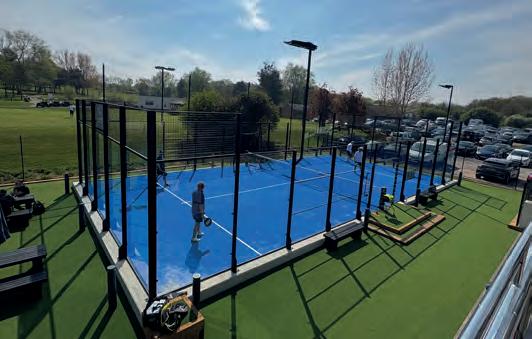
Specialist padel court supplier and SAPCA member, SG Padel, took the lead on transforming an underused tennis court and spare land at Club Kingswood – Basildon’s award-winning leisure centre – into a vibrant padel destination. From initial feasibility assessments and architectural design to the grand opening, SG Padel – the UK distributor for Mejorset Padel Courts – was fully involved at every step of the project.



Mondo putting a spring in players’ step with innovative new surface
Sports surfaces specialist Mondo is recognised as a leading supplier of athletics tracks – not least as the official supplier for several summer Olympic Games. Now, the Italy-based company and SAPCA member, which was founded in 1948, is making a name in the padel market.
Mondo’s new Premier Supercourt X3 is a synthetic turf system designed specifically for padel courts. It combines parallelepiped-shaped (parallelepiped is a three-dimensional geometric shape characterized by six parallelogram faces) XNOVA textured monofilaments with concave sides. The product is characterised by four grooves and four asymmetric ribs that act as lateral reinforcements, XOMEGA textured monofilaments with a semicircular structure and triangular-shaped XDELTA monofilaments.
The aim of combining the three filaments that make up the system is to provide the surface with elastic memory – thanks to different thicknesses and morphologies. The textured filaments act like springs, minimizing surface wear and improving appearance.
To prepare the site, the company’s groundworks team constructed concrete ring beams, filled them with stone for optimal drainage and finished the surface with permeable tarmac to create a solid foundation for the courts. Once the court structures were in place, SG Padel’s landscaping team enhanced the surrounding areas with green turf, adding a striking visual appeal.
The facility’s Mejorset V-Pro courts now sit at the heart of the revitalised space, which also include a bar, a balcony overlooking the action and a welcoming social seating area for spectators.


“With Premier Supercourt X3, players have a total feeling of safety and confidence in their movements, also reducing the risk of injuries,” Mondo says. “The grip level of the new surface also significantly improves shock absorption, stability, traction and balance during play.”


























PRO Padel Courts has created an innovative, steel base plate court system that has been engineered to eliminate the need for extensive groundworks. The steel base system allows for installation with minimal disruption, removing the need for concrete foundations.
According to the company – a SAPCA member – utilising the design could save property owners more than £20,000 in ground preparation costs.
The company has installed a number of courts across the country, including a number of high-profile projects, including The Queens’ Club in London; The Roehampton Club; Estelle Manor, Oxfordshire and Notts County Football Club.

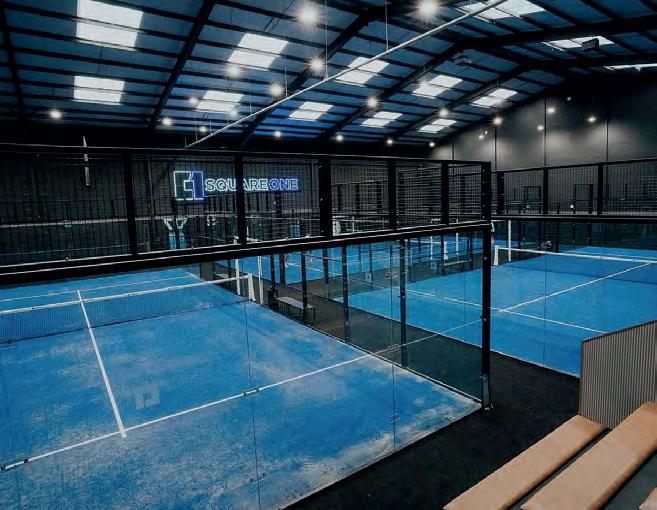
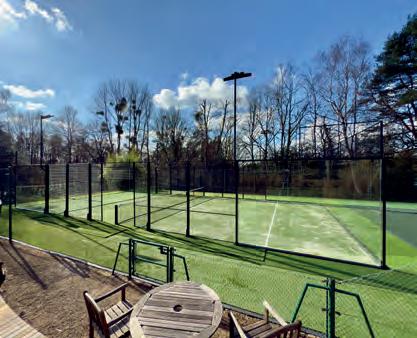


SAPCA member Sterling Turf is another company making waves on the padel market. A number of recent padel court projects have featured the Sterling PadelPro turf as the chosen playing surface.
One of the installations was at Square One Padel’s brand new site in Ashford, Kent. The facility features vibrant blue PadelPRO courts, which have been paired with sleek black DuraSURROUND turf.
“We pride ourselves on going above and beyond for customers at all stages of the process but most importantly by doing the basics right every time, Sterling Turf says. “As a result, we have established ourselves as a go-to choice for contractors, venues and private users who look to create an incredible playing experience. We have hundreds of courts already installed across the country.”


Commercial small-sided football operator, Powerleague, has entered the padel market with a bang. The company’s latest move will see it investing £2.2 million to introduce padel to three of its existing Scottish clubs.
The Scottish expansion is part of a wider £14 million UK-wide rollout of padel, which will see Powerleague deliver 76 courts across its estate by 2026, as part of its ambition to become the nation’s leading provider of small-sided sports. The Scottish investment will deliver 11 padel courts across Powerleague’s Paisley, Portobello and Sighthill clubs by the end of 2025 and marks the single largest investment in padel infrastructure by any company in Scotland to date.
All three clubs have also unveiled refurbished bars and clubhouses, creating vibrant social hubs for local communities.
Christian Rose, CEO of Powerleague, said: “Padel is experiencing explosive global growth, with over 25 million players across more than 100 countries and a compound annual growth rate of 26%. Its rapid rise comes down to its simplicity, social nature, and sheer fun, making it a perfect match for Powerleague’s dynamic, community-focused venues.
“We’re committed to making the sport more accessible and saw a great opportunity to bring padel to more locations across the UK, including Scotland. It’s exciting to see the sport grow and reach new communities.”



Loughborough University has partnered with Soul Padel to deliver two padel courts on campus. The courts – installed on the University’s Ball Park – will be operated by Soul Padel, in partnership with Loughborough Sport, for an initial period of six months.
Liv Murphy, Acting Director of Sport at Loughborough University said: “These courts will not only enhance our already enviable sporting offer but also underpin our commitment to creating a vibrant and active environment for all.”

Mark Hewlett, founder and CEO of Soul Padel, said: “This is a hugely exciting moment for Soul Padel. Loughborough University is a world leader in sport, and its campus is a place where people come to play, learn, and excel.


“We’re thrilled to be adding padel to their mix, ensuring it becomes part of this incredible sporting ecosystem. Our mission has always been to make padel more accessible, and by partnering with Loughborough University, we’re creating opportunities for everyone –from elite athletes to complete beginners – to experience the joy of this dynamic and social game.”

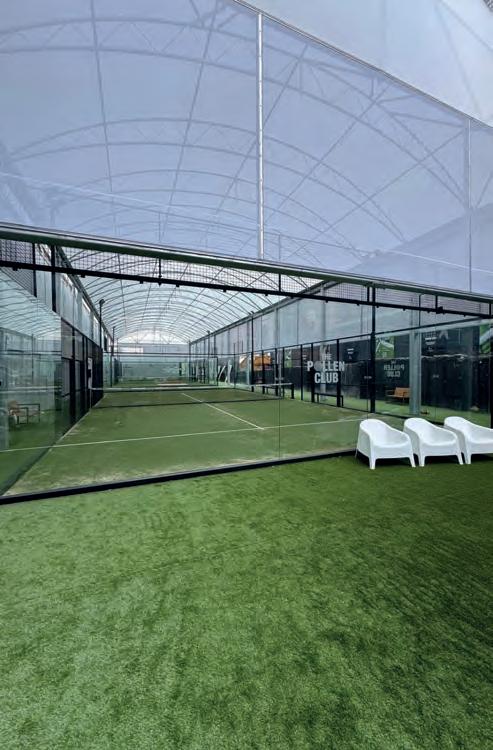
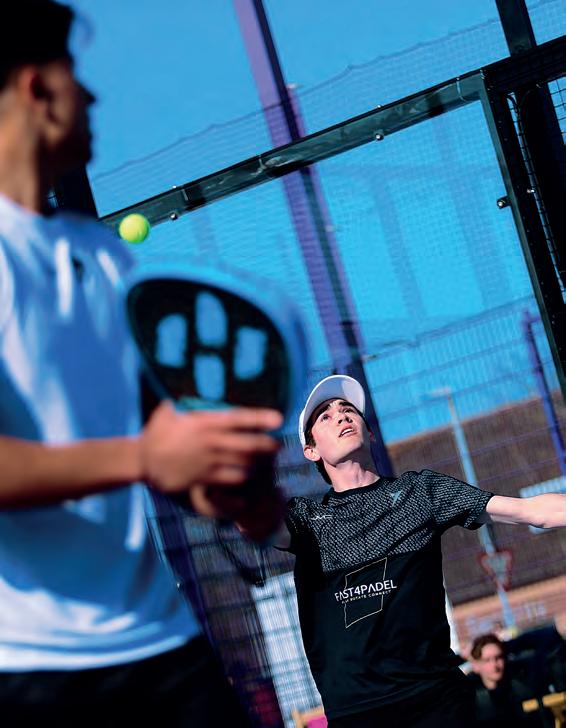


Established in 1876, Belfast Boat Club (BBC) has a proud heritage of sporting tradition. By 1907, the club had added eight grass tennis courts, and in 1913, it became affiliated with the Irish Lawn Tennis Association, reinforcing its role in the development of tennis in Ireland.
In keeping with its progressive outlook, BBC recognised the rapid rise of padel. In January 2023, the club approached SAPCA member Rocklyn to explore the integration of padel into its range of sporting facilities.


Following in-depth discussions, BBC made the strategic decision to redevelop Court 1, transforming it into a dedicated padel zone featuring three courts, including two with canopy coverage. The redevelopment included surface removal, drainage upgrades, spot piling and tarmac installation. The practical and cost-effective solution enabled the use of self-supporting Club10 courts, removing the need for a traditional concrete ring beam.
The padel courts mirror the high specifications used throughout Belfast Boat Club. While the upfront cost is slightly above standard court builds, this is offset by reduced groundwork requirements and superior visual appeal.
Since opening, the facility has quickly reached full occupancy, demonstrating both the quality of the installation and the growing demand for padel within the club and wider community.





The Pollen Club, located in the heart of Manchester’s vibrant Deansgate district, is an example of how citycentre padel facilities can provide light-filled playing experiences even on sites where space is at a premium.
On a site surrounded by high rise buildings and right next to the city’s Harvey Nichols store, SAPCA member Fordingbridge created a vast 48m x 12m padel court canopy for the club’s two new padel courts. Covered in Fordingbridge’s unique Opal 60 fabric, the canopy creates an all-weather solution, shielding players not only from the city’s notorious rain but also from winds and UV rays.
Standing at 6m tall the new barrel-vaulted canopy sits seamlessly in its glamorous city-centre surroundings and creates an airy, bright playing environment – perfectly fitting the club’s plans to open into the evenings through the summer.

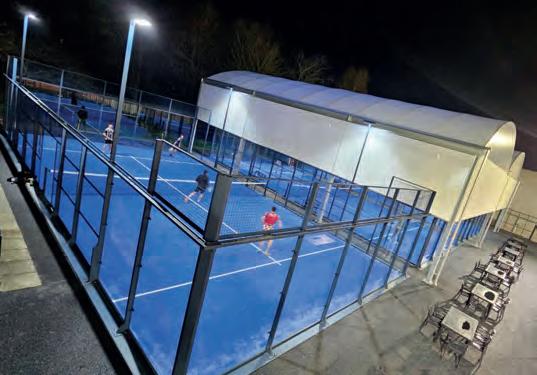

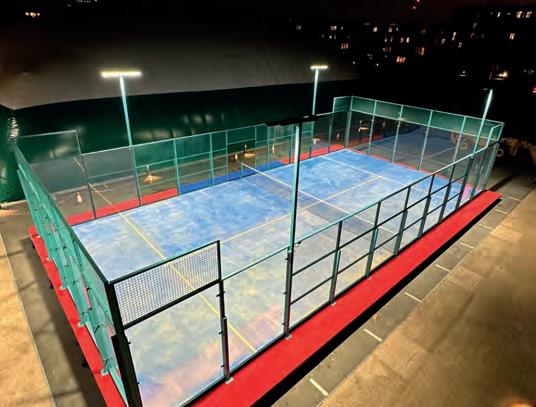
SAPCA member, Portico Sport UK, continues to grow its presence in the UK padel market and has worked on a number of facility projects recently – including at Tipton Sports Academy and Barnsley Sports Club, as well as Heron Tennis.

One of the most ambitious projects currently underway is the second phase of The Padel Club TraffordCity, which is set to become the largest purpose-built padel complex in the UK. The landmark facility will feature custom-built courts and highperformance canopies to ensure year-round playability. Meanwhile, at the iconic The Queen’s Club in Nottingham, Portico Sport UK has implemented an innovative technical solution – the Elevated Platform – specifically designed to enable the installation of courts in spaces previously deemed unviable.
The company’s commitment to quality and innovation was recognised earlier this year at the SAPCA Awards. The company’s work on the Club de Padel project in Manchester was picked as a finalist for the SAPCA Award for “Small Sports or Play Project of the Year”.


Acenta Group has signed a letter of intent with the Irish company, Padel Sports 100, regarding sale and installation of at least 50 padel courts. The delivery is planned to take place over a period of 12-15 months and the courts are intended to be provided through a lease arrangement with a term of five years. During the lease period, Acenta Group will receive a small fee per booking.
The deal is part of Padel 100’s ambitious plans for the Irish padel market. The company recently secured ¤5 million in funding to open 100 padel courts in Ireland. The funding marks an aggressive step for the growth of padel in Ireland, with the ambition to make the sport accessible across the country.
Padel 100 was founded by Ben Keohane and Ryan Hennessy and is backed by a consortium of investors

with backgrounds in both business and sport.
Construction of the first courts is expected to begin in summer 2025 with confirmed sites in Dublin, Cork, Limerick, Galway, Clare, Waterford and Wexford as part of phase one. Additional courts are planned in suburban and regional areas in 2025 and beyond.
Ben Keohane, founder of Padel 100, said: “A potential partnership with Acenta Group, together with our own investor network, offers not only a stable financial foundation but also operational expertise in delivering infrastructure on a larger scale. Acenta Group’s listing on the Swedish stock market adds international momentum and a shared vision for the sustainable and accessible development of padel sports. We look forward to continuing discussions and hopefully establishing a long-term partnership.”










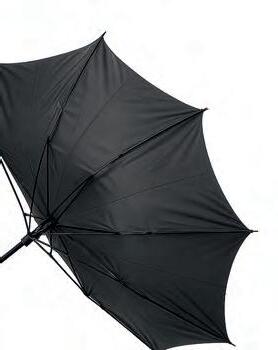


The UK climate means that each year, hundreds of thousands of games of football and cricket –as well as training sessions – are lost to the weather. SportsNation looks at three recent projects which will help tackle the impact of inclement weather on sport

The UK’s changeable weather often dominates small talk and other social conversations across the UK. So much so that our European and North American peers see us, Britons, as being obsessed with weather.
When it comes to sport, the weather has no less significance. At an elite level, weather can be seen as one of the many variables that affect performances and even results. What will the ground be like at Aintree? Will the roof on Centre Court at Wimbledon be open? Will there be a full day of play at Lord’s? How strong will the winds be at the Old Course, St Andrews?


But when it comes to grassroots and community sport, there is a serious side to bad weather. It can seriously disrupt and prevent games and training sessions from going ahead – depriving people from opportunities to take part in physical activity. And the more games are called off due to extreme conditions, the more likely it is that players will lose interest in participating in the sport.
The FA estimates that 120,000 games of football are lost every season thanks to adverse conditions. This is the equivalent of 7 million minutes of community football not played. Last year, the number of young people who said that the weather stopped them from doing any physical activity rose by 40%.
Indoor football facilities provide guaranteed playing time, regardless of weather

The long-term revenue potential and the benefits to overall public health and wellbeing are much greater if you can guarantee that training will go ahead and the match is on
Even if the matches or training sessions go ahead, motivation drops off. It’s not always fun to play or train in hot temperatures, on frozen pitches, on flooded surfaces or when high winds are enough to effect a session or game. As a result, clubs suffer the headache of having to deal with frequent cancellations and no-shows, which poses a risk to their finances, player retention and the enthusiasm of their coaches.
There are enough barriers to participation in the UK, from cost to the lack of adequate facilities and volunteers. While those can, to some extent, be controlled by investment, is there anything we can do about weather?
Yes, there is. An indoor, climate-controlled facility can guarantee playing time and they are increasingly being built to deal with both winter and summer weathers – from professional football clubs to community organisations. SportsNation looks at three separate projects which are enabling three major sports – football, rugby and cricket – to be played no matter what the weather is.
SAPCA member, CopriSystems, has installed a modern football training centre at the site of the former County Ground Bowls Club for Swindon Town FC Community Foundation. Housing two artificial five-a-side football pitches with spectator viewing area, the venue provides an accessible hub and comfortable environment for all ages and abilities to play sport, as well as a safe space for more vulnerable groups to engage in society. Its purpose has gone beyond the provision of football to the provision of an inclusive community.
“Obviously, installing a venue such as this requires significant investment but what is encouraging is hearing about the different sporting bodies that are starting to join forces and therefore funding so they can develop training centres that are accessible to multiple sports clubs throughout the year,” CopriSystems says.
In addition to the Swindon project, Coprisystems has recently finished a mammoth project in Swansea,

which received investment from both the Welsh RFU and the Welsh FA so it could be used for rugby and football. Considering rugby and football are traditional outdoor winter sports, the two projects are helping to grow participation at grassroots level.
“The long-term revenue potential and the benefits to overall public health and wellbeing are much greater if you can guarantee that training will go ahead and the match is on,” CopriSystems says.
Bradford Park Avenue Cricket Club, a community cricket ground in Yorkshire, is a popular venue that is used by thousands of Bradfordians every year. However, bad weather was increasingly playing havoc with schedules, from training to matches. There were also limited opportunities to accommodate the huge demand for cricket during the winter months, when the ground was out of bounds.
As a result, the local cricket club was looking to create a solution which would allow year-round play at the site. The cost to build an indoor cricket nets facility with up to five lanes, complete with heating and lighting, however, could have been anything upwards of £5 million pounds, making it an expensive prospect. Therefore, the club
The Bradford Park Avenue facility has seen more than 15,000 people use it
set out to find a solution which would increase the usage of an outdoor facility and boost participation, while limiting the costs involved.
Two SAPCA members combined to provide the club with the perfect answer. Total-Play designed an ECB-approved ‘hybrid’ – a non-turf cricket system for outdoor use – while Fordingbridge designed and supplied the structure to cover the playing area.
The ‘Cricket Shield’ facility features two 40mx20m covered domes with a state-of-theart lighting system, elite cricket surface and a retractable netting system allowing for training and matchplay. The 10-lane indoor facility enables play all year round and in any weather. It provides organisations the chance to increase usage levels of a typical outdoor non-turf facility without the prohibitive costs of a permanent building.

It features an ECB-approved playing surface designed to simulate the performance of a natural pitch; a bespoke lighting system that meets the standards stated by the ECB; and the safety of a ball-stop netting system designed to meet ECB guidance notes.
The Cricket Shield can also be used over an existing playing area, natural or artificial. It can host three, five and seven lanes, with a changing area for added player comfort in poor weather.
It’s given everyone an opportunity to play cricket all year round, instead of just the traditional April to September time frame
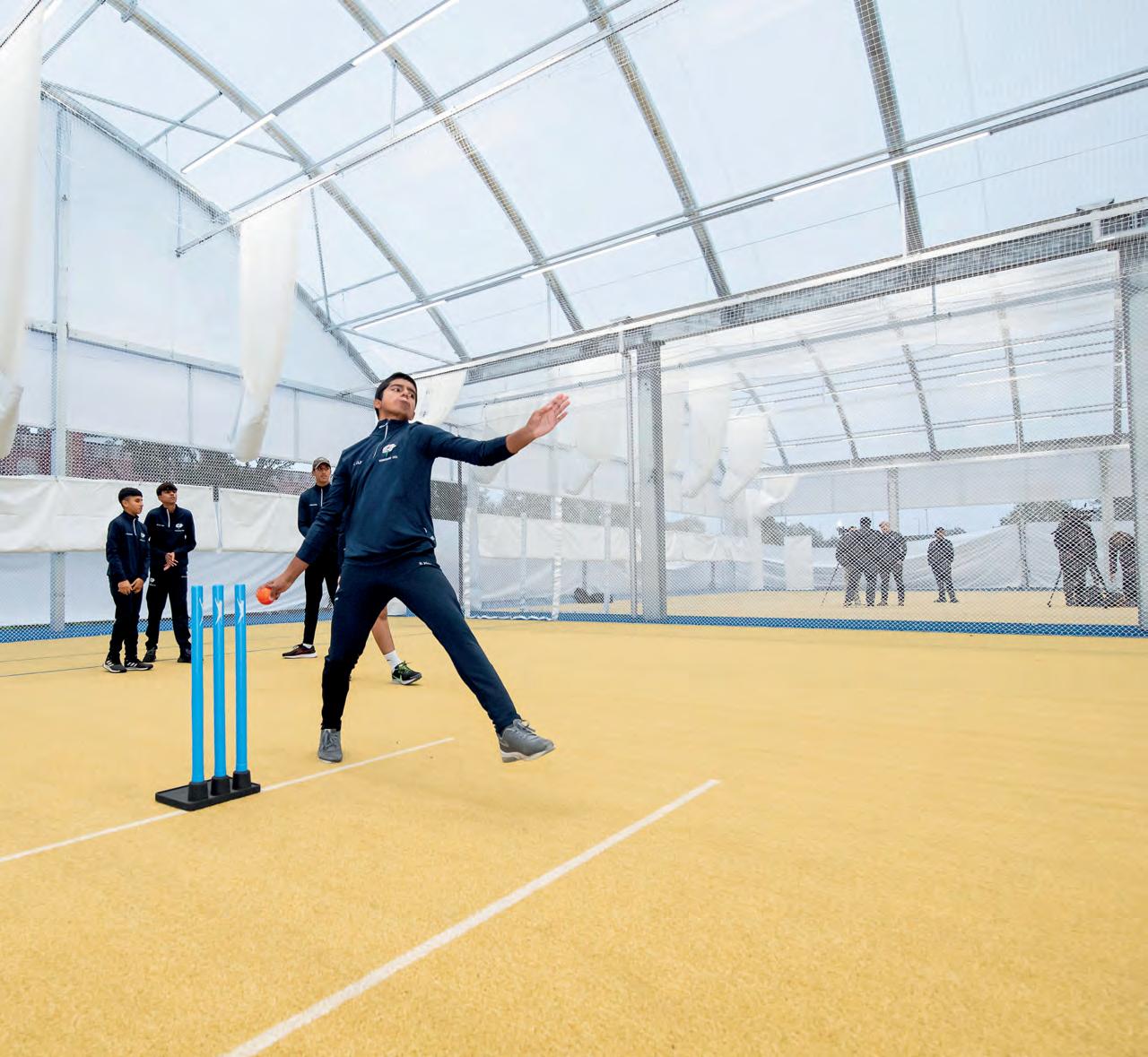
Since the Cricket Shield has opened, the facility has had over 15,000 people use the system, ranging from single lane bookings to courts for tournaments. It has had a massive impact on participation.
The system has improved access to coaching with more one-to-one coaching available to participants. Bradford Park Avenue has also hosted the county pathways coaching programme.
The number of full court bookings at Bradford Park Avenue is over 100 and the demographic of the users is diverse It has been used by cricketers of all standards – from grass roots to international players.
Nasa Hussain, Facilities Manager and Head Groundskeeper at Bradford Park Avenue, says: “When we opened the facility, no one could
have imagined just how successful it’s been. It’s a brilliant, state-of-the-art netting facility used by both the community and professional teams – and the impact has been massive.
“It’s given everyone an opportunity to play cricket all year round, instead of just the traditional April to September timeframe. We’re so privileged to be able to continue playing outdoors throughout the winter. We deliberately only charge a minimal cost to make sure it’s accessible to all. Everyone’s welcome. The love of cricket is what brings people here.”
A spokesperson for Total Play added: “The Bradford Park Avenue project has been a game changer, a pioneering new facility that transforms a traditional outdoor cricket practice facility into a covered facility for all round use.”
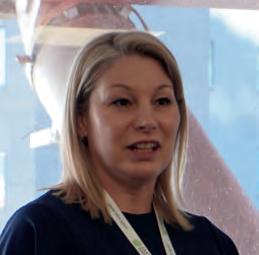
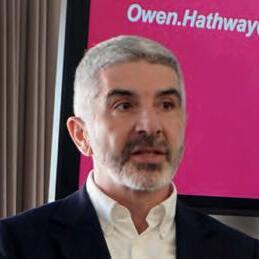
Speakers at the event included Joanne Martin (top) And Derek Walker (below)
IAKS hosted its UK and Ireland conference in Cardiff in April. Stephen Bromberg, from IAKS and Lee Valley Regional Park Authority, reports from the event, where one of the main topics was the strong need to strengthen the collaboration between health and leisure sectors
The International Association for Sports and Leisure Facilities (IAKS) held its UK and Ireland Conference at the Principality Stadium in Cardiff in April. The twoday event, titled ‘Active Wellbeing in Communities’, attracted more than 100 industry professionals to explore how sports and leisure facilities can better serve communities. Among the examples discussed was how a unique piece of Welsh legislation is influencing health and leisure, and how learnings from this can be applied in other countries.
Shaun Dawson, CEO of Lee Valley Regional Park Authority in London, opened the event, pointing out how it had a “special Welsh perspective and a strong international flavour.” This was expanded on by moderator, Joanne Martin of My Leisure Consultants, who said: “Wales is the only nation to embed in law the need to safeguard future generations through the Future Generations Act.” Keynote speaker Derek Walker, the Commissioner for the Welsh Government for the Future Generations Act, then set out how the legislation embeds long-term thinking into public policy
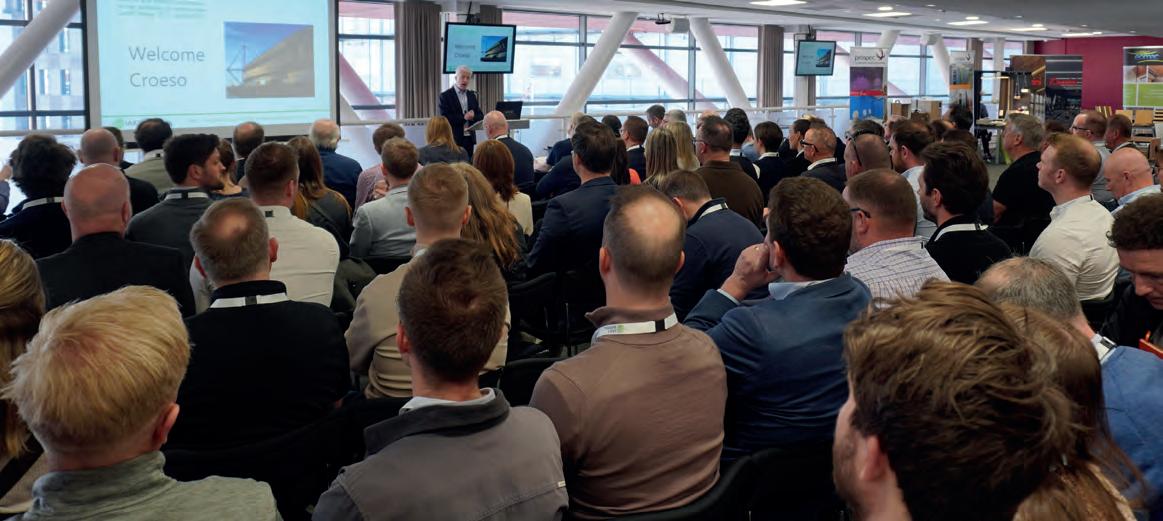
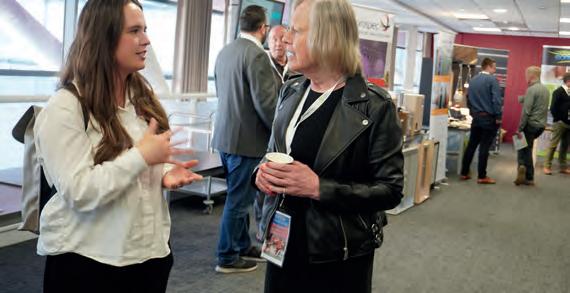
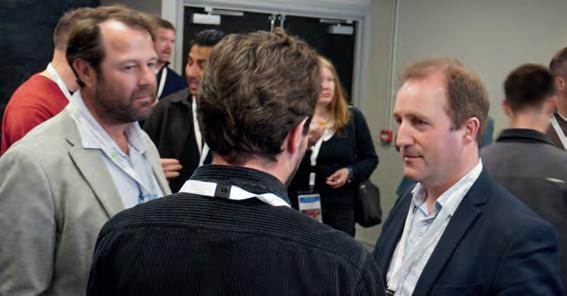
and how Wales must “do the now and tomorrow at the same time”.
“Improving health, wellbeing, active travel and eco-literacy are among the many challenges that the legislation is tackling,” Walker said. “Sport and leisure need to be more integrated into all policy areas.”
Assistant Director at Sports Wales, Owen Hathway, followed by explaining how Sport Wales’ targeted investment creates impacts beyond sport itself and” leads to health, social, community and environmental benefits”.
During the day, delegates heard several practical examples on how sport and leisure were contributing to overall health and wellbeing. Lucy Donovan, Development Officer of Newport Live’s “Positive Futures” programme, outlined how the charitable trust’s outreach work had been a huge success in one of the most challenging areas of the country.
“We’re looking across generations of people with no work, where there is poor mental health and often a lack of trust in mainstream services,” Donovan said.
“We use sport to engage marginalized young people and that activity spaces should be looked at differently – car
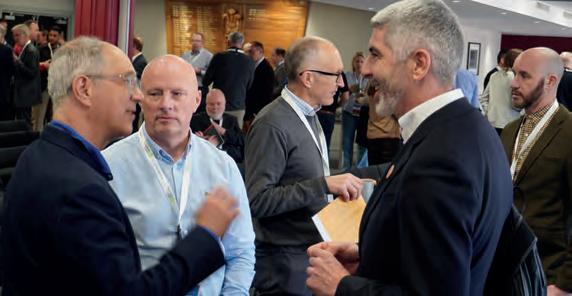
Networking and sharing insights is a huge part of the IAKS events

parks as well as community spaces, pitches and sports halls can all be used.
“New sports venues can be off-putting to many people, but with enlightened thinking they can be real community hubs with crime prevention, youth justice, social workers, psychologists and outreach under the same roof.”
Day two focused on how the leisure sector is uniquely positioned to create opportunities for communities to lead more active lives – as long as it realises how the right facility mix, solid business plans and effective operations all play a role in achieving meaningful outcomes.
According to Paul Cluett, Managing Director at Alliance Leisure, the industry needs to better understand the social value of facilities. “We’ve found that we need to sit with both users and – crucially – non-users,” he said.
He added that understanding the end-users is vital to remove barriers to activity, using a recent Alliance Leisure project at Clay Cross as an example. “Clay Cross has clinics and community advice services as well as leisure facilities under one roof,” he said. “I hope that in the future we’ll be building wellness centres, rather than sports centres.”


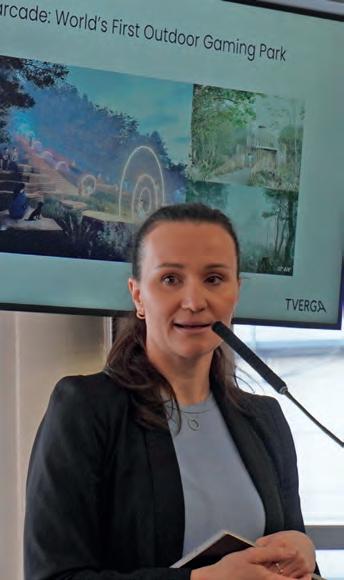
The topic of listening to users (and non-users) in the communities that facilities service was further developed by Lisa Mari Watson, Managing Director from Tverga in Norway, who outlined her organisation’s approach to this.
“We believe that smarter solutions come from involving the people that they are meant for,” she said. “The more you understand what communities want, the more likely you are to hit the target of what you create. When it comes to facilities, multi-use is much better than single-purpose. Involve users early.
“I would challenge everyone to get in touch with user groups that they don’t see in their facilities. It’s important to dare to think outside of the box.”
Stephen Dietz-Hodgson of Danish architects, JAJA, then served up another practical example of innovative space design, presenting how the practice had incorporated unstructured activity into a car park by providing “staircase running tracks” and cross fit opportunities on the roof. He also showed a separate project, the
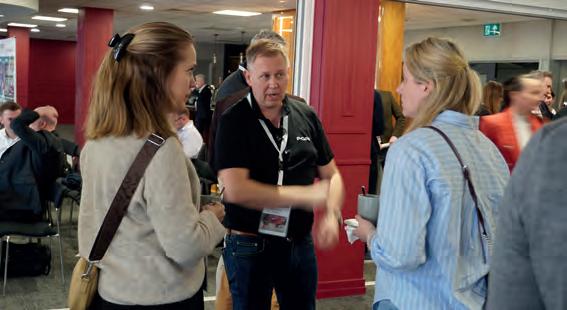
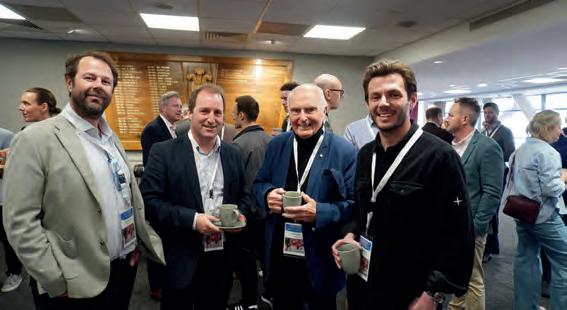
transformation of a redundant industrial building into a Streetmekka – a place for street art and street sports which “breaks down traditional ideas of sport and creates new ways of engaging”.
Steve Ward, CEO of Newport Live, reminded delegates how community facilities should also keep in mind that nearly all users seek a positive health and wellbeing impact, rather than an elite performance outcome.
“Our facilities are not for high end sport, but for local communities,” he said, strengthening the message by outlining how 99% of daily users at the Newport International Sports Village (NISV) were there to improve their health, rather than perfomance levels.
As a result, the NISV has been designed with flexibility of use in mind, with the village’s velodrome alone able to accommodate 19 different activities – the bulk of which can happen while cycling training is in progress.
He also revealed how Newport Live was utilising AI to map user activity and assist the design of new venues. “As we want people to not only live longer but to live
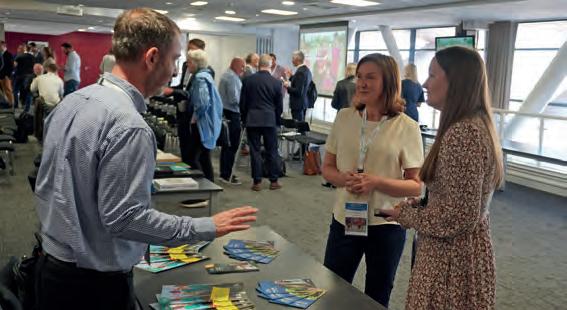
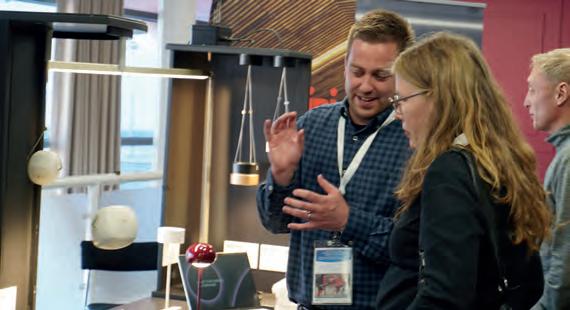
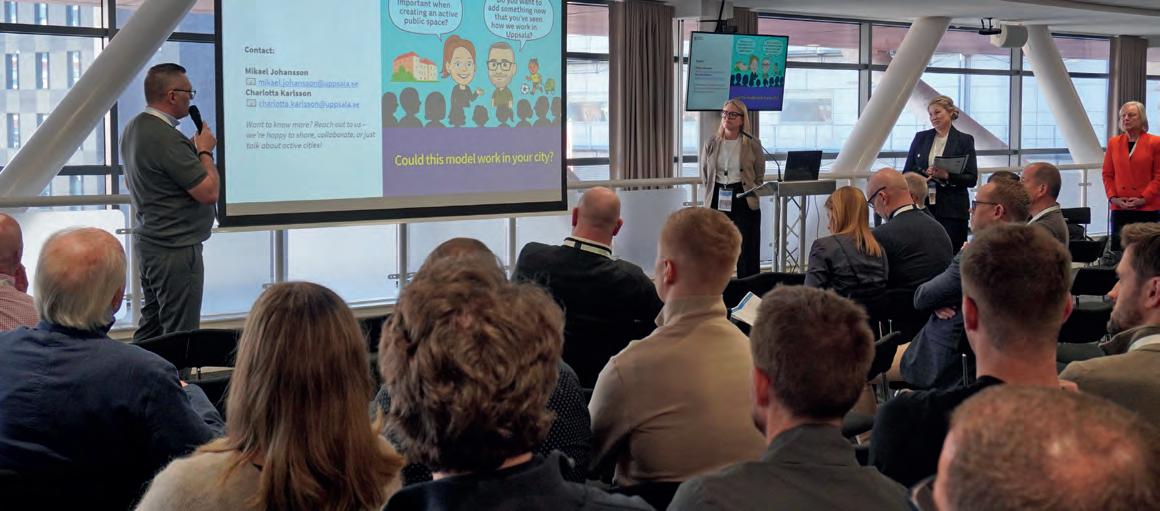
When it comes to facilities, multi-use is much better than single-purpose. Involve users early
in better health too, make sure you design things in and not out”, he said. “There is enormous social value to combatting loneliness and bringing people together. Re-engineer sports venues to be for wellness and for people’s whole lives. Single sports facilities are the enemy.”
On the topic of removing barriers for everyone, Eoin O’Brien and Barry Dempsey from Rathdown County Council in Ireland said that sports clubs often “dictate” how resources are used. This, they said, can sometimes lead to excluding certain user groups – such as young people who merely want a place to hang out, or older people who may just need a level footpath to stay active. “We are now creating many more multi-use facilities and removing physical fences and other barriers.”
The educational sessions were then brought to a close by a fascinating insight into how Uppsala, Sweden’s fourth largest city, has enabled a quarter of its population to be involved in sports clubs and make cycling a way of life. While this may sound like every public health professional’s dream,
Charlotta Karlsson from Sport Uppsala explained that clubs are mainly driven by competitive objectives which don’t necessarily embrace people who, for example, take up sport later.
Mikael Johansson from the city council also shared how the local authority had created a a year-round activity zone from an area that previously hosted only winter sports, as part of a “long, linear park”.
“We removed barriers by building support from residents and politicians and tried small scale initiatives first, with low threshold activities,” he explained. “We also have a ‘leisure library’, which lends out free sports equipment to help those who might not own any.”
As well as the educational sessions, the two-day event included a workshop, extensive networking opportunities and tours of the Principality Stadium and the nearby National Sports Centre.
A spokesperson for IAKS said: “We would like to extend a huge thank you to the seven event sponsors, 15 speakers and moderator Joanne Martin. Special thanks to Mike Lawless, Elizabeth Adams and Charlotte King from LA Architects for putting the event together and leading some unforgettable Welsh singing.”
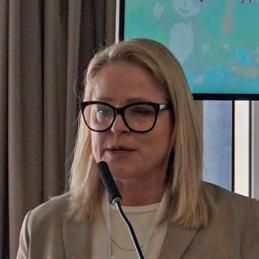
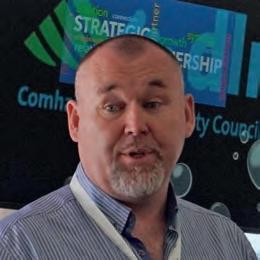
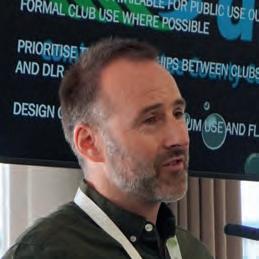
Owen Faunt and Matt Bonney from GCP Architects offer an architect’s perspective on mandatory biodiversity net gain (BNG) and what it means for the physical activity and sports sector
The landscape of sports development is undergoing a significant transformation, one that architects are involved in shaping. It’s no longer sufficient to focus solely on creating functional and aesthetically pleasing designs; there’s an increasing emphasis on environmental responsibility.
Biodiversity net gain (BNG) is a key part of this shift, influencing how we conceptualise and integrate sports facilities within the broader ecosystem. For architects working on projects that include 3G pitches, understanding BNG principles is now at the forefront of our design work.
BNG represents a measurable approach to development, mandating a 10% increase in biodiversity. This isn’t merely a guideline; it’s a requirement for securing planning permission. The Environment Act 2021 provided the legislative framework for this change, with BNG becoming mandatory for major development projects in February 2024 and for small sites in April 2024. This legislation marks a shift from simply mitigating environmental harm to actively pursuing biodiversity enhancement. It signifies a transition from a “do no harm” ethos to an “actively do good” approach.
BNG Works
BNG uses a metric to measure biodiversity in “Biodiversity Units” (BU). A development project starts with a baseline assessment - usually undertaken by an Ecologist - to determine the existing biodiversity value of the site. The goal of BNG is to ensure that the development results in a measurable increase of at least 10% in these biodiversity units. This can be achieved through various methods, such as creating new habitats or enhancing existing ones, either within the development site (onsite) or by contributing to biodiversity improvements elsewhere (offsite).
What does this mean?
For developers, this means that every project must consider its impact on the surrounding ecosystem and identify practical ways to contribute to ecological improvement. This involves a range of strategies to achieve the required biodiversity net gain.
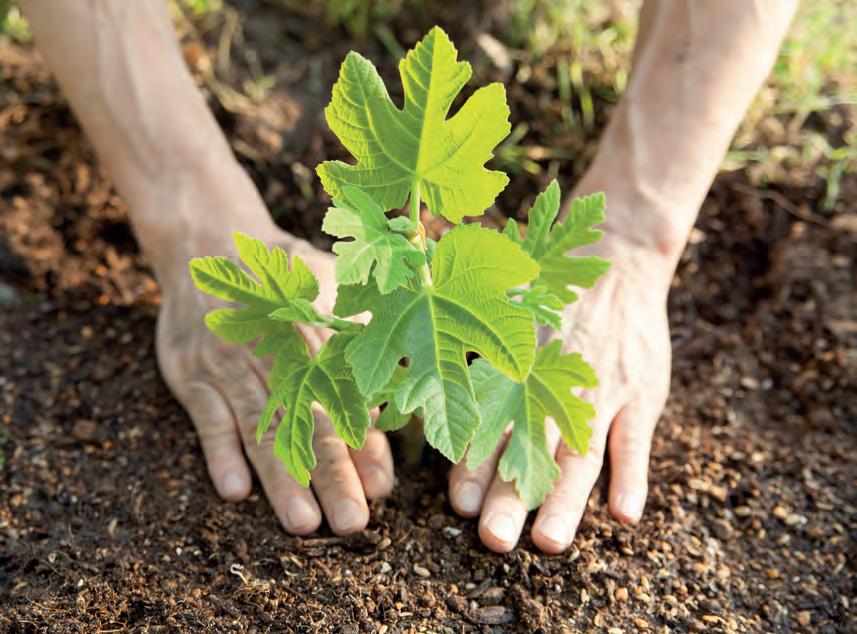

The BNG process is structured and involves several stages:
Site selection (considering existing ecological value)
Baseline assessment (documenting existing biodiversity)
Scheme design (integrating BNG measures)
BNG assessment (measuring biodiversity gains)
Development of a BNG Plan including both onsite and offsite BNG strategies
(prioritising effective solutions)
Planning approval
Ongoing BNG maintenance for a minimum of 30 years
It signifies a transition from a ‘do no harm’ ethos to an ‘actively do good’ approach
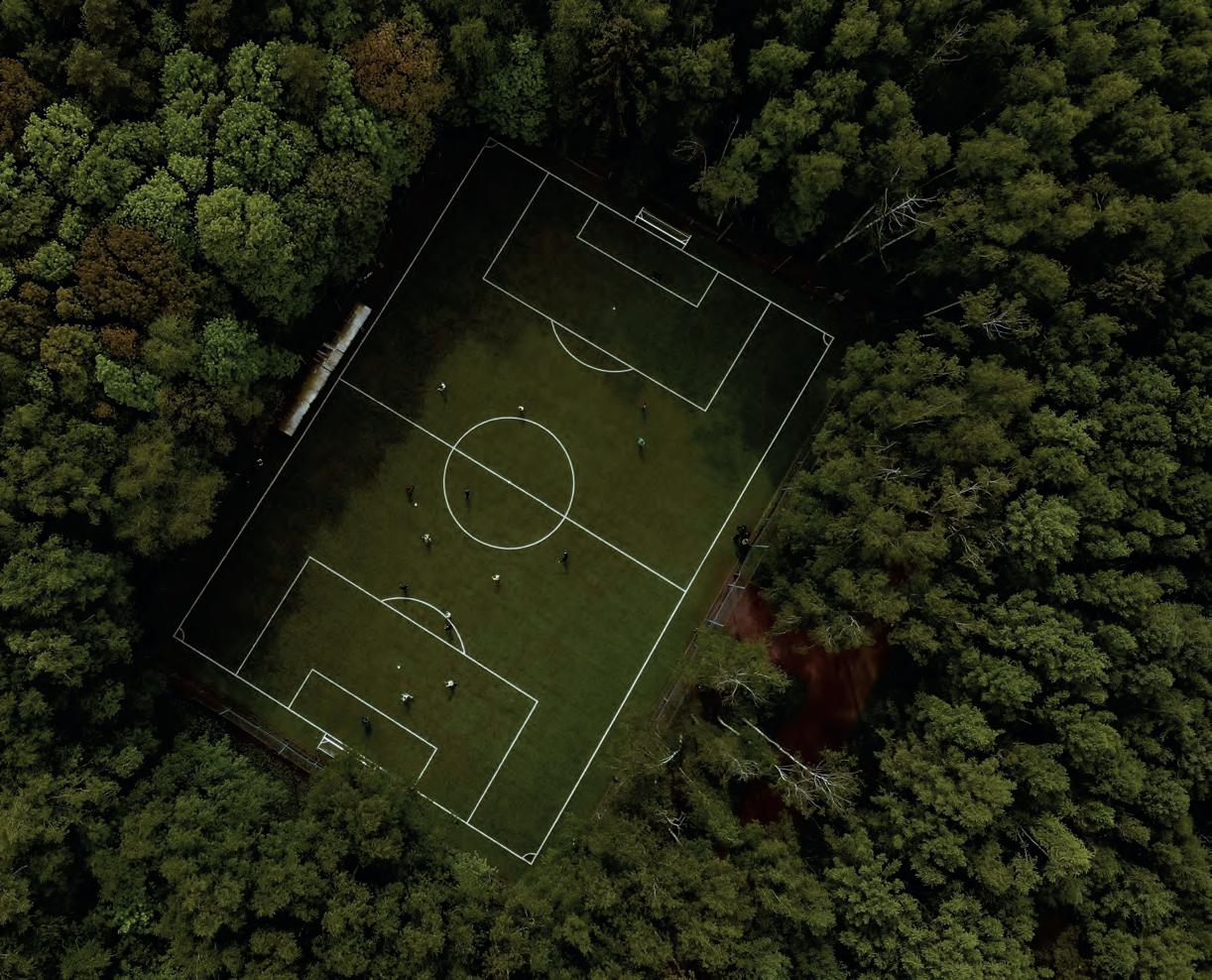
It’s a holistic and long-term approach that demands careful planning and execution. A challenge in sports development, particularly with artificial pitches, is that like-for-like replacements can result in a loss of biodiversity. For instance, the replacement of a natural turf pitch with an artificial surface can lead to a reduction in biodiversity units. However, this loss can be offset by the design and integration of diverse habitats within the areas surrounding the pitch, demonstrating that practical solutions can reconcile development with ecological gain. BNG can be achieved through two primary avenues – onsite and offsite. Onsite BNG consists of integrating biodiversity enhancements within the development site itself. Offsite BNG, meanwhile, means purchasing biodiversity credits to compensate for biodiversity losses that cannot be adequately addressed onsite. Developers should be aware that offsite credits can be a significant cost factor. At the time of printing prices range very approximately from £42,000 and £125,000 per biodiversity unit (for non-wetland areas), making onsite solutions often more practical. By embracing BNG principles and adopting a proactive, pragmatic, and collaborative approach, developers can play a role in creating not only welcoming and functional sports facilities but also more sustainable environments. Remember, “Conversations cost nothing,” so initiate discussions about BNG early, prioritise ecological considerations, and make BNG an integral component of your project.
Successfully navigating the requirements of BNG necessitates a proactive and informed approach, here are some pro tips:
BNG Pro Tips for Developers Pro TipDescription
Do Your Research Thoroughly investigate the local authority’s specific stance on BNG, as certain authorities may mandate biodiversity gains exceeding the national minimum of 10%. Don’t commit to a site without investigating the likely baseline biodiversity value.
to an Ecologist Early
Engage with a qualified ecologist as early as possible in the project life-cycle, as ecologists are currently in high demand. A pragmatic and professional presentation of the ecological status of a site is likely to be crucial to the planning decision. Early conversations are valuable.
Be Realistic
Don’t Cut Corners
Adopt a practical perspective regarding project costs. Offsite credits can be expensive, particularly in the context of sports and play developments. Explore all potential onsite solutions and consider consulting with Sport England for guidance.
Avoid the temptation to cut corners on BNG implementation, as this can lead to complications, delays, and increased costs.
Defining and upholding standards are important for any industry or line of business. But when budgets are tight, is there a danger that “quality marks” – especially if they need to be paid for – are placed on the “nice to have” list?
The sport and leisure industry is rich in quality marks, from Sport England’s Quest and SAPCA’s Quality System to ukactive’s newly launched The Active Standard (TAS) and Swim England’s Learn to Swim. But what purpose do they serve? And are they worth the effort? It’s a question operators around the country are considering when budgets are cut and utility bills have skyrocketed.
Right Directions, the sector’s health and safety and quality management expert, manages the accreditation of many of these awards on behalf of
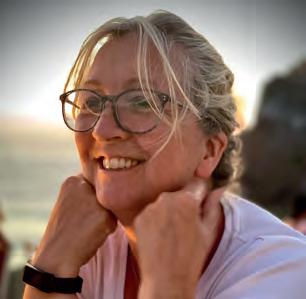
Without that annual check in, it’s easy to lose focus on being proactive around continuous improvement
CAROLINE CONSTANTINE
its industry partners. Managing Director, Caroline Constantine, explains why they’re important and how, by regularly assessing and enhancing services in line with industry best practices, they can help operators to innovate and grow.
“A belief that internal processes are sufficient, along with perceived cost and resource implications, a fear of scrutiny and a lack of awareness of the benefits, can make prioritising external accreditations an easy cull when you’re in the thick of managing a sports club or leisure centre and an already overstretched budget,” she says. “However, without that annual check in, it’s easy to lose focus on being proactive around continuous improvement. The end result is that customer satisfaction declines and they don’t return.

“We know ourselves as a business that things easily slip when you’re caught up in day-to-day operations. That’s why we commit to a number of external accreditations, including ISO 45001, ISO 14001 and ISO 9001. Knowing we regularly need to produce proof of our policies and procedures, operational effectiveness and service delivery standards is enough to ensure we remain proactive and on top of documenting evidence across the key areas as we go along. It also means there’s no last minute rush to collate everything and put any missed plans in place just before assessment day.
“As with leisure-specific standards, these accreditations help to enhance operational efficiency and best practice, and demonstrate our business’s commitment to quality and continuous improvement, which in turn builds trust and credibility with stakeholders, helping us to stay competitive.”
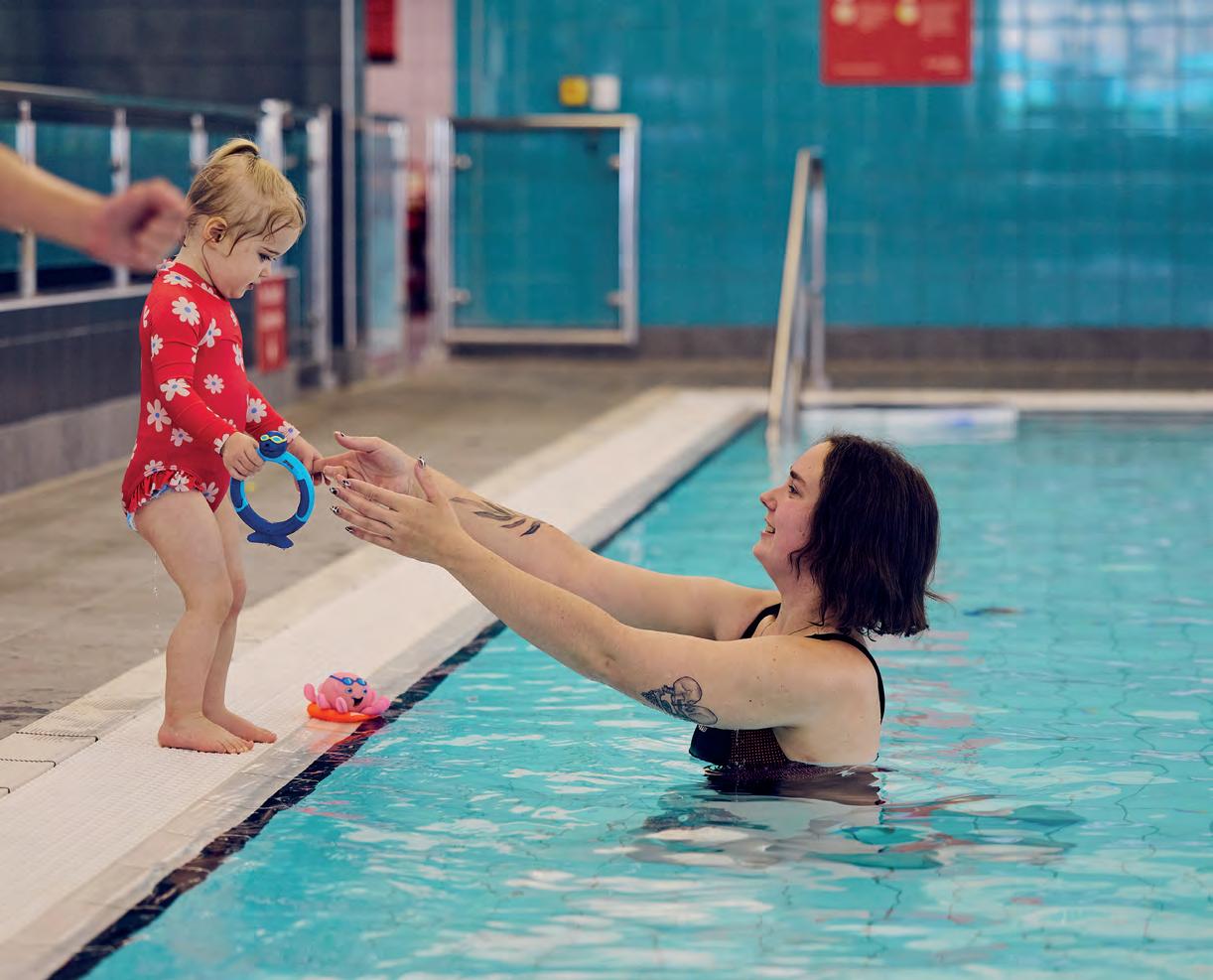
Awarding excellence in leisure Leisure industry accreditations act as recognition from key stakeholders, including SAPCA, Sport England and other governing bodies, that operators are adhering to set standards embracing safety, inclusivity, training and operational excellence, enhancing customer confidence through independent verification.
Day-to-day this encompasses regular staff training, policy updates, monitoring compliance and customer engagement - actions that should already be taking place, but may fall by the wayside if not regularly checked.
Many of the accreditations involve an in-depth independent assessment by industry experts, which includes site visits, a review of documentation, interviews with members of the team and performance evaluations, as well as mystery visits, via online, email, telephone, social media and in-person check ins, to challenge operational processes. This encourages operators to stay proactive year-round and ensure readiness for the formal evaluations. Regular reviews also support organisations in adapting to fit evolving best practices, with a focus on measurable outcomes, not just compliance.
The physical activity sector’s most well-known recognition marks:
Quest - established more than 20 years ago, Sport England’s Quest measures how well a facility is operating and how effective organisations are across a range of topics, to help deliver greater impact and social outcomes.
SAPCA Quality System - SAPCA’s Quality System ensures that only specialist companies that can consistently deliver high standards of sports and play facilities – from design, construction and professional services to products and equipment – can join SAPCA and then remain as members. Each SAPCA member commits to the Quality System and regular inspections to ensure standards are maintained.
The Active Standard (TAS) - developed by ukactive in partnership with leading standards professionals and organisations across the UK and Europe, and now compulsory for ukactive member operators, the new mark of excellence is designed to demonstrate operators’ commitment to quality, safety and inclusivity.
The following awards can be carried out standalone or as part of the Quest assessment:
Learn to Swim - Swim England’s scheme assesses key business areas to recognise excellence, and acts as a mini business plan, helping operators to improve their lessons programme and offer a consistent pathway with clear progression goals to keep customers engaged.
Exercise Referral Standard (ERS) - developed by Right Directions in partnership with Suffolk Public Health to reassure GPs and health professionals that they can refer in the knowledge accredited facilities are successfully delivering programmes that have been rigorously tested using ‘real-world’ criteria.
Tackling Inequalities in Leisure Standard - replacing the Inclusive Fitness Initiative (IFI) back in 2022, accredited sites are recognised for their commitment to making sport and exercise accessible to everyone.
The Quest accreditation process has proved extremely valuable to Magna Vitae Leisure Trust since it started the process in 2016, offering a structured and comprehensive framework for continuous improvement. Executive Director, James Brindle says: “Through Quest, Magna Vitae has been able to regularly assess and enhance its services, ensuring they meet high industry standards and exceed customer expectations. The accreditation process has allowed us to effectively benchmark our performance against best practices, identify areas for growth, and implement targeted improvements. This has
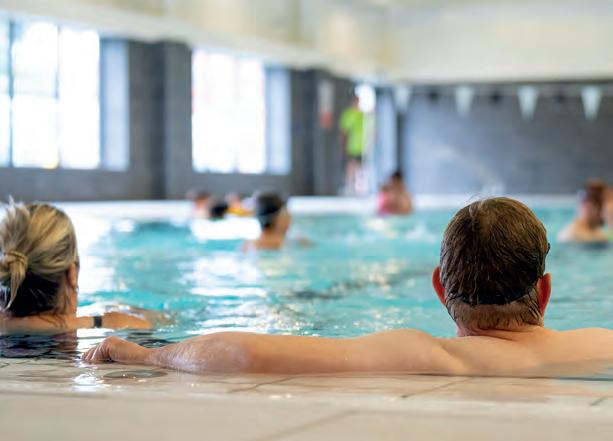

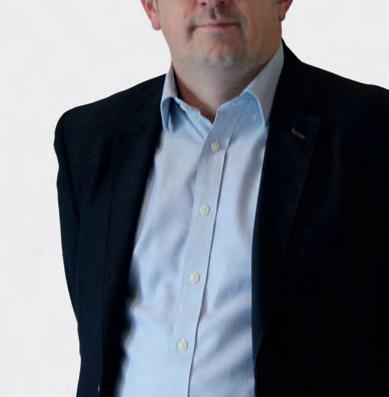
The accreditation process has allowed us to effectively benchmark our performance against best practices
JAMES BRINDLE

not only strengthened operational efficiency but also enhanced staff engagement and development, fostering a culture of excellence and accountability within the organisation. The external validation provided by Quest also helps build trust with the local community and stakeholders.”
Sarah Lobo is Head of External Accreditations at Right Directions. She says: “External accreditations are a hallmark of excellence. They show customers that your facility meets nationally recognised standards for safety, service and programming, signalling to your community that quality is at the heart of everything you do, protecting both your customers and your reputation.

“People want to feel confident when they choose a sports club or leisure centre. Promoting the fact you have accreditations, standards and best practice guidance from trusted organisations like SAPCA, Sport England and Swim England reassures them that your facility is professional, safe and focused on their wellbeing.”
SAPCA’s Codes of Practice set out industry standards for construction across all facilities, including MUGAs, artificial turf pitches, athletics tracks, tennis and padel courts as well as netball courts. There is also a Code of Practice for fencing systems and the association is currently producing another on sports lighting.
Through its inspection programme, checks are carried out on members’ projects – both completed projects and active construction sites – to assess the site management and health and safety procedures in place. The thorough processes ensure SAPCA members continue to deliver high quality facilities.
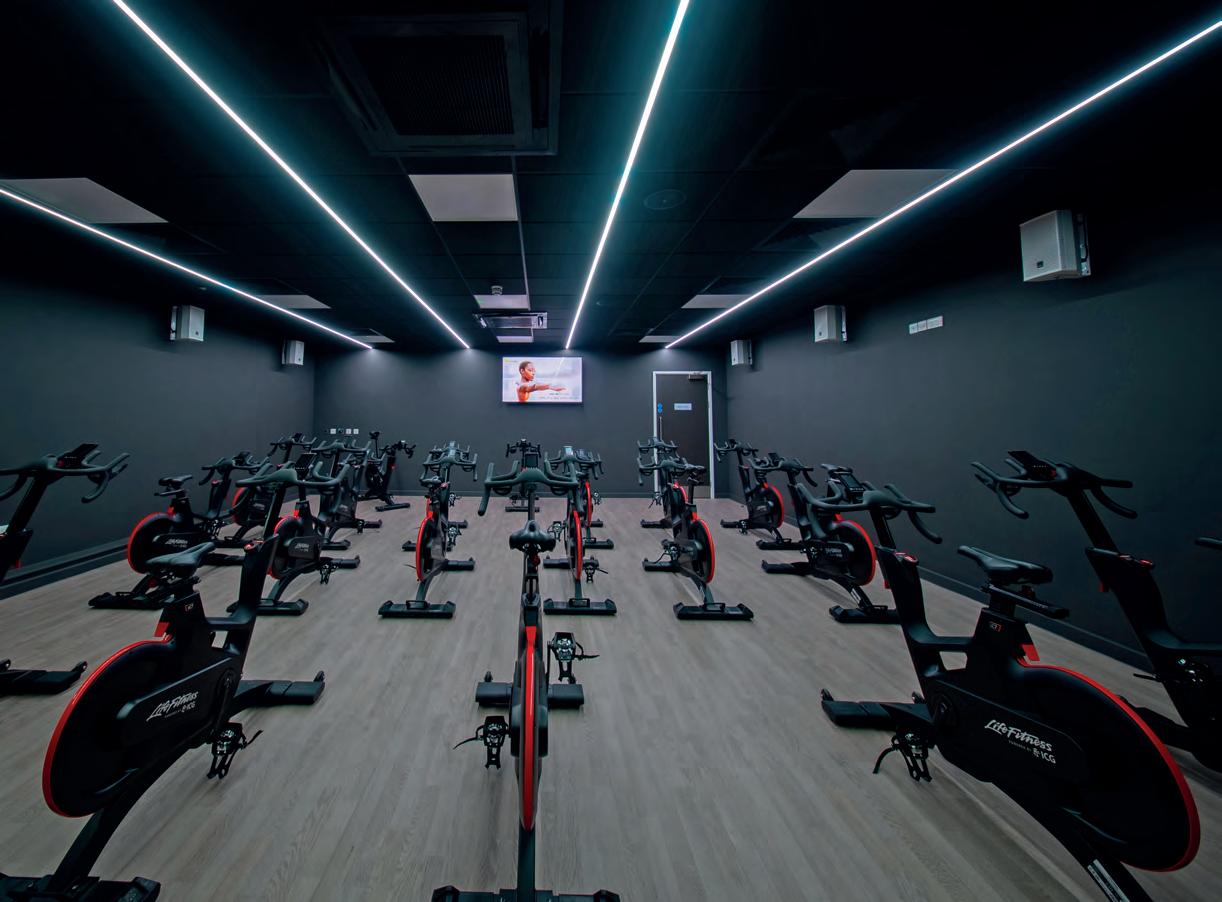
Constantine believes that utilising accreditations and investing in them helps clubs and centres to stand out in a crowded field where they are competing for a share of the market. She says: “They’re a visible sign of your commitment to excellence - a powerful marketing tool - making your facility the go-to choice for individuals, families and organisations seeking high-quality facilities and services. For example, by demonstrating, through Swim England’s accreditation, that it is delivering the best possible Learn to Swim experience helps schools to grow and ultimately earn more income.”
Ian Cotton, Group Aquatic & Activity Manager at Everyone Active agrees: “Independent verification of our standard processes and procedures through the Swim England accreditation is an important element of us maintaining a high-quality scheme. Swim lessons are a key part of our business, and holding the National Governing Body accreditation endorses the great work undertaken by our swim managers and swim teachers, and helps to raise the profile of the Learn to Swim programme offer at facilities.”
The quality marks also give an added air of authority to grant applications, as many funding bodies, local councils and corporate sponsors favour accredited
centres that can demonstrate accountability and deliver measurable results, opening the door to greater funding opportunities and strategic partnerships.
“Unlike simple self-assessments, these industryrecognised accreditations undergo rigorous evaluation to ensure they meet sector expectations and funding requirements,” notes Lobo, keen to highlight they’re far more than just tick box exercises. “Operators must actively demonstrate their commitment to continuous improvement, ensuring they meet the scrutiny of funding bodies and regulatory organisations.
“The process can also highlight gaps in knowledge, skills or compliance areas, helping businesses to identify areas for growth and enhanced staff competencies. They act as a reminder to invest in CPDs, specialist courses and certifications, as well as internal coaching and mentoring. It’s proven that access to training and professional development opportunities for staff directly leads to improved service delivery and operational excellence.”
l For further information on all the industry accreditations and courses on offer via Right Directions visit: https://rightdirections.co.uk/ For further information on SAPCA’s quality system visit: https://sapca.org.uk/sapca-quality-system/



18-19 JUNE









200+ Exhibitors

1000+ Products
200+ Speakers











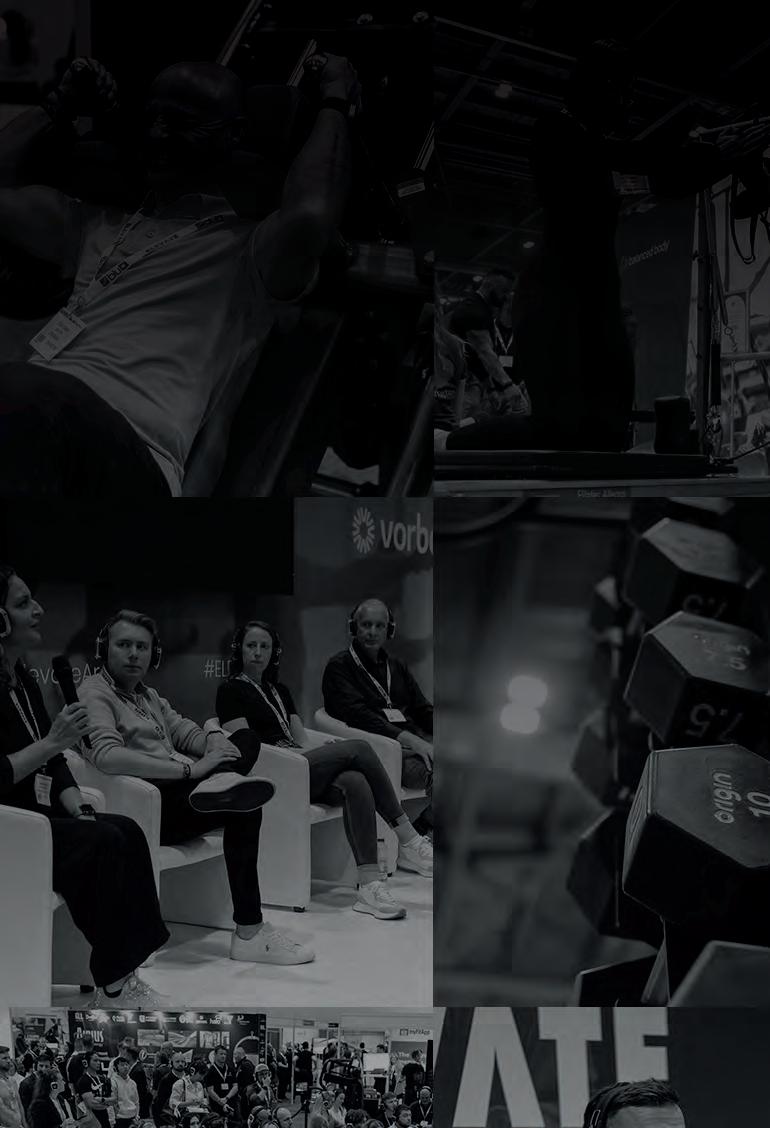






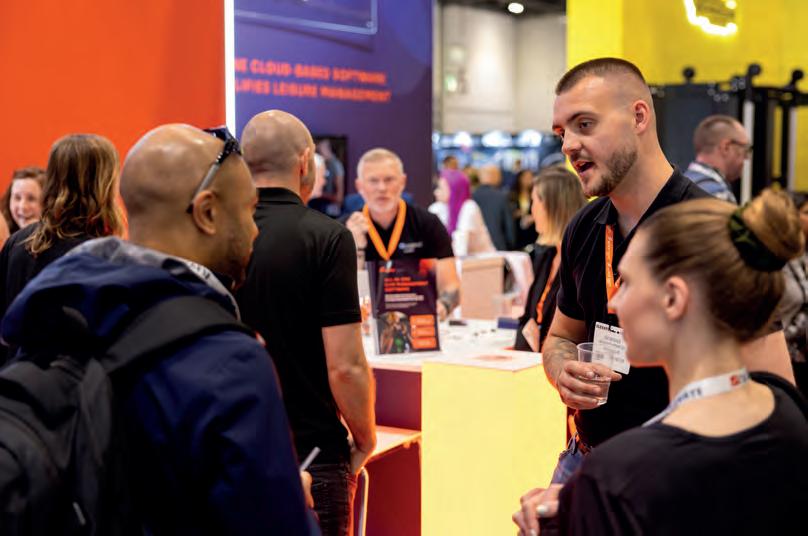
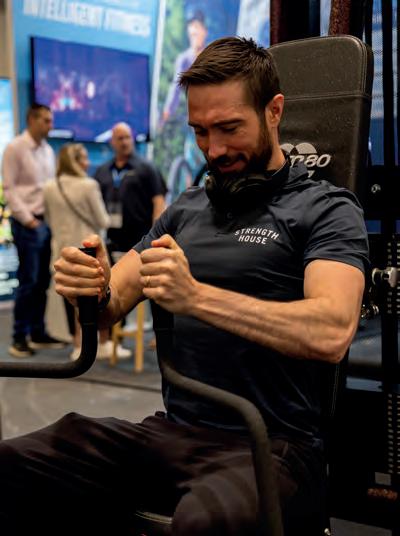
Elevate, one of the UK’s largest physical activity events, is returning to London’s Excel for the eighth time in June. SportsNation spoke to Event Director, Lucy Findlay-Beale, about this year’s show
Since launching in 2016, Elevate has grown into the UK's flagship event for uniting the sports, physical activity, fitness and sports therapy sectors around a shared vision: improving national health and wellbeing. Taking place over two days, the event brings together more than 6,000 decisionmakers from sports clubs, universities, gyms and beyond – all united by a shared commitment to improving the nation’s health through movement. At the heart of Elevate 2025 is the exhibition floor, featuring more than 200 suppliers showcasing the latest innovations in equipment, technology and physical activity solutions. Alongside the exhibition, attendees gain access to an unrivalled programme of education and insight, with over 200 expert speakers delivering


sessions across multiple theatres. With the backing of 50+ industry associations, media partners and national governing organisations, Elevate serves as an annual meeting point for professionals looking to connect, learn and lead the way forward.
Importantly, Elevate remains free to attend, ensuring accessibility for all professionals committed to driving meaningful change.
This year, the sector’s momentum is unmistakable. We're seeing increased collaboration, rising standards, and a deeper alignment with the health agenda. From non-referral pathways to hospitalbased movement programmes, it’s clear that physical activity is becoming a vital part of the wider health conversation. The sector is evolving
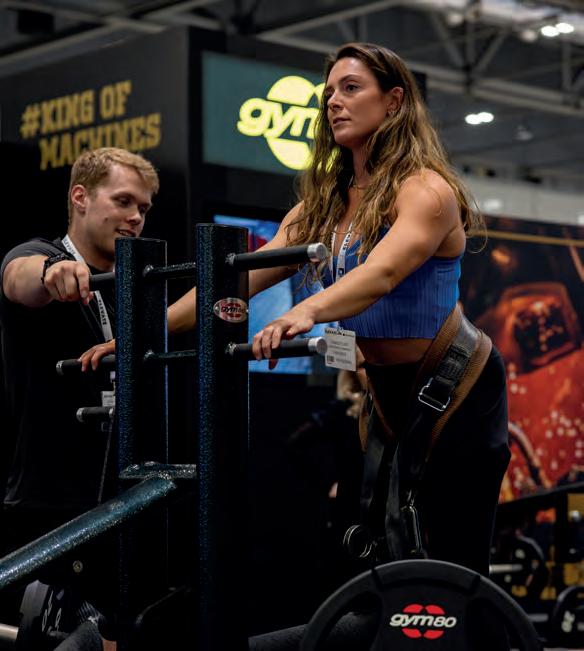

– more connected, more ambitious, and more impactful than ever. The momentum is reflected at Elevate 2025, mainly because the event is built by and for the industry. We are once again incredibly grateful to our sponsors, partners, exhibitors, and speakers, whose insights and commitment shape every part of the event.
The 2025 programme features more than 200 expertled sessions across four newly curated theatres: Debate, Generate, Accelerate and Collaborate. Each theatre delivers unique content streams tailored to different areas of the sector, designed to provoke discussion, share best practice and explore the ideas and trends shaping the industry’s future.

– SPONSORED BY SPEEDFLEX
Elevate’s main stage theatre, which hosts highlevel discussions on the most pressing issues in the industry. This year’s topics include a deep dive into whether the sector’s data adds up, discussions on GLP-1s and the increasing overlap between the fitness and health sectors.
The Generate theatre focuses on the business of physical activity, providing insights into market trends, innovation and commercial success. A particular strand will look at both workforce and staff – including how to attract people to a business, what makes them tick and how to keep them.
A theatre dedicated to supporting the wellbeing and performance of the already active, delivering expert-led discussions on fitness, health, and rehabilitation. Topics will cover everything from bio-hacking and breathing techniques to sleep strategies and peri-natal training.
The Collaborate stage brings together expert voices to explore public sector and community initiatives aimed at improving the health of the nation through accessible physical activity programmes, effective use of data and joinedup, place-based leadership. Strategic insight, community case-studies and inspiration combined.
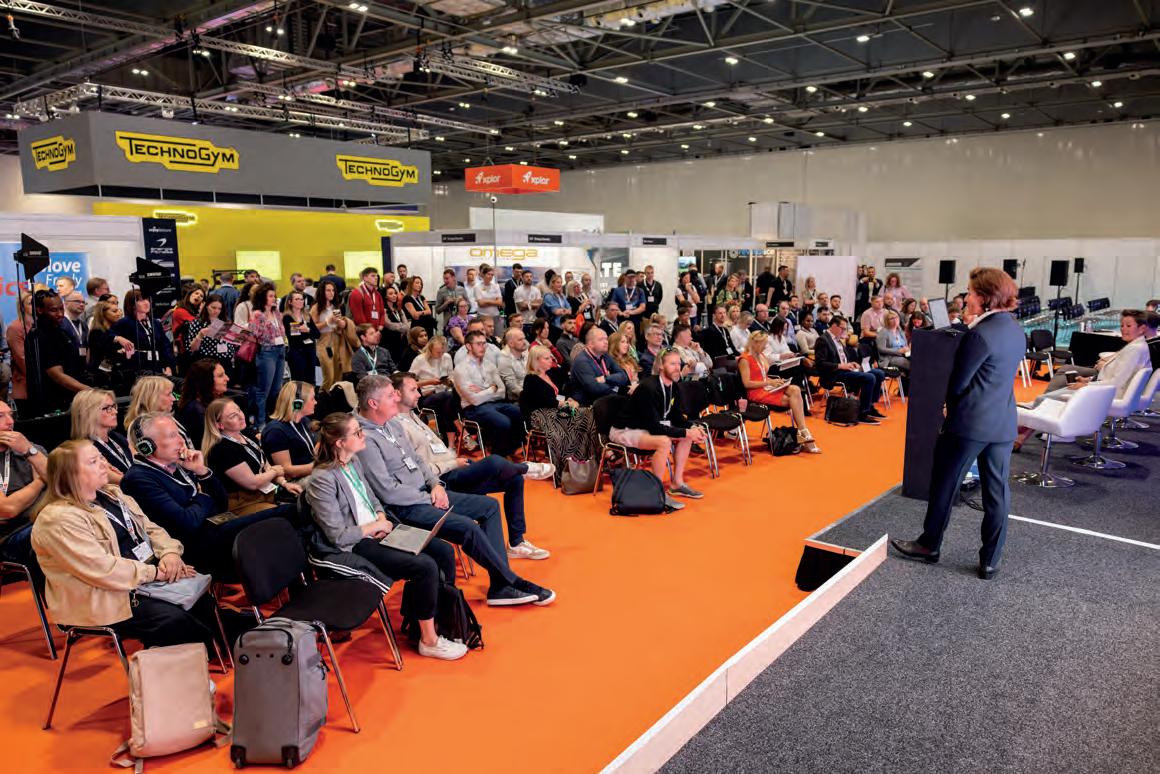
Elevate will also host FitPro LIVE – what is it?
FitPro LIVE is designed with fitness instructors across the UK in mind, offering trainers an education and networking experience packed with inspiration, insight and innovation.
This year’s FitPro LIVE will be bigger and bolder than ever before, with an immersive, hands-on learning experience. It will offer a mix of practical workshops, expert-led sessions and trend-focused talks delivered by a stellar line-up of global educators and industry influencers – including Rachel Holmes, Cherry Baker, Faye Edwards, Helen Carpenter-Waters and Adam Daniel.
The programme will be split across three spaces: Skill Lab, for live demonstrations and technique-driven classes; Insight Arena, featuring deep dives into research, coaching and industry insight; and Showcase Space, spotlighting innovative concepts reshaping group exercise.
Aquatics will also be taking a centre stage?
Yes, the Royal Life Saving Society UK (RLSS UK), Swim England and the Swimming Teachers’ Association (STA) are joining forces for the second, successive year to ensure aquatics are firmly at the heart of Elevate 2025. Together, they are sponsoring
ELEVATE 2025
DATES: 18-19 June 2025
VENUE: Halls S7 - S8, Excel London OPEN TIMES:
Wednesday 9.30am – 5.30pm Thursday 9.30am – 4.30pm Register for free – elevatearena.com
the Active Aquatics theatre area – an essential hub within the Elevate exhibition highlighting aquatics’ vital role in health and wellbeing and encouraging aquatics enjoyment in communities across leisure and fitness centres nationwide.
Located at the rear of the exhibition and surrounded by top aquatic suppliers, this year’s expanded area will feature two dedicated theatres, creating a dynamic space for learning, discussion and networking. The theatres’ programmes will address industry challenges, provide innovative solutions from leading experts and operators, as well as deliver a wide range of strategic and operational sessions relevant to aquatic professionals. Topics will range from apprenticeships, technology and new industry guidance to advice on how to maximise movement in swimming lessons for neurodiverse learners.



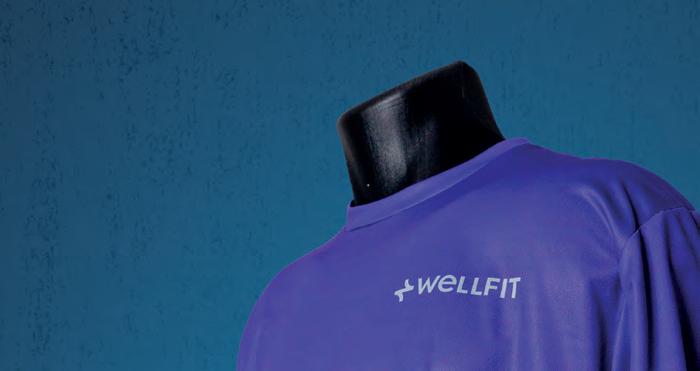


Pixel-perfect logos


















Perfect for gradients




























































































































































SportsNation
The Smart Strength Squat – “the future of strength training”. Squats are widely recognised as one of the most effective exercises for building strength, stability, and mobility. EGYM is celebrating this essential movement with the latest addition to its Smart Strength series: the Smart Strength Squat. EGYM has also developed the Squat Flexibility Test on the Fitness Hub, its onboarding machine
With a heritage spanning more than 45 years, Balanced Body is dedicated to improving lives through the extraordinary practice of Pilates. The brand provides top-quality equipment, professional education and resources for a lifelong journey of movement and vitality. Crafted with precision and functionality, its equipment has been designed to enhance Pilates practice for instructors and practitioners.

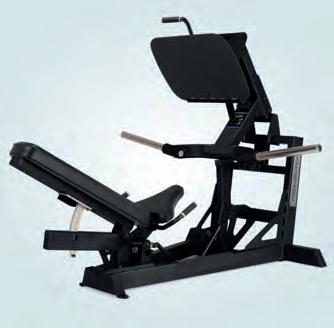
Freemotion, the pioneer of innovation in strength and functional training, has introduced the EPIC Plate Loaded Series, a new era of industrial equipment designed for the most effective full body strength training. The new kit redefines plate-loaded training, offering gym operators an exceptional return on investment while providing users with a robust, biomechanically optimized lifting experience.

Xplor is showcasing its new gym member app. Powered by customers’ Xplor Gym software, the app helps clubs engage, motivate, and retain members. The app is available in two options – a standard branded option and custom-branded. What really sets the app apart are the member experience-enhancing integrations.
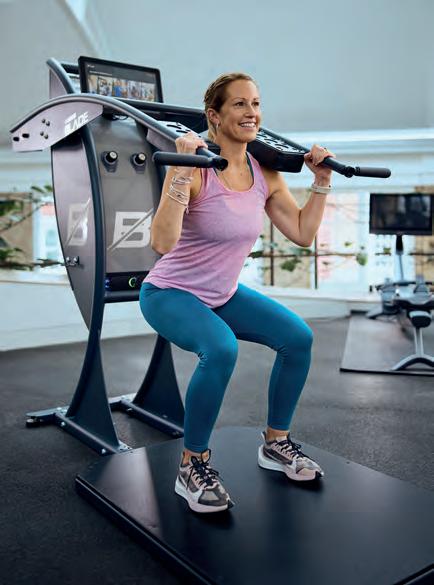
Speedflex will showcase the latest iteration of its Blade at Elevate. Featuring a sleek new design including refinements to the platform, screen and dials for optimal user experience. A variety of new ondemand workouts have been added to the library, based specifically on customer feedback and usage data on the most popular sessions.







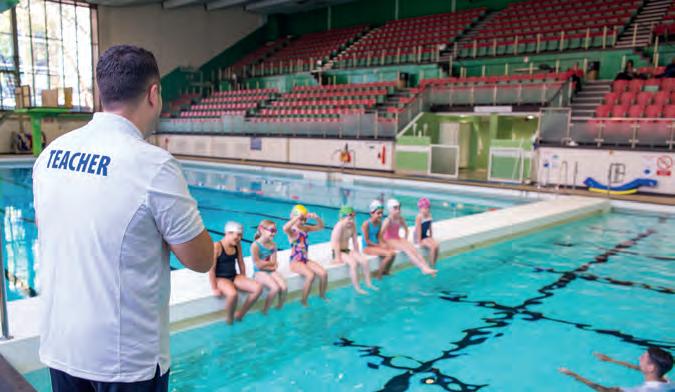
STA is set to make a splash at Elevate this year, showcasing its full portfolio of accredited qualifications in swimming teaching, lifesaving, first aid, health & safety and pool plant operations. The STA team will also share what's new in first aid and lifesaving, while highlighting the benefits of leisure operators aligning all their aquatic training needs with one recognised awarding organisation.
Cloud Gym introduces GYM, a custom AI designed to transform customer service in gyms through WhatsApp. Available 24/7, GYM automates interactions, boosts sales and builds customer loyalty leading to up to 62% higher conversion rates. It also enables personalised offers and updates, streamlining communication and improving member satisfaction.

Pulse will showcase two major innovations: its new Step Mill and the upgraded TRAKK 2.0 ecosystem. The Step Mill delivers a low-impact, high-intensity cardio experience, offering OnDemand 10, 20 and 30-minute workouts to suit all fitness levels. Meanwhile, TRAKK 2.0 evolves Pulse’s digital ecosystem with the launch of a new web-based app.

Wattbike will bring its new Air-Pro to Elevate – the ultimate indoor cycling solution for gyms and health clubs. Building on the legacy of the Wattbike Pro/Trainer, the Air-Pro features upgraded magnetic resistance, a powerful new performance touchscreen, and seamless integration with the Wattbike Hub and third-party apps.
At Elevate, delegates will be able to discover Q-NRG Max, an advanced metabolic system developed by Cosmed. It has been designed to eliminate the limitations of traditional metabolic carts, offering user-friendly, efficient experience for both clinicians and fitness professionals. Designed for precision, it provides accurate assessments of VO2 Max and Resting Energy Expenditure.
KeepMe has introduced two free guides specifically for UK fitness operators. The State of UK Lead Gen pulls together insights from recent industry research data to help fitness businesses understand what's actually working when it comes to generating leads today. Implementing AI Sales Agents is a hands-on guide that shows how AI is already being used by forward-thinking operators to manage and convert leads more effectively.
Suntory is the #1 supplier of functional sport and energy drinks to the UKs health and fitness industry. At Elevate, delegates can learn about Suntory’s latest product innovations –including Lucozade Sport in partnership with Jude Bellingham and the fastest growing energy drink celsius.

Sterling Turf designs and manufactures high-tech, durable synthetic turf for gyms and sports venues. Its DuraMax sled track turf is a market-leading, high density, heavyweight sports turf, which combines the latest fibre technology, resulting in a high performance gym surface that’s built to last. Created for both indoor and outdoor installations, it can be used as a sprint track or complete gym flooring to enable functional fitness over large areas.
At Elevate, IndigoFitness will set up a fully functional flexible studio training space at its stand, designed to be immersive, adaptable and experience-led. Throughout the show, Indigo brings the space to life with Les Mills Ceremony classes, HYROX-inspired hybrid sessions and Mat Pilates, demonstrating how a single space can flex to meet a wide range of training and wellbeing goals.
Helmsman will be exhibiting its range of lockers, cubicles, benches, IPS and vanity units. A UK-based company, Helsman takes pride in bespoke solutions designed and manufactured to suit customer requirements and specifications.
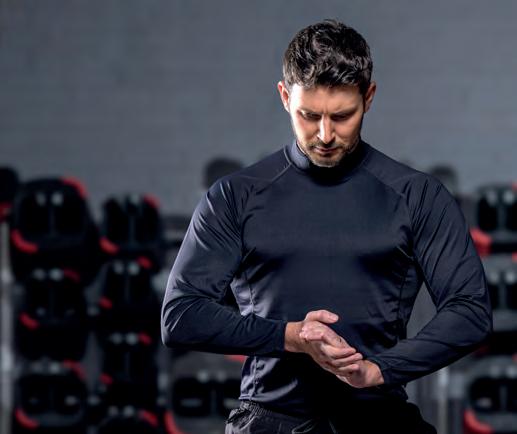
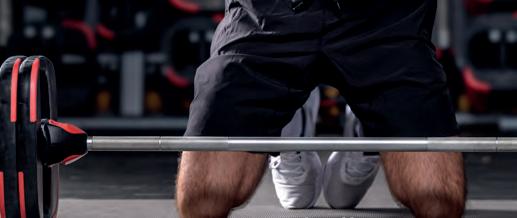

Taylor Made Designs (TMD) supplies activewear, corporate clothing and brand-enhancing merchandise to the health & leisure industry. At Elevate, delegates can explore TMD’s Leisure Essentials range – a performance clothing line designed specifically for people who work in the physical activity and fitness sectors. The range can be custom branded and shipped in low minimum quantities to multiple sites.
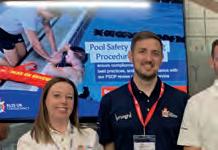





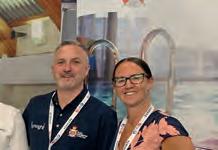


RLSS UK – the leading authority on lifesaving, lifeguarding and water safety – is on hand to talk about its qualifications, training and the latest industry guidance. At the RLSS UK stand, delegates can learn from a wide range of topics, from the latest in swimming pool supervision technology guidance to vocational training opportunities. RLSS UK is also co-sponsoring the Active Aquatics theatre, alongside Swim England and the STA.







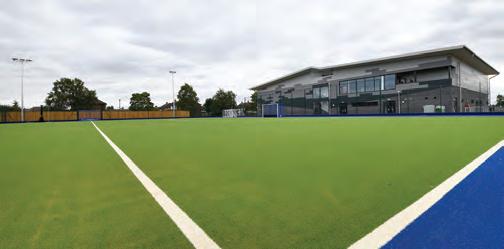













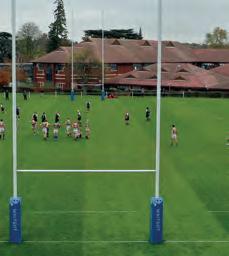









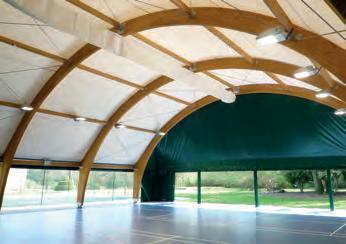








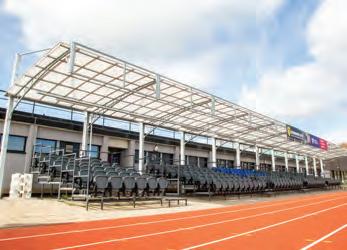






































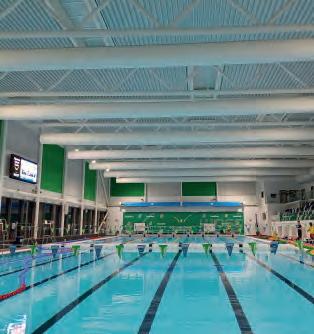





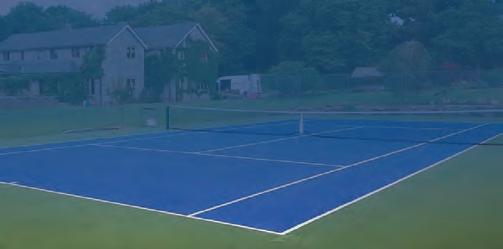

















































































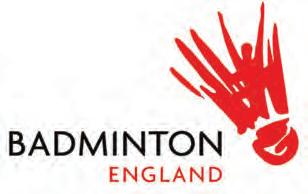










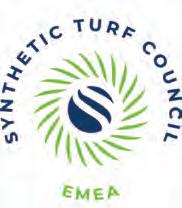



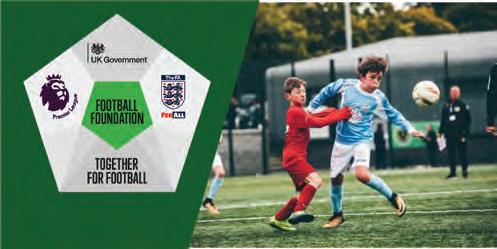
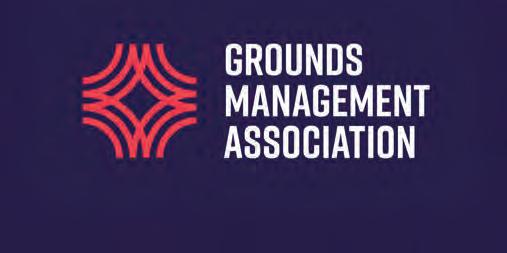







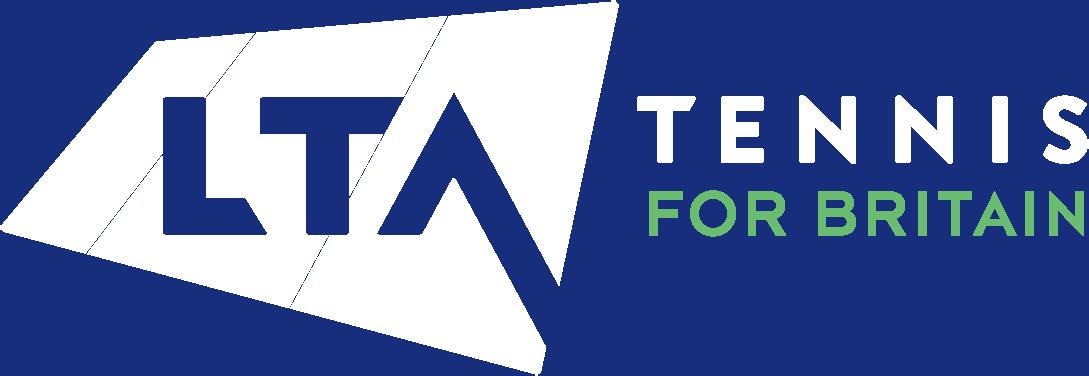



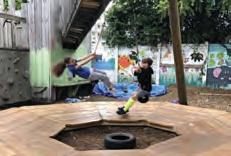

























a Fast-Emerging Racket Sport

Strategic
Researched and written by Ray Algar. Publishing February 2025
Ray Algar, Managing Director, Oxygen Consulting, UK
Introduced to the UK 26 years ago, why is padel gaining momentum now?
The UK Padel Report is written for senior stakeholders and represents the country’s first comprehensive investigation into the growth of padel across the nation.
This landmark report explores
● The strategic drivers shaping UK padel
● A detailed audit of all UK padel courts, including a future forecast
● Analysis of the UK’s top 10 operators
● Exclusive new player research exploring why people are choosing this exciting sport
● Expert interviews with stakeholders shaping the sport’s future
No advertising. Just actionable insight.
Exclusive sponsorship opportunity Contact Ray Algar to secure the sole sponsorship: ray@oxygen-consulting.co.uk www.oxygen-consulting.co.uk
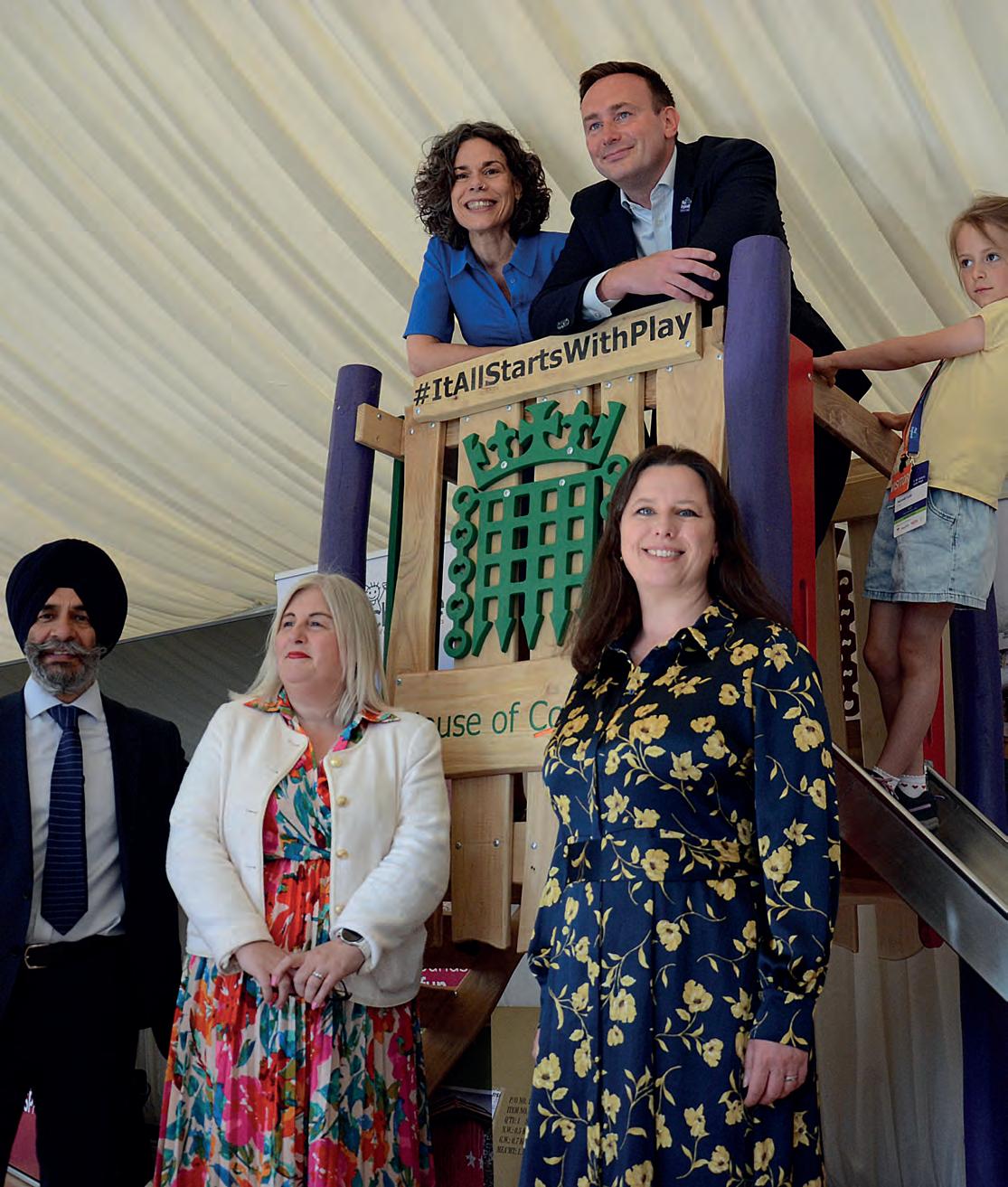
Play England campaigns for all children and young people to have freedom and space to play throughout childhood.
We work with national partners and other organisations with shared aims to raise awareness about the importance of play. We lobby government to make fundamental policy changes to protect and promote play, and encourage everyone who has an impact

on the lives of children and young people to recognise and plan for children’s play.
Play England has also built up considerable experience and resources to help support individuals and organisations that work in these particular areas:
Government
Local Authorities
Schools
Playwork

We need your support
The new UK government is making positive noises about understanding the importance of play. However, against this positive backdrop, Play England is suffering from a lack of funds to pay for our essential work campaigning for children’s right and freedom to play. Donate today to support our work. www.playengland.org.uk/donate

www.playengland.org.uk
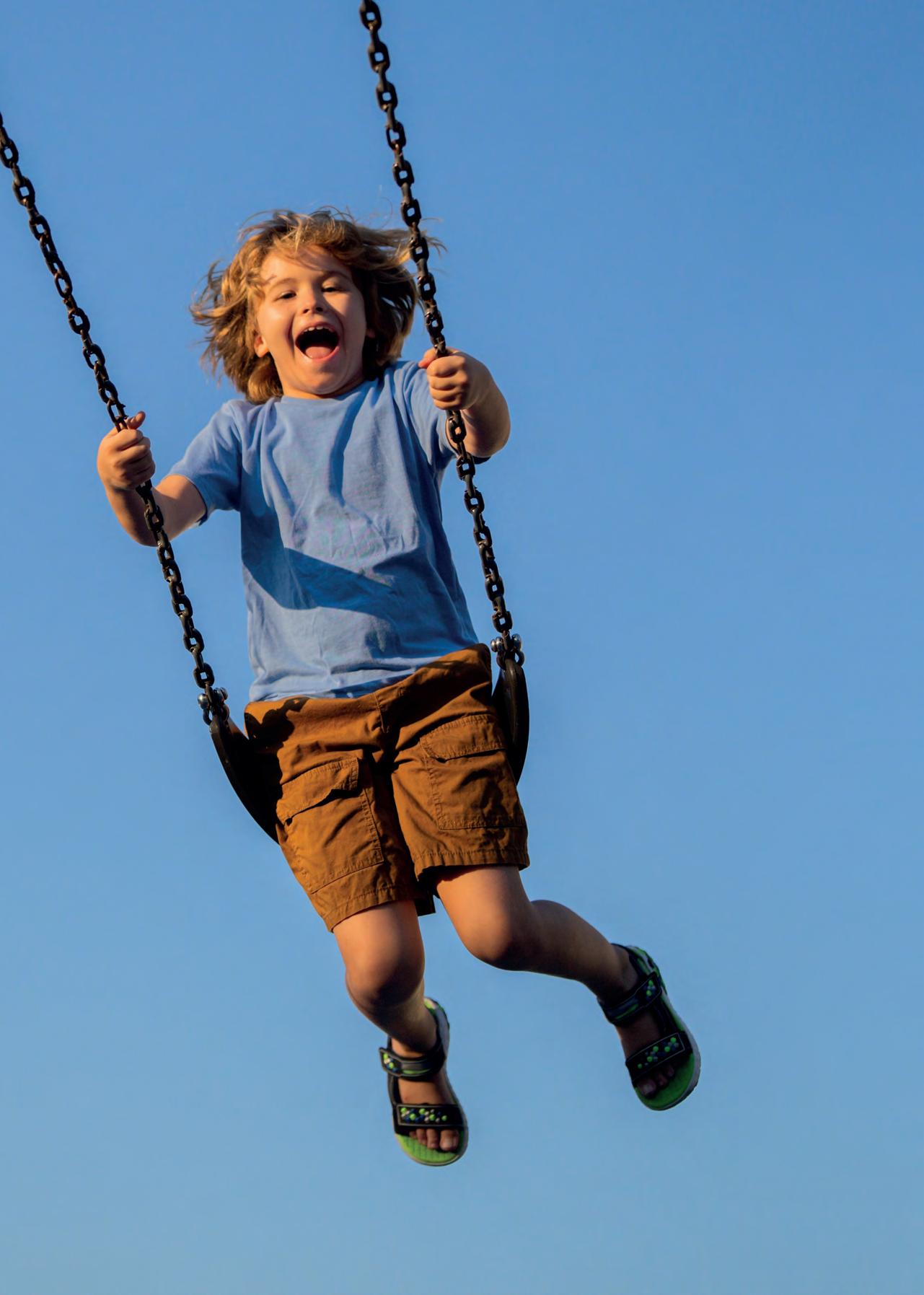








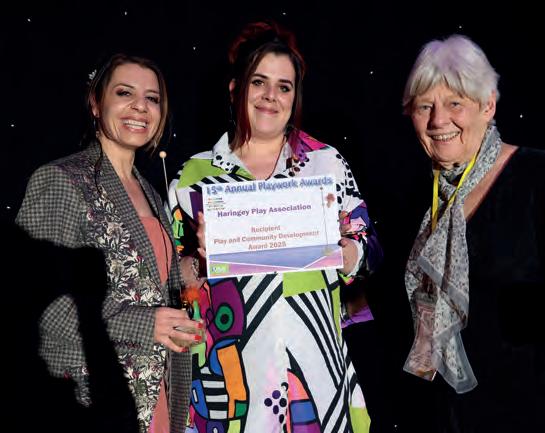


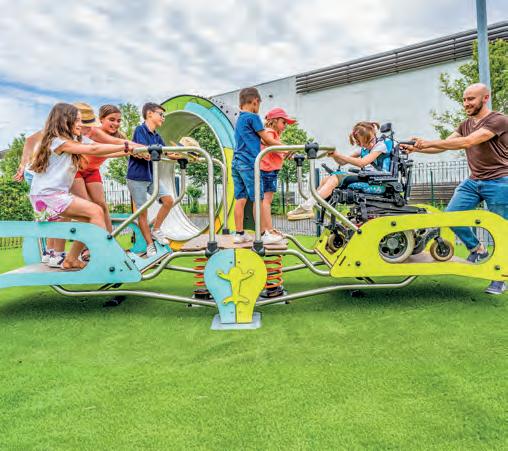

120 News
A round-up of the latest play industry news
128 Play, politics & joy
Amber Ogunsanya-William outlines why Play England’s new strategy is a game-changer
130 A strategic play
Play England wants to “make play normal again” with its 10-year strategy document
136 Indoor play nds its voice
What is the AIP and what does it do?


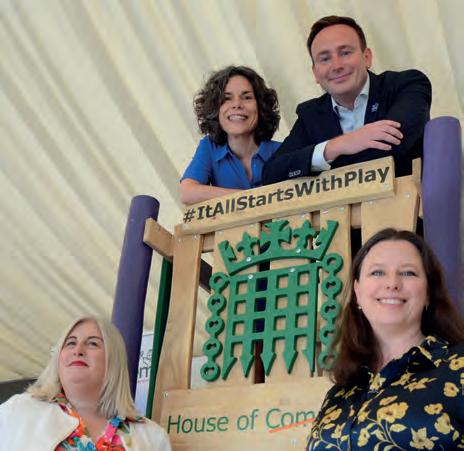
138 Unlocking potential
This year’s Elevate event at London’s Excel will feature a dedicated Active Kids Theatre
142 Celebrating playwork excellence
The recipients of the Annual Playwork Awards have been revealed during the National Playwork Conference – the UK’s largest national event for the playwork sector
146 Universal play, universal joy
Creating inclusive and accessible play spaces for children is becoming increasingly important




















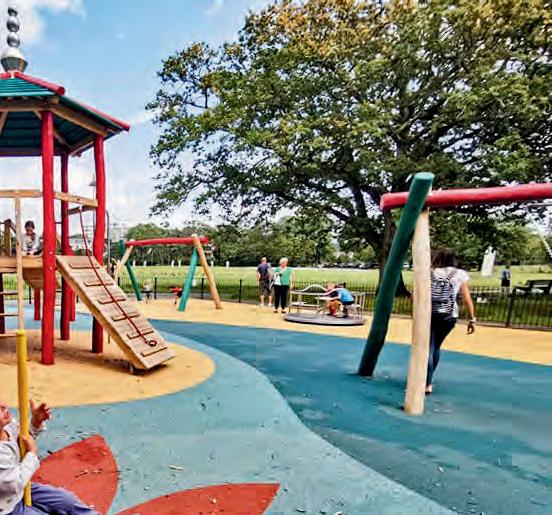
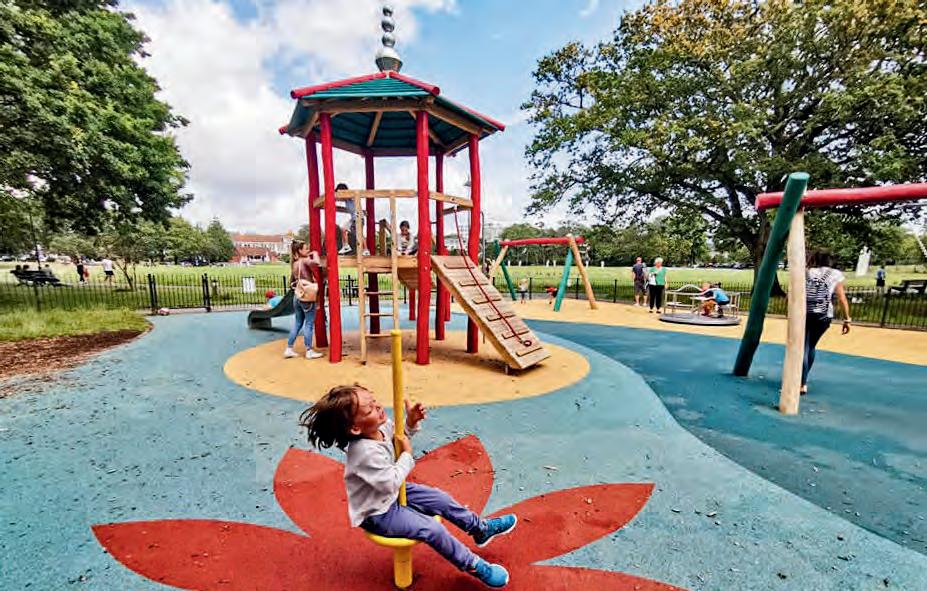
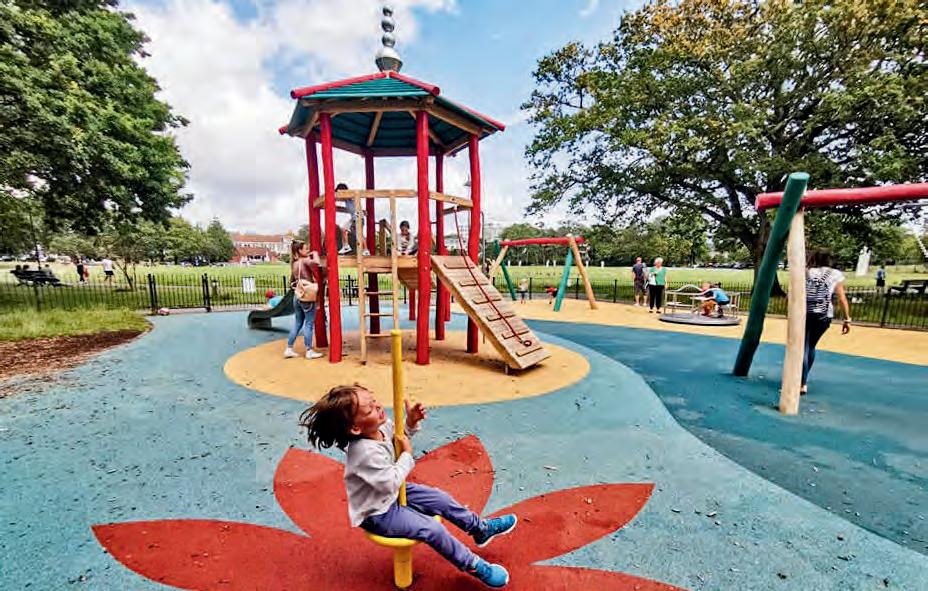




At Jupiter Play, we’re dedicated to delivering playgrounds that leave a lasting legacy. With our unique design approach, clients and end-users are included throughout every stage of the project, from render to reality.



DISCOVER OUR PROCESS today
Design-led Approach

Community Consultation
















3D Renders and Fly-throughs



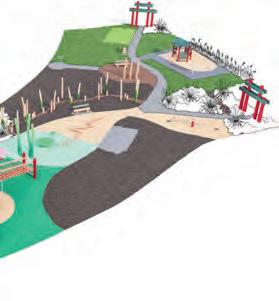

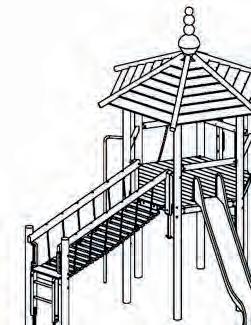


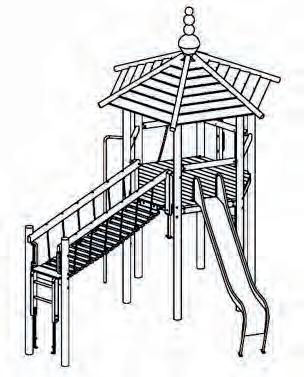
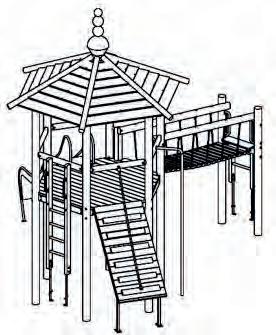
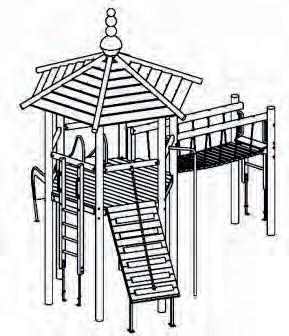
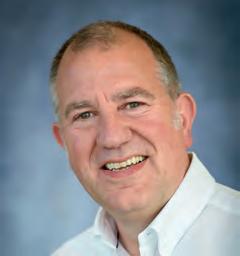
John Challinor
Publisher
PlayNation
john@nationmedia.uk



Maria Cantarella CEO

Association of Indoor Play Tom Hayes MP MP for Bournemouth East @TomHayesBmouth Tom Walker

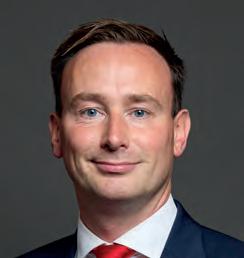
PlayNation, in partnership with Play England and SAPCA (the Sports And Play Construction Association), is dedicated exclusively to the dynamic and growing sector of play and physical activity for children and young people. Published bi-monthly, the magazine focuses on the policies, people and places that help young people to play and be more active. Subscribe now and we will email you a complimentary copy of the magazine every two months.











opportunities Contact John E: john@nationmedia.uk http://www.linkedin.com/ company/playnationmag @PlayNationMag FOLLOW US:
PlayNation is published by SportsNation Ltd in association with Play England (www.playengland.org.uk) and the Sports And Play Construction Association (www.sapca.org.uk)
This publication is protected by copyright and no part may be reproduced, transmitted or stored in any print or electronic format without the written permission of the publisher. Every effort has been made to ensure the accuracy of the contents of this publication and PlayNation accepts no responsibility for any error or misrepresentation. Opinions expressed by the contributors and advertisers are not necessarily those of the publisher and we do not accept responsibility of losses or damages arising from them. Printed by BCP Media Group Ltd.


Retail-ready grip socks Drive secondary spend










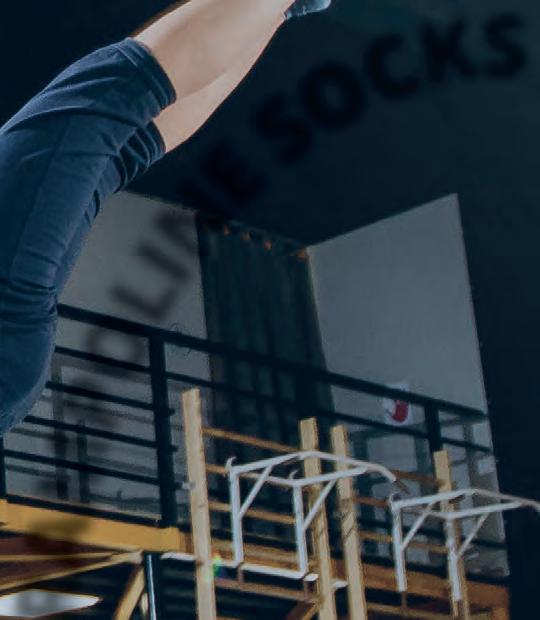


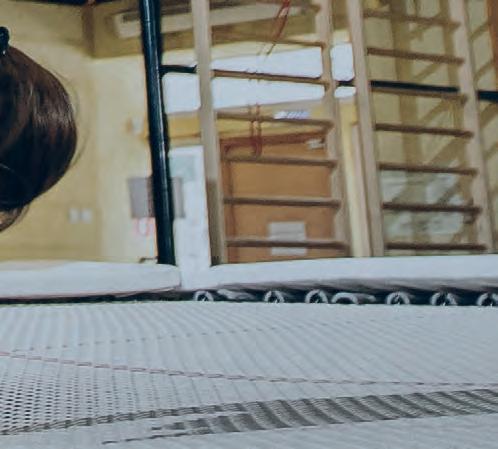





Thousands of youngsters in communities across Swansea are set to benefit from major investment in the city’s play infrastructure, after Swansea Council committed to upgrading more than 60 community play areas.
The upgrades are part of the council’s ongoing commitment to investing in free play areas, which has seen the council agree to a further £1 million for them in the coming year, bringing the total investment so far to £8 million.
The latest to see an official opening is at Brynmelyn Park in Waun Wen, where the upgrades have been designed to cater to both teenagers and infants.
The teenage area now boasts a combination basket swing/flat seat swings, a junior multiplay unit with high and low play features, and an above-ground carousel.
The infant area includes an infant multiplay unit, two bay swings with a disabled seat, a “You and Me” seat, and two cradle seats, a four-person

The new play zone comprises of several distinct areas
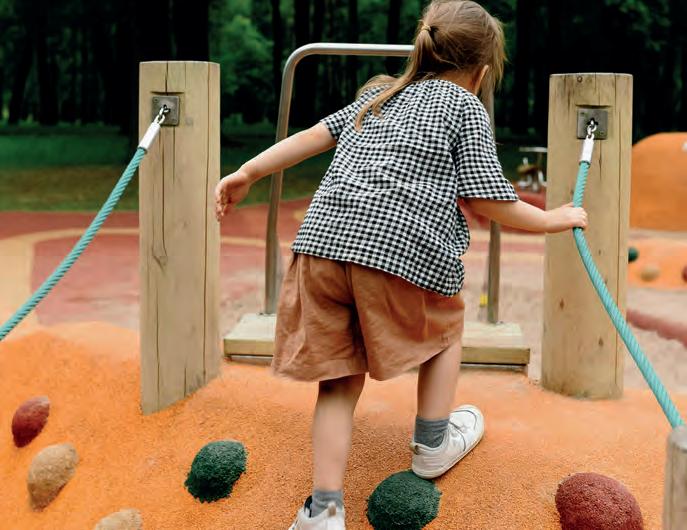
see-saw, a trampoline with drainage incorporated, and a springer.
Non-play items such as two steel benches have also been added to enhance the park’s amenities.
Other recently completed upgrades include those at Polly’s Park in Foxhole Road, St Thomas,

and Ravenhill play area, which has seen a new, safe surface fitted.
Councillor Robert Francis-Davies, said: “We believe our investment in outdoor play for children and young people is probably the biggest investment of its kind anywhere in the UK in recent years.
Imperial War Museums (IWM) has opened the Weston Play Zone at IWM Duxford in Cambridgeshire. The play area is part of the Transforming IWM Duxford project – a 10-year, multimillion-pound plan to ensure IWM Duxford’s ongoing success as a regionally, nationally and internationally important museum, visitor destination and historic working airfield.
The Weston Play Zone features a combination of innovative play equipment and landscape features and provides a play experience that will engage children and their families with the history of Duxford.



For children, swimming isn’t just about strokes, lengths or laps – it’s about fun, freedom and discovery
Play in the water is more than a way to keep little ones entertained; it’s an amazing tool for learning, development and confidence-building. Encouraging play while swimming is one of the best things we can do for children’s growing minds and bodies. Swimming aid and swimwear supplier BLU Leisure, outlines some key benefits of ‘Play in the Pool’
Group play in the pool builds teamwork, communication, and emotional resilience. Children learn to share, take turns, follow rules, and navigate new challenges. For many, swimming play becomes a place to build bonds with friends and gain independence, all while laughing and having fun.
Playful swimming reduces stress and supports emotional regulation. The sensation of water is naturally calming, and when combined with movement, fun and laughter, it becomes a powerful tool for reducing anxiety and boosting mood in children.
Before children can learn to swim confidently, they need to feel comfortable in the water. Structured play, like
chasing floating toys, splashing with friends, or jumping in from the side, helps children get used to water safely and playfully. This lays the foundation for learning greater swimming skills without fear or hesitation.
Playful movement in water helps develop strength, balance, and coordination. Whether they’re pretending to be dolphins or racing to retrieve pool toys, children are unknowingly improving their gross motor skills, lung capacity, and muscle tone, all in a low-impact, friendly and playful environment.
The pool opens up a world of imaginative play. A swimming session can quickly turn into an underwater treasure hunt, a sea creature adventure, or a floating obstacle course. This type of unstructured play nurtures creativity, curiosity, and problem-solving skills that go far beyond the pool.
Parents, instructors, and leisure centres can all help by creating environments that balance safety with freedom, providing toys, encouraging exploration, and ensuring children feel supported, not pressured. By embracing play in the pool, we’re not just raising better swimmers, we’re nurturing stronger, happier, and more confident children. For help with building a strong branded offer across Swim Aids, Swim Packs, Staff Uniform (in and out of pool), please contact BLU Leisure.
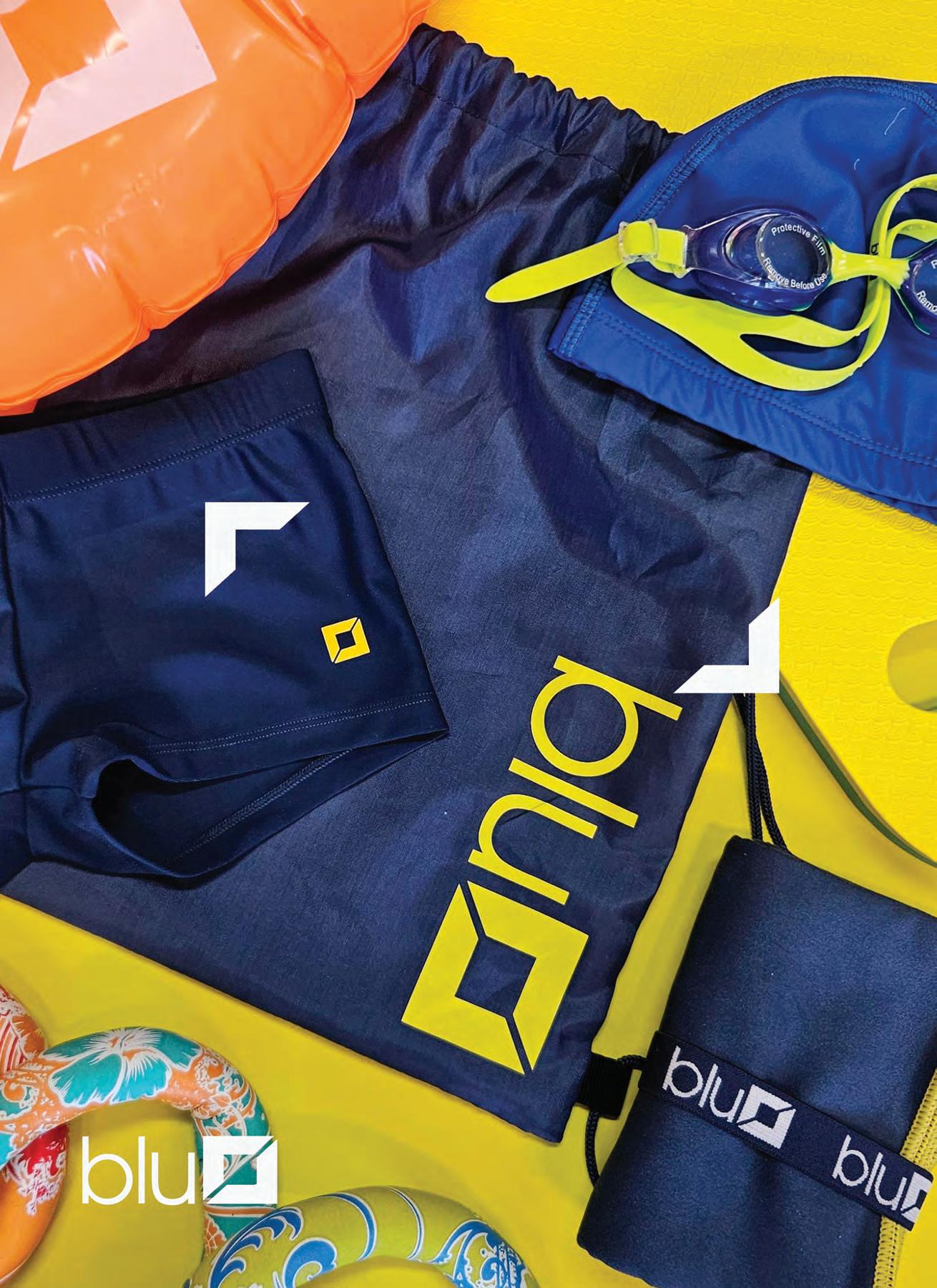





PlayBoard NI is currently engaging with 9 to 11-year-olds through Spaces to Be, a mental health and wellbeing programme for children and young people. The programme is delivered as part of the OUR Generation project in primary schools, community groups and school-age childcare settings across Northern Ireland and the border towns of County Louth and County Monaghan in the Republic of Ireland.
Spaces to Be empowers children through play to Increase mental health literacy; enhance emotional resilience; develop self-help and coping sills; encourage inclusivity and acceptance of difference; and Increase knowledge of community.
The programme involves staff training and children’s play sessions. The play sessions include a range of practical and playful exercises for children to support them to build characteristics closely associated
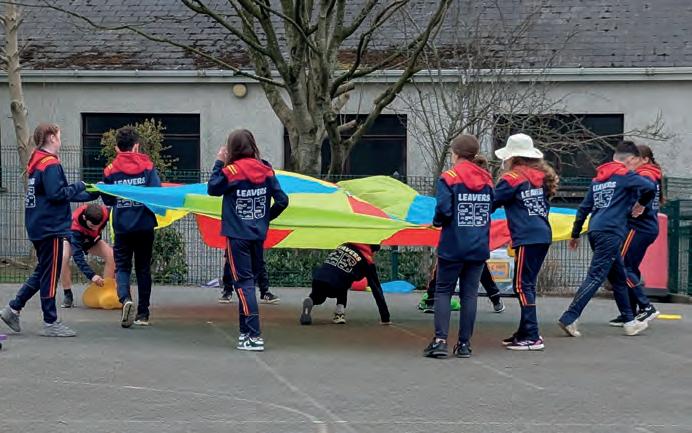
with high levels of resilience, support their positive mental health, and as a mechanism for positively addressing differences. These complex issues are explored in an indirect and playful way by providing an exciting and free-flowing play environment, filled with a range of
fun and exciting invitations to play.
Playboard NI said: “We believe that when children and young people are provided with the time, space and permission to play, they will explore and learn in a way that best suit their needs and interests, helping them to reach their full potential.
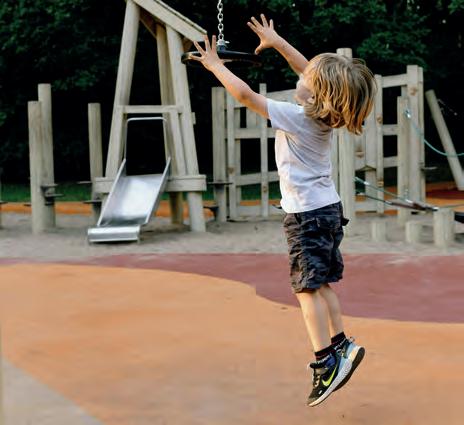
Play England wants local authorities to have a duty to protect existing play spaces
Play England has submitted evidence to the Planning and Infrastructure Bill Committee, urging the inclusion of a statutory Play Sufficiency duty to ensure every child has access to safe and inclusive play opportunities.
In its submission, Play England proposes a new clause to be introduced in the bill which would require authorities to undertake four actions. These are to regularly assess and publish reports on the sufficiency of play opportunities; integrate findings into local plans and infrastructure strategies; protect existing play spaces and require new developments to include quality play areas; consult with children, families, and communities on play provision.
The amendment aims to embed play into planning decisions alongside housing, transport and utilities.
sutcliffeplay.co.uk
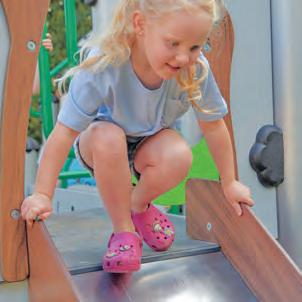
We design play equipment and play spaces that open up play to all abilities.
Your
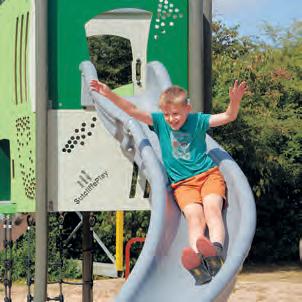
Our skilled engineers and fabricators all take pride in putting quality first.





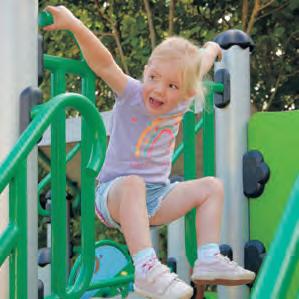
Sourcing and manufacturing locally is the most sustainable solution for all.







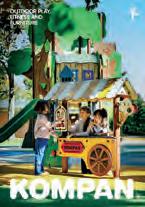


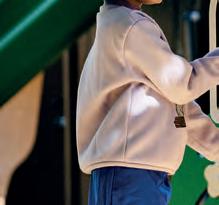
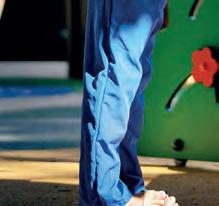


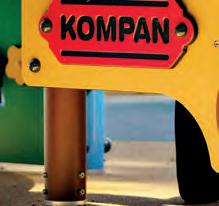
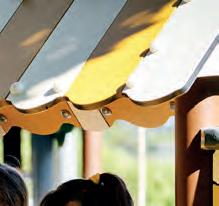


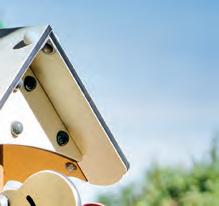





Plans have been submitted for a new youth and community centre in St Helier, Jersey.
Scheduled to be delivered in the north of the town by the end of June of 2028, the proposed centre will contain a range of modern facilities including a sports hall, roof-top kick pitch, climbing wall, fitness rooms, dance studio, boxing gym, sensory room, food preparation facilities, multi-functional use rooms, and eight counselling rooms as it will be the main hub of the Youth Enquiry Service, YES.
The project is a result of the Jersey Government’s Common Strategic Policy, of which one of the priorities is to deliver a plan to revitalise Town.
Subject to approval in the summer months, building works on the new centre are expected to begin towards the end of the year. The new facilities will be based on the old Ann Street Brewery site, which has been vacant
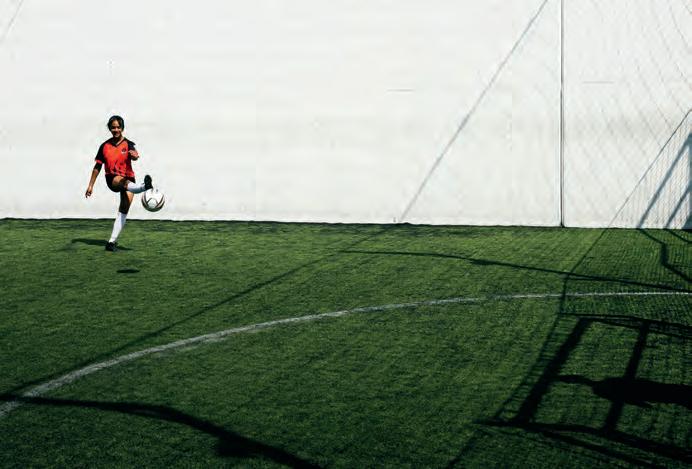
Facilities at the centre will include a roof-top kick pitch
for several years. Throughout the last year, officers from the Jersey Youth Service, JYS, consulted with residents in the nearby area – as well as young people and their families –and have incorporated their feedback on the suggested plans.
Assistant Minister for Children and Families, Malcolm Ferey, said: “These facilities will have a significantly positive impact on our children, young people and their families in town, and will offer them a new service within modern facilities.”
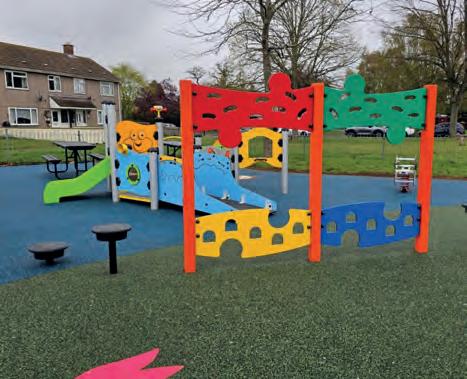
A range of new activities – including accessible equipment – have been installed as part of a playground redevelopment in Abingdon, Oxfordshire. Vale of White Horse District Council secured funding for a project to refurbish the Cotman Close play area in the town.
The new-look play area includes swings, a rope bridge and a trampoline among other equipment. Work on the site is now complete and it reopened in mid-April during the school Easter holidays.
Families can now enjoy fully accessible play equipment and picnic tables in the area. A butterfly ‘game station’ offers a combination of sensory, tactile and fun activities and puzzles, while an inclusive toddler unit also features a wheelchair ramp making the area more accessible.








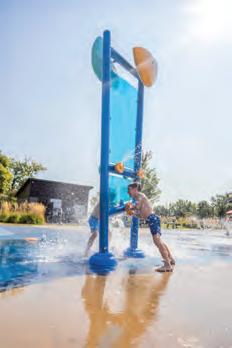


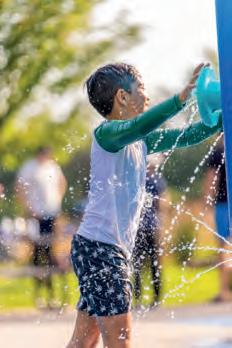
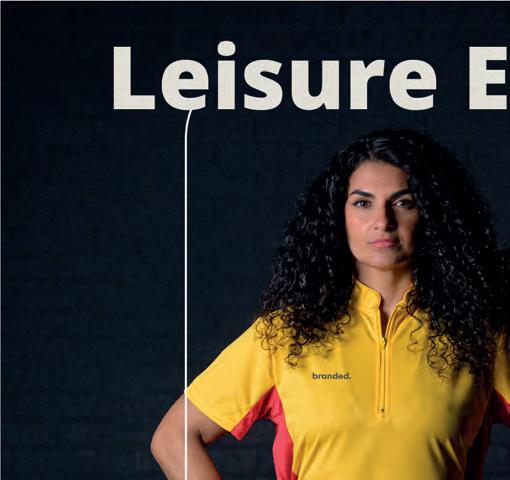

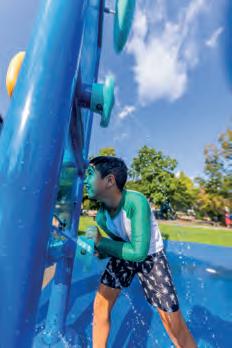
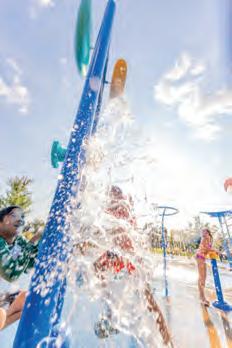



Hold onto your seesaws, everyone, play is finally making waves in the political world. After years of being pushed to the sidelines, left gathering dust – like the forgotten corner of the playground with the wonky climbing frame – play sufficiency legislation and a new national play strategy are finally being thrust into the spotlight. And honestly, yes…I did get slightly emotional writing this piece and hearing about what’s coming next.
The launch of the first-ever All-Party Parliamentary Group (APPG) on Play isn’t just another policy discussion buried in government reports; this is the long-overdue recognition of the fundamental role of play in children’s lives. Play England and incredible advocates – such as MP Tom Hayes –are finally pushing forward what we’ve known all along. Play is not just a way to pass the time, it is a right, a force for development, a catalyst for creativity, and the foundation of childhood itself.
I grew up in an adventure playground, and that experience shaped who I am today. It was in that wild, muddy, joy-filled space that I learned what true play really means. Now, as a playworker,

Play England’s push for a national play strategy is making serious waves, ensuring play opportunities exist everywhere. That means adventure playgrounds thriving, free play being celebrated, and playworkers being recognised for the superheroes they truly are. This isn’t just about swings and slides, it’s about shaping spaces where children feel free to explore, imagine, and discover. Amber
consultant, and advocate, I strive to make sure children everywhere get the same opportunities, because play isn’t just nice to have, it’s essential.
In January, Tom Hayes MP led the first parliamentary debate on play in over a decade. It didn’t just highlight playgrounds, it championed unstructured, adventure-filled, confidence-building, risk-taking, totally essential play. The kind where kids climb things, build forts out, and most importantly, learn and grow through every moment of it.
Bob Hughes’ Play Types Framework has long recognised that rough-and-tumble play is one of the most natural and instinctual ways children develop. When kids roll around in the grass, leap from logs, or create imaginary battles in the playground, they’re not just letting off steam, they’re developing crucial social and emotional skills.

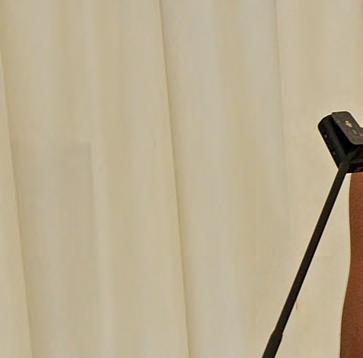

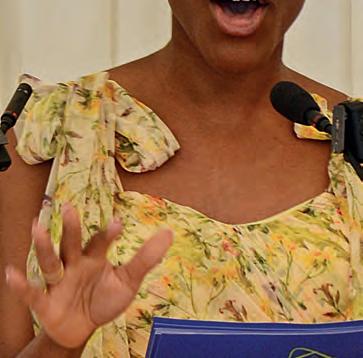


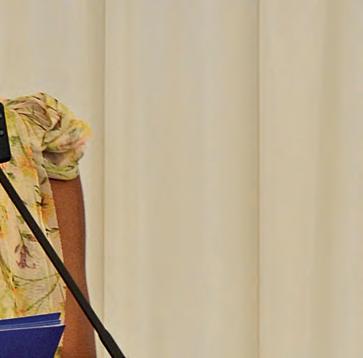

Ogunsanya-William speaking at the launch event of Play England’s new strategy
A playworker is like the mischievous storyteller who whispers “what if?” into a child’s imagination. They curate spaces where curiosity leads the way, balancing independence with the thrill of risk-taking. They don’t just supervise play, they champion it, ensuring every child, regardless of background or ability, has the freedom to engage in meaningful and instinctual play. Whether in adventure playgrounds, schools, or community spaces, playworkers ignite confidence, spark creativity, and embrace the joyful chaos of childhood exploration.
This new national play strategy is a revolution in how we view play. We are finally shifting away from seeing it as an afterthought to embracing it as the beating heart of childhood. The joy of play is contagious, and through this strategy, playworkers, parents, educators, and policymakers alike can amplify this mission and make play a priority in every child’s life.
It’s time, finally, for play to be spoken about, protected, and celebrated. And I, for one, couldn’t be more ready for this moment.
Let’s make sure play stays on the agenda, because every child deserves a world where play is unstoppable. Who’s in?
Play England has published its 10-year strategy to “make play normal again” and to ensure every child has both a right and access to free play
Play England has published its new 10-year strategy, which has a vision to “make play normal again”. Launched at an event at the Houses of Parliament, the strategy’s main aims are to help create a society in which all children have the freedom to play and where play is an “accepted and visible part of everyday life”. Titled “It All Starts With Play”, at the heart of the strategy sits an ambitious objective: to restore a play-based childhood for all children in England by 2035.
It All Starts With Play highlights how supervised activities and screen-time have taken over from unsupervised, “free” activities in which children can explore, discover and be physically


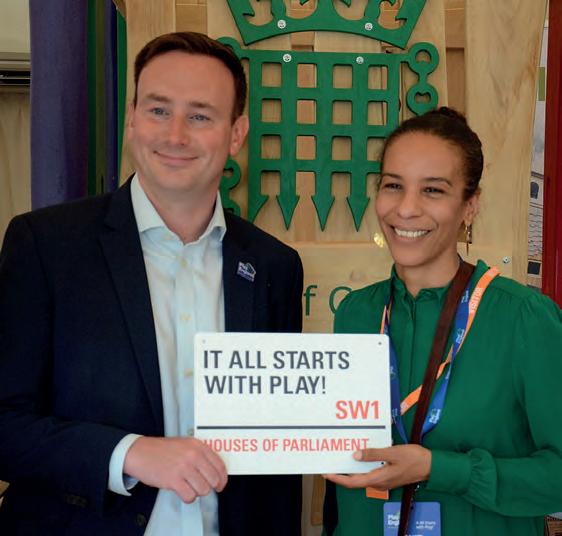




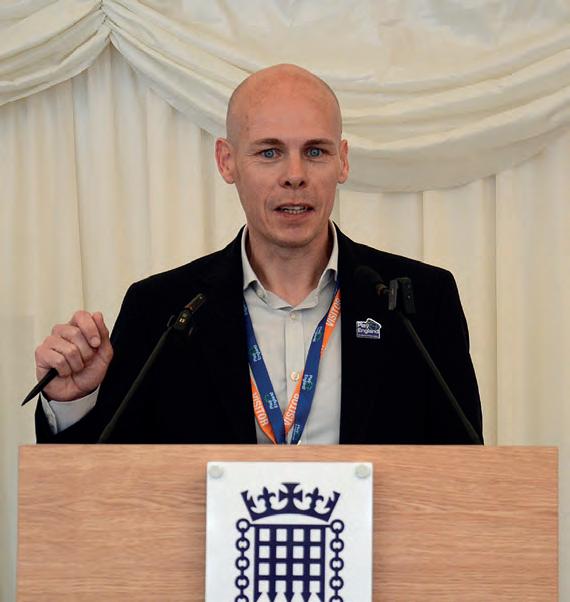

active without being guided or limited. This has been caused by the loss of playgrounds and areas in which children can safely play – with any play time often limited to school hours.
According to the data presented in the strategy, a child’s opportunity to play freely and safely can also depend entirely on where they live, with urban areas particularly providing limited opportunities to them.

“When children are denied time, space, opportunity and freedom to play, the consequences ripple through every aspect of their lives – across the systems that surround them and across wider society,” Play England states in the strategy.
“Play deprivation is not just about missing out on fun, it means missing out on friendships, independence, physical activity, expression and the challenges that help children build confidence and resilience.”
Among the several MPs attending the launch were
Deirdre Costigan, Tom Hayes, Jas Athwal, Michelle Welsh and Sarah Russell

We don’t need to x children, we need to x the system. And it all starts with play
The data backs up Play England’s central claim – that play is essential to childhood and society, but is far too often ignored as a priority. According to Eugene Minogue, Executive Director of Play England, play is how children learn, grow, connect and thrive.
“Yet, for too long, play has been neglected in policy, practice and public life,” Minogue says. Children’s freedom to play has steadily eroded – by fear, traffic, time poverty, risk aversion nd shrinking space. The result is rising inequality, worsening mental health and a generation of children growing up disconnected from their communities and from their own freedom.”
In the strategy, Play England lays out plans to combat the “play deprivation” and to restore a play-based childhood for all children in England by 2035. It aims to do this through four interconnected priorities, which are:
Creating play-friendly environments wherever children are and spend time – at home, school, on the street, in the parks or in digital spaces.
Recognising and supporting people who enable play opportunities – with playworkers at its core and a wider ecosystem of play enablers.
Building a resilient play sector and rebuilding the infrastructure for play through national policy, legislation, research and funding.
Re-norming play as an essential, accepted part of childhood – shifting culture from riskaversion and control to trust, freedom and joy.



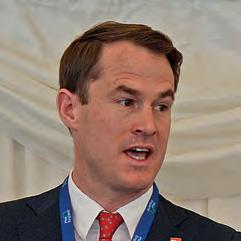
Speakers included Dianne Larrington, Amber Ogunsanya-William, Panash Shah and Charlie Howard
“This strategy is a call to action,” Minogue says. “Our aim is to make play a normal and visible part of everyday life again. We want a shift to a culture where play is recognised, accepted and protected at school, in our streets, in our communities.
“We believe play deprivation is having a negative impact on both the education and development of children today – and we’re committed to helping to realise a child’s right to play.
“Our intention is to combine our expertise and networks to embed the principle of ‘play sufficiency’ during the school day. Together, we will champion the value of play in supporting children’s physical, social and cognitive development – and support schools create and harness more unstructured, active, and playful moments every day.
“This is not just about building new playgrounds. It’s about embedding play in how we build communities – so children don’t just have homes, they have a childhood.
“We don’t need to fix children, we need to fix the system. And it all starts with play.”
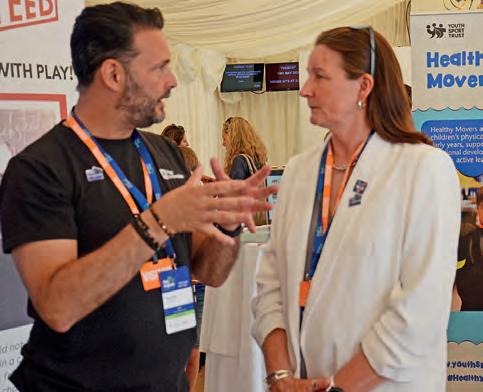
The document is described as a “living strategy”, not a static document. Intended to guide Play England’s actions and priorities over the next decade, the organisation’s plan is to deliver it through a three year cycle of “reflect, reinvigorate and renew”. The approach is designed to ensure the strategy remains dynamic and adaptive.
Play England will also set up what it calls Children’s Assemblies to help deliver the strategy. These will be structured, child-led forums to embed children’s voices in strategy renewal, national policy and local action.
When it comes to measuring the strategy’s success, Play England has outlined some ambitious goals it wants to reach.
“We will know we are succeeding when all children have equitable access to safe, inclusive and enriching opportunities to play,” the strategy states. “Success means local and national systems recognising and protecting children’s right to play and for play to be not



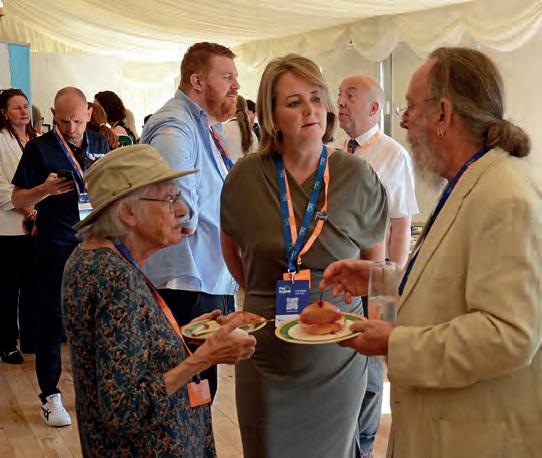




































































seen as a luxury – but essential for healthy childhoods and thriving communities.
“But above all, success will be defined by children themselves: when children can freely, safely and joyfully play in their homes, streets, schools and communities.”
The strategy is being published at a time when there is real momentum in driving play up the national consciousness – as well as the political agenda. The best example of this was the Westminster Hall debate earlier this year (January 2025), which marked a significant turning point in the national conversation on children’s play.
Led by Tom Hayes MP, the MP for Bournemouth East – who has become an important advocate for play – the discussion expanded far beyond the topic of ‘playgrounds’, powerfully emphasising the importance of unstructured free play, adventure playgrounds, active play and the essential role of Playworkers. Crucially, MPs from across the political spectrum united to call for inclusive, accessible, and equitable play spaces, places, and provision for all children.
The spotlight that the January debate shone on play – and how it is fundamental to children’s physical health, wellbeing, social development, and cognitive growth – has clearly worked. The political work on play has since increased and the Play England strategy launch was attended by a number of MPs.
There was also a big reason for the launch to take part at the House of Commons. This was














revealed when Tom Hayes MP announced the launch of the first-ever all-party parliamentary group (APPG) on play – alongside a campaign to bring in a “play sufficiency duty” in England to match those in Wales and Scotland.


“Playgrounds are not part of statutory provision for councils at the moment,” Hayes said, announcing the APPG and the plans for the new duty. “We want to change this and it would be a big change.”
He added that the change in the law would be “no burden, no cost” to local authorities.
“We want to build more playgrounds and we want them to be inclusive for all children. The money for this can come from developers’ section 106 funds that they provide when they build new homes.”
As well as the full strategy document, Play England also launched a children’s version of the paper – as part of its commitment to involve children in its policy-making. The 10page version uses language children recognise and can be downloaded by schools. To read the full strategy document, as well as the children’s version, visit: www.playengland.org.uk/strategy


Soft play grip socks are a great way to boost hygiene, safety and ancillary spend in soft play sites. In this buyer’s guide, Taylor Made Designs explain the features to look out for when shopping for a branded grip sock
A high-traction grip sock behaves differently depending on whether it’s a toe grip, half grip or full grip.
FULL GRIP: The sole grip pattern extends across the whole sole, from toe to heel. Full grip socks are ideal for sites with trampoline equipment.
HALF GRIP: This is the most popular style for soft play centres. Half-grip patterns run from the toe to just beyond the ball of the foot. Children can climb and run safely on gangplanks, but the lack of grip on the ankle keeps them safe on slides.
TOE GRIP: Also known as quarter-grip, this

A fully branded experience
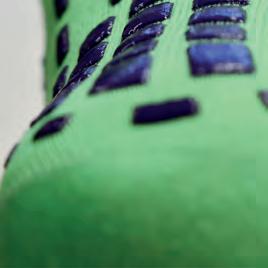
breathable sock grip style works beautifully with a custom-woven sock. Toe grip patterns typically cover the toe and part of the ball of the foot. This sock style offers a reasonable amount of traction and can help keep feet cool on high-intensity soft play courses.
Bespoke grip socks are the best way to elevate guest experience and drive secondary spend on your site. Bespoke-branded grip socks can be completely tailored to match your brand and manufactured for as little as £0.49 per pair.

A broader range of styles


Your branding can cover every square inch of a grip sock. You can style the grip design, materials, weave, arch and cuff details to match your logo and colours.

Want more than one sock style? Give visitors a choice of sock! Offering a number of different styles can boost sales and help you learn more about what your guests want.
Seasonal variety

Some soft play sites release specialedition socks to tie in with school holidays, seasons or major events. These socks are perfect for maximising spend with recurring customers.
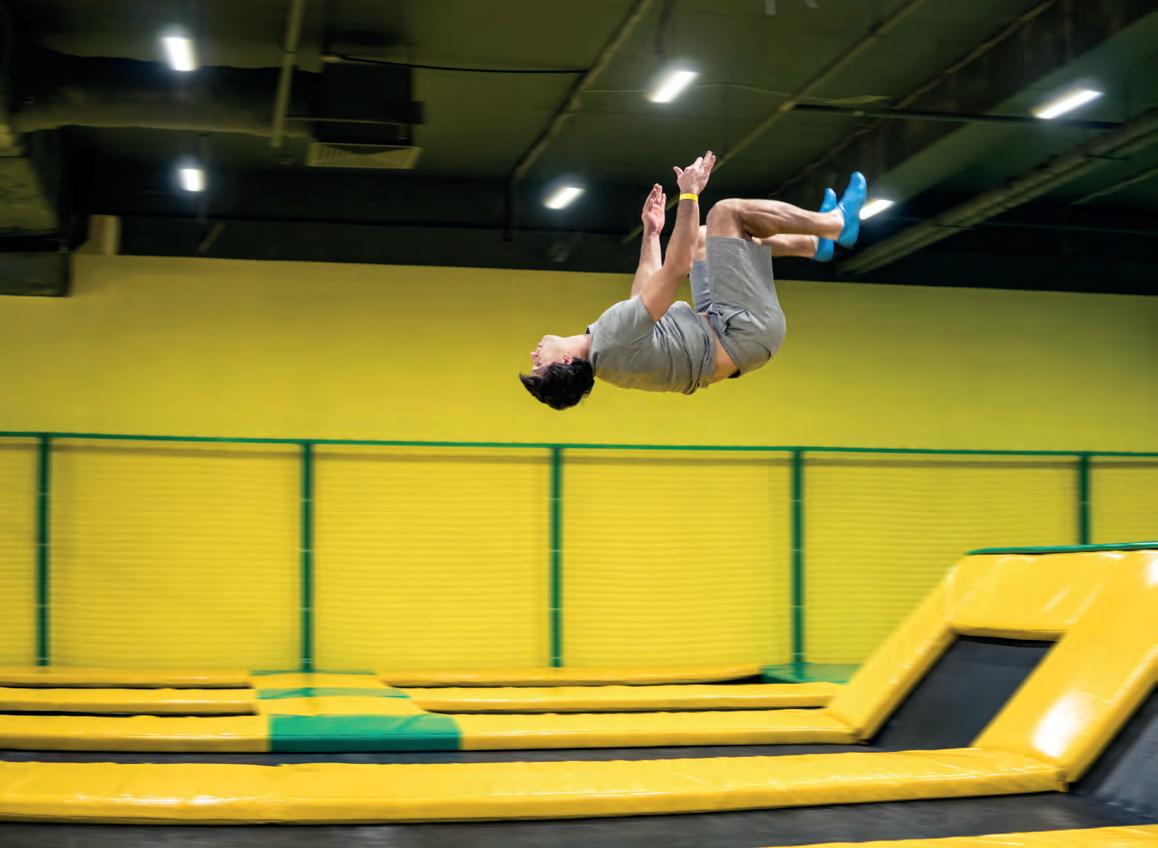
Questions to ask your grip sock supplier:
Cotton or polyester?
Grip socks are typically made from either cotton or polyester fibres, with elastane used on arch bands and ankle cuffs. Polyester socks tend to be the most popular option for kids play centre grip socks: thread colours appear more vibrant, and fabric dries faster.
Mix of sizes?
Some manufacturers will produce a mixed shipment of kids and adult sock sizes. For soft play centres, it’s important to ensure that you only receive sock sizes for the precise age groups you’re serving.
PVC or silicone sole?
A grip sock’s sole is printed directly onto the sock using either a PVC or silicone liquid that part-soaks into the sock sole fibres. Taylor
Made Designs use a double-thick German-made PVC, which gives a high-traction, long-lasting grip.
Where will my socks be stored?
Many soft play centres have limited stockholding space, which is problematic when placing orders of 5,000 socks or more. That’s why Taylor Made Designs offer a stockholding and fulfilment service. Excess stock can be held at their Christchurch warehouse and delivered to play centre sites on an ad-hoc basis.
How soon can socks be delivered?
Off-the-shelf socks can be delivered in 2-4 days, whereas bespoke socks typically take anywhere from 6 to 9 weeks.
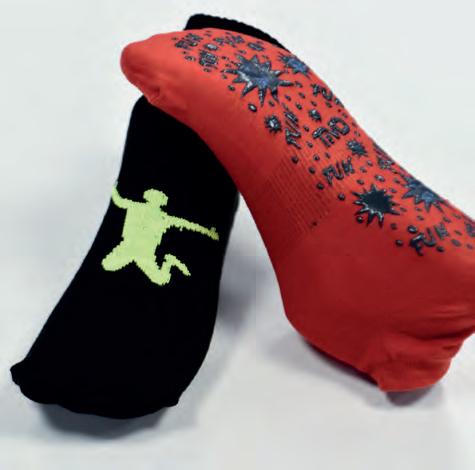
● Since 1993, Taylor Made Designs have been producing exceptional branded products for the Leisure sector. Learn more about Taylor Made Designs and their soft play grip sock capabilities at: www.taylormadedesigns.co.uk/ our-products/soft-play-grip-socks/
When the pandemic hit the indoor play centre sector hard, a group of operators got together to set up a trade body to represent them. Since its launch in 2020, the Association of Indoor Play has grown to represent more than 370 centres
Thursday 5 June will mark the second edition of the AIP Conference & Annual Awards. It’s a perfect time to reflect on how well the UK’s indoor play sector has reacted and recovered from the pandemic. At the heart of the recovery is the Association of Indoor Play (AIP), which is looking to transform the indoor play landscape.
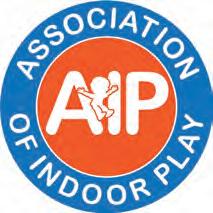
Founded during the pandemic by a group of passionate operators – and led by Janice Dunphy of Web Adventure Park in York – AIP now represents more than 370 member centres and also works with 50 trade members. Its mission is to champion the indoor play sector and to ensure operators of all sizes have a direct voice into government.
concerned about smaller operators being drowned out by larger attractions, rallied peers to create a body that could speak for the sector, offer support and fight for recognition of the vital role indoor play plays in children’s lives. Virtual meetings became lifelines, offering a space to share advice, lobby collectively and build a network.
What began as crisis response quickly evolved into a UK-wide movement – a community where operators supported each other through unprecedented times.



When the COVID-19 pandemic struck in early 2020, indoor play was among the hardest-hit industries. Forced closures, strict safety guidelines and public hesitancy left operators fighting for survival. Yet, amid the chaos, a small but determined group of operators recognised the need for collective action.




Janice Dunphy, owner of Web Adventure in York was




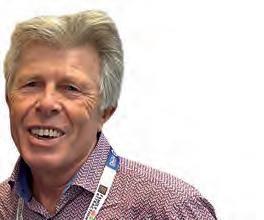
Fast forward five years and AIP is now an independent, not-for-profit trade body representing more than 370 indoor play centres. Its direction is steered by a voluntary committee of 15 leading operators and key suppliers, ensuring it remains operator-led and focused on real-world needs. The association champions operators of all sizes – from small family-run centres to large multi-attraction sites.
real-world needs. The association to large multi-attraction sites.
To reflect the UK’s geographic

To reflect the UK’s geographic diversity, AIP hosts regional networking events across England, Scotland, Wales and Northern Ireland. This year saw a significant milestone with the firstever Scottish regional event, reinforcing AIP’s commitment to operators in every part of the UK.











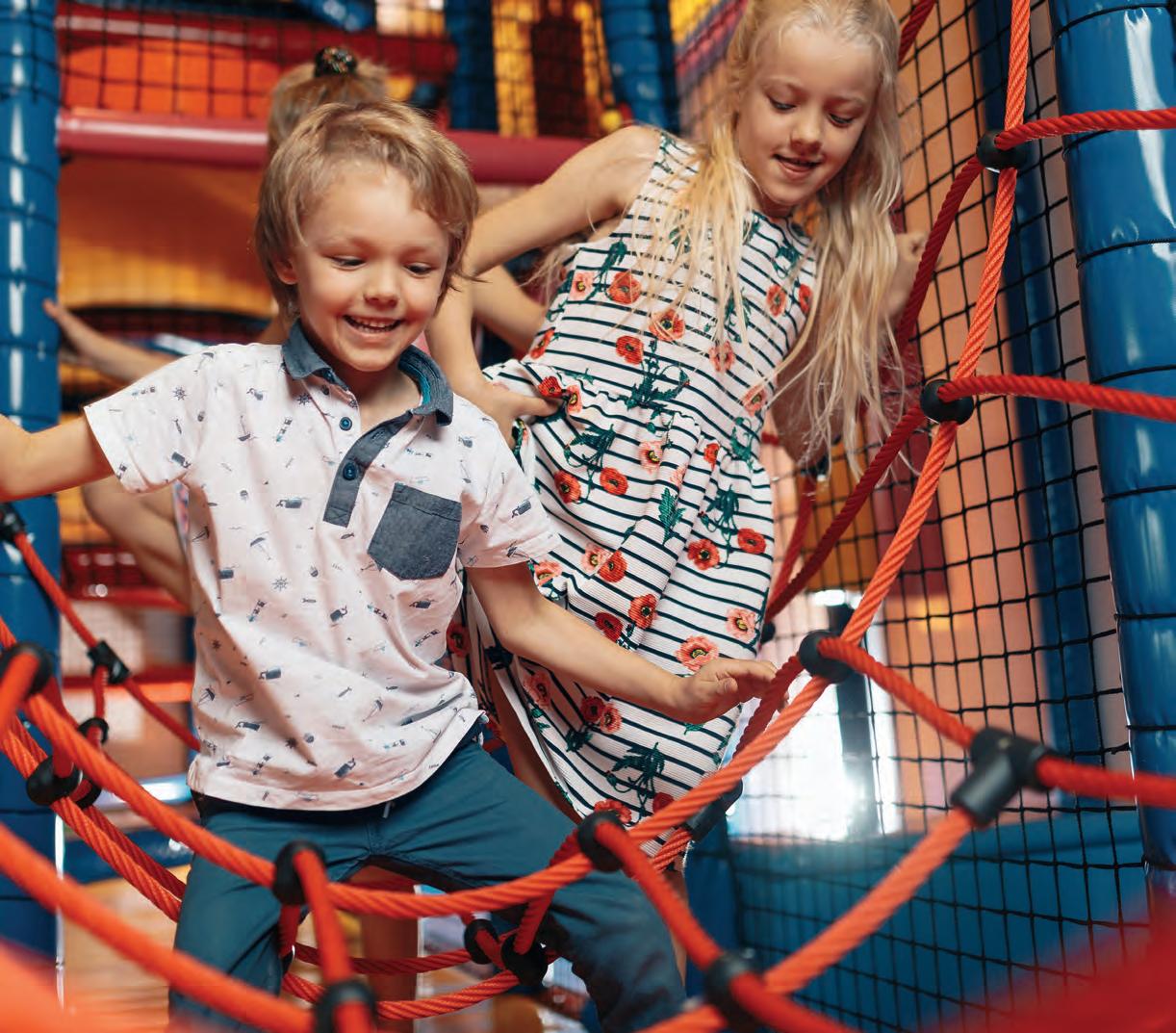
At the heart of everything AIP does is a nononsense mission: to ensure the indoor play sector is recognised, respected and thriving. AIP focuses its work on three core pillars. Firstly, the Association is on a mission to raise the profile of indoor play, making sure both the public and policymakers understand that indoor play isn’t just a fallback option for rainy days – it’s crucial for children’s physical, emotional and social development.
Secondly, AIP is passionate about raising standards and celebrating excellence. Through resources, best practice guides, and the highly anticipated Annual Play Awards, the Association showcases the creativity and innovation that exists within indoor play, while encouraging operators to keep pushing the bar higher. And thirdly, AIP is all about building a supportive, collaborative community for operators. Running a play centre can be a tough and often isolating business, so the Association has created a trusted space where operators can swap ideas, share challenges, and access the support they need from people who truly understand the day-to-day realities of the sector.
Thanks to its partnership with UKHospitality – the leading UK trade body for hospitality – AIP has
a direct voice into government consultations, ensuring the unique needs of the sector are heard in national discussions on leisure, tourism and family attractions. AIP has also delivered a game-changing contribution to the industry through its Annual State of the Industry Survey – the first-ever widespread benchmarking data for the UK indoor play sector. The survey provides critical insights into trading conditions, customer behaviour and sector challenges, helping operators make informed decisions and strengthening the sector’s voice with policymakers.
In the past five years, the AIP has evolved from a crisis response body into a UK-wide organisation and its work is far from over. The industry continues to face challenges, including the cost-of-living crisis, rising business rates and shifting consumer expectations. One of the urgent issues on AIP’s agenda is VAT on children’s play. The association is preparing to lead a sector-wide campaign, arguing that children’s play should be recognised as an essential service –critical for children’s emotional, physical, and social development – and therefore be treated like other exempt activities. The campaign aims to drive government recognition that play is not a luxury, but a vital part of community health.

This year’s Elevate event will feature a dedicated Active Kids Theatre. With the theme of “Unlocking Potential”, the two-day educational programme looks to “power the future of children’s activities
This year’s Elevate trade show, held at Excel London from 18 to 19 June, will feature a dedicated Active Kids Theatre powered by children’s activity specialist, Kidztivity. Founded by Chris Sharman in 2010, Kidztivity is a leading agency ecosystem in the children’s activities sector, driven by a mission to professionalise and empower the industry through innovation, collaboration and sustainability.
The Active Kids Theatre was created by Sharman and the Kidztivity team to inspire growth and innovation within the children’s activities industry. After a successful one-day event in 2024, this year’s two-day event, themed “Unlocking Potential: Powering the Future of Children’s Activities,” aims
10:00 - 10:30
Active Kids Theatre Welcome and State of the Nation: Charting the Course for Children’s Activities
Chris Sharman – Kidztivity
10:35 - 11:15
The Leadership Playbook: Building Teams and Inspiring Change
Chris Sharman, Kidztivity; Rachel Brooks, Swimtime; Sarah Cressall, The Creation Station; Peter Pearson, Acrotrix
11:30 - 12:00
Seamless Experience: Transforming the Customer Booking Journey
Brett Davis, Pebble; Bobby Cole, BH Live; Adam Holland, Progressive Sports; Reece Elbourn, Let’s Leap Sports Academy
12:05 - 12:45
Partnering with Communities and Education: Inspiring Future Generations to be Active
Jen Rouse, Team GB Foundation; James Thomas, parkrun; Craig Jones, Junior Adventures Group; Marco Boi, Play Innovation; Paul Roberts, StreetGames
13:30 - 14:00
The Engagement Engine: How to Ignite Team Culture and Customer Loyalty
Helen Muller, The Engagement Engine
14:05 - 14:45
The Business of Play: Integrating FECs in Leisure Facilities
Rob Christie, Airparx; Elliott Myatt, The Play Company; Rob Cunningham, BH Live; Josh Buxton, 24Indoor
15:00 - 15:30
The Power of Parties: Turning Celebrations into Marketing Success
Chris Sharman, Kidztivity
15:35 - 16:15
Keeping Teens Moving: Tackling the Drop-Out Challenge
Chris Sharman, Kidztivity; Katie Phillips, Youth Sport Trust; Lauren Connis, Oldham Active; Sam Pearce, Lifestyle Fitness
16:30 - 17:15
Data-Driven Growth: Unlocking Niches with Insight
Craig Jones, Junior Adventures Group; Sam Godfrey-Moore, What’s on 4 Kids; Greg Dryer, miMove; Julie Allen, Active Insight

to provide professionals with the tools and insights needed to build sustainable business models and raise quality standards. Featuring workshops, networking opportunities, and thought leadership sessions, the event offers a collaborative platform for learning and professional development.
“The Active Kids Theatre is more than just an event – it’s a movement for growth, innovation and collaboration in the children’s activities sector,” Sharman says. “Our aim is to empower professionals with the tools, insights and connections they need to build sustainable businesses and deliver exceptional, life-changing experiences for children.
Thursday 19th June 2025
Together, we can unlock the true potential of this incredible industry and shape its future.”
The theatre will host a wide-ranging educational programme with a focus on children’s activities.
The programme has been designed to cater for anyone working in the children’s activity sector – from children’s activities managers, business owners and franchisee to facility managers. The Active Kids Theatre will offer opportunities to connect, network and learn with thought leaders and innovators, explore strategies for growth and quality and lead the way in creating enriching experiences for children.
09:45 - 10:15
Kidztivity Download (Practical Session)
James Robertshaw, Kidztivity
10:20 - 11:00
The Power of Sport: Inspiring and Engaging the Next Generation
Jen Rouse, Team GB Foundation; Georgina Brayshaw, Team GB Athlete
11:15 - 11:55
Quality Unleashed: Setting New Standards
Chris Sharman, Kidztivity; Kelly Cooper, David Lloyd Clubs; Deborah Jones, Proinsight; Natasha Waterfield, Oxygen Activeplay
12:00 - 12:30
Active Wellbeing: Merging Movement, Mindfulness and Play
Ellie White, Thrive with Ellie
13:00 - 13:30
Little Magic Train (Practical Session)
Gina Bale, Little Magic Train
13:35 - 14:15
Early Engagement: Innovating PreSchool and Parent & Child Activities
Craig Jones, Junior Adventures Group; Gina Bale, Little Magic Train; Amanda Frolich, Amanda’s Action Club; Chris Sharman, Kidztivity
14:30 - 15:10
Inclusive Innovations: Embracing Diversity and SEND
Ben Sutcliffe, Caudwell Children; Jack Wells, TikTok star, Amputee and Disability Advocate; Jessie Lilley, babyballet; Ali McClure, Ali McClure Education and Parenting
15:15 - 15:45
How to Harness Brilliant Behaviour
Ali McClure, Ali McClure Education and Parenting
15:50 - 16:30
Talent Transformation: Recruiting and Retaining Excellence
Craig Jones, Junior Adventures Group; Dan Grigg, Future Training; James Robertshaw, Kidztivity; Steve Brennan, Love Childcare Recruitment; Helen Muller, The Engagement Engine



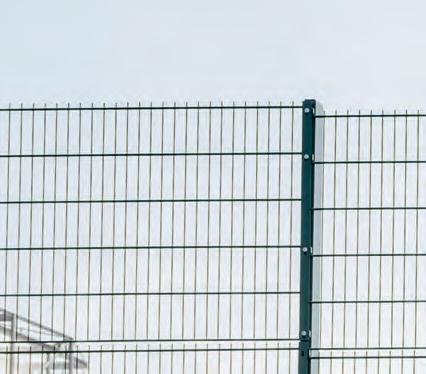

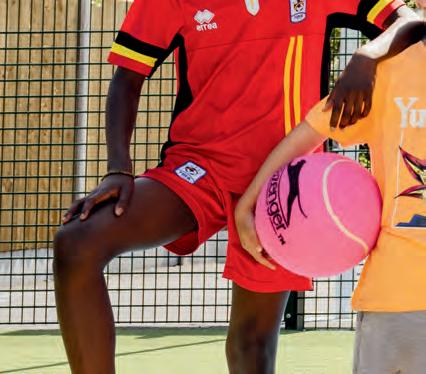
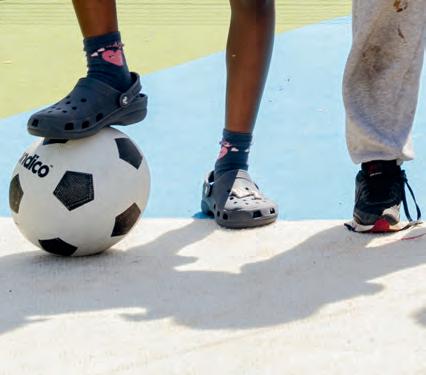
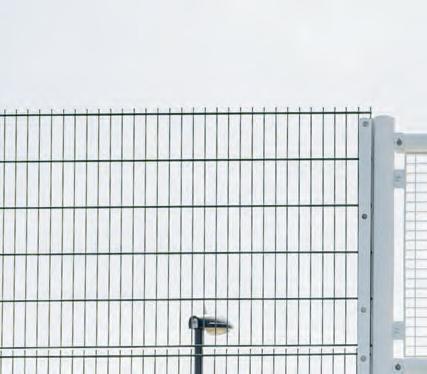
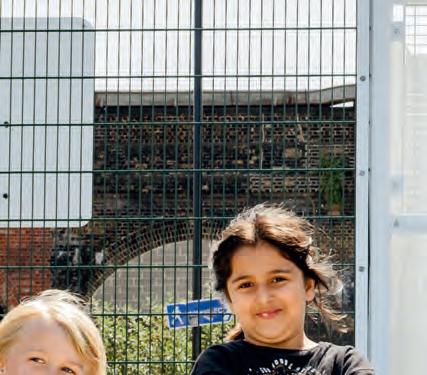

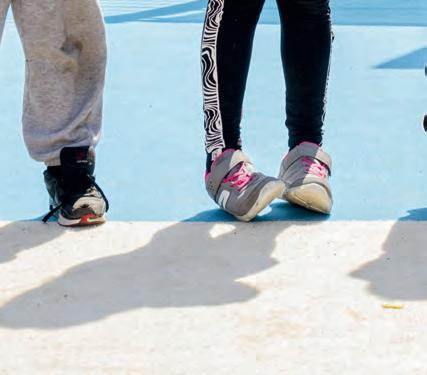




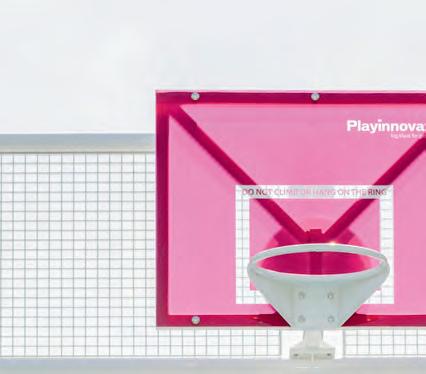
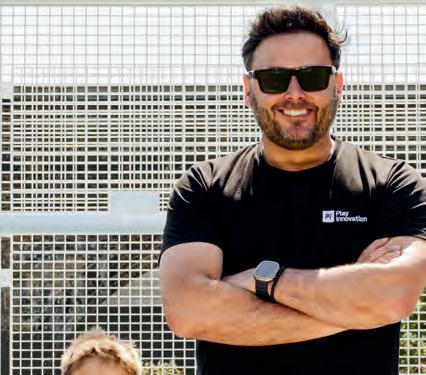
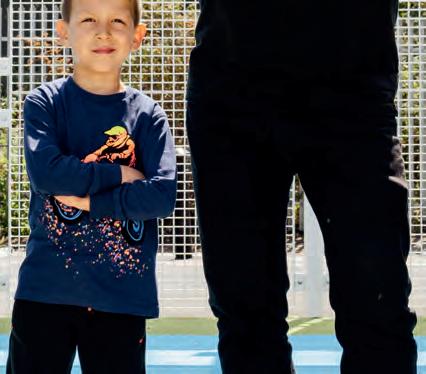
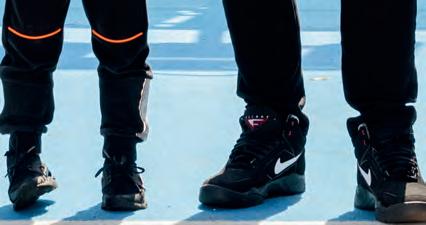







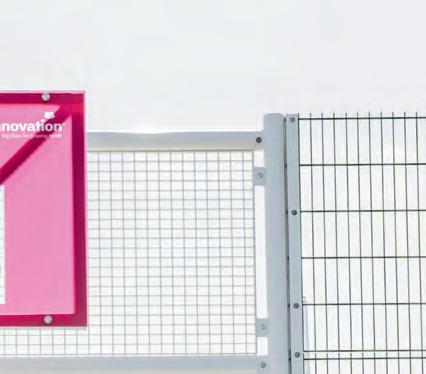







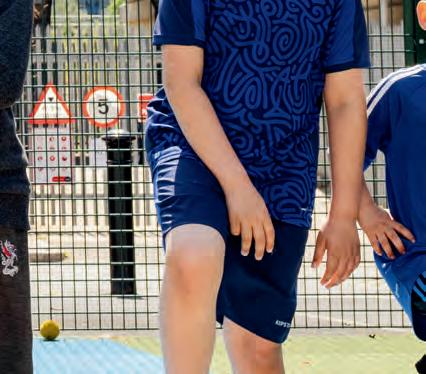
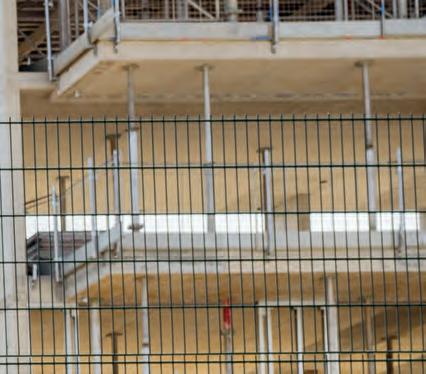

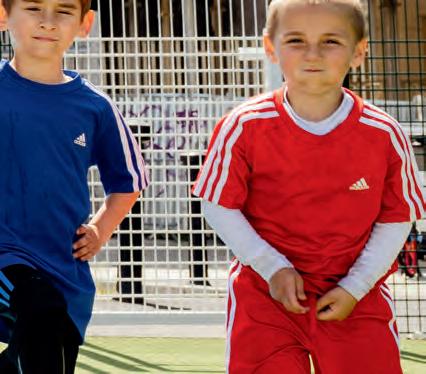
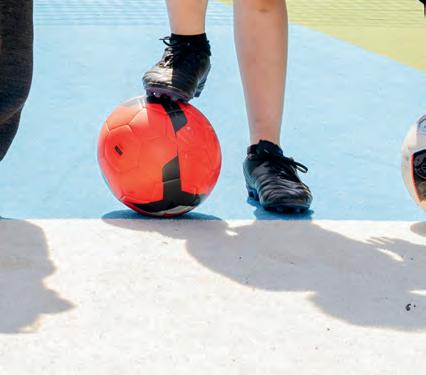
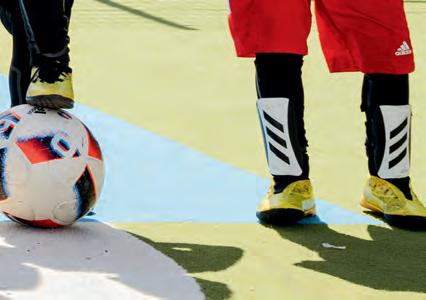
& builders of beautiful sports courts.






The recipients of the Annual Playwork Awards have been revealed. The six category winners were revealed during the National Playwork Conference – the UK’s largest national event for the playwork sector
The Annual Playwork Awards set out to celebrate all that is good about the UK Playwork sector. They were set up 23 years ago by Meynell Walter, founder of Meynell Games, who wanted to have a mechanism that would recognise and praise excellence in the playwork sector
“The awards are all about identifying and rewarding the people and organisations who have made a noticeable contribution and difference to the lives of those they work with,” Meynell says. “They are designed to recognise the hard work that the UK playworkers and organisations have put in over the past year in order to get to the point where they are today.
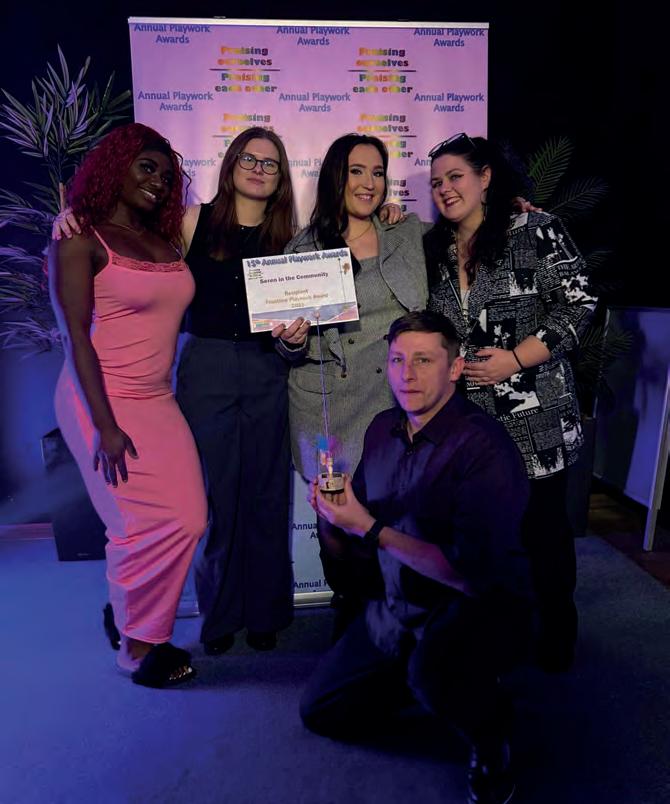
Seren in the Community won the Frontline Playwork Award
Meynell says that the Awards and the Conference play an important part in bringing the UK’s playwork community together at a time when there is fresh momentum to recognise play as a crucial part of society.
“Play is an important part of children’s lives and that play should be as free from corruption by adults as possible,” Meynell says.
“Alongside these awards comes a tremendous sense of pride. Many people forget about the playworkers that strive day in, day out, in order to offer a broad range of different play opportunities with the aim of enhancing the play opportunities of the children they work with. Even when times are tough and funds are limited, some playworker’s creativity never ceases to amaze those they work with.”
The award winners were revealed during this year’s National Playwork Conference. The event is the largest national gathering of playwork people from across the depth and breadth of the sector.
The Conference is a chance for those working in the play industry to come together and share insights and thinking, as well as learn from each other and develop their knowledge.
“Play is essential; it contributes to the cognitive, physical, social and emotional wellbeing of children and young people as well as serving a crucial evolutionary purpose. There are huge benefits and opportunities for children to engage and explore when playing; however opportunities for play have been remarkably reduced for some children.
“This can be a result of things such as hurried lifestyles and changes in family structure. This lack of play opportunities is something that we as playworkers are trying to prevent and these awards will help to raise the profile of our work and gives us the chance to praise those that have been nominated for an award.”
The Awards are supported with sponsorship from the four home nations play organisations: Play Scotland, Play Wales, Play England and Playboard NI, as well as the Out of School Alliance. Nominations for the 2026 Awards will open during the summer of 2025.
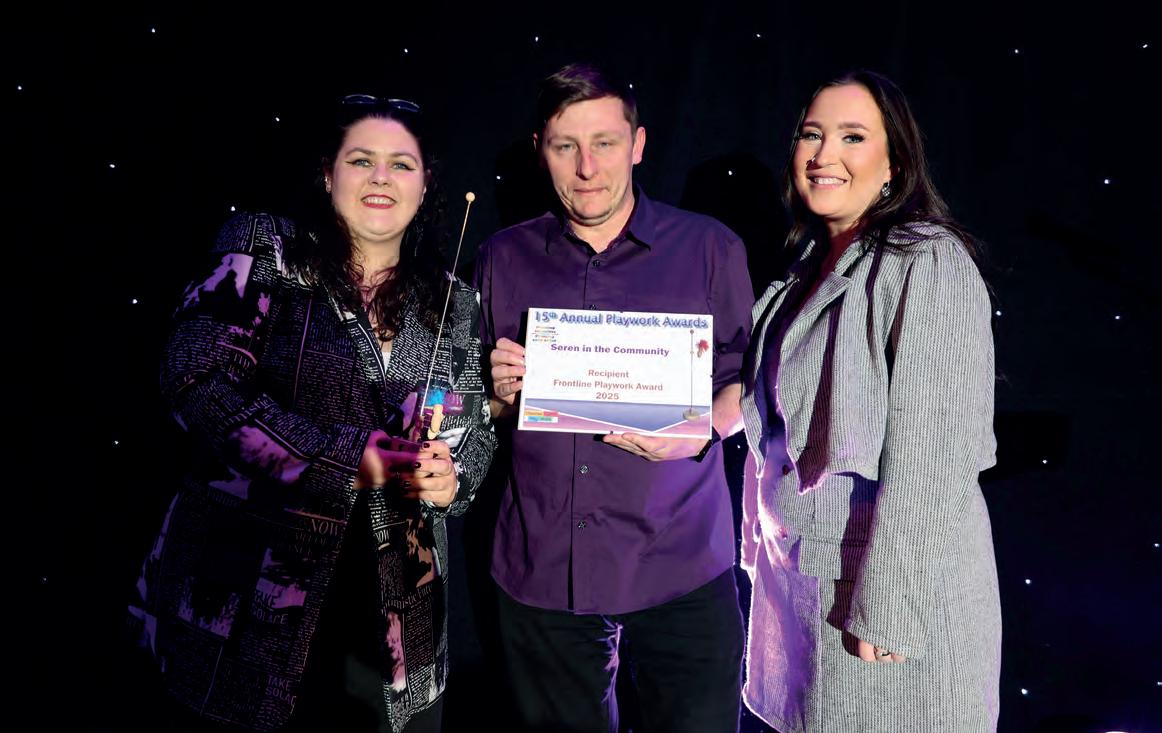
The Professional Development Award 2025
Clybiau Plant Cymru Kids’ Clubs
Clybiau Plant Cymru’s vision is to ensure out-of-school childcare clubs thrive.
“Everything we do is based on our extensive knowledge within the Out of School Childcare sector. We know that each club is different, and we know better than anyone that there is no ‘one size-fits-all’. We admire the variety of our clubs – and we use our expertise and industry knowledge to educate and support our Club Community.”
The Frontline Playwork Award 2025
Seren in the Community
Seren in the Community is a Cardiff-based charity supporting children and young people, and the wider community in Splott, Tremorfa, Adamstown and Roath.
“We are so grateful to be recognised publicly in this way and it makes standing out in the rain and going home filthy totally worth it! A massive thanks to everyone who has stuck with us through the weather, covid, staff sickness and fundraising events!”
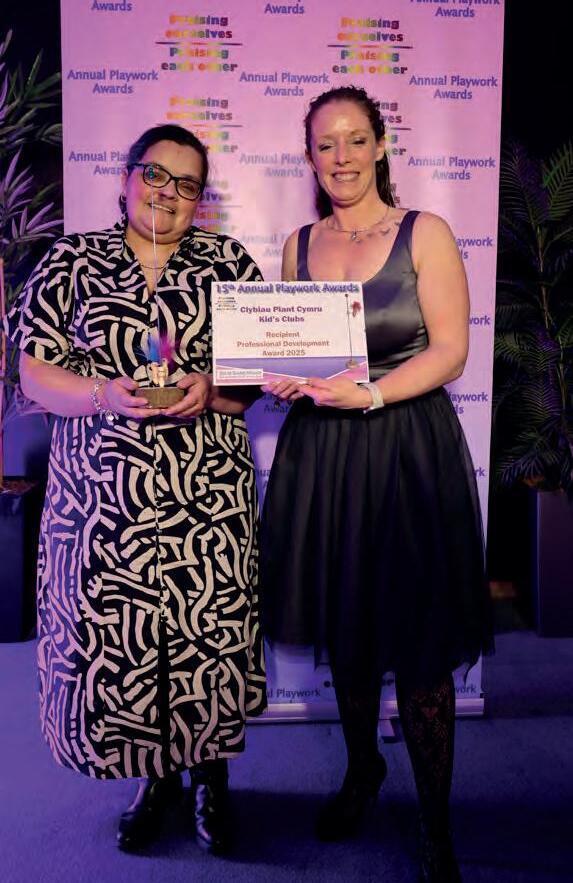
Winners: Clybiau Plant Cymru Kids’ Clubs (above) and Play 2 Nurture (below)
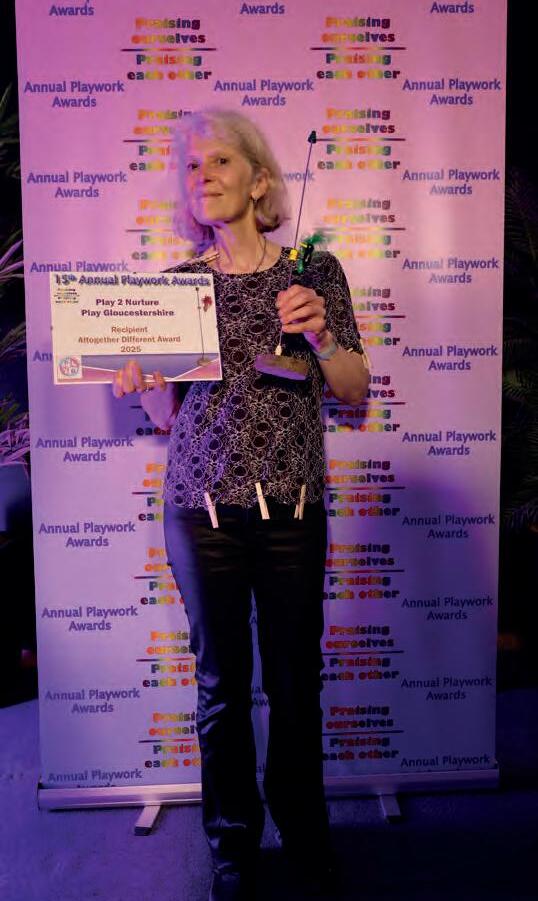
The Altogether Different Award 2025
Play 2 Nurture - Play Gloucestershire
Play Gloucestershire’s Play2Nurture project used the therapeutic power of play to create the conditions where children facing adversity build resilience and have better chances in life. It further develops Play Gloucestershire’s emerging play nurture approach, which builds on 15 years’ experience of running a universal Play Ranger service in disadvantaged local communities and targeted work in school settings. The play nurture approach works with small groups of identified children using the therapeutic power of play to offer respite from and to help children cope with the ups and downs of daily economic and emotional hardships. In this, the Play Rangers work at the intersection of playwork and play therapy.
The nominations for this Award were so strong that the judging panel also wanted to acknowledge the work of Project Play
Winner: Haringey Play Association supports children’s right to play
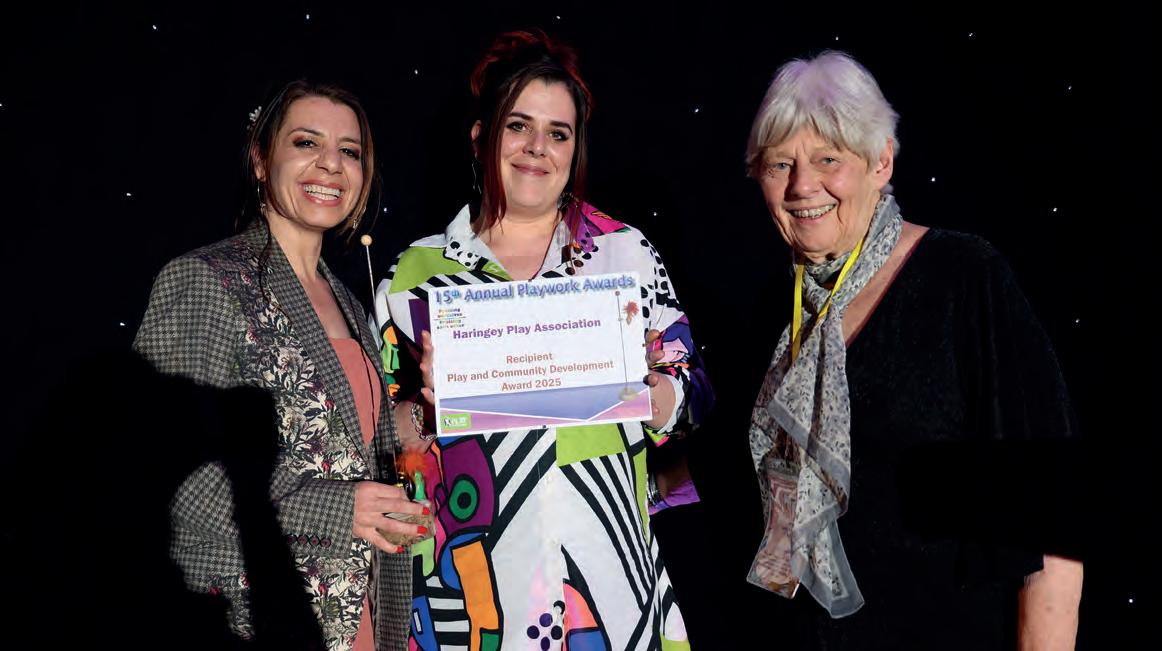
Project Play was founded in August 2018 by volunteers working in northern France to support displaced communities sleeping in informal camps. On food distributions, friends Claire and Caia realized there was a stark lack of support and protection available to children and young people living in these informal camps in Dunkirk. They therefore decided to create a project to provide safe spaces and play for the children, with the goal of supporting their all-round wellbeing.
Project Play ran its first session in November 2018. To date, it has provided play at twelve different sites: six accommodation centres, a day-centre, a safe house and four informal camps. Project Play has worked with hundreds of children and run, on average, six sessions every week. It has welcomed and said goodbye to dozens of talented volunteers with a range of skills and expertise.
The Play and Community Development Award 2025 Haringey Play Association
The association supports children’s right to play and asserts that play is “essential to every child’s life, a biological need which is vital for children’s development as well as a right enshrined in Article 31 of the United Nations Convention on the Rights of the Child”.
“We follow the Playwork Principles which describe play as ‘what children and young people do when they follow their own ideas and interests, in their own way, and for their own reasons’. We
are committed to promoting children’s agency and providing spaces and opportunities where they are free to be children and make their own decisions without unnecessary adult interference.
“Our services are entirely free at the point of use and we embrace the diversity of our community.”
The UK Playwork Sector Award 2025
PlayBoard NI
PlayBoard NI is the region’s leading play organisation. It strives to be an effective, innovative and responsive organisation, which brings evidence-based intelligence and best practice together to empower our members, children and young people, parents, communities and individuals, while influencing continuous improvement in the delivery of play services. It does this through a combination of service delivery and development; research; and campaigning and lobbying. It also works in partnership with others to put play on the agenda
The Paul Bonel Special Mention Award 2025
Mick Conway
The former Chair of London Play is one of the pioneers –alongside Paul Bonel and Kim Holdaway – of Playday, the national day for play. Playday highlights the importance of play in children’s lives and was set up back in 1986, following cuts on school-based play centres and adventure playgrounds in London.
Conway came up with the notion of having a day for play; a notion which caught on and is now celebrated yearly to raise awareness about the importance of play in children’s lives.
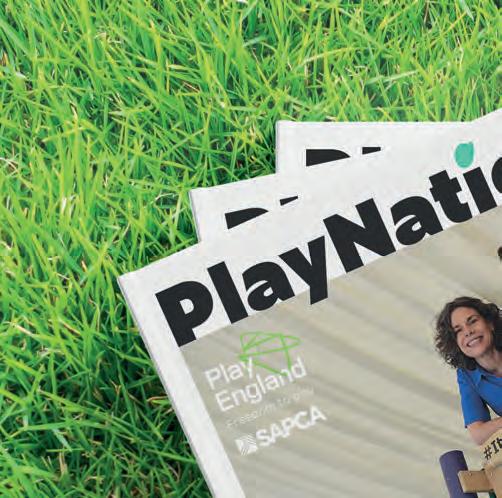
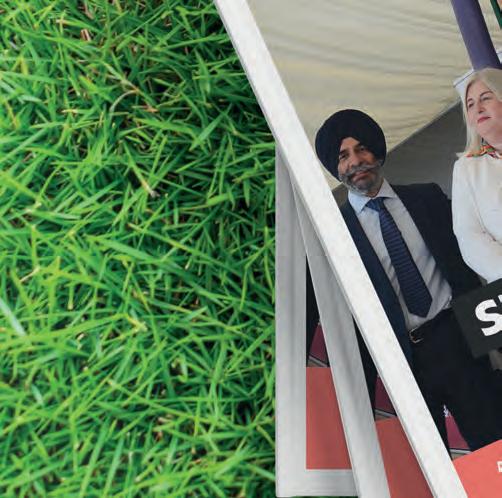
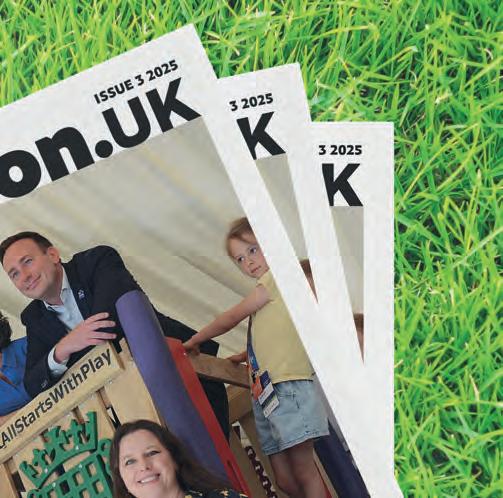




Creating inclusive and accessible play spaces is increasingly important. PlayNation rounds up some of the latest new projects and equipment which have been designed and created with inclusiveness at their heart
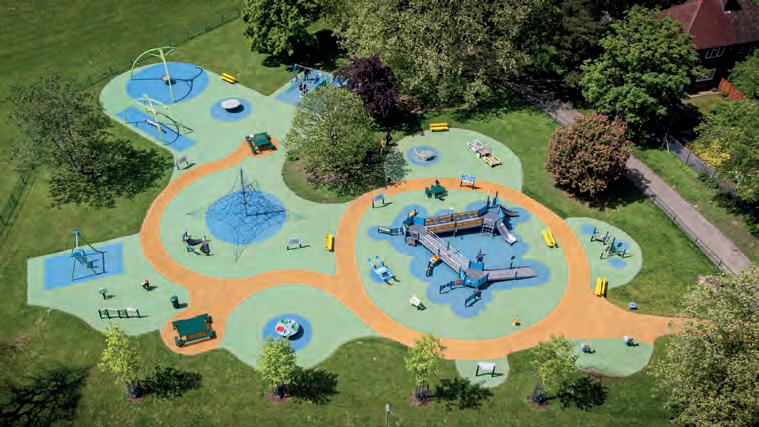
A fully inclusive outdoor playground for Barnet
Fair Play Barnet has been described as the UK’s first maximum accessibility and inclusive playground. Located in Victoria Recreation Ground, Barnet, London, the purposefully designed playground was born from a three-way collaboration between Barnet Council, expert parents and the Council’s play contractor, KOMPAN.
In early 2022, the Council was approached by a local resident who was keen on building a playground where people of all abilities could play together. With a leisure centre nearby to provide key supporting facilities such as Changing Places toilets, parking and a café, the council identified Victoria Recreation Ground to be an ideal location.
Designed for children and adults with disabilities, it includes a range of play equipment and features, such as spinning structures, rocking structures, sensory panels, and solid safety surfacing.
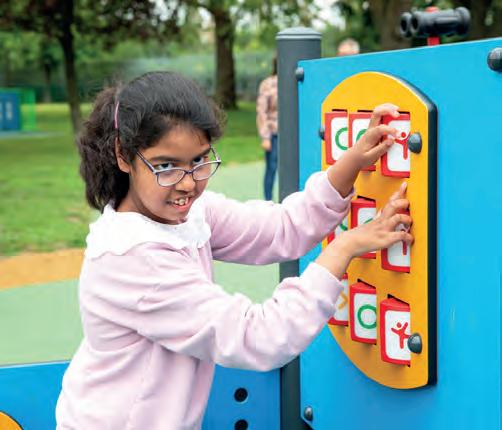
Fair Play Barnet features solid safety surfacing, sensory panels and adaptive play structures

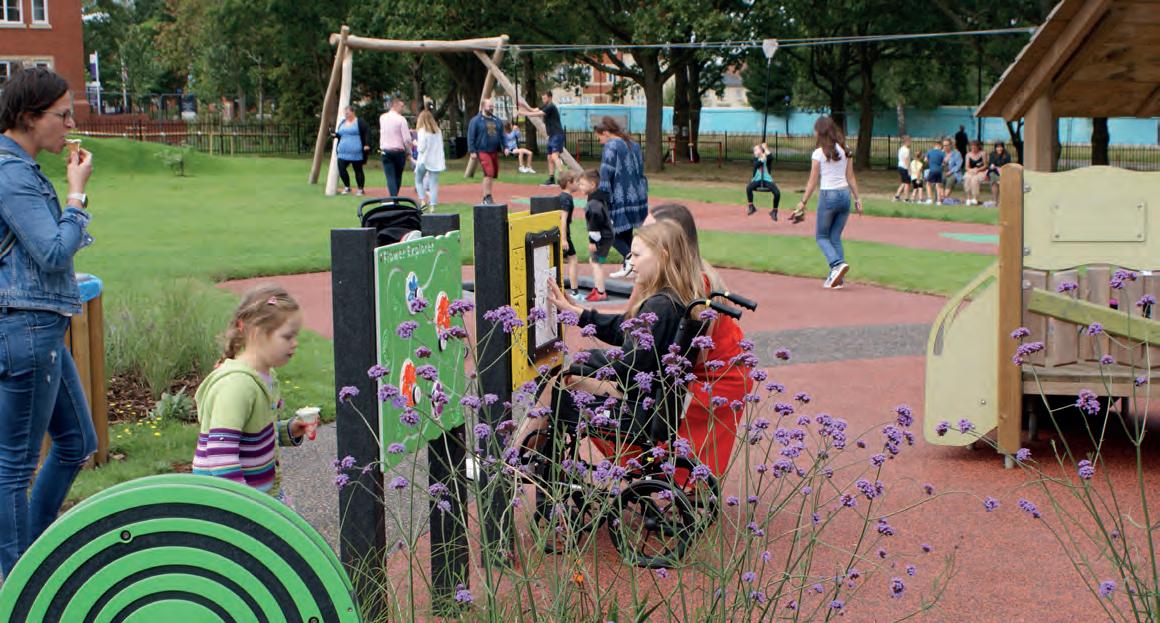
Eibe partners with local community to create inclusive play space
During the COVID-19 pandemic, when studying from home became the new normal, a local community member called Dylan found a captivating project: designing a new community play area in the newly developed Wellesley estate in Aldershot, Hampshire. Envisioning a space that could be enjoyed by all, including those in wheelchairs, Dylan dove into research, exploring local play environments and potential suppliers.
Not content with just imagining possibilities, Dylan pushed to present his plan to the local council and Grainger PLC – the developer of the Wellesley estate – hoping to see his ideas come to life on the expansive greens adjacent to his residence. The timing was perfect, as Grainger PLC was required to expand existing recreational spaces to foster community engagement. Dylan’s proposals were thus integral to consultations with potential suppliers, outlining local desires for the recreational space.
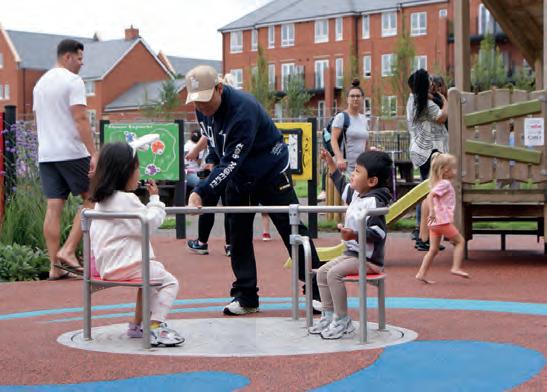
Dylan’s vision brings a fully inclusive, wheelchair-friendly playground to Wellesley’s new community greens
In early 2020, Eibe Play had been commissioned to install several play structures in the area’s initial developmental phase. Given Eibe Play’s prior installations and strong reputation, Grainger PLC engaged them to tailor Dylan’s concept into a fully articulated design aimed at transforming the area into a cherished community hub. Eibe Play crafted a playground that aligned with their mission and
responded to the community’s aspirations, as Dylan initially envisioned. They aimed to create a year-round accessible space promoting both physical and social skills for children aged 2-14, ensuring inclusion for every visitor, regardless of ability. A wetpour surface was selected to guarantee durability and accessibility, which is essential for a venue welcoming both wheelchairs and strollers. The play equipment was chosen from Eibe Play’s diverse collections and includes sensory play options enhancing the tactile experience of the area.
The grand opening was a community spectacle, welcoming 200 special guests who celebrated the unveiling with enthusiasm, marked by Dylan cutting the ribbon.

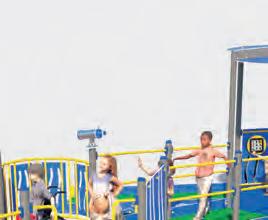
Wicksteed launches its Universally
Wicksteed has introduced its new Universally Inclusive range, which consists of six thoughtfully designed multiplay units that welcome all ages and abilities to join in the fun.
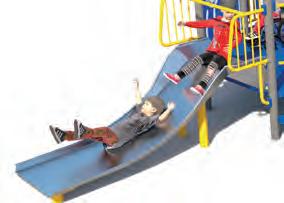



The range has been created with inclusivity in mind. From open ramp access and dual-height handrails to bright yellow accessories for the partially sighted, the aim is to ensure no child feels left out. The equipment includes features such as sensory play panels that spark curiosity and encourage cooperation, wavy bridges that offer a fun challenge for both those on foot and those on wheels and double-width slides so carers and children can ride side-by-side.
Jupiter Play and Leisure won the SAPCA Award 2025 for Small Project of the Year for its work on an inclusive playground at Stanway Lakelands Community Centre, Colchester. Jupiter was commissioned to design, supply and install a play facility aimed at encouraging children of all abilities to be able to interact and play together.
The clients – Colchester City Council and Essex County Council Short Breaks for Disabled children and Young People – put together a brief for the playground that prioritised true inclusion. The brief asked for elements such as physical play, imaginative and social play, individual and quiet play as well as risk and challenge for all users. The brief also asked for consideration to rest and recharge spaces – including seating and shaded areas – and for materials and colours to be used in a way to not over stimulate those with sensory issues.


There’s also quiet hammock seating, tucked beneath the towers – ideal for a little downtime – and a telescope to inspire imaginative adventures. Optional roof coverings offer shade and shelter, while clever layout choices reduce surfacing needs without compromising on play value.
With up to 16 inclusive play features and a flexible modular design, the Universally Inclusive range delivers a truly shared play experience—for everyone.
“At Wicksteed, we believe that play should be for everyone,” a company spokesperson said.
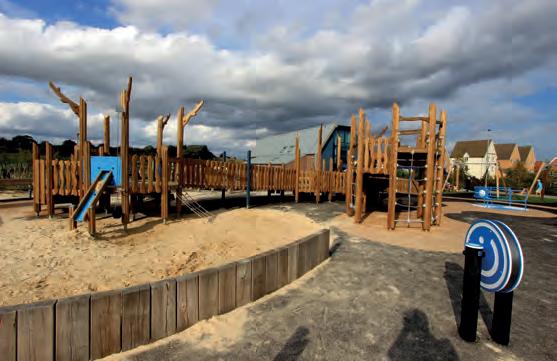
A bespoke, wheelchairaccessible multi-play unit and sensory zones let children of all abilities play side by side
Jupiter designed and created a bespoke unit to provide a range of opportunities for different kinds of play, with sensory play being a priority. The colour palette was kept deliberately neutral, with gentle pops of blue helping connect to their community centre. This allows neurodiverse children to not get overstimulated
and be able to spend more time engaging with the play.
The design provides a journey through the space, inspired by the adjacent community centre and country park.
The most comprehensive element was the bespoke multi-play unit designed by the team to be fully accessible by wheelchair users. This is supplemented by a wide range of accessible and sensory play items.
Michael Hoenigmann, MD of Jupiter Play, says: “We wanted to create a space that children with special educational needs, sensory needs, and those with mobility related issues including wheelchair users, could play and interact alongside all other children.”
Proludic introduces inclusive seesaw
The Proludic Inclusive Seesaw has been designed with accessibility and safety in mind and can accommodates up to six users, including two wheelchair users. Key features include wheelchair access on both sides, a reliable wheel locking system and a spring and shock-absorbing mechanism that delivers smooth, stable rocking movements. The seesaw’s platform supports up to four standing children, facilitating shared play experiences and fostering social interaction.
Suitable for children aged three and above, the equipment supports various developmental functions such as balance, coordinated movement,
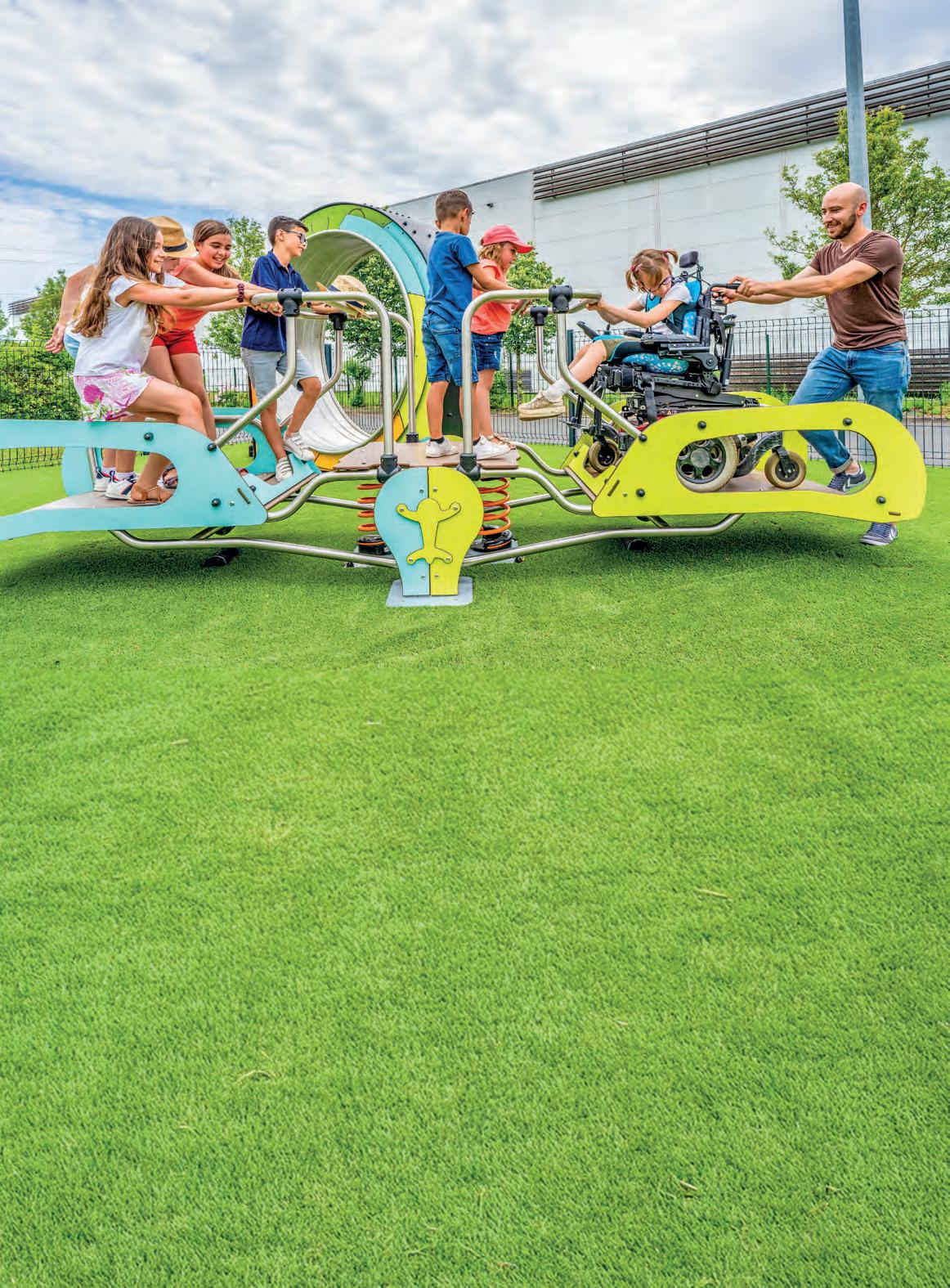
and social interaction. Its ergonomic elements – such as safety side panels, metal handles, and wide platform areas –enhance accessibility and comfort, enabling children of differing abilities to participate confidently and securely.
Developed through research and testing, the Proludic Inclusive Seesaw offers a dependable, engaging play experience aligned with modern standards of inclusive design. It effectively combines functionality, safety, and developmental value in a single play structure.
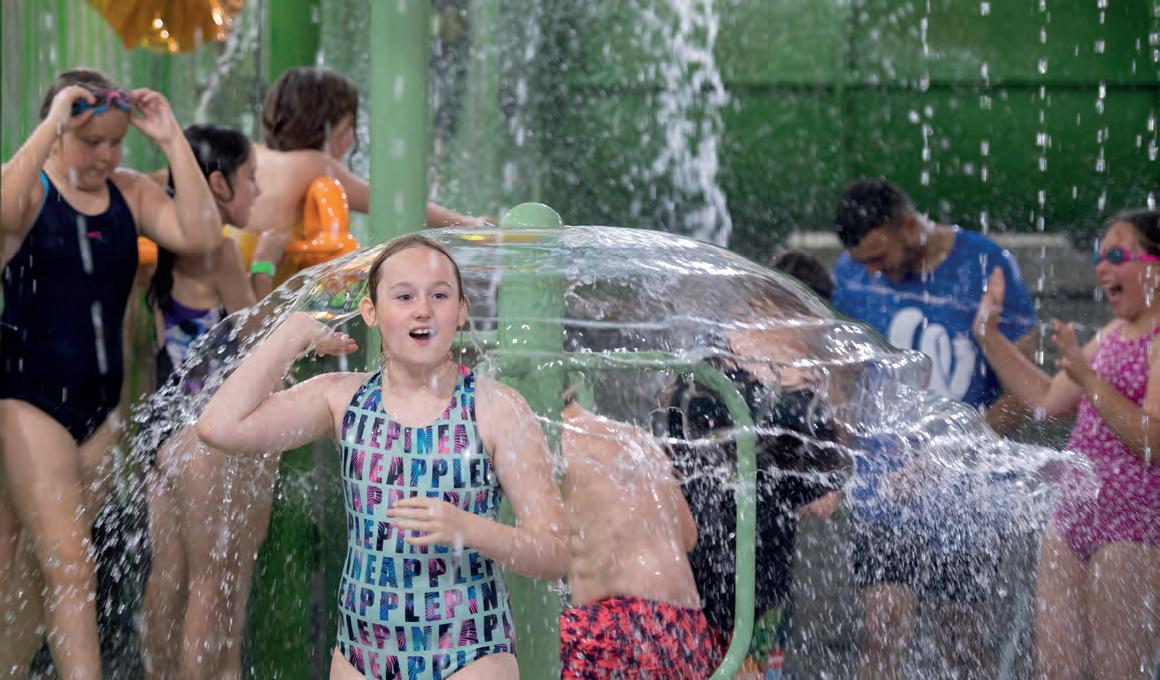
The Wave water park in Coventry is considered one of the most accessible leisure centres in the UK. All water park levels are connected via a spiralling ramp to ensure all ages and abilities can access the fun.
Ustigate Waterplay and Vortex were part of the team that collaborated to establish the water play at The Wave. Their tailor-made Elevations fits around The Cyclone’s plunge pool, utilising the entire footprint to include as many items as possible to maximise the play value. Exchanging steps for footbridges enabled an 85% accessible scheme for everyone to enjoy.
The Reef splash zone is a zero depth playscape that eliminates barriers of access, resulting in a level playing field for everyone. It includes gentle ground sprays and high octane and exhilarating splashes to appeal to water confident, thrill seekers too.
Each location has a multitude of products with differing water effects, each spraying in a different direction to enhance Coventry’s all-round experience.
The choice of colours delivers an essence of the outdoors inside; utilising the colours green and brown to create stems from the ground up and grassy graphics on the panels to deliver pastures new. The concept at The Wave is a sensational
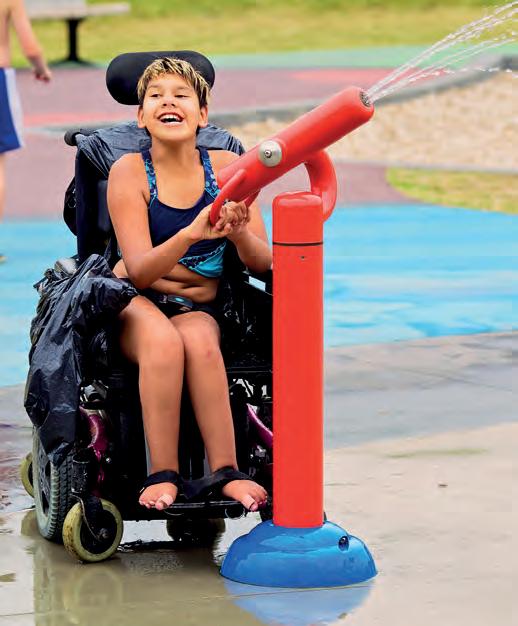
water meadow full of interactive and sensual elements to enlighten and enhance everyone’s experience through sight, sound and touch.
The design and build teams fulfilled every inclusive promise in establishing the best leisure facilities inside The Wave. Attention to detail in design leads to higher standards of inclusivity and accessibility that everyone can benefit from in their lives.
Play specialist, Playscheme, used inclusive design to transform Bamburgh Castle’s play area into a truly accessible haven for all. Building upon the site’s legacy as a beloved community space since 2009, the revitalisation prioritised ensuring every child, regardless of ability, can fully engage and enjoy the play environment. Innovative, inclusive features are central to this transformation. The iconic Bamburgh Pirate Ship
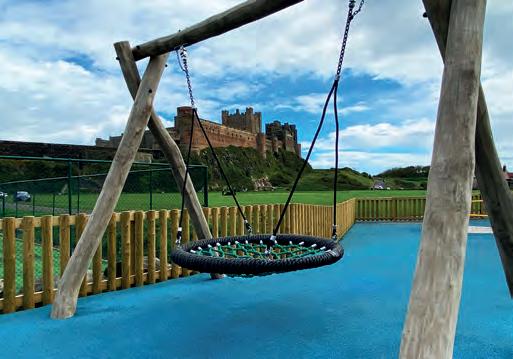
Swadlincote Woodlands is a stunning 80-acre urban park in South Derbyshire which welcomes thousands of visitors every year. Its play area is extremely popular, but by late 2024, it was overdue for a thorough regeneration. Sutcliffe Play partnered with South Derbyshire District Council to help this rural space turn over a new leaf. Their design strove to meet the council’s desire to see greater inclusive play opportunities for children with disabilities. The finished space includes a bespoke Woodland Spider climbing frame, and it is complemented by a Nature Activity Centre, with its ground level design enabling children in wheelchairs or pushchairs to join the fun. Other additions include an inclusive Communications Panel and a perfectly balanced Four-Way Seesaw. Elsewhere, a Single Point Swing can accommodate up to five users and its inclusive, open design allows children of different abilities to enjoy its immense play value together. Nearby, a new, 20-metre Cableway sits parallel with an existing zipline, creating a unique racing zone.
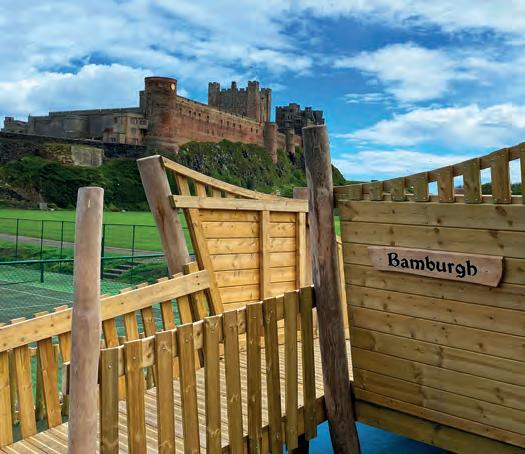
now boasts a DDA-compliant ramp, guaranteeing access for all. A basket swing and inclusive roundabout further enhance the range of accessible play experiences. Safety and ease of access were paramount, evidenced by the installation of an all-weather surface and levelled areas. This project underscores Playscheme’s commitment to inclusive design, demonstrating how thoughtful planning and construction can create play spaces where every child feels a sense of belonging and can create joyful memories together.
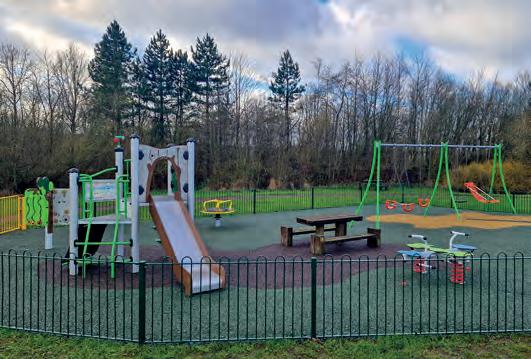
Sutcliffe Play’s makeover at Swadlincote Woodlands features wheelchair-friendly climbing frames, inclusive swings and a new 20 m racing cableway
Chris Worman MBE from SDDC said: “Sutcliffe Play brought a professional approach, and the play area has been a big hit. The car park is now full on weekends and on school holidays, which is great to see!”

